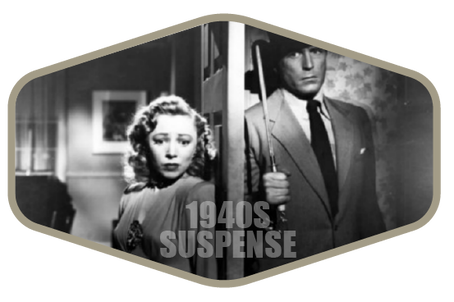Femme fatales, hard-boiled detectives, and dark story lines. These gritty films the 1940s were the beginning of the film noir era. With their distinctive low-key lighting, filmed in black and white, (though some were filmed in color) reflected the insecurities and tensions of the World War II era.
A familiar theme involves the pursuit of a duplicitous dame and her twisted schemes who would invariably lead our doomed hero into committing robbery or murder in the name of passion or unrequited love.
Perhaps unlike any other era, this genre featured critically acclaimed films featuring both A and B-list actors with large and small, shoestring budgets. Many of these actors, though successful in multiple genres, will be best remembered for their Film Noir performances: Elisha Cook Jr., Edmond O'Brien, Dennis O'Keefe, Robert Cummings, Robert Ryan, Rita Hayworth, Ann Savage, Hugh Beaumont, George Raft, Dana Andrews, Ray Milland, Dan Duryea, Chester Morris, Alan Ladd, Veronica Lake, Lawrence Tierney, Faye Emerson, and John Garfield.
A familiar theme involves the pursuit of a duplicitous dame and her twisted schemes who would invariably lead our doomed hero into committing robbery or murder in the name of passion or unrequited love.
Perhaps unlike any other era, this genre featured critically acclaimed films featuring both A and B-list actors with large and small, shoestring budgets. Many of these actors, though successful in multiple genres, will be best remembered for their Film Noir performances: Elisha Cook Jr., Edmond O'Brien, Dennis O'Keefe, Robert Cummings, Robert Ryan, Rita Hayworth, Ann Savage, Hugh Beaumont, George Raft, Dana Andrews, Ray Milland, Dan Duryea, Chester Morris, Alan Ladd, Veronica Lake, Lawrence Tierney, Faye Emerson, and John Garfield.
SUSPENSE FILMS FILMS OF THE 1940s
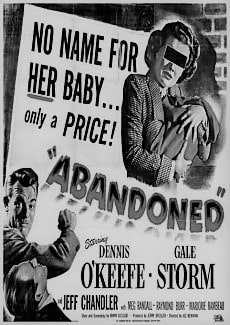 ABANDONED (1949)
ABANDONED (1949) (78 Min.) Genre: 1940 SUSPENSE, Transfer Quality: B
Viewers who know Gale Storm only through her chaotic comic performances on TV's My Little Margie and Oh Susanna will be surprised by her subdued dramatic performance in Abandoned. Storm plays Paula Consodine, who comes to Los Angeles in search of her missing sister. Newspaperman Mark Sitko (Dennis O'Keefe), investigating on Paula's behalf, discovers that the sister is dead, a supposed suicide. The whole thing seems a bit fishy to Sitko, and indeed it is: the girl's death was engineered by a black-market adoption racket, headed by one DeCola (Will Kuluva). Paula bravely offers to act as bait to draw the criminals out, a formidable task given the presence of such secondary villains as Raymond Burr and Mike Mazurki. (This print has Spanish subtitles)
Starring: Dennis O'Keefe, Gale Storm, Jeff Chandler, Raymond Burr, Mike Mazurki | Directed by: Joseph Newman
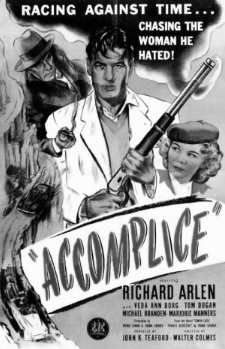 ACCOMPLICE (1946)
ACCOMPLICE (1946) (66 Min.) Genre: 1940 SUSPENSE, Transfer Quality: C
Accomplice was the "pilot" for a proposed PRC series based on Frank Gruber's short-tempered detective hero Simon Lash. Commendably, Richard Arlen plays Lash as written-brusque, nasty, antisocial. The plot gets under way when socialite Joyce Bonniwell (Veda Ann Borg) hires Lash to located her missing husband Jim (Edward Earle). The fact that Joyce is Lash's former sweetheart heightens the detective's interest in the case-so much so that, for most of the film's running time, he doesn't realize that he's being set up by a pair of extremely clever con artists. Four murders later, however, Lash ties up all the loose ends and turns the crooks over to the authorities.
Starring: Richard Arlen, Veda Ann Borg, Tom Dugan, Michael Branden | Directed by: Walter Colmes
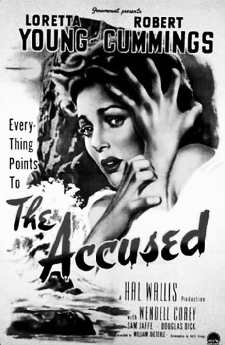 ACCUSED, THE (1948)
ACCUSED, THE (1948) (101 Min.) Genre: 1940 SUSPENSE, Transfer Quality: A
The Accused is a mystery melodrama with a predictable plot involving blackmail, attempted rape and murder. Loretta Young stars as Wilma Tuttle, a prim and proper college professor who unwittingly arouses the libido of student Bill Perry (Douglas Dick). When Perry tries to rape Wilma under cover of darkness, she beats him to death with a tire iron. Appalled by her own rash behavior, she tries to cover up her crime by making it seem as though Perry was killed while diving into the sea from a precipitous cliff. But as she follows the police investigation of Perry's death, Wilma realizes that she'll never be able to escape the prison of her own conscience — especially when she falls in love with Warren Ford (Robert Cummings), the dead boy's guardian. Wendell Corey delivers the film's best performance as a quietly efficient homicide lieutenant who suspects that Wilma knows more than she's letting on. The Accused was adapted by Ketti Frings from the novel by June Truesdell. — Hal Erickson
Starring: Loretta Young, Robert Cummings, Wendell Corey, Sam Jaffe | Directed by: William Dieterle
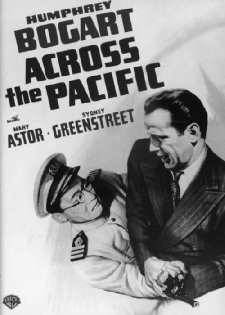 ACROSS THE PACIFIC (1942)
ACROSS THE PACIFIC (1942) (97 Min.) Genre: 1940 SUSPENSE, Transfer Quality: A
A lively espionage drama that reunited the stars and director of the previous year's The Maltese Falcon, Across the Pacific was originally envisioned as the story of a Japanese invasion of Hawaii. Real-life events of December of 1941, however, precluded such a scenario and the location was changed to the Panama Canal. For reasons known only to Warner Bros., the title was retained despite the fact that none of the action takes place in the Pacific. Humphrey Bogart plays Rick Leland, a disgraced ex-army man, who, after being turned down by the Canadian military, jumps a Japanese steamer bound for the Panama Canal Zone. Also onboard are Alberta Marlow (Mary Astor), a small-town girl claiming to be en route to Los Angeles; Dr. Lorenz (Sydney Greenstreet), a corpulent sociologist with a suspiciously friendly regard for all things Japanese; and Joe Totsuiko (Victor Sen Yung), a happy-go-lucky second generation Japanese-American on his way to visit the old country. But no one is exactly who he or she claims to be and the voyage from Halifax via New York City to Panama becomes a matter of life and death for the passengers in general, and for the future of the United States in particular. Director John Huston was forced to leave the film three weeks into the four-week shooting schedule when summoned to report to the Department of Special Services. According to Huston, he purposefully placed Humphrey Bogart's character in a highly precarious situation and left it up to his replacement, Vincent Sherman, to come up with the solution — which Sherman did in an especially fiery climax. — Hans J. Wollstein
Starring: Humphrey Bogart, Mary Astor, Sidney Greenstreet, Victor Sen Yung | Directed by: John Huston
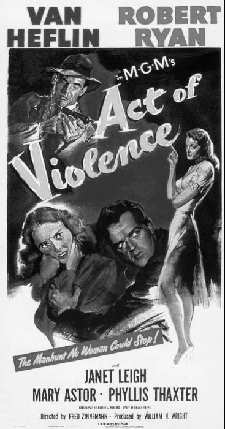 ACT OF VIOLENCE (1949)
ACT OF VIOLENCE (1949) (82 Min.) Genre: 1940 SUSPENSE, Transfer Quality: A
An unusually disturbing noir from a director better known for more mainstream fare like High Noon and From Here to Eternity, Act of Violence focuses on a WWII veteran haunted by his past. A film that was close to the director's heart, he said that it represented "the first time that I felt confident that I knew what I was doing and why I was doing it." Van Heflin stars as Frank Enley, a contractor living a peaceful life in a small California town, when Joe Parkson, a man who served in the army with him, arrives in the area, intent on killing him. He follows Frank to a lake where he's fishing but is unable to kill him. When a lakeside bartender tells Frank that a man with a limp is looking for him, Frank is frightened, realizing why he has come. He tells his wife, Edith (Janet Leigh), that Joe is a man who spent time with in a Nazi POW camp, who is now mentally ill, and that he intends to avoid him. When Frank goes to Los Angeles for a business convention, Joe arrives at his house and tells his wife that her husband is responsible for his injury and for the deaths of a number of men. Fearing for her husband's life, Edith heads for L.A. with Joe not far behind. — Michael Costello
Starring: Van Heflin, Robert Ryan, Janet Leigh, Mary Astor | Directed by: Fred Zinnermann
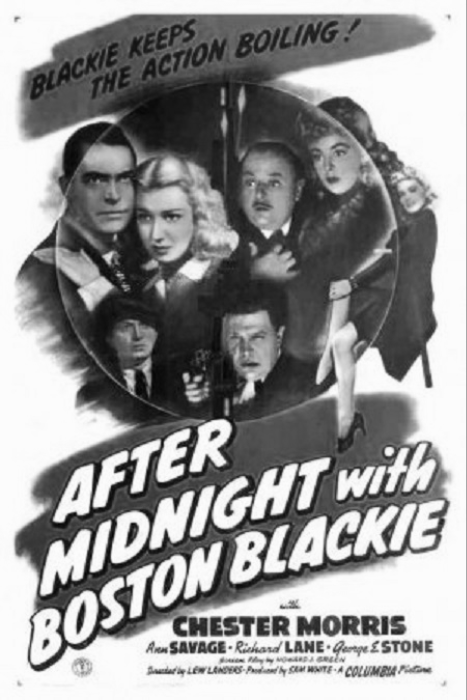 AFTER MIDNIGHT WITH BOSTON BLACKIE (1943)
AFTER MIDNIGHT WITH BOSTON BLACKIE (1943) (64 Min.) Genre: 1940 SUSPENSE, Transfer Quality: B
In this entry in the "Boston Blackie" series, the reformed crook meets his former lover who tells him that her father has just been freed from prison and that he is heading out to a safe deposit box where he hid a sack of diamonds. The good daughter wants her father to return the rocks and reform and wants Blackie to help him. Unfortunately, the father is murded en route to the bank and the hapless detective is arrested for the crime. Following his escape, Blackie learns that the girl has been kidnapped by gangsters who want her to reveal the location of the valuable box. There is a major showdown in a local nightclub when Blackie bursts in on the mob. In the end, he stops the gang, saves the girl, and overcomes temptation and returns the jewels. — Sandra Brennan
Starring: Chester Morris, Richard Lane, George E. Stone, Cy Kendall, Ann Savage | Directed by: Lew Landers
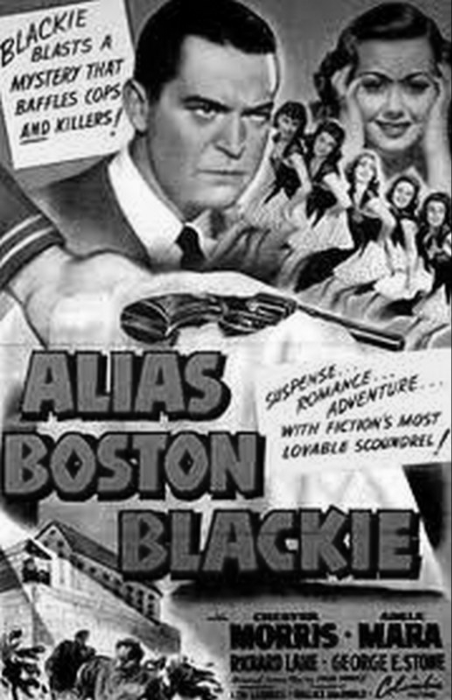 ALIAS BOSTON BLACKIE (1942)
ALIAS BOSTON BLACKIE (1942) (67 Min.) Genre: 1940 SUSPENSE, Transfer Quality: A
In this entry in the "Boston Blackie" series, the suave ex-thief returns to prison to see a Christmas show. There he is impressed by the talent of the inmates. One particularly talented fellow uses his magic act to break out of prison. Now Blackie must find him. Meanwhile the fugitive searches for his look-alike, the man who really committed the crime. Clever Blackie manages to catch them both and then insures that the real crook goes to jail while the innocent man goes free. — Sandra Brennan
Starring: Chester Morris, George E. Stone, Richard Lane, Walter Sande | Directed by: Lew Landers
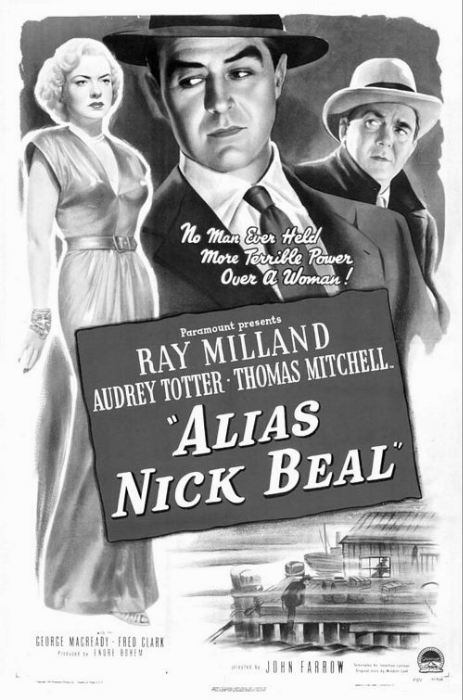 ALIAS NICK BEAL (1949)
ALIAS NICK BEAL (1949) (92 Min.) Genre: 1940 SUSPENSE, Transfer Quality: B
This modern-day "Faust" variation benefits from a superb cast. Thomas Mitchell plays Joseph Foster, an honest judge who wants to become governor. Blocked by corrupt political forces, Foster would practically have to make a deal with the Devil to reach his goal. Enter Nick Beal (Ray Milland), a diabolically handsome gent with a slick line of patter and a smooth, infallible method of getting things done. Failing to recognize his benefactor's true identity (after all, Nick has no horns or cloven hooves) Foster agrees to the deal when Nick assures him that the end result is for the good of the people. To bind the bargain, Nick sends out one of his most trusted associates, Donna Allen (Audrey Totter), to keep Foster in line. When Foster finally realizes that he's sold his soul, there seems to be no way out..but that's when the forces of Good, represented by Foster's wife Martha (Geraldine Wall) and his clergyman friend Thomas Gaylord (George Macready), switch into high gear. — Hal Erickson
Starring: Ray Milland, Audrey Totter, Thomas Mitchell, Geraldine Wall | Directed by: John Farrow
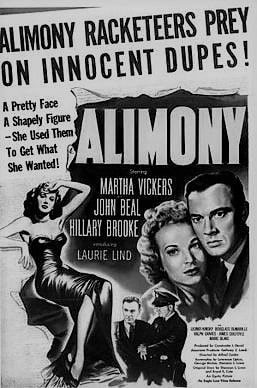 ALIMONY (1949)
ALIMONY (1949) (71 Min.) Genre: 1940 SUSPENSE, Transfer Quality: C
One thing you can say about Alimony: It tackled a subject that virtually everyone in Hollywood was intimately familiar with. Martha Vickers plays a ruthless young woman who has hit upon a clever (if not original) method of fattening her bank account. She seeks out relationships with wealthy married men, gets them to leave their wives to marry her, then cooks up "alienation of affection" and "adultery" cases against them. As a result, she invariably leaves the divorce court with a huge alimony settlement. Eventually she graduates from breaking hearts to breaking laws, and is thrown in the calaboose for her troubles.
Starring: Martha Vickers, John Beal, Hillary Brooke, Douglas Dumbrille | Directed by: Alfred Zeisler
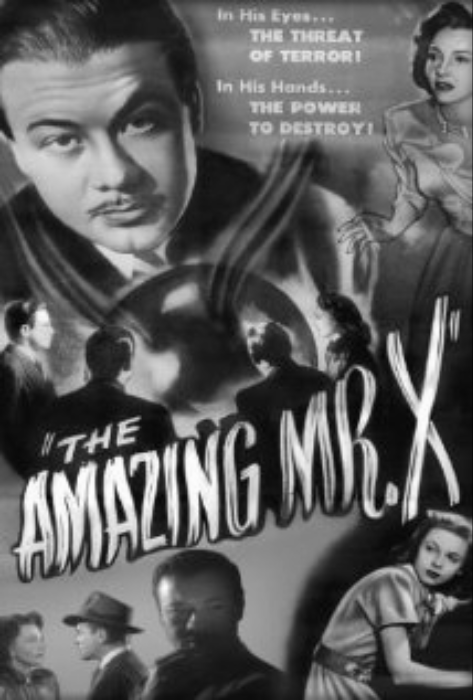 AMAZING MR. X, THE (1948)
AMAZING MR. X, THE (1948) (79 Min.) Genre: 1940 SUSPENSE, Transfer Quality: B
Also known as "The Spiritualist", The Amazing Mr. X, stars Turhan Bey as the title character, a mysterious mystic named Alexis. Making a comfortable living by fleecing the gullible wealthy, Alexis' latest target is grieving young widow Christine Faber (Lynn Bari). Hoping to communicate with her husband, who supposedly died in a car crash two years earlier, Christine submits to Alexis' crystal-ball act. Our hero finds out more than he bargained for when the "deceased" Mr. Faber (Donald Curtis) turns up very much alive as the central figure in an elaborate fraud scheme.
Starring: Turhan Bey, Lynn Bari, Cathy O'Donnell, Richard Carlson, Donald Curtis, Virginia Gregg | Directed by: Bernard Vorhaus
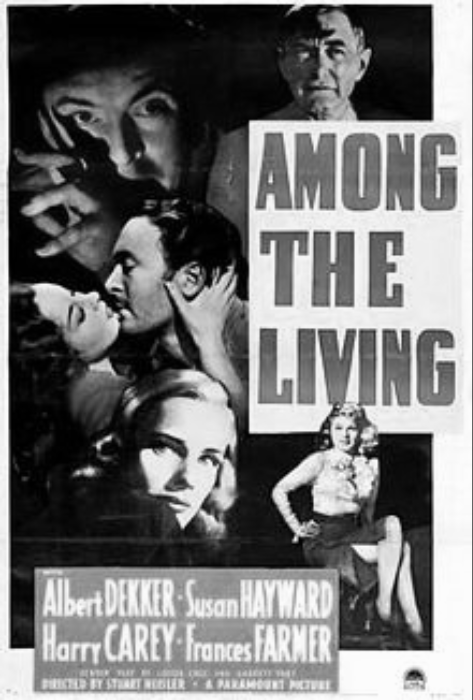 AMONG THE LIVING (1941)
AMONG THE LIVING (1941) (67 Min.) Genre: 1940 SUSPENSE, Transfer Quality: C
One of the eerier chillers of its period, and one of the best ever to come out of Paramount, Stuart Heisler's Among the Living is a strange and compelling mix of social drama, horror film, and suspense thriller. The story opens with the funeral of Maxim Raden, the patriarch who was pretty much responsible for building up the town that bears the family name, and which has been dominated for decades by the now-idle mill that he owned. Present at the funeral is Dr. Ben Saunders (Harry Carey Sr.), Raden's oldest friend, and the surviving Raden son John (Albert Dekker), who has been away for most of the last 25 years and recently married Elaine (Frances Farmer), a beautiful young woman from New York. John was one of a pair of twin boys; the other, Paul, died in an accident a quarter century ago, just after John was sent away to school. But Saunders and Maxim Raden had a secret between them, that Paul Raden didn't die, but went dangerously insane, and has kept been alive all of this time, in a hidden room in the decaying Raden mansion...
Starring: Albert Dekker, Susan Hayward, Harry Carey, Frances Farmer | Directed by: Stuart Heisler
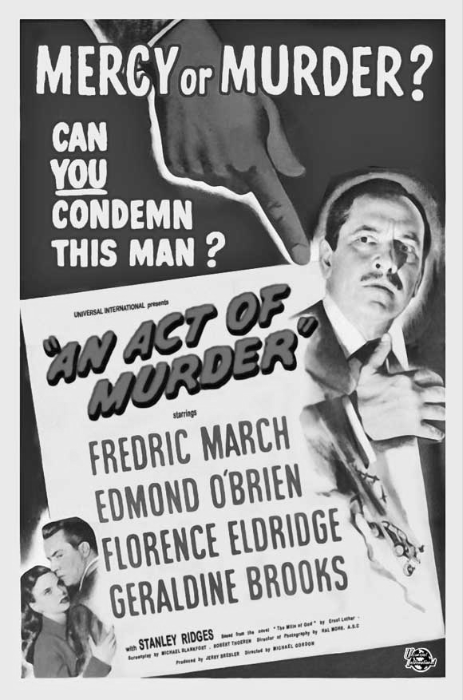 AN ACT OF MURDER (1948)
AN ACT OF MURDER (1948) (91 Min.) Genre: 1940 SUSPENSE, Transfer Quality: B
In this provocative drama, a stern hard-liner judge commits euthanasia to save his terminally ill wife from further suffering. He decides to kill her by driving the both of them off a cliff. He succeeds in ending her pain, but unfortunately he survives and ends up turning himself in with a full confession. Now it is up to his brilliant lawyer to defend him. He not only justifies the old judge's actions, he also proves that the wife took a fatal dose of poison before getting in the car; therefore she committed suicide. The judge is freed and returns to his courtroom where he oversees his cases with considerably more sympathy and understanding than he did before. — Sandra Brennan
Starring: Fredric March, Edmond O'Brien, Florence Eldridge, Geraldine Brooks | Directed by: Michael Gordon
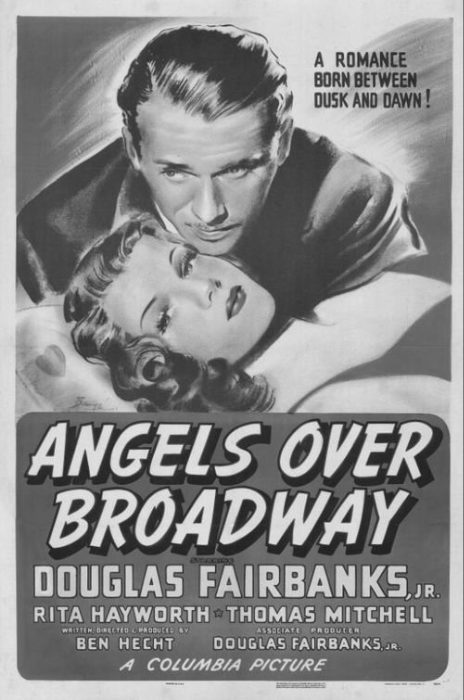 ANGELS OVER BROADWAY (1940)
ANGELS OVER BROADWAY (1940) (80 Min.) Genre: 1940 SUSPENSE, Transfer Quality: A
In the Ben Hecht-scripted Angels over Broadway. Douglas Fairbanks Jr. plays a poker hustler working in cahoots with good-time girl Rita Hayworth. Alcoholic playwright Thomas Mitchell, having saved embezzler John Qualen from suicide, decides to enter Fairbanks' high-stakes game, using Qualen as an easy-mark "bait." Mitchell's clever schemes to beat Fairbanks come acropper, but Fairbanks has a sudden change of heart and decides it's more fun to perform good deeds. — Hal Erickson
Starring: Douglas Fairbanks, Jr, Rita Hayworth, Thomas Mitchell, John Qualen | Directed by: Lee Garmes, Ben Hecht
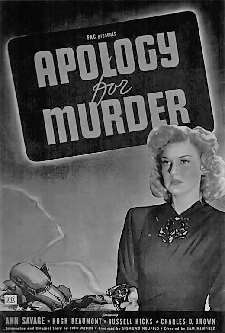 APOLOGY FOR MURDER (1945)
APOLOGY FOR MURDER (1945) (67 Min.) Genre: 1940 SUSPENSE, Transfer Quality: B
PRC's Apology for Murder is aptly named: the production values in this 67-minute quickie are pretty sorry. If you're willing to look past the mildewed sets and murky lighting, however, this well-paced film noir is pretty enjoyable. Hugh Beaumont (yes, that Hugh Beaumont) plays a tough reporter whose honesty is compromised by scheming Anne Savage. Unable to unwrap himself from Savage's little finger, Beaumont agrees to go in on her plan to murder her husband Russell Hicks. They then contrive to frame an innocent man for their perfidy. You've seen this before as Double Indemnity and The Postman Always Rings Twice, but the actors are energetic and the direction by the overworked Sam Newfield is better than usual.
Starring: Ann Savage, Hugh Beaumont, Charles D. Brown, Russell Hicks, Pierre Watkin | Directed by: Sam Newfield
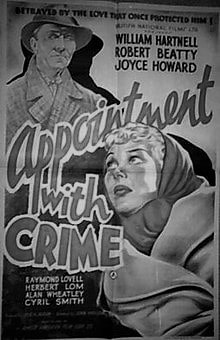 APPOINTMENT WITH CRIME (1946)
APPOINTMENT WITH CRIME (1946) (97 Min.) Genre: 1940 SUSPENSE, Transfer Quality: B
Leo Martin (William Hartnell) is a low-level member of a smash-and-grab gang run by shady dance-club owner Loman (Raymond Lovell), who is cajoled into a risky job on a major jewelry store. When the robbery goes wrong, and Martin is caught (and his wrists broken), the hood keeps silent and does his stretch in prison -- all along, he nurses a grudge against Loman and his driver Hatchett (Victor Weske) for running out on him. And that grudge grows to full-blown, murderous vengeance when Loman blows off the newly-released Martin as no use to the gang (as his hands aren't what they used to be). Now Martin plans to get even by squeezing Loman dry of everything he has, starting with his peace-of-mind -- he implicates the club owner in a murder, while planning a seemingly perfect alibi for himself, and also manages to latch on to the ring-leader that Loman is fronting for, "respectable" art dealer Gregory Lang (Herbert Lom). Lang has a knack for tying up loose ends -- including Loman -- and thinks he can handle a low-level spiv like Martin, but he doesn't reckon with the latter's rage, deviousness, or resourcefulness. Martin's planning gets him past all of the obstacles in his way, even -- so it seems -- the plodding efforts of Inspector Rogers (Robert Beatty), still investigating the killing that put Martin's plan into operation.
Starring: Herbert Lom, William Hartnell, Raymond Lovell, Joyce Howard, Robert Beatty | Directed by: John Harlow
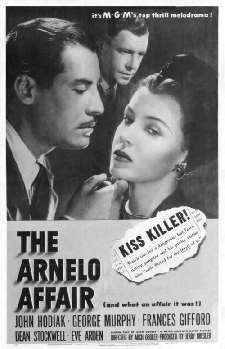 ARNELO AFFAIR, THE (1947)
ARNELO AFFAIR, THE (1947) (87 Min.) Genre: 1940 SUSPENSE, Transfer Quality: A
On the whole, the films of producer-writer-director Arch Oboler seldom came up to the lofty standards of his radio work, but each of his movie projects had a few meritorious moments. One of the better Oboler film efforts was The Arnelo Affair, produced by MGM in 1946. Frances Gifford delivers what may be her best performance as Anne Parkson, the loving but neglected wife of busy Chicago attorney Ted Parkson (George Murphy). Upon meeting one of Ted's clients, shady nightclub owner Tony Arnelo (John Hodiak), Anne finds herself inexorably drawn to the charismatic Arnelo. He in turn is equally fascinated by Anne, but his fascination deepens into love. Upon realizing that Arnelo is essentially a cold-blooded thug, Anne tries to break off their relationship. But Arnelo has murdered his cast-off mistress Claire Lorrison (Joan Woodbury), and has arranged the evidence so as to implicate Anne in the killing. To Arnelo's way of thinking, if he can't have Ann, no one can-certainly not her scrupulously honest husband, who has gone on record insisting that he'd prosecute any criminal to the fullest extent of the law, even if that criminal was a friend or relative. Told in Arch Oboler's traditional stream-of-consciousness manner, the story comes to a violent but logical conclusion when Arnelo exhumes his own long-suppressed sense of decency. Despite competition from the three stars, and from such reliable supporting players as Eve Arden and Dean Stockwell, The Arnelo Affair is stolen by Warner Anderson as a soft-spoken, philosophical Chicago detective. — Hal Erickson
Starring: John Hodiak, George Murphy, Frances Gifford, Dean Stockwell, Eve Arden | Directed by: Arch Oboler
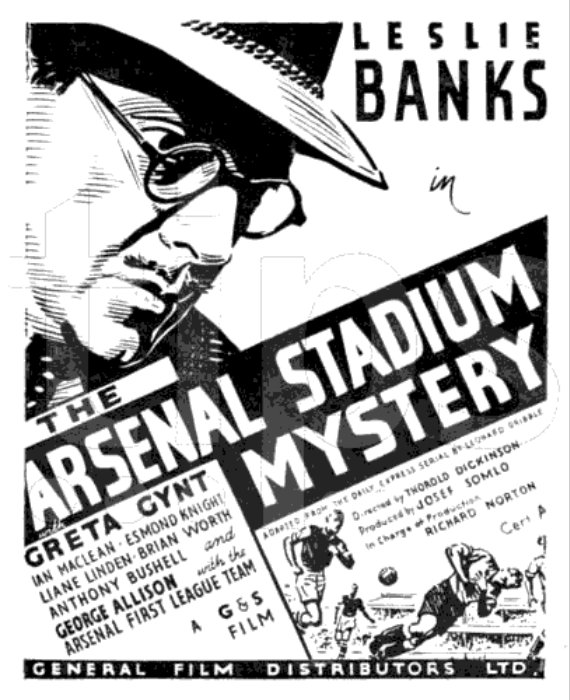 ARSENAL STADIUM MYSTERY, THE (1940)
ARSENAL STADIUM MYSTERY, THE (1940) (85 Min.) Genre: 1940 SUSPENSE, Transfer Quality: B
The game of football figures prominently in The Arsenal Stadium Mystery — not the American gridiron version, but the soccer-style competition played in England. The focus is on Anthony Bushell, playing a champion British football player. Bushell is poisoned to death during a game, in full view of a capacity crowd. Police inspector Leslie Banks enters the scene to determine who, why, and how. Like many British programmers of the 1930s, Arsenal Stadium Mystery was an early arrival on American television.
Starring: Leslie Banks, Greta Gynt, Ian McLean, Liane Linden | Directed by: Thorold Dickinson
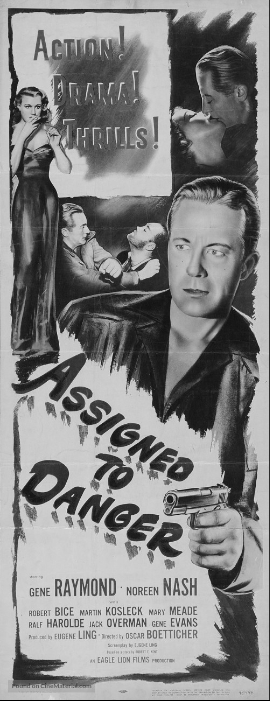 ASSIGNED TO DANGER (1948)
ASSIGNED TO DANGER (1948) (63 Min.) Genre: 1940 SUSPENSE, Transfer Quality: B
An early effort from director Oscar "Budd" Boetticher, Assigned to Danger was a worthwhile showcase for Gene Raymond, who'd been absent from the screen for several years. Raymond plays insurance investigator Dan Sullivan, at present trying to gather clues from a payroll heist. Someone doesn't want Sullivan to solve the case, as witness the number of times he's beaten black-and-blue. The film's bizarre climax takes place at the hideout of gang boss Frankie Mantell (Robert Bice), where Sullivan, posing as a doctor, is expected to operate on the wounded criminal! Director Boetticher is at his best in the closing reels, slowly and methodically building tension upon tension as Sullivan seeks an avenue of escape.
Starring: Gene Raymond, Gene Evans, Noreen Nash, Robert Bice | Directed by: Budd Boetticher
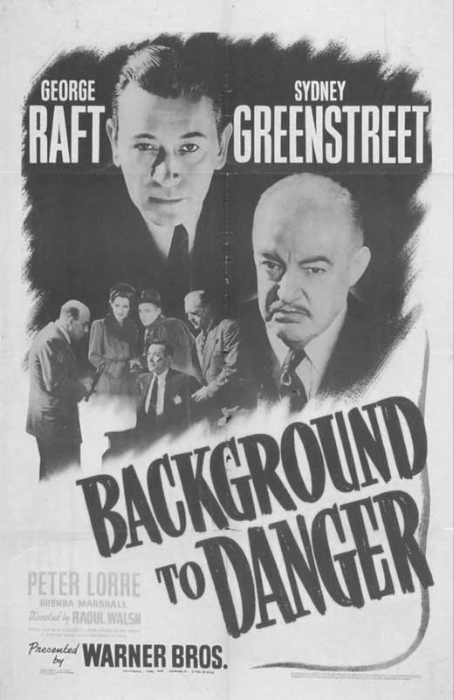 BACKGROUND TO DANGER (1943)
BACKGROUND TO DANGER (1943) (80 Min.) Genre: 1940 SUSPENSE, Transfer Quality: A
Eric Ambler's intriguing novel Uncommon Danger is brought down to a Republic serial level in Warner Bros.' Background to Danger. George Raft, who always seems miscast, plays an American undercover intelligence agent operating in Turkey. Sultry Osa Massen passes on some valuable secret papers to Raft just before she is killed. Our Hero then finds himself at the mercy of enemy agent Sidney Greenstreet, who knows that the papers contain Nazi plans to invade Turkey. Despite several brutal beatings, Raft and his cohorts Peter Lorre (a good guy for a change) and Brenda Marshall turn the tables on Greenstreet. Background to Danger was the first of many Warner Bros. follow-ups to the studio's megahit Casablanca; it's also the film wherein the prankish Peter Lorre stole George Raft's hat between takes—an affront that rankled the touchy Raft to his dying day. — Hal Erickson
Starring: George Raft, Brenda Marshall, Sidney Greenstreet, Peter Lorre | Directed by: Raoul Walsh
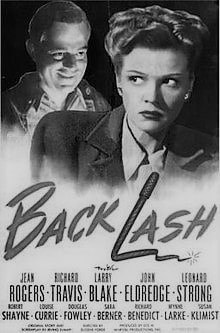 BACKLASH (1947)
BACKLASH (1947) (66 Min.) Genre: 1940 SUSPENSE, Transfer Quality: B
This minor 20th Century-Fox B picture received a great deal of TV play in the late 1950s. In a series of flashbacks, the audience learns that attorney John Morland (John Eldredge) has given a lift to a hitchhiker (Douglas Fowley) who turns out to be a murderer. As a result, Morland himself is implicated in a killing. A pair of detectives (Larry Blake and Richard Travis) discover that Morland has been having business problems and no end of difficulties with his wife Catherine (Jean Rogers). The trail of clues leads to a surprising revelation-especially surprising for those filmgoers conditioned to believe that the most obvious suspect is never guilty. Backlash is also available in a computer-colored version.
Starring: Jean Rogers, Richard Travis, Larry Blake, Louise Currie | Directed by: Eugene J. Forde
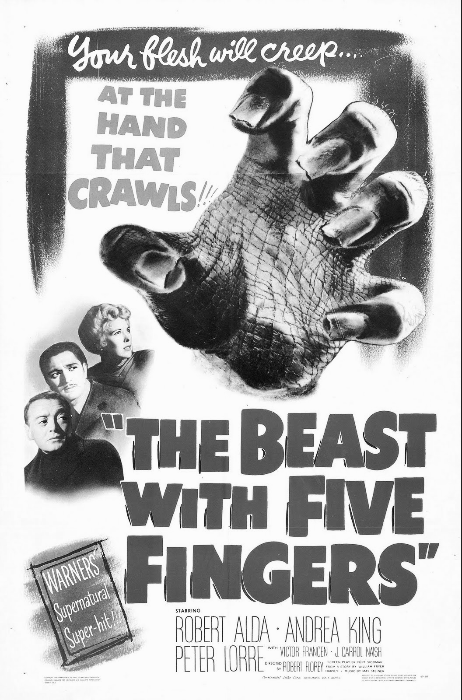 BEAST WITH FIVE FINGERS, THE (1946)
BEAST WITH FIVE FINGERS, THE (1946) (89 Min.) Genre: 1940 SUSPENSE, Transfer Quality: A
This movie is an early horror film classic and certainly one that a well-rounded horror movie aficionado should not miss. An invalid concert pianist dies, leaving a will that does not include his personal secretary Hilary Cummins (Peter Lorre) as a beneficiary. Furious, the left-out yes-man cuts off a hand from the corpse and plots revenge. Unfortunately for Hilary, the hand inherits a life of its own and relentlessly stalks the wild-eyed Lorre as he flees in vain. Special effects keep the audience jumping as they dread the next appearance of this gruesome walking hand. The film is directed by Robert Florey, who also directed Murders in the Rue Morgue (1932). — All Movie Guide
Starring: Robert Alda, Andrea King, Peter Lorre, Victor Francen, J. Carrol Naish | Directed by: Robert Florey
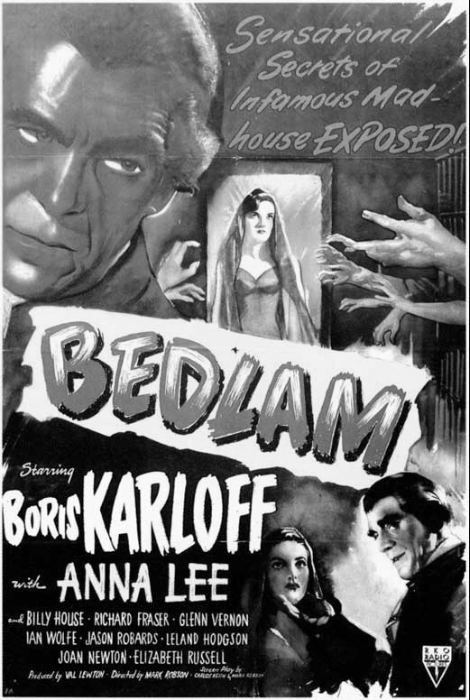 BEDLAM (1945)
BEDLAM (1945) (79 Min.) Genre: 1940 SUSPENSE, Transfer Quality: A
Bedlam is one of the costlier psychological-horror efforts from RKO producer Val (Curse of the Cat People) Lewton. Boris Karloff stars as the supervisor of the notorious 18th century British insane asylum St. Mary's of Bethlehem, better known as "Bedlam." Anna Lee, who co-stars as the feisty mistress of a fatuous government official, is appalled by the miserable treatment afforded the Bedlam inmates and insists that reforms be initiated. The crafty, politically connected Karloff responds by having Lee herself incarcerated in the institution: she is a "willful woman", and therefore must be insane. With the help of a few of the more rational patients, Lee stages a mutiny, capturing Karloff and giving him a mock trial. Though they don't truly intend to harm Karloff, he is seriously injured by one of his tormented patients. Assuming that Karloff is dead, the other inmates wall up his body in the cellar—and as the last brick is put in place, we see Karloff's eyes suddenly open! Though it has it moments of genuine terror, Bedlam is as historically accurate as possible, right down to the archaic dialogue passages. For the most part, the film is an indictment against political corruption, with Karloff (in a terrific, multi-faceted performance) alternately bullying and wheedling to save his own behind. Val Lewton (writing under the pseudonym Carlos Keith) based his film on one of the illustrations in Hogarth's "The Rake's Progress," glimpses of which are seen throughout the film as transitional devices. — Hal Erickson
Starring: Boris Karloff, Anna Lee, Billy House, Glenn Vernon | Directed by: Mark Robson
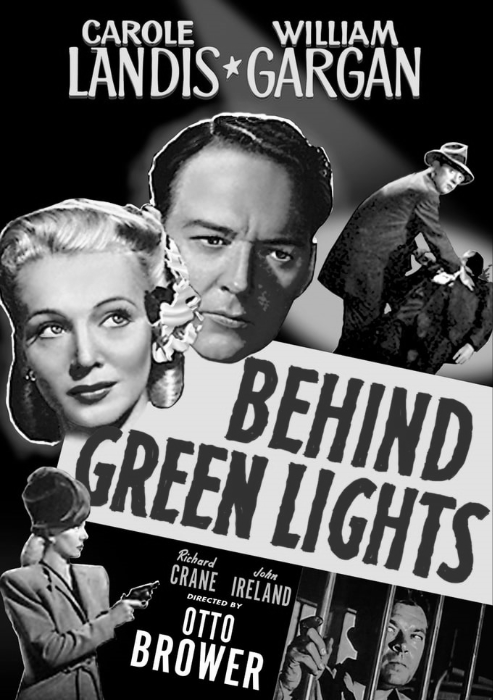 BEHIND GREEN LIGHTS (1946)
BEHIND GREEN LIGHTS (1946) (64 Min.) Genre: 1940 SUSPENSE, Transfer Quality: B
In this police drama, a busy precinct is thrown into chaos when the murdered corpse of a local detective is found in an abandoned car. Now the press is demanding to learn details. Meanwhile, an ambitious officer finds himself sorely tempted to use dishonest means to advance his political career. Things get even more muddled up when he falls in love with a female murder suspect.
Starring: Carole Landis, William Gargan, Richard Crane, Mary Anderson | Directed by: Otto Brower
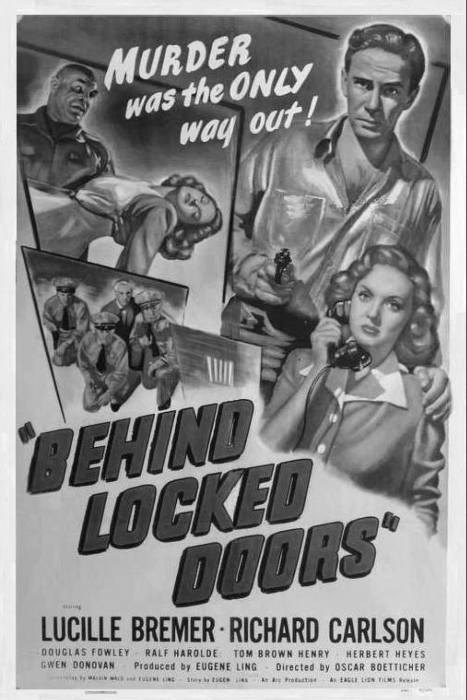 BEHIND LOCKED DOORS (1948)
BEHIND LOCKED DOORS (1948) (62 Min.) Genre: 1940 SUSPENSE, Transfer Quality: A
Behind the locked doors of a mental institution resides crooked politico Judge Drake (Herbert Heyes), free from prosecution so long as he pretends to be crazy. To get the goods on Drake, private detective Ross Stewart (Richard Carlson) has himself committed to the asylum as a patient. Meanwhile, reporter Kathy Lawrence (Lucille Bremer), posing as Stewart's wife, acts as his liaison to the outside world. But when Drake figures out what's going on, he pulls strings to have Stewart meet with an "accident" during his stay at the institution. Ralf Harolde, who memorably portrayed a seedy psychiatrist in Murder My Sweet, contributes another excellent performance in Behind Locked Doors as a sympathetic attendant with Something To Hide. — Hal Erickson
Starring: Lucille Bremer, Richard Carlson, Douglas Fowley, Herbert Heyes | Directed by: Budd Boetticher
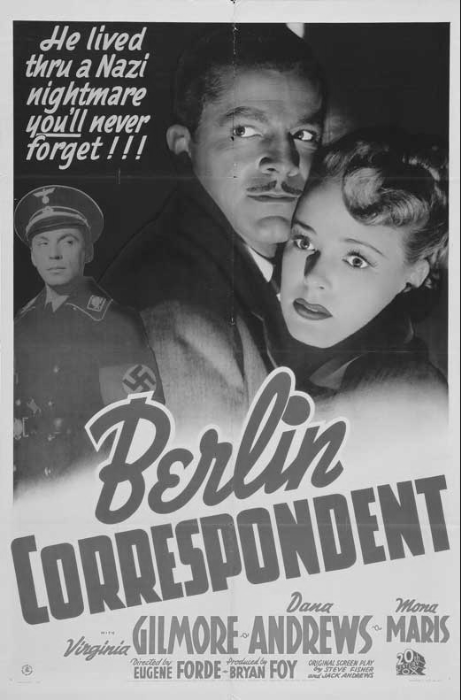 BERLIN CORRESPONDENT (1942)
BERLIN CORRESPONDENT (1942) (70 Min.) Genre: 1940 SUSPENSE, Transfer Quality: A
In one of his first important film roles, Dana Andrews plays Bill Roberts, an American radio commentator station in Berlin in the months before Pearl Harbor. Having witnessed Nazi brutalities first hand, Roberts hopes to alert his listeners of impending dangers, and does so by sending out coded messages during his broadcasts. The Gestapo begins to suspect something and assigns glamorous secret agent Karen Hauen (Virginia Gilmore) to spy on Roberts. When she discovers that her own father (Erwin Kaiser) is supplying Roberts with vital secrets, she turns her back on the Nazis and joins our hero in his efforts. The film winds up with an exciting airborne escape from Hitler-land. Arte Johnson fans please note: At one point, the head Gestapo officer (Martin Kosleck) actually says "Verrrry interesting"!
Starring: Dana Andrews, Virginia Gilmore, Mona Maris, Martin Kosleck, Sig Ruman | Directed by: Eugene Forde
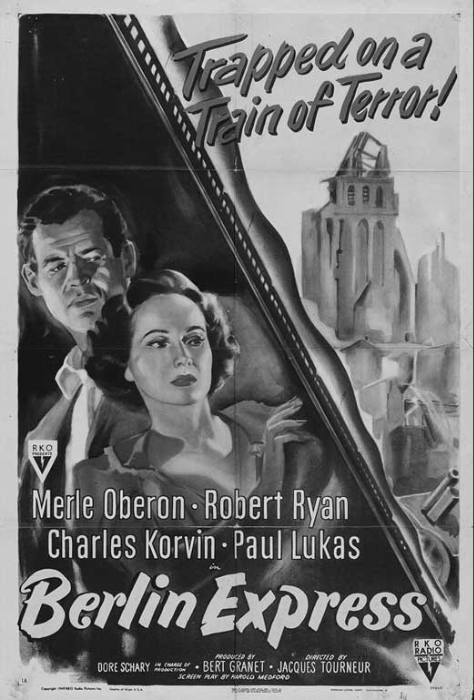 BERLIN EXPRESS (1948)
BERLIN EXPRESS (1948) (87 Min.) Genre: 1940 SUSPENSE, Transfer Quality: A
On a trip from France to Allied-occupied Berlin, a group of travelers — a mysterious and very secretive European woman (Merle Oberon), an American agricultural expert (Robert Ryan), a British educator (Robert Coote), a Soviet Army officer (Roman Toporow), and a French official (Charles Korvin) — all cross paths in the cramped quarters of a military train. They discover that the notion of the "Allied forces" is breaking down amid their victory in the war; they neither like nor trust each other, nor each other's countries, except where the Germans are concerned, where they share a distrust. And then they cross paths with a German VIP who makes them wonder if they've got all of the Germans pegged right. A bomb goes off, killing their newfound acquaintance, and the suspicions start anew. The mystery surrounding the victim only deepens when they discover that he wasn't who he claimed to be — and that the army isn't saying who he was. Ryan, Oberon, et al. soon find themselves up to their necks in unrepentant Nazis and militant German nationalists who have banded together against the occupiers to destroy any chance of success for a peace plan being put forward by a visionary German (Paul Lukas). They find Frankfurt a hotbed of sabotage and armed underground resistance, with the occupying armies seemingly caught flat-footed by the plotting in their midst, which includes murder and blackmail. Berlin Express is a spellbinding mix of action, suspense, and topical political intrigue, laced with idealism and a surprising degree of sophistication, a level a wit almost worthy of Graham Greene, and an eye for suspense worthy of Hitchcock. Indeed, the film could almost be considered director Jacques Tourneur's postwar equivalent to Hitchcock's Foreign Correspondent (1940). It also represents a fascinating cultural snapshot, depicting the very last moments of hope for peaceful relations with the Soviets that could be seen in American movies for decades. — Bruce Eder
Starring: Merle Oberon, Robert Ryan, Charles Korvin, Paul Lukas | Directed by: Jacques Tourneur
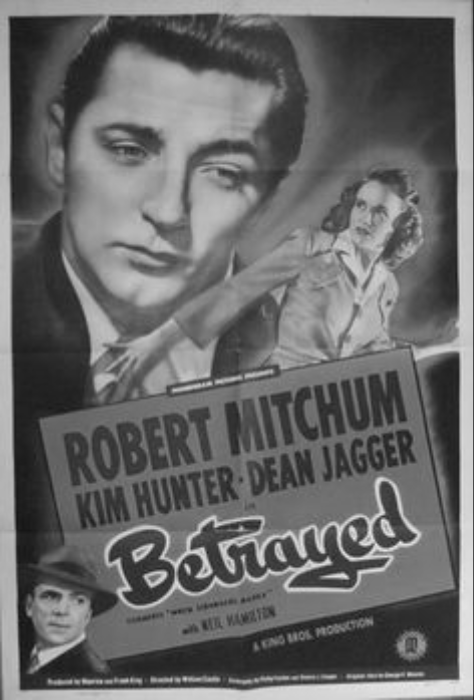 BETRAYED (1944)
BETRAYED (1944) (70 Min.) Genre: 1940 SUSPENSE, Transfer Quality: A
Betrayed is the reissue title for the classic melodrama When Strangers Marry. In her third film, Kim Hunter plays a waitress who comes to New York to meet her husband Dean Jagger. Kim's marriage was a whirlwind affair, and as a result she barely knows her husband. She soon discovers that Jagger may be involved in a murder — and that he very well may be a homicidal maniac. Designated by film-historian Don Miller as the finest "B" picture ever made, Betrayed is chock full of superb cinematic touches, courtesy of director William Castle. Best bits include the shot of Kim Hunter staring out her hotel window, her face illuminated by a flashing neon sign, and a "shock cut" straight out of Hitchcock's The 39 Steps. Third-billed Robert Mitchum was elevated to star status on the reissue prints of When Strangers Marry, which unfortunately tended to give away the film's surprise ending; also in the cast in a tiny role is Mitchum's future Out of the Past co-star Rhonda Fleming. One of the most convincing performances is delivered by character actor Lou Lubin, who plays a shaking-in-his-boots murder witness. Filmed in ten days, Betrayed was another box-office winner for the canny King Brothers producing team. — Hal Erickson
Starring: Dean Jagger, Kim Hunter, Robert Mitchum, Neil Hamilton | Directed by: William Castle
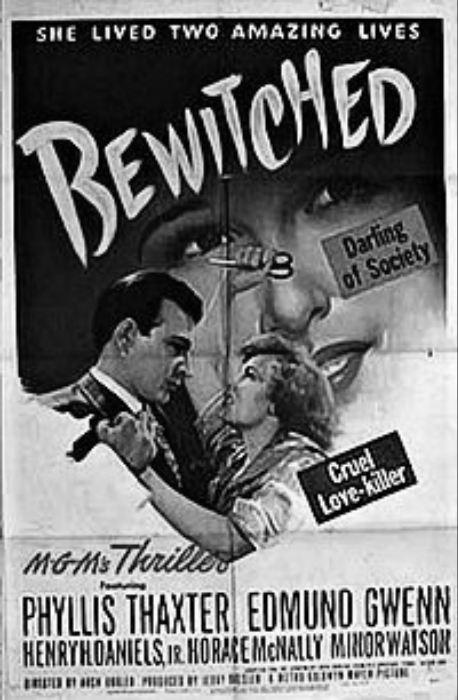 BEWITCHED (1945)
BEWITCHED (1945) (65 Min.) Genre: 1940 SUSPENSE, Transfer Quality: A
Radio legend and 3D pioneer Arch Oboler brings his story, Alter Ego, to the screen in a low-budget yarn that benefits from a strong cast and direction. Joan Ellis (Phyllis Thaxter) hears a voice in her head (in flashbacks) shortly before she is to be married. She flees to another city and even takes up with another man to rid herself of the voice, but random words bring it back at unexpected moments. The voice ultimately tells her to kill her husband-to-be, and when a psychiatrist (Edmund Gwenn) determines on the eve of her execution that Joan is possessed by a split personality, a struggle ensues to see which one will survive. Oboler uses radio techniques and tense scripting to bring his thriller to visual life. — Don Kaye
Starring: Phyllis Thaxter, Edmund Gwenn, Henry Daniels, Jr, Horace (Stephen) McNally, Audrey Totter | Directed by: Arch Oboler
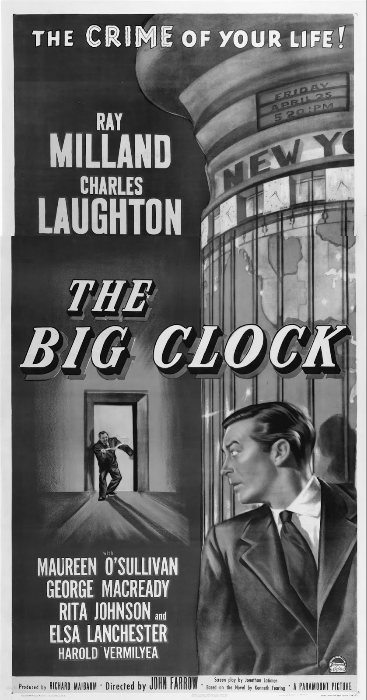 BIG CLOCK, THE (1948)
BIG CLOCK, THE (1948) (75 Min.) Genre: 1940 SUSPENSE, Transfer Quality: A
Although hardly unknown, The Big Clock is not as familiar as such other classic film noirs as The Big Sleep or Laura, so fans of noir and psychological thrillers who do not know this film should seek it out. Clock is immensely rewarding for all viewers, but especially for those with an inclination for moody black-and-white cinematography, twisting convoluted plots, and snappy dialogue with a certain edge. Jonathan Latimer's screenplay is clever and lean, providing just enough detail to flesh out its characters without getting in the way of the intricate plot. John Farrow's direction is top notch; he does a masterful job of creating tension and suspense, showing the audience just enough to keep them hooked without giving away too much. He skillfully melds the relatively lighthearted mood of the first portion of the film with the dangerous, desperate mood of the second part. Farrow's efforts are enormously aided by the evocative, atmospheric photography of Daniel L. Fapp and John F. Seitz. Their contributions heighten the tension without becoming overwhelming and make excellent use of shadow and light. Ray Milland is a solid presence as the hero, and Charles Laughton is a menacing delight as the villain, but Elsa Lanchester almost steals the film away from them with her bizarrely amusing supporting role. — Craig Butler
Starring: Ray Milland, Charles Laughton, Maureen O'Sullivan, George Macready | Directed by: John farrow
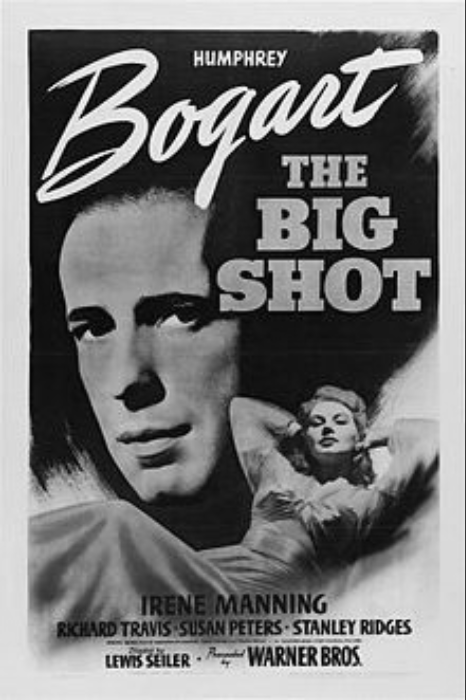 BIG SHOT, THE (1942)
BIG SHOT, THE (1942) (82 Min.) Genre: 1940 SUSPENSE, Transfer Quality: A
Just because Humphrey Bogart had been promoted to the "A" list by way of The Maltese Falcon (1941) didn't mean that he was completely free of such minor potboilers as The Big Shot. Bogart stars as mob leader Duke Berne, a three-time loser who tries in vain to reorganize his old gang upon being sprung from prison. Falling in love with Lorna Fleming (Irene Manning), the wife of crooked attorney Martin Fleming (Stanley Ridges), Berne ends up back behind bars for life, thanks to the vengeful Fleming's courtroom chicanery. Escaping during a prison variety show (dominated by Chick Chandler as an incarcerated blackface comedian), Berne makes a beeline for Lorna, who deserted the duplicitous Fleming when the latter railroad an innocent young man into jail. Hoping to find happiness in a remote mountain hideway, Berne ultimately realizes that he's no good for Lorna and spends the rest of the picture atoning for past sins.
Starring: Humphrey Bogart, Irene Manning, Richard Travis, Susan Peters | Directed by: Lewis Seiler
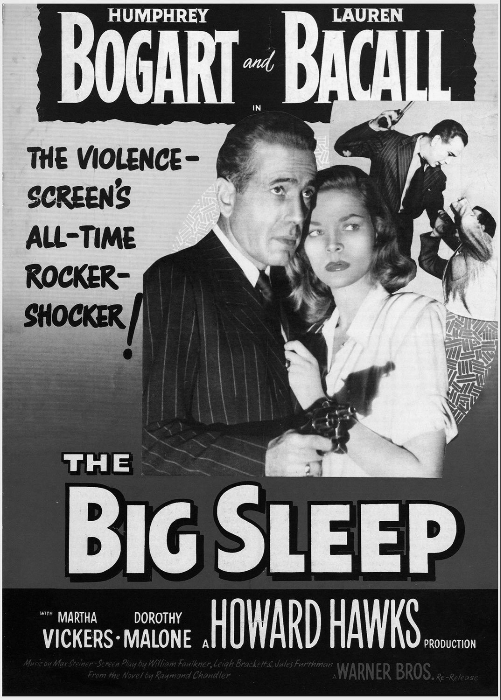 BIG SLEEP, THE (1945)
BIG SLEEP, THE (1945) (153 Min.) Genre: 1940 SUSPENSE, Transfer Quality: A
The definitive Humphrey Bogart/Lauren Bacall vehicle, The Big Sleep casts Bogart as Raymond Chandler's cynical private eye Philip Marlowe. Summoned to the home of the fabulously wealthy General Sternwood (Charles Waldron), Marlowe is hired to deal with a blackmailer shaking down the General's sensuous, thumb-sucking daughter Carmen (Martha Vickers). This earns Marlowe the displeasure of Carmen's sloe-eyed, seemingly straight-laced older sister Vivian (Bacall), who is fiercely protective of her somewhat addled sibling. As he pursues the case at hand, Marlowe gets mixed up in the murder of Arthur Geiger (Theodore von Eltz), a dealer in pornography. He also runs afoul of gambling-house proprietor Eddie Mars (John Ridgely), who seems to have some sort of hold over the enigmatic Vivian. Any further attempts to outline the plot would be futile: the storyline becomes so complicated and convoluted that even screenwriters William Faulkner, Leigh Brackett, and Jules Furthmann were forced to consult Raymond Chandler for advice (he was as confused by the plot as the screenwriters). When originally prepared for release in 1945, The Big Sleep featured a long exposition scene featuring police detective Bernie Ohls (Regis Toomey) explaining the more obscure plot details. This expository scene was ultimately sacrificed, along with several others, in favor of building up Bacall's part; for instance, a climactic sequence was reshot to emphasize sexual electricity between Bogart and Bacall, obliging Warners to replace a supporting player who'd gone on to another project. The end result was one of the most famously baffling film noirs but also one of the most successful in sheer star power. — Hal Erickson
Starring: Humphrey Bogart, Lauren Bacall, John Ridgely, Martha Vickers, Elisha Cook Jr. | Directed by: Howard Hawks
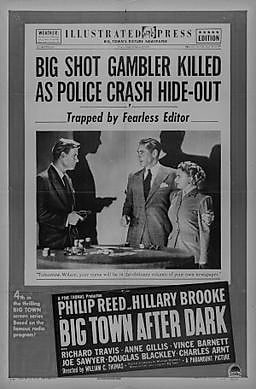 BIG TOWN AFTER DARK (1947)
BIG TOWN AFTER DARK (1947) (70 Min.) Genre: 1940 SUSPENSE, Transfer Quality: B
Top-notch police reporter Lorelei Kilbourne (Hillary Brooke) decides to resign her job when her novel is published, and gives Big Town Illustrated Press editor-in-chief Steve Wilson (Philip Reed) her two-weeks' notice. Lorelei is surprised when Steve hires a replacement that day, Susan Peabody (Ann Gillis), a journalism student who is actually the niece of the newspaper's publisher Amos Peabody (Charles Arnt). Steve discovers that Susan has a gambling habit that she developed in college -- he tries to get to know her better by taking her to the Winners' Club, a crooked private gambling club that's the tip of the iceberg of an illegal gambling operation in Big Town, and is pummeled for his trouble, while the girl is seemingly kidnapped. Peabody gives in to the terms of gambling ring leader Chuck LaRue's (Richard Travis), and Susan turns up a few minutes later. But Steve comes up with a plan to undermine LaRue's operation, while Lorelei decides to look into Susan's background and finds lots of unsavory twists. There are more double- and triple-crosses to follow as the planning on both sides unravels amid overlapping and interlocking schemes, as well as a poker game motif that's about as good as you'll ever see in any B-movie of its time.
Starring: Phillip Reed, Hillary Brooke, Richard Travis, Anne Gillis | Directed by: William C. Thomas
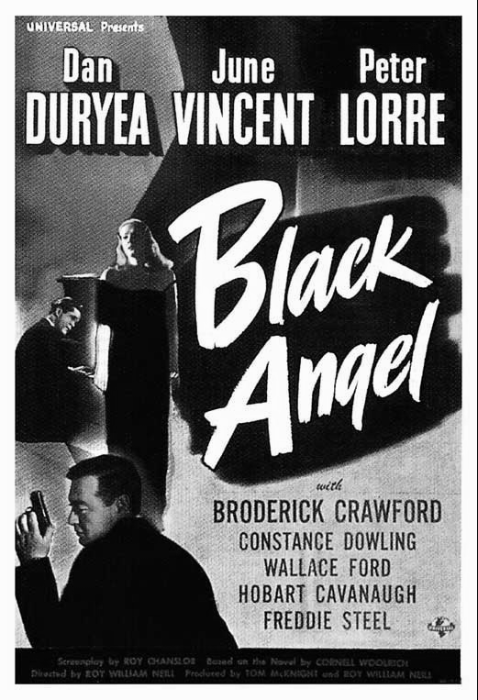 BLACK ANGEL (1946)
BLACK ANGEL (1946) (80 Min.) Genre: 1940 SUSPENSE, Transfer Quality: A
With an ingenious script by Roy Chanslor, this modest, but imaginative film noir is notable for the strong performance by lead actor Dan Duryea Alcoholic musician Martin Blair (Duryea) becomes the prime suspect when his cheating wife is murdered, until it is determined that he was "sleeping one off" at the time of the killing. Another man (John Phillips), who was being blackmailed by the murdered woman, is sent to prison for the crime. The condemned man's wife (June Vincent) believes in her husband's innocence and sets about to prove it, enlisting the aid of Blair, who has flashes of memory about the night of the crime. Recalling that he saw a stranger leave his wife's apartment, Blair endeavors to track down this stranger. The real murderer is revealed in the film's last moments...to everyone's surprise, including the guilty party! Black Angel was based on a novel by Cornell Woolrich. Normally assigned to villainous roles, Dan Duryea gives a surprisingly impressive performance as an affectingly romantic character and is by far the most interesting and sympathetic character in the film. His performance makes the plot twist at the end, both startling and believable. — Hal Erickson
Starring: Dan Duryea, June Vincent, Peter Lorre, Broderick Crawford | Directed by: Roy William Neill
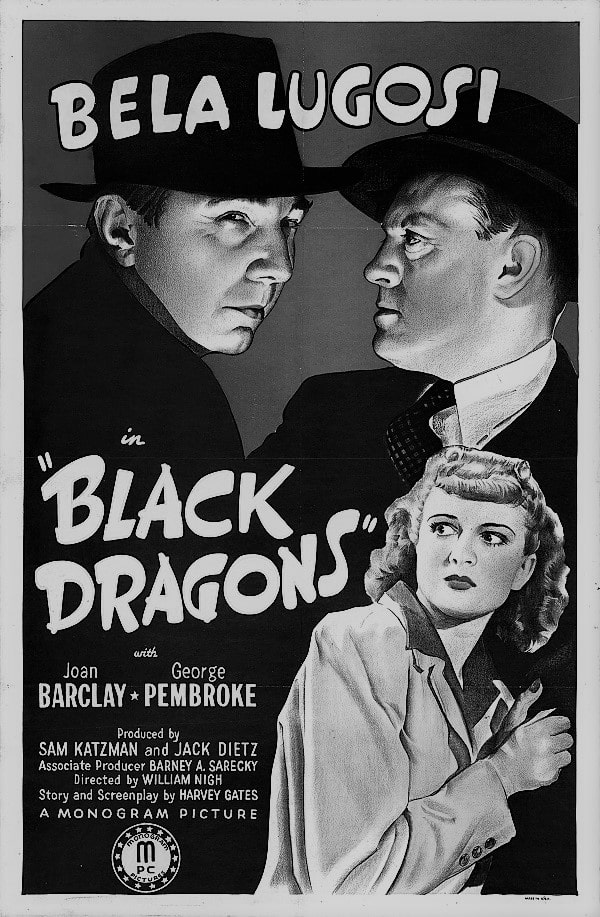 BLACK DRAGONS (1942)
BLACK DRAGONS (1942) (64 Min.) Genre: 1940 SUSPENSE, Transfer Quality: B
After an opening scene at a Washington DC cocktail party where it is demonstrated that "loose lips sink ships", the plot proper gets under way, wherein a group of six men conspire to undermine America's war effort. What is the connection between these six men, all of them outwardly respectable members of Washingtonian society? Hero Don (Clayton Moore) and heroine Alice (Joan Barclay) suspect that the answer lies with the mysterious, wryly philosophical Dr. Melcher (Bela Lugosi), a world-famous plastic surgeon. It turns out that Melcher is part of an elaborate espionage scheme hatched by the dreaded Black Dragon Society of Japan.
Starring: Bela Lugosi, Clayton Moore, George Pembroke, Joan Barclay | Directed by: William Nigh
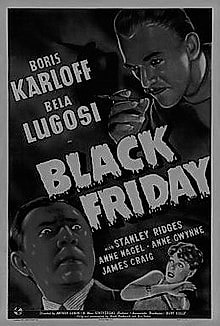 BLACK FRIDAY (1940)
BLACK FRIDAY (1940) (70 Min.) Genre: 1940 SUSPENSE, Transfer Quality: B
Told in flashback as Dr. Ernest Sovac (Boris Karloff) is marched into the gas chamber, Black Friday concerns kindly college professor George Kingsley (Stanley Ridges), who is seriously injured when he is caught in the middle of a gangster shootout. Kingsley's best friend Sovac performs an emergency "brain-ectomy", replacing Kingsley's gray matter with that of dying gangster Red Cannon. Though the operation is successful, the mild-mannered Kingsley occasionally lapses into Cannon's more brutal personality, and it is during one of these spells that he reveals the existence of a cache of stolen money. Hoping to use these ill-gotten funds to finance his neurological research, Sovac hypnotizes Kingsley into "becoming" Cannon, and while thus entranced the poor fellow commits several murders, including the elimination of his chief rival, mobster Eric Marnay (Bela Lugosi). Ultimately, Sovac is forced to kill Kingsley/Cannon "for the good of mankind", which brings us full circle to Death Row.
Starring: Boris Karloff, Bela Lugosi, Stanley Ridges, Anne Nagel | Directed by: Arthur Lubin
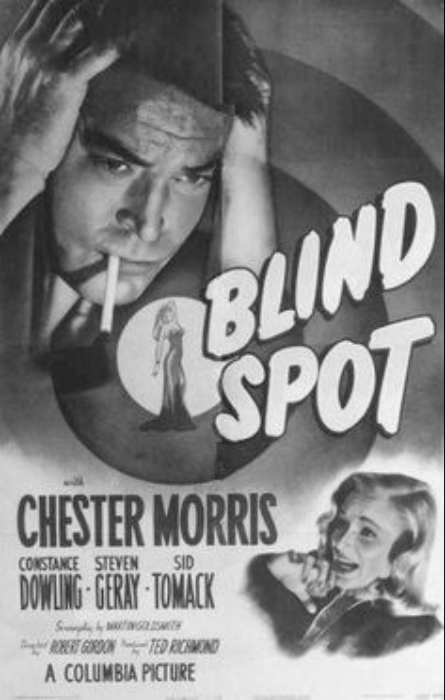 BLIND SPOT (1947)
BLIND SPOT (1947) (73 Min.) Genre: 1940 SUSPENSE, Transfer Quality: C
Chester Morris plays a mystery writer who bears a grudge against his publisher. Morris is mad enough to get blind drunk, but is he mad enough to kill? When the publisher is indeed murdered, Morris tops the suspect list. To clear himself, he uses his own skills as a writer of whodunits to ascertain the identity of the real killer. Trouble is, all the clues Morris comes up with point right back to him — and frankly, he can't remember what happened the night of the murder. — Hal Erickson
Starring: Chester Morris, Steven Geray, Sid Tomack, James Bell | Directed by: Robert Gordon
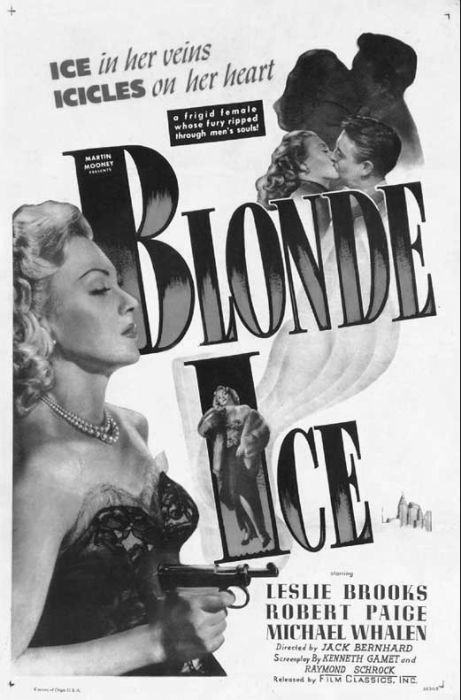 BLONDE ICE (1949)
BLONDE ICE (1949) (74 Min.) Genre: 1940 SUSPENSE, Transfer Quality: B
The film career of actress Leslie Brooks lasted long enough for her to contribute several mesmerizingly bitchy performances. In Blonde Ice, Brooks is cast as Claire, a society reporter who'll do literally anything for a story. She manages to keep herself in the headlines by marrying and romancing a series of wealthy men, all of whom die under mysterious circumstances. To deflect suspicion from herself, Claire frames her erstwhile boyfriend, sportswriter Les Burns (Robert Paige). Because the police department is incredibly obtuse throughout the film, it's up to a criminal psychologist (David Leonard) to expose Claire as a homicidal sociopath. Blonde Ice might make a fascinating double feature with Nicole Kidman's 1994 starrer To Die For. — Hal Erickson
Starring: Leslie Brooks, Robert Paige, Walter Sande, John Holland | Directed by: Jack Bernhard
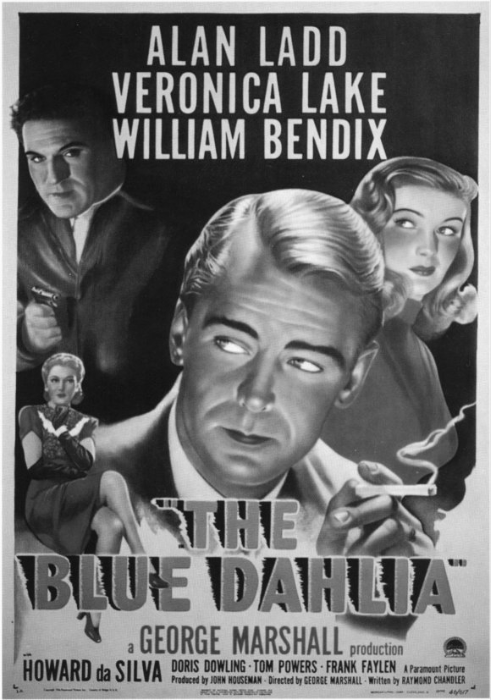 BLUE DAHLIA, THE (1946)
BLUE DAHLIA, THE (1946) (96 Min.) Genre: 1940 SUSPENSE, Transfer Quality: A
This neat, fast-paced perfectly cast film noir reflects the hard-boiled, grim wit of the author of its screenplay, Raymond Chandler. Johnny Morrison (Alan Ladd) returns from the war to find his wife Helen (Doris Dowling) having a party and in the arms of another man. Johnny and Helen have a terrible fight, and later Helen is found dead. Johnny must prove his innocence and he enlists the aid of Joyce Haywood (Veronica Lake), the ex-wife of Helen's lover. Pursued by the cops, and never sure if he is being set-up for the murder, Johnny finally solves the murder and clears his name. Alan Ladd is at his hard-boiled, no-nonsense best as Johnny and Veronica Lake is, as always, the perfect noir femme-fatale, mysterious and alluring. Nicely directed by George Marshall, the film moves with great pace to an exciting, satisfying conclusion. The screenplay, the only one written by Chandler directly for the screen, was nominated for an Academy Award. — Linda Rasmussen
Starring: Alan Ladd, Veronica Lake, William Bendix, Howard Da Silva, Hugh Beaumont | Directed by: George Marshall
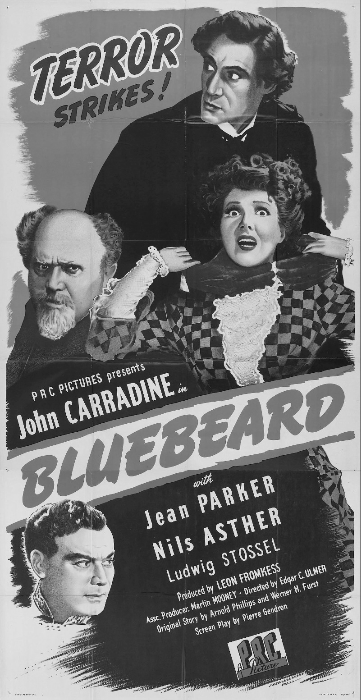 BLUEBEARD (1944)
BLUEBEARD (1944) (70 Min.) Genre: 1940 SUSPENSE, Transfer Quality: A
Bluebeard casts the saturnine John Carradine as Gaston, a popular artist-puppeteer in 19th century Paris. Unbeknownst to the authorities, Gaston is also the serial killer of beautiful young women that they have been seeking for several months. Whenever a girl fails to come up to Gaston's standards of perfection, she is summarily strangled and tossed into the streets. Gaston's latest model is the gorgeous Lucille (Jean Parker), who once she learns her employer's horrible secret courageously vows to bring him to justice. — Hal Erickson
Starring: John Carradine, Jean Parker, Nils Asther, Ludwig Stossel | Directed by: Edgar G. Ulmer
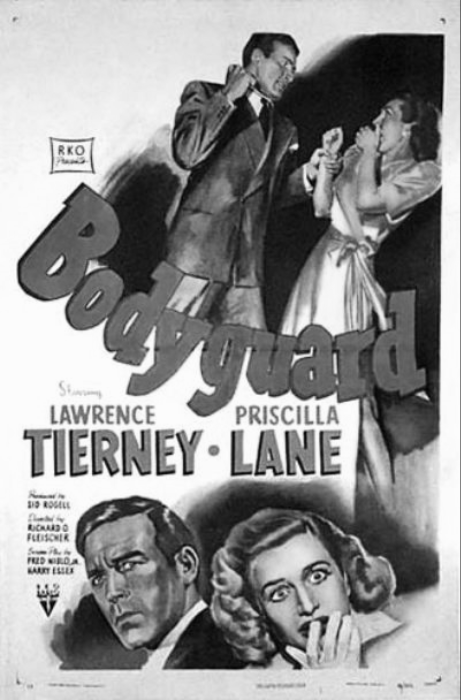 BODYGUARD (1948)
BODYGUARD (1948) (63 Min.) Genre: 1940 SUSPENSE, Transfer Quality: A
Granite-jawed Lawrence Tierney is the Bodyguard in this second-echelon noir thriller. Invited to resign from the LA police, short-tempered Mike Carter (Tierney) hires on to protect wealthy dowager Eugenia Dyson (Elizabeth Risdon). Before the film has reached its halfway point, Carter has been accused of murder, and is being hunted down by his former fellow officers. Only his file-clerk fiancee Doris Brewster (Priscilla Lane) believes in Carter's innocence, and it is she who is instrumental in cornering the actual killer. After a few more films like Bodyguard and The Narrow Margin, it was obvious that director Richard O. Fleischer had outgrown B pictures and was ready for more prestigious assignments. — Hal Erickson
Starring: Lawrence Tierney, Priscilla Lane, Phillip Reed, June Clayworth | Directed by: Richard Fleischer
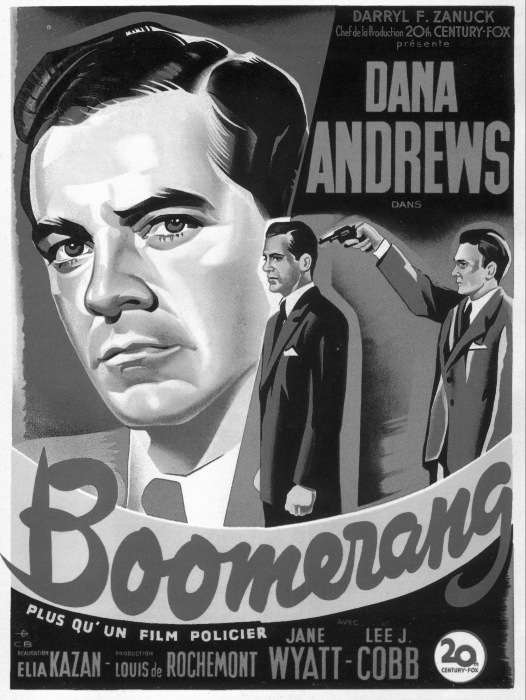 BOOMERANG! (1947)
BOOMERANG! (1947) (88 Min.) Genre: 1940 SUSPENSE, Transfer Quality: A
Boomerang, directed by Elia Kazan, is a chilling film noir, the true story about the murder of a priest, the subsequent arrest and trial of a jobless drifter, and the efforts of young state's attorney Henry Harvey (Dana Andrews) to uncover the truth. Closely based on the actual 1924 murder of Fr. Hubert Dahme in Bridgeport, Connecticut, the film was directed by the young Elia Kazan in a highly effective, semi-documentary style. Kazan shot most of the film on location, using high-contrast cinematography and an extremely mobile camera to create a palpable sense of urgency. The screenplay, expertly crafted by Richard Murphy received an Academy Award nomination. — Linda Rasmussen
Starring: Dana Andrews, E.J. Ballantine, Lee J. Cobb, Arthur Kennedy | Directed by: Elia Kazan
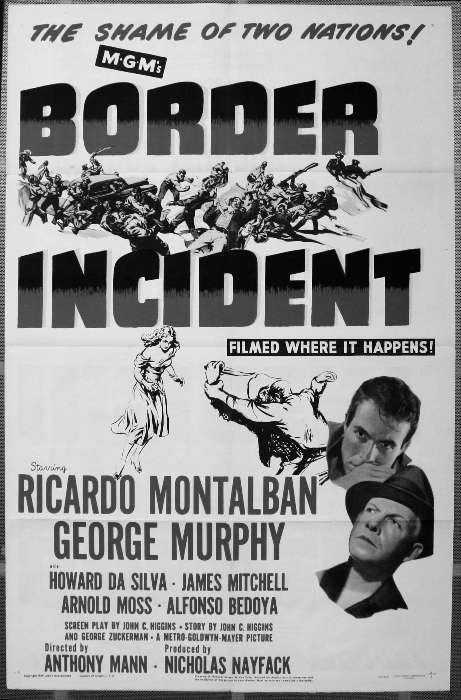 BORDER INCIDENT (1949)
BORDER INCIDENT (1949) (92 Min.) Genre: 1940 SUSPENSE, Transfer Quality: A
As far removed from a "typical" MGM picture as it was possible to get back in 1949, Border Incident is a gritty, realistic crime melodrama. The story concerns the efforts by both the Mexican and American governments to stop the smuggling of Mexican migrant workers across the border. Representing Mexico is special agent Pablo Rodriguez (Ricardo Montalban), while Jack Bearnes (George Murphy) works on behalf of the US. Screenwriter John C. Higgins and producer/director Anthony Mann refuse to pull any punches, as witness the surprising mid-film murder of one of the major characters. Highlights include a harrowing episode involving a plowing machine and a climactic shootout in a quicksand swamp. The uniformly well-chosen supporting cast includes Howard da Silva, Arnold Moss, Alfonso Bedoya and Charles McGraw, "film noir" veterans all. — Hal Erickson
Starring: Ricardo Montalban, George Murphy, Howard Da Silva, James Mitchell, Charles McGraw | Directed by: Anthony Mann
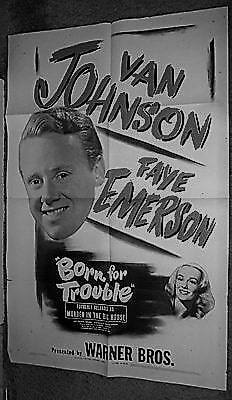 BORN FOR TROUBLE (1942)
BORN FOR TROUBLE (1942) (67 Min.) Genre: 1940 SUSPENSE, Transfer Quality: B
(AKA: Murder in the Big House) was a remake of the 1936 Warner Bros. programmer Jailbreak. In his first starring role, Van Johnson plays reporter Bert Bell, who wonders how it came to be that death-row inmate Dapper Dan Mallory (Michael Ames) was "accidentally" killed just before his appointment with the electric chair. Digging a little deeper, Bell discovers that Dapper Dan was planning to make a big revelation just before his execution, one which would expose the corrupt political machine for which he worked. With the help of heroine Gladys Wayne (Faye Emerson) and perenially drunken columnist Scoop Connor (George Meeker), Bell contrives to have himself thrown in jail to solve the mystery. Though the film passed unnoticed when first released, Murder in the Big House raked in a pile of cash when it was reissued as Born to Trouble in 1945, by which time Van Johnson had become the hottest male star in the movies.
Starring: Van Johnson, Faye Emerson, Frank Wilcox, George Meeker, Tod Andrews | Directed by: B. Reeves Eason
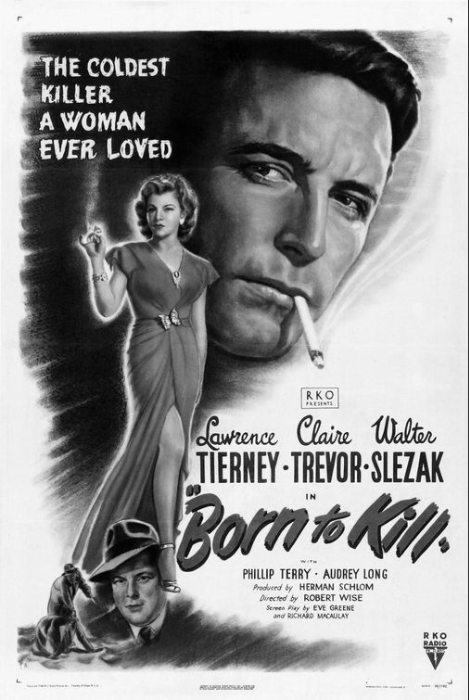 BORN TO KILL (1947)
BORN TO KILL (1947) (92 Min.) Genre: 1940 SUSPENSE, Transfer Quality: A
Somehow the titles of the films of hardcase actor Lawrence Tierney seemed to be extensions of the man's personality, as witness such films as The Devil Thumbs a Ride and Born to Kill. In the latter picture, Tierney starts the ball rolling by committing a double murder in a jealous pique. Claire Trevor discovers the bodies, but says nothing to the police; she's leaving town and doesn't want to be impeded. Trevor and Tierney meet and fall in love on the train to San Francisco. Unfortunately, Trevor is married, so Tierney shifts his affections to her sister, Audrey Long (later the wife of director Billy Wilder). He marries Long, though he keeps up his illicit affair with Trevor. When detectives investigating the murders come snooping, they are bought off by Tierney's pal Elisha Cook Jr.—who is then murdered by Tierney, who suspects that Cook is carrying on with Trevor (Cook seldom survived to the end of any of his films). When Tierney finally does face arrest, it's at the instigation of the jealous Trevor, who is shot full of holes for her trouble. Born to Kill was based on James Gunn's novel Deadlier Than the Male. — Hal Erickson
Starring: Lawrence Tierney, Claire Trevor, Walter Slezak, Audrey Long, Elisha Cook Jr. | Directed by: Robert Wise
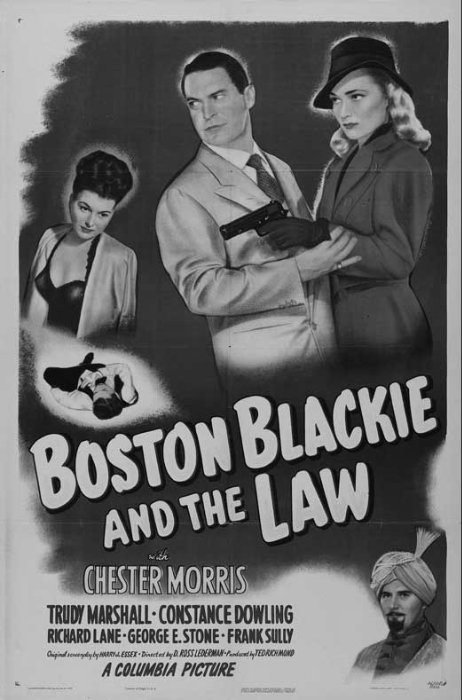 BOSTON BLACKIE AND THE LAW (1946)
BOSTON BLACKIE AND THE LAW (1946) (69 Min.) Genre: 1940 SUSPENSE, Transfer Quality: B
This twelfth entry in Columbia's "Boston Blackie" series is essentially a remake of 1942's Alias Boston Blackie. In the original, a falsely accused convict (Larry Parks) escapes while Blackie (Chester Morris) is putting on a magic show for a men's prison, prompting Blackie to stop the escapee before he can kill the man who framed him. In the remake, Blackie stages yet another magic act, this time at a woman's prison. Sure enough, a female inmate (Constance Dowling) escapes, determined to wreak vengeance on the man who done her wrong. Implicated in the escape, Blackie manages to clear himself and to extract a recorded confession from the actual killer. In both the original and the remake, Chester Morris is given ample opportunity to show off his considerable skills as a magician. — Hal Erickson
Starring: Chester Morris, Trudy Marshall, Constance Dowling, Richard Lane | Directed by: David Ross Lederman
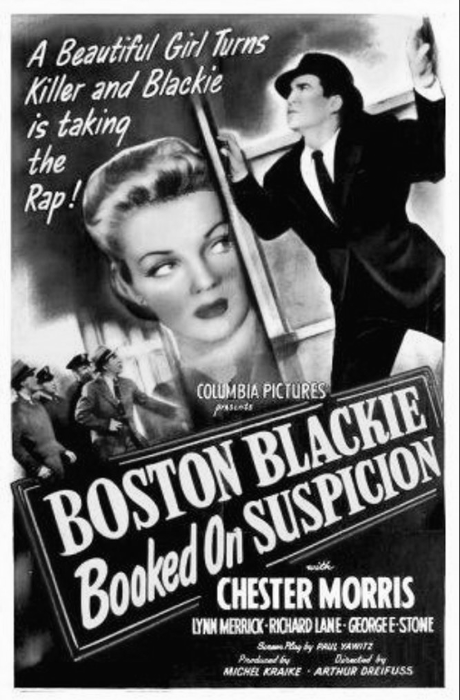 BOSTON BLACKIE BOOKED ON SUSPICION (1945)
BOSTON BLACKIE BOOKED ON SUSPICION (1945) (66 Min.) Genre: 1940 SUSPENSE, Transfer Quality: B
In this lively entry in the Boston Blackie mysteries, Blackie gets in trouble when he helps a friend auction off a first-edition Charles Dickens book and discovers that it was counterfeit. As a result of his involvement in the con, Blackie must clear himself after being accused of murder. — Sandra Brennan
Starring: Chester Morris, Richard Lane, George E. Stone, Frank Sully | Directed by: Arthur Dreifuss
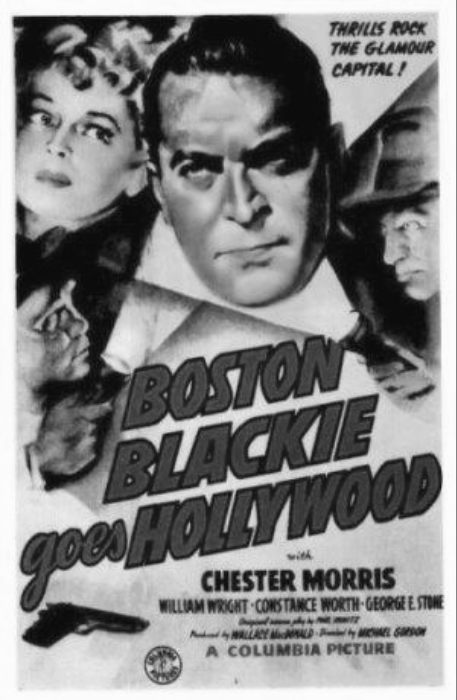 BOSTON BLACKIE GOES HOLLYWOOD (1942)
BOSTON BLACKIE GOES HOLLYWOOD (1942) (68 Min.) Genre: 1940 SUSPENSE, Transfer Quality: B
Reformed criminal Boston Blackie (Chester Morris) and his pal "The Runt" (George E. Stone) obey the film's title and head for Tinseltown. Blackie has been asked by a friend to transport $60,000 to California, but the L.A. cops assume that he's involved in the disappearance of the valuable Monterey Diamond. As always, Blackie spends a goodly portion of his time in disguise, assuming the identity of a bearded foreigner. Boston Blackie Goes Hollywood was the fourth in Columbia's series of B-pictures based on Jack Boyle's pulp-fiction character. — Hal Erickson
Starring: Chester Morris, George E. Stone, Richard Lane, Forrest Tucker | Directed by: Michael Gordon
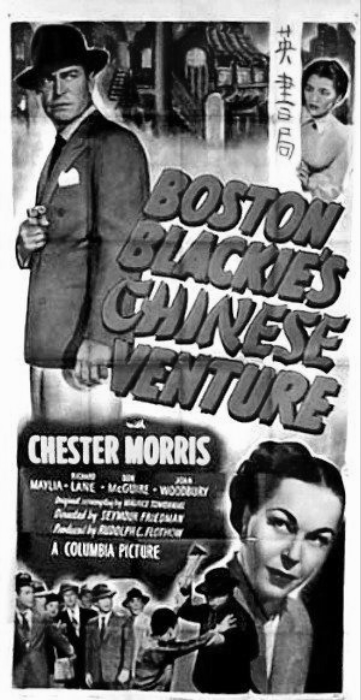 BOSTON BLACKIE'S CHINESE VENTURE (1949)
BOSTON BLACKIE'S CHINESE VENTURE (1949) (59 Min.) Genre: 1940 SUSPENSE, Transfer Quality: B
In this final episode of the Boston Blackie mystery series, our hero and his side-kick find themselves accused of murder after they are seen exiting a Chinese laundry where the proprietor is soon found murdered. Blackie must find the real killers before he gets in real trouble. Action and mystery ensue. — Sandra Brennan
Starring: Chester Morris, Joan Woodbury, Richard Lane, Don McGuire | Directed by: Seymour Friedman
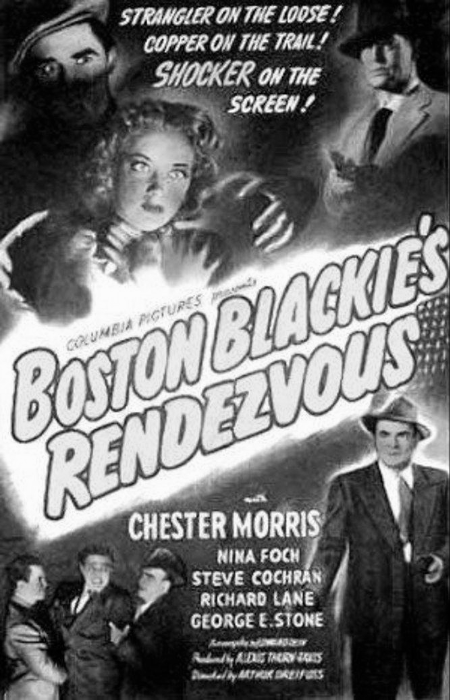 BOSTON BLACKIE'S RENDEZVOUS (1945)
BOSTON BLACKIE'S RENDEZVOUS (1945) (64 Min.) Genre: 1940 SUSPENSE, Transfer Quality: B
Boston Blackie's Rendezvous quite transcended its B-picture origins, and was easily the best of Columbia's "Boston Blackie" series. In this one, crook-turned-sleuth Blackie (Chester Morris) tries to track down homicidal maniac James Cook (Steve Cochran). This time it's personal: Cook has been committing a number of violent murders while posing as Blackie. Stuck in the middle is Sally Brown (Nina Foch), who is kidnapped by the villain so that Blackie will lay off. When asked in later years about Boston Blackie's Rendezvous, Nina Foch couldn't remember too many plot details, but did note with pride that costar Richard Lane (cast as Blackie's perennial nemesis Inspector Farraday) later became a prominent TV sportscaster. — Hal Erickson
Starring: Chester Morris, Nina Foch, Steve Cochran, Richard Lane | Directed by: Arthur Dreifuss
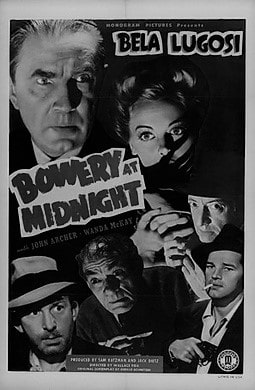 BOWERY AT MIDNIGHT (1942)
BOWERY AT MIDNIGHT (1942) (60 Min.) Genre: 1940 SUSPENSE, Transfer Quality: B
Bowery at Midnight casts Bela Lugosi as Professor Brenner, a psychology instructor at New York University (which looks a lot like Berkeley in the exterior shots!). When not enlightening his students -- most of them buxom Monogram starlets -- Brenner is engaged in charitable work, running a mission in the Bowery. In truth, however, the kindly professor is a fiend in human form, who uses his mission as a front for a vast criminal empire. When Judy (Wanda McKay), one of Brenner's students, stumbles onto the truth, she's targeted for extermination by the Dr. Jekyll-and-Mr. Hyde prof.
Starring: Bela Lugosi, John Archer, Wanda McKay, Tom Neal | Directed by: Wallace W. Fox
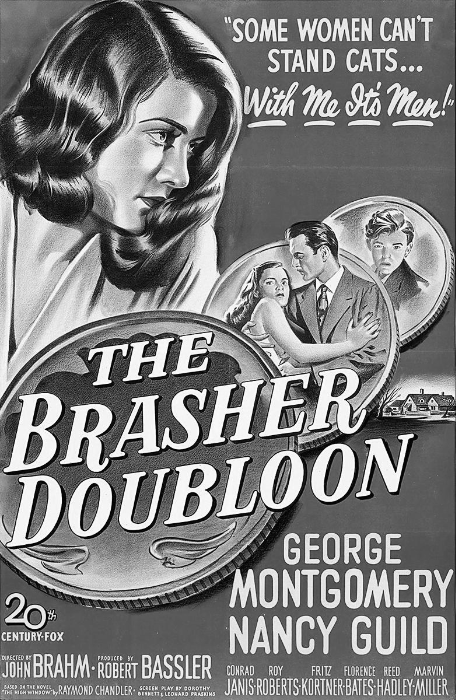 BRASHER DOUBLOON, THE (1947)
BRASHER DOUBLOON, THE (1947) (72 Min.) Genre: 1940 SUSPENSE, Transfer Quality: B
Raymond Chandler's famed detective Philip Marlowe (George Montgomery) is hired by a rich, eccentric widow, Mrs. Murdock (Florence Bates) to find and return a stolen gold coin. Marlowe quickly finds himself involved an a case which includes robbery, blackmail and murder. Just as Marlowe begins to solve the mystery, he is savagely beaten by Vannier (Fritz Kortner). Marlowe finally puts all the pieces of the puzzle together when he discovers a blackmail scheme involving Murdock's mentally-ill secretary, Merle Davis (Nancy Guild) which leads him to suspect his employer. The Brasher Doubloon, adapted from Chandler's novel, The High Window, and beautifully photographed by Lloyd Ahern captures a proper film noir sensibility with its moody, low-key images and dense, dark background shots, while failing to capture the complexity of the novel. Director John Brahm, who also directed the excellent films The Lodger and Hangover Square, is disappointing, failing to create the depth of characterization and plot which he showed in these films. The Brasher Doubloon remains bland, with undistinguished acting by the entire cast. The only exception is Fritz Kortner, a veteran character actor molded in the expressionist cinema of pre-war Berlin, who creates the grotesque character of Vannier, bringing a sense of evil vitality to an otherwise bland production.
Starring: George Montgomery, Nancy Guild, Conrad Janis, Roy Roberts | Directed by: John Brahm
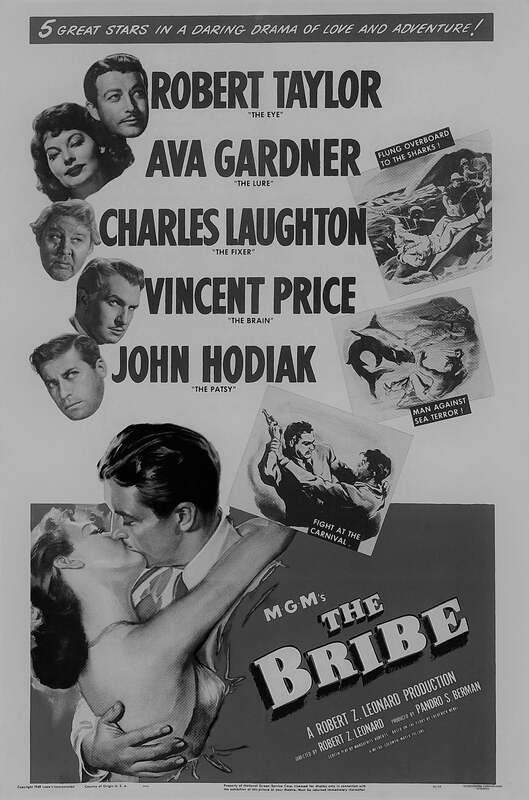 BRIBE, THE (1949)
BRIBE, THE (1949) (98 Min.) Genre: 1940 SUSPENSE, Transfer Quality: A
Federal agent Robert Taylor journeys to a mythical South American community, there to break up a war-surplus contraband racket. American playboy Vincent Price is the brains of the outfit, aided and abetted by the disreputable Charles Laughton and John Hodiak. Ava Gardner, Hodiak's wife, takes over for her husband when he's sidelined by a heart condition. Taylor tries to get to the gang boss by romancing Gardner; she eventually shifts loyalties, but Price tries to frame both Gardner and Taylor so that he can get off scot-free. Taylor finally manages to overcome Price during a oversized fireworks display at a local festival. Hampered by the old-fashioned direction of Robert Z. Leonard, The Bribe is slow going until its spectacular climax, which was later excerpted in toto and re-used in Steve Martin's detective spoof Dead Men Don't Wear Plaid (82). — Hal Erickson
Starring: Robert Taylor, Ava Gardner, Vincent Price, Charles Laughton | Directed by: Robert Z. Leonard
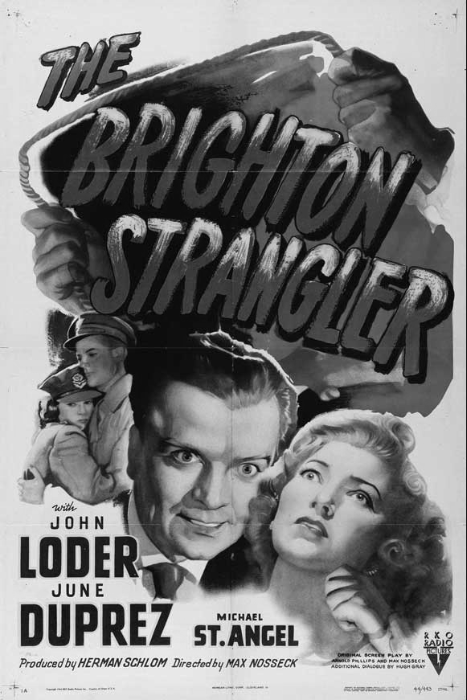 BRIGHTON STRANGLER, THE (1945)
BRIGHTON STRANGLER, THE (1945) (67 Min.) Genre: 1940 SUSPENSE, Transfer Quality: A
John Loder plays a prominent London actor, lately starring in a play about a maniacal strangler. When the theatre is bombed by the Nazis, Loder suffers a head injury. Thereafter, he cannot separate fact from fiction, and periodically becomes the strangler that he is playing on stage. Loder's lady love June Duprez puts her own life on the line in attempting to save Loder from himself. The Brighton Strangler benefits from its brisk 67-minute running time, which allows the story to unfold without undue padding or muddled psychological overtones. Interestingly, John Loder's character is triggered into becoming a murderer whenever someone inadvertently recites one of the lines from his play—a dramatic device later utilized to fuller effect in Richard Condon's The Manchurian Candidate. — Hal Erickson
Starring: John Loder, June Duprez, Miles Mander, Rose Hobart | Directed by: Max Nosseck
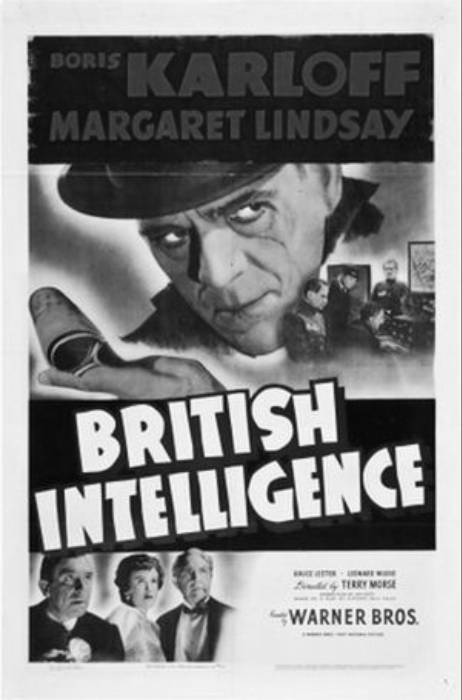 BRITISH INTELLIGENCE (1940)
BRITISH INTELLIGENCE (1940) (61 Min.) Genre: 1940 SUSPENSE, Transfer Quality: A
Though set during WW1, British Intelligence was obviously thrown together to capitalize on the outbreak of WW2. A remake of the 1930 espionager Three Faces East, the film stars Boris Karloff as Valder, the sinister butler of a British cabinet minister. It is quite possible that Valder is a German spy, and equally likely that the mysterious Helene von Lorbeer (Margaret Lindsay) is likewise working for the enemy. In fact, the audience is never quite certain who the good guys and bad guys really are until the climax, which takes place during a German zeppelin raid of London. As a balm to 1940 audiences, the film includes an early comedy scene in which German military protocol is upset by a clumsy corporal (Willy Kaufman) who bears a startling resemblance to a certain Nazi dictator. — Hal Erickson
Starring: Boris Karloff, Margaret Lindsay, Maris Wrixon, Leonard Mudie | Directed by: Terrell O. Morse
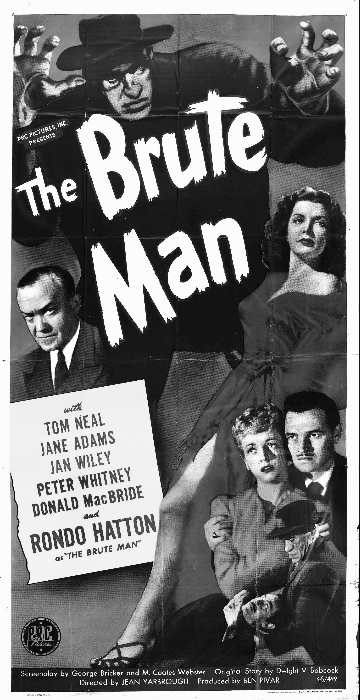 BRUTE MAN, THE (1946)
BRUTE MAN, THE (1946) (59 Min.) Genre: 1940 SUSPENSE, Transfer Quality: A
The tragic Rondo Hatton, whose acromegaly-disfigured face secured him meaty screen roles in Universal's horror films, had died of a heart attack some eight months before the release of his final film, The Brute Man. Hatton plays former college student Hal Moffat, who when his face is destroyed in a chemical lab mishap vows to get even with those he holds responsible. After murdering several of his former classmates, Moffat, known to the police as "The Creeper", takes refuge in the home of blind piano teacher Helen (Jane Adams). Unable to see Moffat's hideous facial features, Helen falls in love with him. Momentarily softened by her affections, Moffat determines to raise enough money to pay for a sight-restoring operation, and to that end steals a cache of valuable jewels from his ex-classmates Clifford and Virginia Scott (Tom Neal and Jan Wiley), killing Clifford in the process. A diligent police detective (Peter Whitney), also in love with Helen, dedicates himself to capturing the elusive Creeper. Originally produced by Universal, The Brute Man was ultimately sold to PRC Pictures. — Hal Erickson
Starring: Rondo Hatton, Jane Adams, Tom Neal, Jan Wiley | Directed by: Jean Yarbrough
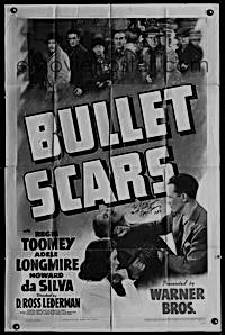 BULLET SCARS (1942)
BULLET SCARS (1942) (50 Min.) Genre: 1940 SUSPENSE, Transfer Quality: A
Although Warner Bros. "officially" disbanded its B-picture unit in 1941, the studio continued to grind out lower-berth features for the next three years. One of these was Bullet Scars, which had the look of a 1930s gangster meller which somehow escaped filming at the time of its inception. Decked out with a lavish toupee, Regis Toomey stars as country doctor Steven Bishop, who is strongarmed into operating on wounded bank robber Joe Madison (Michael Ames) without reporting the wound to the cops. Coerced into assisting Bishop is trained nurse Nora (Adele Longmir), who happens to be Madison's sister. Falling in love with Dr. Bishop, Nora helps him sneak a message to the cops, and the result is a noisy climactic shootout (pieced together with a handful of new shots and stock footage from earlier Warners epics). Variety was understating the case when it described Bullet Scars as "a very unpleasant film."
Starring: Regis Toomey, Adele Longmire, Howard Da Silva, Ben Welden, John Ridgely | Directed by: David Ross Lederman
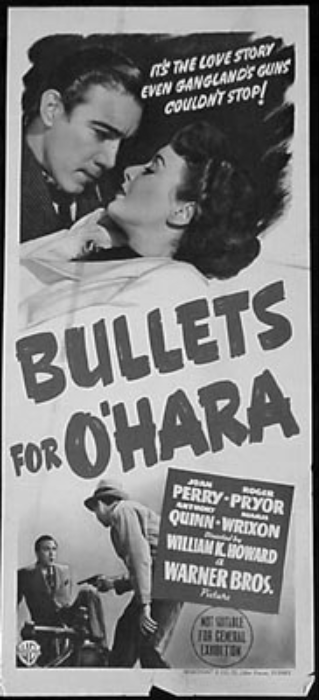 BULLETS FOR O'HARA (1941)
BULLETS FOR O'HARA (1941) (50 Min.) Genre: 1940 SUSPENSE, Transfer Quality: A
A good wife's innocence is shattered when she learns that her wealthy husband is actually an amoral big-shot jewel thief. She learns this when he brazenly robs some of their vacationing friends. Naturally she wants to leave him, but he won't let her and makes her return to Chicago and stay quiet. He doesn't realize that a detective is in hot pursuit. Once in Chi-town, the thief abandons the wife and she gets a divorce. Unfortunately, she ends up accused of the latest heist. After good friends help to clear her, she meets the detective. Together they plot an ingenious revenge that culminates in the capture of the crook and a new chance at happiness.
Starring: Joan Perry, Roger Pryor, Anthony Quinn, Dick Purcell | Directed by: William Howard
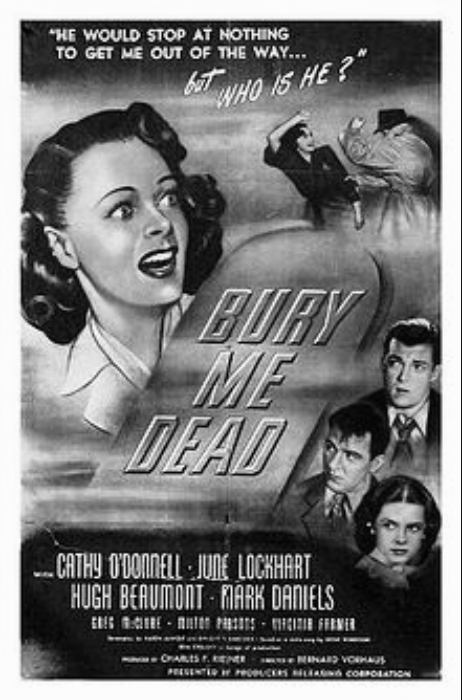 BURY ME DEAD (1947)
BURY ME DEAD (1947) (68 Min.) Genre: 1940 SUSPENSE, Transfer Quality: B
Two icons of 1950s television, June Lockhart and Hugh Beaumont, appear in uncharacteristic roles in the 1947 B-plus melodrama Bury Me Dead. It begins when Barbara Carlin (Lockhart) shows up amongst the mourners at a funeral. Thing of it is, it's her funeral-or at least it's supposed to be. With the help of family lawyer Michael Dunn (Hugh Beaumont), Barbara endeavors to find out who's been buried in her place?and who, if anyone, wants her dead enough to murder her. The prime suspects include Barbara's husband Rod (Mark Daniels) and sister Rusty (Cathy O'Donnell), who appear to be in the middle of an illicit affair. Ultimately, the instigator of Barbara's presumed death is revealed, but not in this synopsis.
Starring: Cathy O'Donnell, June Lockhart, Hugh Beaumont, Mark Daniels | Directed by: Bernard Vorhaus
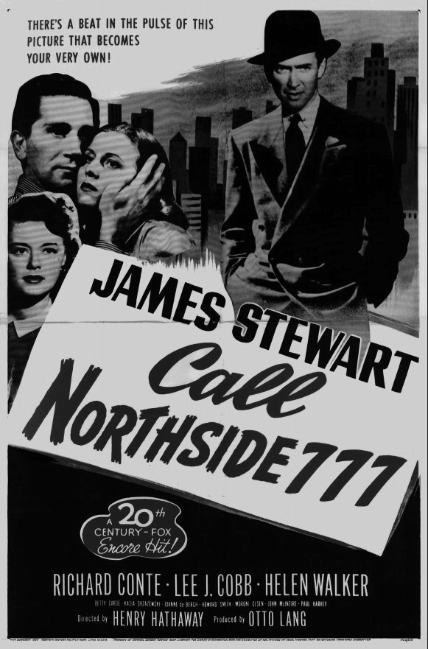 CALL NORTHSIDE 777 (1947)
CALL NORTHSIDE 777 (1947) (111 Min.) Genre: 1940 SUSPENSE, Transfer Quality: A
In this documentary-inspired thriller, P.J. McNeal (James Stewart) is a reporter who is asked by his editor to look into a potential story: their newspaper has been carrying an ad offering a substantial reward for information regarding the murder of a policeman that occurred eleven years ago. It turns out the ad was placed by a cleaning woman named Tillie Wiecek (Kasia Orzazewski); her son Frank (Richard Conte) was convicted of the crime, but she is thoroughly convinced her son had nothing to do with the killing. McNeal doesn't believe for a moment that Frank could be innocent, but he sees a good human interest story in Tillie and writes a piece that receives a great deal of favorable attention. Brian Kelly (Lee J. Cobb), McNeal's editor, thinks there might be more to this story and asks P.J. to look into the original murder case. To McNeal's surprise, Frank passes a lie detector test in which he proclaims his innocence, and the more he digs into records on the case, the more he finds wrong with the original investigation; some evidence is missing, much is inconclusive, and the reporter begins to wonder if Frank might have been railroaded after all, or if the police might be trying to keep something quiet. Call Northside 777 was based on a true story. — Mark Deming
Starring: James Stewart, Richard Conte, Lee J. Cobb, Helen Walker | Directed by: Henry Hathaway
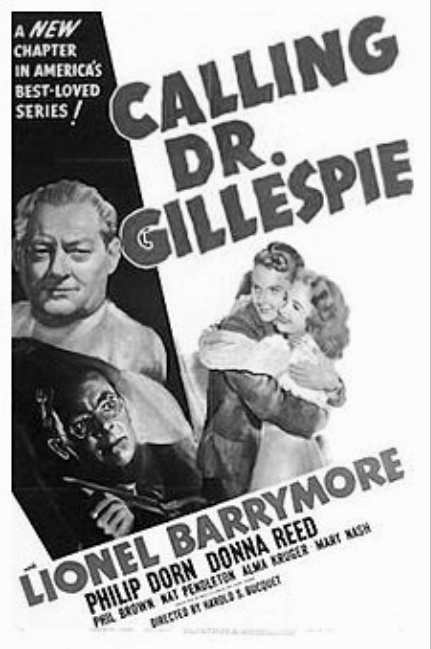 CALLING DR. GILLESPIE (1942)
CALLING DR. GILLESPIE (1942) (84 Min.) Genre: 1940 SUSPENSE, Transfer Quality: A
When Lew Ayres' wartime conscientious-objector status caused MGM to drop the actor like a hot potato, Ayres' "Dr. Kildare" series became the sole responsibility of Lionel Barrymore as the crusty Dr. Leonard Gillespie. In the first Kildare-less entry, Calling Dr. Gillespie, the ageing medico has a new assistant, refugee Dutch surgeon Dr. John Hunter Gerniede (Philip Dorn). Both Gillespie and Gerniede tackle the case of schizophrenic homicidal maniac Roy Todwell (Phil Brown), who is quite a handful to say the least. The story comes to a more suspenseful conclusion than usual as Todwell stalks Gillespie in the dead of night. MGM star-to-be Ava Gardner has a tiny, uncredited bit role. — Hal Erickson
Starring: Lionel Barrymore, Philip Dorn, Donna Reed, Phil Brown | Directed by: Harold S. Bucquet
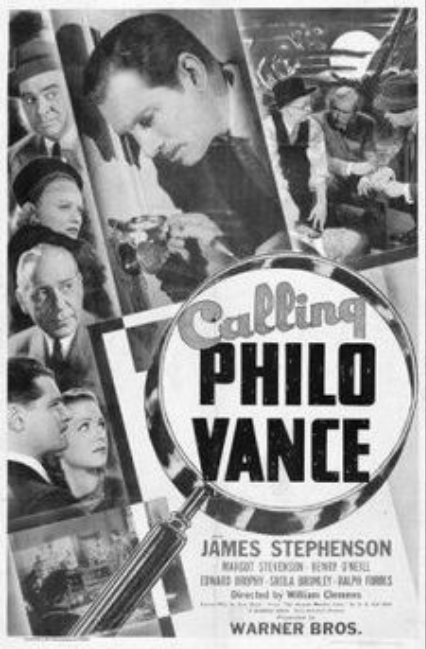 CALLING PHILO VANCE (1940)
CALLING PHILO VANCE (1940) (62 Min.) Genre: 1940 SUSPENSE, Transfer Quality: A
Calling Philo Vance is a perfunctory remake of 1933's The Kennel Murder Case, which many aficionados consider the best of the "Vance" films. James Stephenson plays the titular gentleman sleuth, who must solve the murder of the inventor of a revolutionary new bombsight (the original film concerned a championship dog race). The principal suspect is the victim's brother, who is taken out of the running when he, too, is bumped off. The actual killer is in the employ of an unnamed foreign government-and, in the tradition of Kennel Murder Case, is also the least suspicious and most cooperative of the suspects. With Calling Philo Vance, mystery novelist S. S. Van Dine's dilettante detective bade farewell to the screen for seven years, returning in 1947 through the facilities of low-budget PRC Pictures. — Hal Erickson
Starring: James Stephenson, Margot Stevenson, Henry O'Neill, Edward S. Brophy | Directed by: William B. Clemens
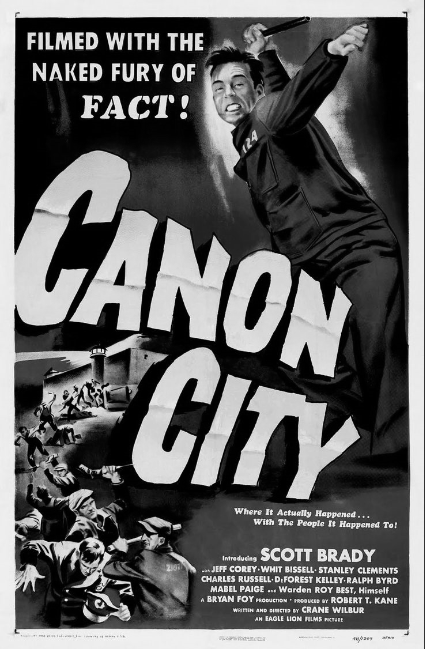 CANON CITY (1948)
CANON CITY (1948) (82 Min.) Genre: 1940 SUSPENSE, Transfer Quality: B
This suspenseful crime drama reenacts the famed 1947 prison break out of the Canon City, Colorado corrections facility and features the actual warden, Roy Best playing himself. The trouble begins when one prisoner manages to fashion a crude pistol. Enlisting the aid of eleven others, they successfully escape and terrorize the town until the warden and his men manage to round up the survivors and bring them back.
Starring: Warden Roy Best, Robert Bice, Whit Bissell, Raymond Bond, Scott Brady, Ralph Byrd, DeForest Kelley | Directed by: Crane Wilbur
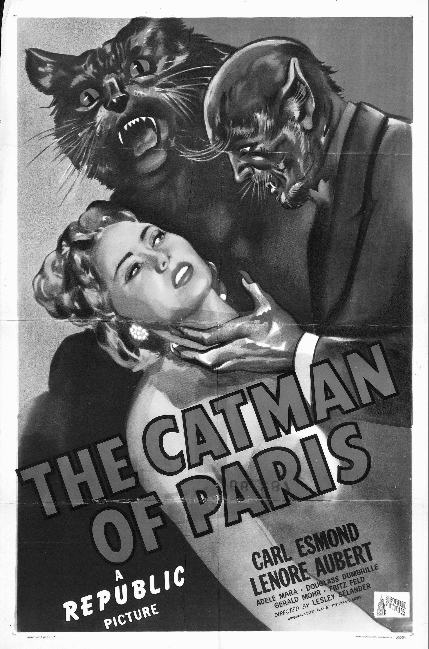 CATMAN OF PARIS, THE (1946)
CATMAN OF PARIS, THE (1946) (65 Min.) Genre: 1940 SUSPENSE, Transfer Quality: B
Horror films were not Republic Pictures' forte, as one can see while watching the stylish but pedestrian Catman of Paris. Carl Esmond stars as Charles Reigner, an amnesia victim who may or may not be fiendish "Catman" who has been cutting a homicial swath throughout Gay Paree. Essentially a Jeckyll-Hyde story, the film borrows a page from Oscar Wilde's anco 7 Argentina's first 1946 release, Christina stars screen favorite Zully Moreno as the title character. It's the old saw about the country lass who finds herself cast adrift in the Big City. She finds brief happiness in the arms of wealthy Esteban Serador, but he turns out to be a cad and a bounder. To no one's surprise, Moreno is rescued by hometown sweetheart Alberto Closas, who has remained faithful through it all. Very standard stuff, Christina coasts by on the appeal of Zully Moreno, who seems much too intelligent to be mouthing the inane dialogue she is given.
Starring: Carl Esmond, Lenore Aubert, Douglas Dumbrille, Gerald Mohr | Directed by: Lesley Selander
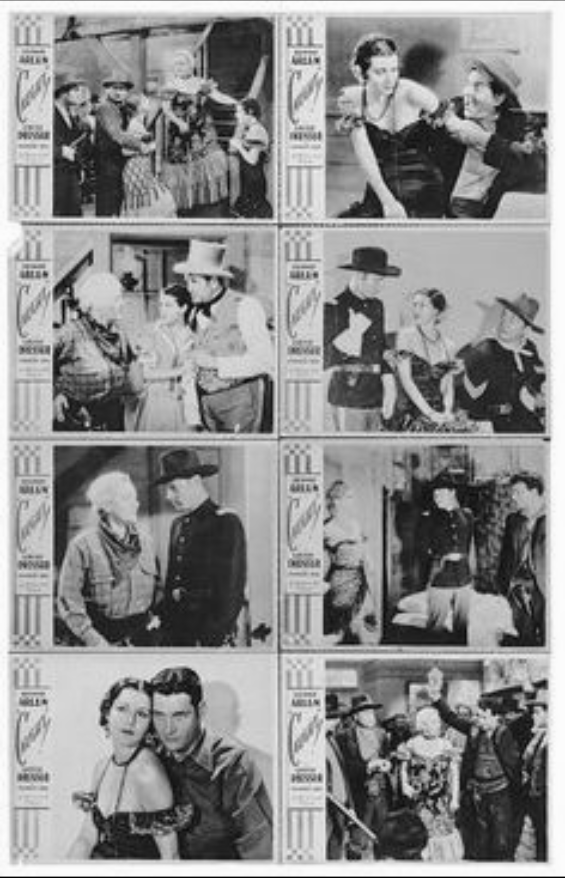 CAUGHT (1949)
CAUGHT (1949) (90 Min.) Genre: 1940 SUSPENSE, Transfer Quality: A
It doesn't take a nuclear scientist to figure out that Smith Ohrig, the character played by Robert Ryan in Caught, is a thinly disguised takeoff of Howard Hughes. But whereas Howard Hughes was merely paranoid and eccentric, Smith Ohrig is an all-out psycho. Impulsively marrying ambitious model Leonora Eames (Barbara Bel Geddes), Ohrig keeps the poor girl a virtual prisoner in his palatial mansion, tormenting her with twisted mind games while he continues his premarital playboy activities. Coming to the realization that wealth and creature comforts are no substitute for stability, Leonora takes a "normal" job in the offices of society doctor Larry Quinada (James Mason). Falling in love with her boss, Leonora nonetheless returns to Ohrig when he turns on his patented charm. Only an act of God (accelerated by Ohrig's hedonistic lifestyle) rescues Leonora from a life of lavish bondage. Billed as Max Opuls on the credits of Caught, director Max Ophuls manages to implant his own distinctive style upon what is essentially a slick Hollywood studio product. — Hal Erickson
Starring: James Mason, Barbara Bel Geddes, Robert Ryan, Ruth Brady | Directed by: Max Ophüls
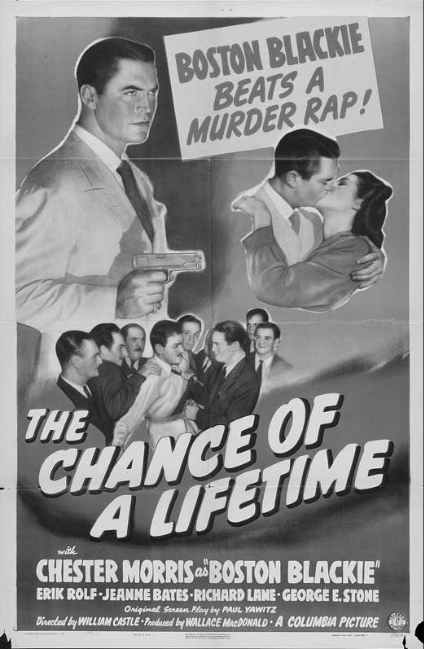 CHANCE OF A LIFETIME, THE (1943)
CHANCE OF A LIFETIME, THE (1943) (66 Min.) Genre: 1940 SUSPENSE, Transfer Quality: B
This lively entry in the "Boston Blackie" series finds Blackie (Chester Morris) acting as spiritual leader of a group of ex-convicts. The plan is for the former inmates to redeem themselves by working in a defense plant. Only problem: some of the cons (Douglas Fowley, Arthur Hunnicutt et. al.) have no intention of going straight and are planning a major robbery. Predictably, suspicion falls upon the only honest one (Erik Rolf) in the bunch — and upon Blackie, who is himself a previous "guest of the state." Chance of a Lifetime represents the first directorial effort of William Castle, who later claimed that, saddled with a hopeless project, he made the film "work" by re-arranging the reels in the editing room (it sure doesn't look like it was put together that way!) — Hal Erickson
Starring: Chester Morris, Erik Rolf, Jeanne Bates, Richard Lane | Directed by: William Castle
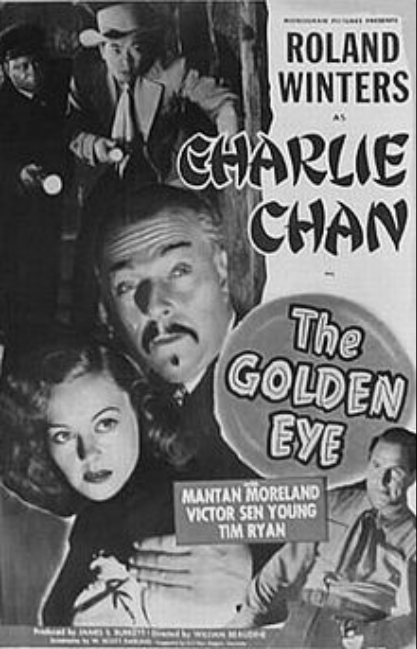 CHARLIE CHAN AND THE GOLDEN EYE (1948)
CHARLIE CHAN AND THE GOLDEN EYE (1948) (69 Min.) Genre: 1940 SUSPENSE, Transfer Quality: D
The Golden Eye is a Charlie Chan mystery set on a Southwestern ranch. A once-dormant mine mysteriously begins to yield gold, bringing out the worst characteristics of several people involved. When murder enters the picture, Charlie Chan interrupts his vacation and investigates, with the dubious aid of his son Tommy (Victor Sen Yung) and his perennially frightened chauffeur Birmingham Brown (Mantan Moreland). The script for this film lifts many elements from several earlier sources, including the "high-heeled nun" bit from Hitchcock's The Lady Vanishes (38). The fourth Monogram "Charlie Chan" film to star Roland Winters as the soft-spoken Chinese sleuth, The Golden Eye is salvaged by the effortless expertise of comic relief Mantan Moreland. — Hal Erickson
Starring: Roland Winters, Mantan Moreland, Tim Ryan, Bruce Kellogg | Directed by: William Beaudine
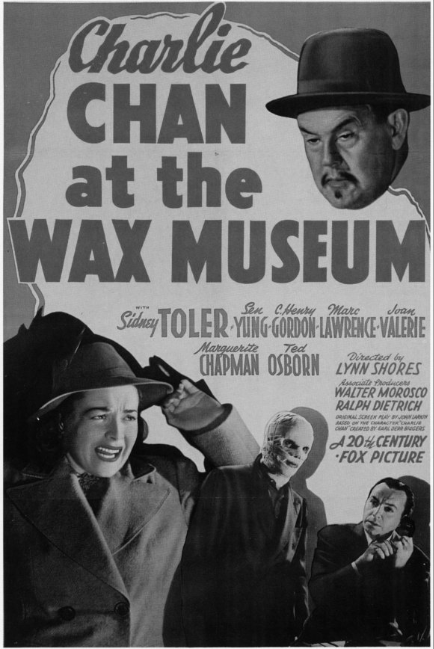 CHARLIE CHAN AT THE WAX MUSEUM (1940)
CHARLIE CHAN AT THE WAX MUSEUM (1940) (63 Min.) Genre: 1940 SUSPENSE, Transfer Quality: B
Escaped gangster Steve McBirney (Marc Lawrence), vowing to get even with Oriental sleuth Charlie Chan (Sidney Toler), lies in wait at a spooky wax museum run by demented plastic surgeon Dr. Cream (Henry Gordon). Chan is lured to the museum's opening day ceremonies on a ruse, along with a variety of strange characters ranging from a girl reporter (Joan Valerie) to a radio announcer (played by real-life announcer Ted Osborn). The subsequent murder spree is complicated by the fact that no one-not even the wily Chan—can tell the wax effigies from real thing. The explanation of the film's events-and the revelation of the killer-are quite a surprise. With Charlie Chan at the Wax Museum, 20th Century-Fox's "Chan" series reached its peak: from here, it could only go downhill.
Starring: Sidney Toler, Marc Lawrence, Joan Valerie, Marguerite Chapman | Directed by: Lynn Shores
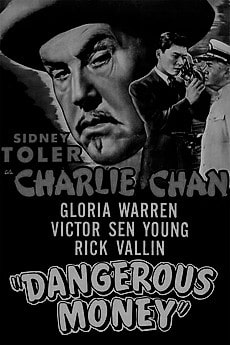 CHARLIE CHAN IN DANGEROUS MONEY (1946)
CHARLIE CHAN IN DANGEROUS MONEY (1946) (66 Min.) Genre: 1940 SUSPENSE, Transfer Quality: B
In this episode of the popular detective series, Chan, along with Number Two Son, are aboard a ship bound for Pago Pago. On route a federal agent is murdered. The two sleuths investigate. The film is also titled "Charlie Chan in Dangerous Money."
Starring: Sidney Toler, Victor Sen Yung, Gloria Warren, Bruce Edwards | Directed by: Terrell O. Morse
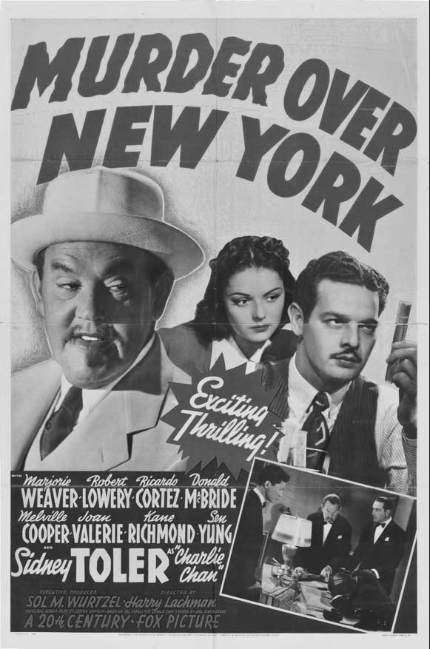 CHARLIE CHAN IN MURDER OVER NEW YORK (1940)
CHARLIE CHAN IN MURDER OVER NEW YORK (1940) (65 Min.) Genre: 1940 SUSPENSE, Transfer Quality: A
Murder Over New York finds Honolulu-based detective Charlie Chan (Sidney Toler) arriving in the Big Apple for a policeman's convention. No sooner has he arrived than Charlie is up to his neck in a murder mystery. This time the killing is tied in with a gang of enemy saboteurs, bent upon scuttling the test flight of a revolutionary new bomber plane. With the "help" of willing but inept Number Two Son (Victor Sen Yung), Charlie wades through a sea of suspects to finger the genuine killer. Among the film's highlights is a very funny "line-up" bit by an uncredited Shemp Howard; its low point is a lamentable stretch of racist humor involving black actor Clarence Muse.
Starring: Sidney Toler, Marjorie Weaver, Robert Lowery, Ricardo Cortez, Sen Yung | Directed by: Harry Lachman
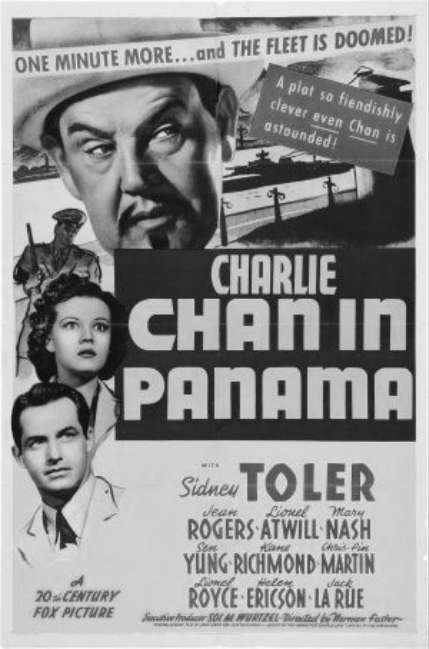 CHARLIE CHAN IN PANAMA (1940)
CHARLIE CHAN IN PANAMA (1940) (67 Min.) Genre: 1940 SUSPENSE, Transfer Quality: B
Charlie Chan in Panama was the first entry in the "Chan" series to capitalize on WW2. Sidney Toler stars as the wily oriental sleuth, who on this occasion must weed out an elusive enemy saboteur named Ryner, who plans to destroy the Panama Canal. Any one of the supporting characters might be the never-seen Ryner: Could it be illegal alien Kathi Lenesch (Jean Rogers), overly effusive Englishman Cliveden Compton (Lionel Atwill), straight-arrow Richard Cabot (Kane Richmond), slimy nightclub owner Montero (Jack LaRue), moonfaced middle-easterner Achmed (Frank Puglia), timid schoolmarm Jennie Finch (Mary Nash), or none of the above? Also on hand is Victor Sen Yung as Charlie's Number 2 son Jimmy, who is somewhat stupider than usual (if such a thing is possible). In an early scene, Charlie Chan neatly sums up his relationship with the bumbling Jimmy: "Man without relatives is man without problems."
Starring: Sidney Toler, Jean Rogers, Lionel Atwill, Mary Nash | Directed by: Norman Foster
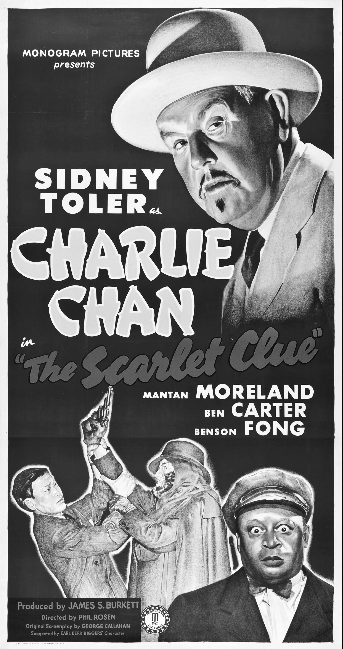 CHARLIE CHAN IN THE SCARLET CLUE (1945)
CHARLIE CHAN IN THE SCARLET CLUE (1945) (65 Min.) Genre: 1940 SUSPENSE, Transfer Quality: A
Birmingham Brown joins pal Charlie Chan (Sidney Toler) in solving this missing government documents mystery, set at a New York City radio station. Various media types are satirized in this unorthodox entry in the Monogram Pictures series. — Michael Hastings
Starring: Sidney Toler, Mantan Moreland, I. Stanford Jolley, Jack Norton | Directed by: Phil Rosen
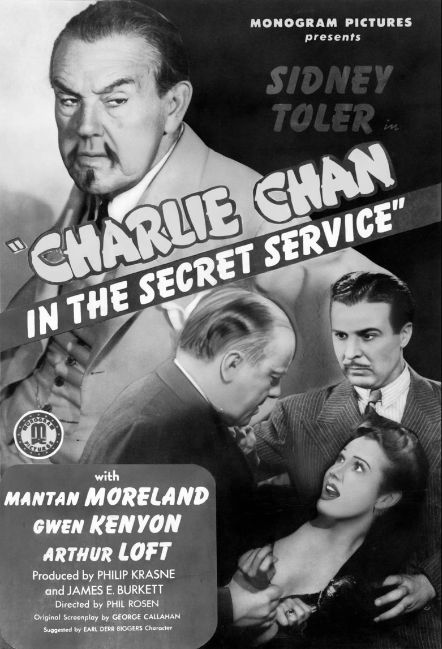 CHARLIE CHAN IN THE SECRET SERVICE (1944)
CHARLIE CHAN IN THE SECRET SERVICE (1944) (64 Min.) Genre: 1940 SUSPENSE, Transfer Quality: A
Having ended its 11-year run at 20th Century-Fox, the "Charlie Chan" series set up shop at Monogram with the singularly uninspiring Charlie Chan in the Secret Service. Sidney Toler returns as the famed oriental detective, who, per the title, is now a government agent. His first assignment is to solve the murder of an inventor and recover the victim's secret plans. Two reels into the picture, all action grinds to a halt as Chan wearily interrogates the suspects. The identity of the murderer might have caught some filmgoers by surprise in 1944, but seasoned mystery fans will beon to the game the minute the culprit is introduced. The one saving grace of Charlie Chan in the Secret Service is the stereotypical but undeniably funny comedy relief of Mantan Moreland, making his first appearance as pop-eyed chauffeur Birmingham Brown. — Hal Erickson
Starring: Sidney Toler, Gwen Kenyon, Mantan Moreland, Marianne Quon | Directed by: Phil Rosen
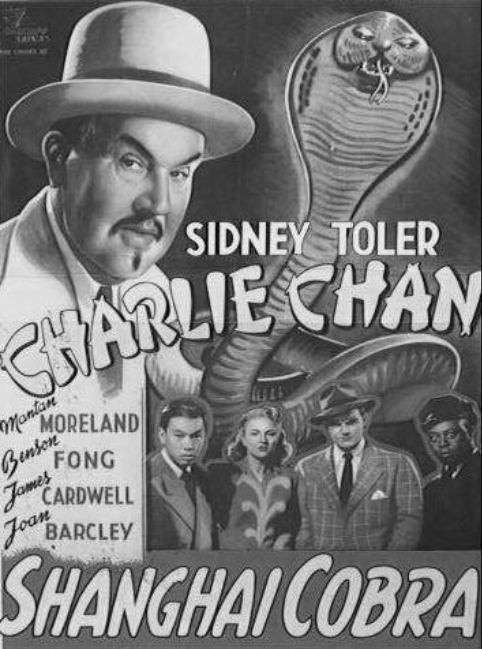 CHARLIE CHAN IN THE SHANGHAI COBRA (1945)
CHARLIE CHAN IN THE SHANGHAI COBRA (1945) (64 Min.) Genre: 1940 SUSPENSE, Transfer Quality: A
Just as Edgar C. Ulmer would at PRC around the same time, young Phil Karlson turned Monogram's almost nonexistent production values to his advantage in two Charlie Chan whodunits: The Shanghai Cobra (1945) and Dark Alibi (1946). Karlson added touches of film noir to the usual hoary Chan melodramatics and the result was arguably the best of the Monogram "Chans." In The Shanghai Cobra, Charlie (Sidney Toler) is investigating several murders connected with the manufacture of wartime radium. The employees of a bank connected with the radium experiments have an unfortunate tendency to get themselves killed by the injection of cobra venom. Charlie remembers a similar case back in Shanghai in 1935, but the suspect in those murders escaped. Since his face was damaged in an explosion, the only tell-tale sign to identify him is by a streak of white in an otherwise jet-black mane — unless of course the murderer has heard of hair dye. As always, Charlie's faithful if bumbling companions, Birmingham Brown (Mantan Moreland) and Tommy, the Number Three Son (Benson Fong), are along for the ride, offering their now patented sidekick humor. Toler, whose fondness for imbibing on the job was legendary, could basically sleepwalk through his role by 1945 and does so here. As for director Karlson's noir-ish touches, they quickly give way to business as usual, but the opening scenes of The Shanghai Cobra remain quite evocative. — Hans J. Wollstein
Starring: Sidney Toler, James Flavin, Benson Fong, Addison Richards | Directed by: Phil Karlson
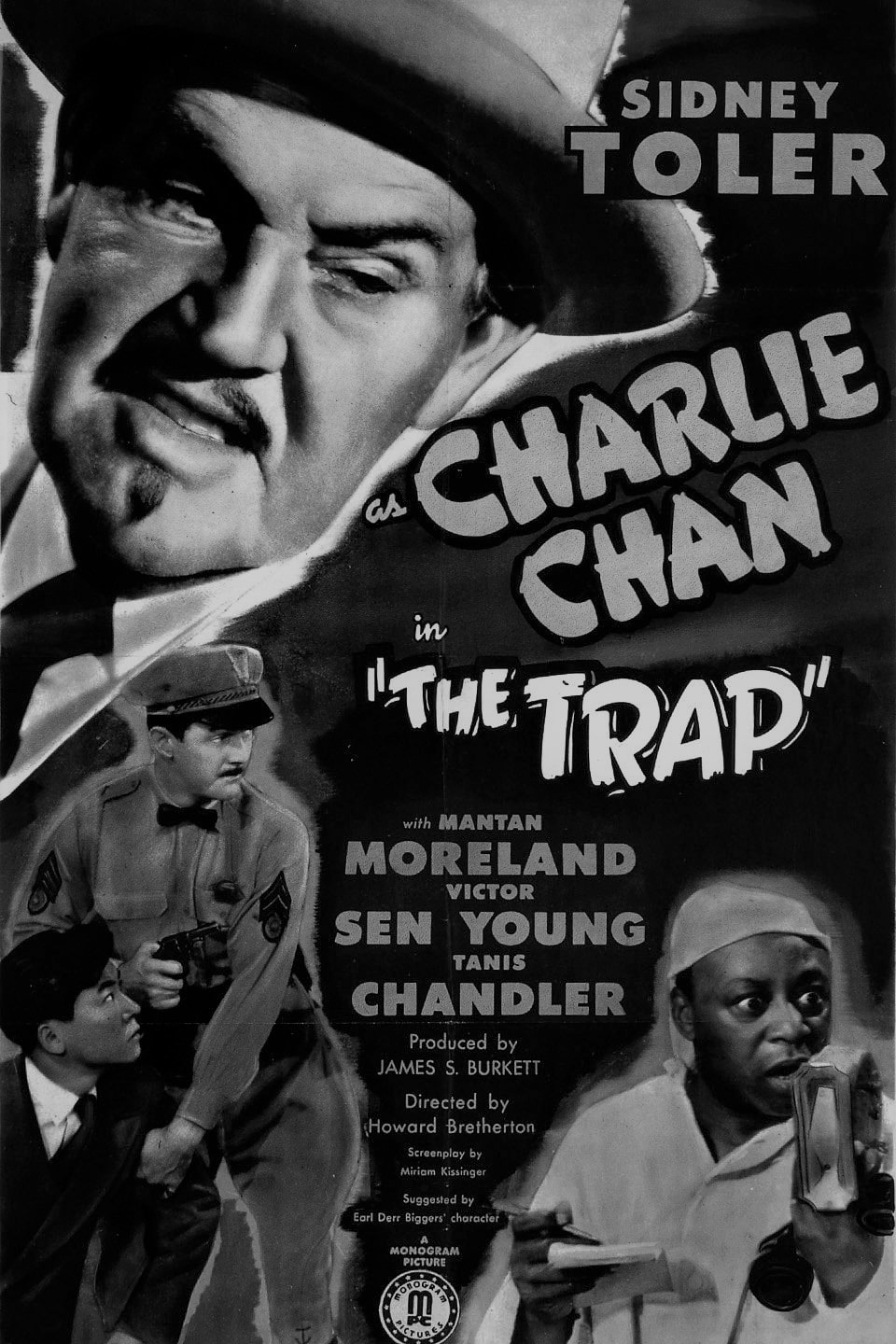 CHARLIE CHAN IN THE TRAP (1946)
CHARLIE CHAN IN THE TRAP (1946) (68 Min.) Genre: 1940 SUSPENSE, Transfer Quality: B
In this mystery, Charlie Chan (Sidney Toler) helps out an actress justly terrified for her own life after her fellow actors slowly begin to die horrible deaths. The homicides transpire at a Malibu beach house; Chan gathers all of the clues into one location and hones in on the killer. This marked Toler's last film appearance; Roland Winters inherited the role from him.
Starring: Sidney Toler, Mantan Moreland, Tanis Chandler, Anne Nagel | Directed by: Howard P. Bretherton
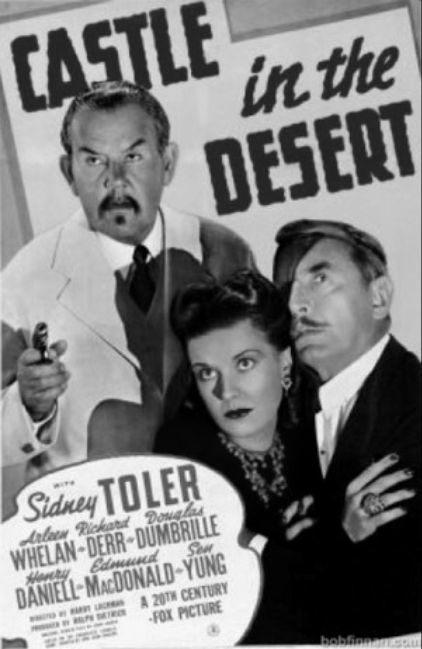 CHARLIE CHAN: CASTLE IN THE DESERT (1942)
CHARLIE CHAN: CASTLE IN THE DESERT (1942) (62 Min.) Genre: 1940 SUSPENSE, Transfer Quality: C
This final entry in 20th Century-Fox's "Charlie Chan" series is set in a huge mansion, smack-dab in the middle of the Mojave desert. When snoopy weekend guest Professor Gleason (Lucien Littlefield) is murdered, every member of the household falls under suspicion-none more so than Mr. Manderly (Douglass Dumbrille), the surly and highly secretive master of the household. Charlie Chan (Sidney Toler) and number two son Jimmy (Sen Yung) stumble into this nest of vipers and quickly get to work trying to unravel the mystery, which involves a collection of priceless artifacts and an old-fashioned torture chamber. An excellent series entry, Castle in the Desert would have been a worthy screen finale for the inscrutable Mr. Chan; alas, the character would be revived two years later in a much inferior series at Monogram. — Hal Erickson
Starring: Sidney Toler, Arleen Whelan, Richard Derr, Douglas Dumbrille | Directed by: Harry Lachman
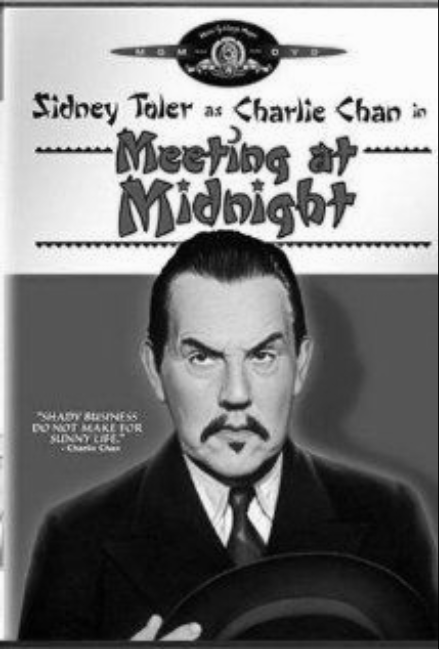 CHARLIE CHAN: MEETING AT MIDNIGHT (1944)
CHARLIE CHAN: MEETING AT MIDNIGHT (1944) (67 Min.) Genre: 1940 SUSPENSE, Transfer Quality: A
This Monogram Pictures entry in the Charlie Chan series follows our hero as he tracks down a killer involved in the occult. What's worse, Charlie's daughter is the primary suspect in the murders. — Michael Hastings
Starring: Sidney Toler, Mantan Moreland, Edward Earle, Claudia Dell | Directed by: Phil Rosen
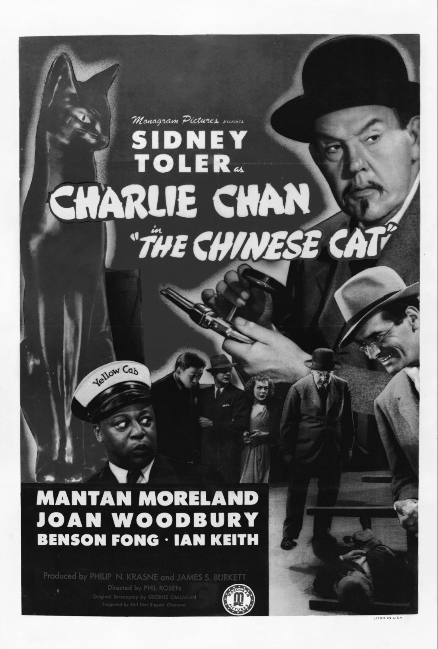 CHARLIE CHAN: THE CHINESE CAT (1944)
CHARLIE CHAN: THE CHINESE CAT (1944) (65 Min.) Genre: 1940 SUSPENSE, Transfer Quality: A
Charlie Chan's second mystery for Poverty Row company Monogram, The Chinese Cat is one of the inscrutable detective's better efforts. Director Phil Rosen keeps things moving at a reasonably expedient pace — especially for a Monogram programmer — and although the denouement is no big surprise, armchair detectives at least have no trouble keeping up with the redoubtable sleuth (Sidney Toler). Leah Manning (Joan Woodbury), of the San Francisco Mannings, enlists Chan's help in solving the murder of her stepfather (Sam Flint), whose slain body was found in his hermetically sealed study. The police have given up and only Charlie's deducing can refute a scurrilous book that blames Mrs. Manning (Betty Blythe), Leah's mother, for the crime. There are, of course, several worthy suspects, including a gang of diamond thieves lead by Catlen (Anthony Warde), the dead man's business partner (Cy Kendall), and even a "ghost" who isn't quite what he appears (John Davidson). A poisonous gas attack and the less than helpful efforts of Number Three Son (Benson Fong) complicate matters briefly, but Chan is, as always, on top of things all of the time and can soon reveal the identity of the guilty party. Comic sidekick Mantan Moreland has fun in a fun house, Fong is a worthy addition to Charlie's less than brainy brood (Number Three Son is, as Chan points out, "weak limb to which no family tree may point with pride"), and silent screen veterans Betty Blythe and Ian Keith do well enough with their limited assignments. — Hans J. Wollstein
Starring: Sidney Toler, Joan Woodbury, Mantan Moreland, Jack Norton | Directed by: Phil Rosen
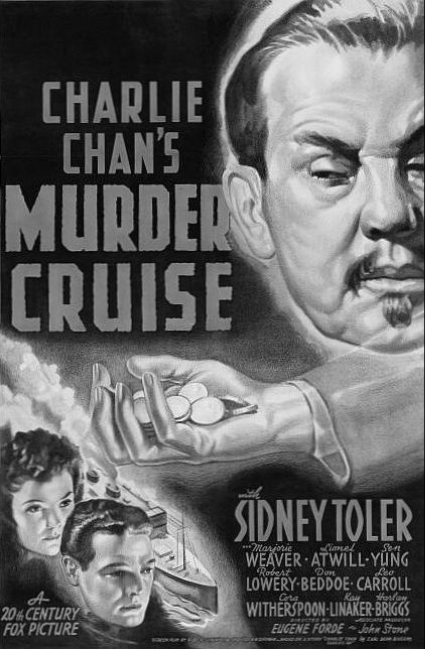 CHARLIE CHAN'S MURDER CRUISE (1940)
CHARLIE CHAN'S MURDER CRUISE (1940) (75 Min.) Genre: 1940 SUSPENSE, Transfer Quality: A
Though the 1931 Fox release Charlie Chan Carries On apparently no longer exists, modern viewers can get a general idea of the film's quality by taking a look at its 1940 remake, Charlie Chan's Murder Cruise. On the verge of revealing the identity of an international murderer, a Scotland Yard man is himself killed in the Honolulu offices of detective Charlie Chan (Sidney Toler). The only existing clues point to the fact that the murderer is one of several passengers on a ship bound for San Francisco. In time-honored movie-mystery tradition, the ship's manifest is chock full of such suspicious types as Dr. Sudermann (Lionel Atwill), Professor Gordon (Leo G. Carroll) and religious fanatic Mr. Walters (Charles Middleton). Another murder takes place before Chan is able to expose the perpetrator with the help of the supposedly blinded widow (Kay Linaker) of the original victim. Comedy relief is provided by Victor Sen Yung as Chan's eternally bumbling Number Two son and by Cora Witherspoon as man-chasing spinster Susie Watson (a character originally portrayed as a youthful gold-digger by Marjoire White in Charlie Chan Carries On). — Hal Erickson
Starring: Sidney Toler, Marjorie Weaver, Lionel Atwill, Robert Lowery | Directed by: Eugene J. Forde
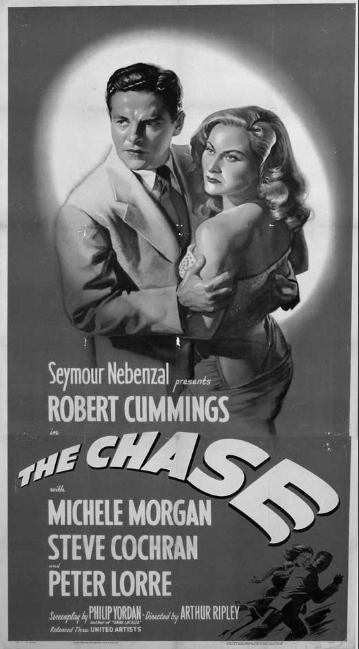 CHASE, THE (1946)
CHASE, THE (1946) (84 Min.) Genre: 1940 SUSPENSE, Transfer Quality: B
Originally slated for release through Monogram Pictures, The Chase was ultimately distributed by United Artists. Adapted by Philip Yordan from Cornell Woolrich's The Black Path of Fear (a perennial of the radio series Suspense), the film stars Robert Cummings as Chuck, shell-shocked ex-GI. Tormented by bizarre dreams, Chuck is drawn into the orbit of racketeer Roman (Steve Cochran). Hired as Roman's chauffeur, Chuck deals as best he can with his boss' faithless wife Lorna (Michele Morgan) and sinister henchman Gino (Peter Lorre). Persuaded by Lorna to help her escape the brutish Roman, Chuck agrees, only to end up accused of a murder he didn't commit. Thus begins the chase of the title, with Chuck eluding not only the authorities but also the stiletto-wielding Gino. Just when it seems that Chuck has cleared himself and all's right with the world, the story takes an unexpected turn, thrusting the hero back into a nightmarish maelstrom. — Hal Erickson
Starring: Robert Cummings, Michèle Morgan, Peter Lorre, Steve Cochran, Lloyd Corrigan, Jack Holt | Directed by: Arthur Ripley
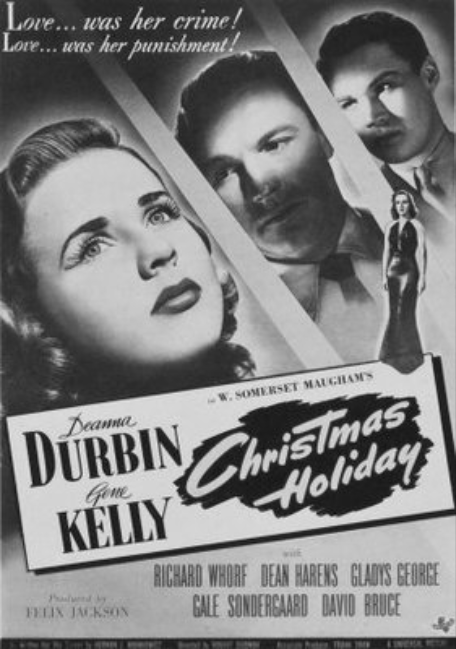 CHRISTMAS HOLIDAY (1944)
CHRISTMAS HOLIDAY (1944) (92 Min.) Genre: 1940 SUSPENSE, Transfer Quality: B
Don't be fooled by the title. Christmas Holiday is a far, far cry from It's a Wonderful Life. Told in flashback, the story begins as Jackie Deanna Durbin, marries Southern aristocrat Robert Monette Gene Kelly. Unfortunately, Robert has inherited his family's streak of violence and instability and soon drags Jackie into a life of misery. When her husband commits murder, Jackie is compelled by Robert's equally degenerate mother (Gale Sondergaard) to cover up the crime. When Robert is arrested, Jackie, tormented by the love she still holds for her husband, runs away from the family home, changing her name and securing work as a singer in a New Orleans dive. Robert escapes from prison and makes his way to Jackie's dressing room. Holding a reporter hostage, he threatens to kill both Jackie and the waylaid sailor who has been listening to her story. An astonishing change of pace from Deanna Durbin's usual lightweight musical fare, Christmas Holiday (based, believe it or not, on a story by Somerset Maugham) is one of the bleakest film noirs of the 1940s. Durbin is merely adequate in her role, but Gene Kelly gives a disturbingly convincing portrayal as a man virtually devoured by his inner demons. Robert Siodmak, directs with his usual flair, using a taut, suspenseful screenplay by Herman J. Mankiewicz. — Hal Erickson
Starring: Deanna Durbin, Gene Kelly, Dean Harens, Gale Sondergaard, Gladys George | Directed by: Robert Siodmak
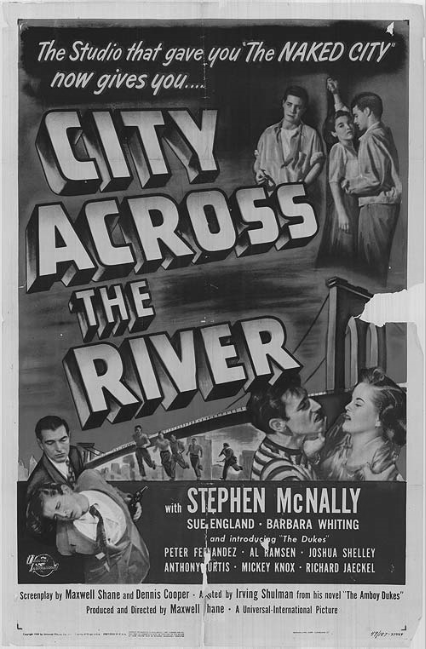 CITY ACROSS THE RIVER (1949)
CITY ACROSS THE RIVER (1949) (90 Min.) Genre: 1940 SUSPENSE, Transfer Quality: A
This slightly bowdlerized version of Irving Shulman's The Amboy Dukes was used by Universal-International to showcase several of its new male contractees. Set in the slums of Brooklyn, the film follows the exploits of the Amboy Dukes, a teenaged street gang. Foremost among the Dukes is Frank Cusack (Peter Fernandez), who loses all opportunity to escape his grim existence when he accidentally kills his high-school teacher. The film tries to demonstrate that the so-called "code of the streets"—never rat on a pal—is possibly more destructive than any brass knuckle or switchblade. Maxwell Shane and Dennis Cooper's screenplay resists any temptation to sentimentalize the kids or trivialize their plight; the closest the film comes to comedy relief are the shattered romantic illusions of the near-moronic Crazy Perrin. Prominent among the supporting players are Thelma Ritter as Frank Cusack's anguished mother, Stephen McNally as a community center counselor, and Anthony (Tony) Curtis as the leather-jacketed gang leader. — Hal Erickson
Starring: Stephen McNally, Thelma Ritter, Luis Van Rooten, Jeff Corey, Tony Curtis | Directed by: Maxwell Shane
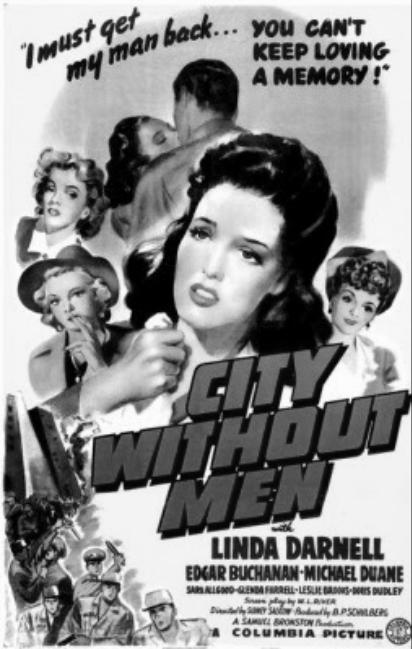 CITY WITHOUT MEN (1943)
CITY WITHOUT MEN (1943) (75 Min.) Genre: 1940 SUSPENSE, Transfer Quality: B
A young woman's husband has been imprisoned for a crime he didn't commit. In order to be near him to try to help him get his sentence overturned, she moves into a boardinghouse near the prison whose residents are the wives of inmates.
Starring: Linda Darnell, Edgar Buchanan, Glenda Farrell, Leslie Brooks, Doris Dudley, Margaret Hamilton, Rosemary DeCamp, Sheldon Leonard | Directed by: Sidney Salkow
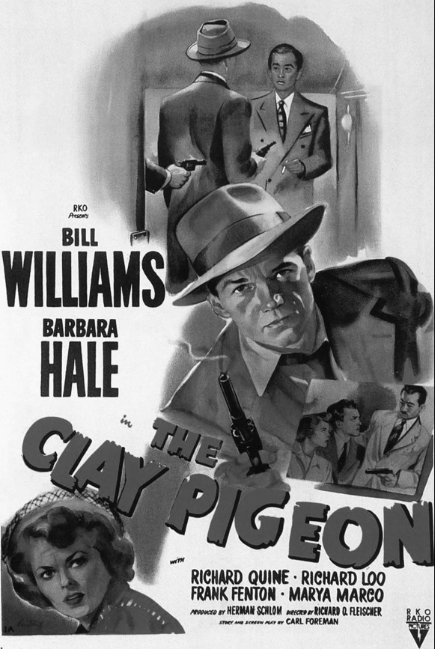 CLAY PIGEON, THE (1949)
CLAY PIGEON, THE (1949) (63 Min.) Genre: 1940 SUSPENSE, Transfer Quality: A
Richard O. Fleischer made his feature-film directorial debut with the well-crafted melodrama Clay Pigeon. Inspired by a true story, the film stars Bill Williams as Jim Fletcher, whose wartime experiences in a Japanese POW camp have left him with profound emotional problems. Awakening from a coma in a naval hospital, Jim is astonished to learn that he's been accused of murder. Not quite certain of his own guilt or innocence, he escapes from the hospital in search of his best friend, another ex-POW named Ted Niles (Richard Quine). En route, he is forced to kidnap Martha Gregory (Barbara Hale, Williams' real-life wife), the widow of the murdered man. Martha despises Jim at first, but is won over to his side when it becomes obvious that someone has set Jim up as a fall guy. Clay Pigeon was the first RKO film produced under the new Howard Hughes regime. — Hal Erickson
Starring: Bill Williams, Barbara Hale, Richard Quine, Richard Loo, Martha Hyer | Directed by: Richard Fleischer
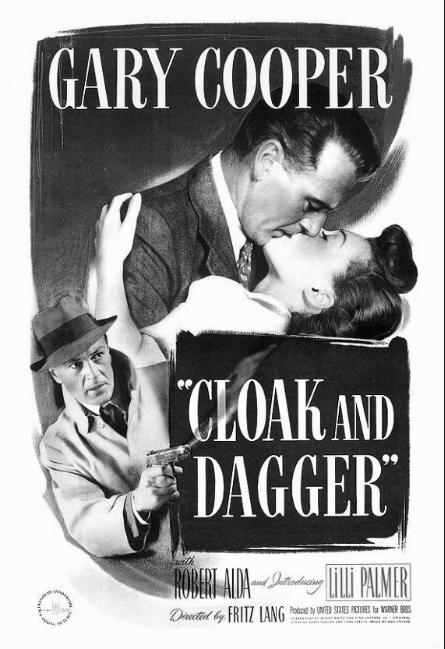 CLOAK AND DAGGER (1946)
CLOAK AND DAGGER (1946) (106 Min.) Genre: 1940 SUSPENSE, Transfer Quality: A
Inspired by actual events, Cloak and Dagger was first major "atomic power" melodrama of the postwar era. Gary Cooper stars as bookish physics professor Alvah Jesper, a character obviously based on A-bomb codeveloper J. Robert Oppenheimer. Pressed into service by the OSS in the last months of WW2, Jasper is sent to Europe in search of Dr. Polda (Vladimir Sokoloff), an atomic scientist held captive by the Nazis. In Switzerland, Jesper quickly runs afoul of enemy spies who murder the only person to know Polda's whereabouts. Moving on to Italy, he links up with the partisans, falling in love with gorgeous resistance fighter Gina (Lilli Palmer). Adopting a disguise, Jesper finally locates Polda and spends the last few reels in a desperate dash to freedom. Screenwriters Albert Maltz and Ring Lardner Jr. had originally intended Cloak and Dagger as a warning to a complacent America. Director Fritz Lang recalled in later years that, as conceived and filmed, the ending was to have occured after Jesper and a group of Allied soldiers stumbled upon the ruins of a secret Nazi A-bomb factory, as well as evidence that the German scientists had fled to parts unknown with their atomic secrets intact. "It's day one of the Atomic Age", Jesper was to have noted ruefully, "And God help us if we think we can keep it a secret much longer." This lengthy coda was removed from the final release print, transforming a thought-provoking drama into a mere romantic thriller. — Hal Erickson
Starring: Gary Cooper, Lilli Palmer, Robert Alda, Vladimir Sokoloff | Directed by: Fritz Lang
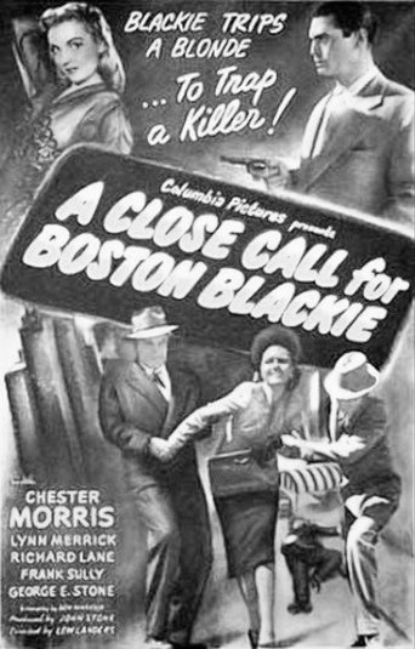 CLOSE CALL FOR BOSTON BLACKIE, A (1946)
CLOSE CALL FOR BOSTON BLACKIE, A (1946) (60 Min.) Genre: 1940 SUSPENSE, Transfer Quality: B
In this episode of the popular mystery series, the crook turned sleuth must clear his name after he is accused of murder. To help him, Blackie enlists the aid of his pal. Together they reveal the real murderer before the Inspector can put Blackie back in jail. — Sandra Brennan
Starring: Chester Morris, Lynn Merrick, Richard Lane, Frank Sully | Directed by: Lew Landers
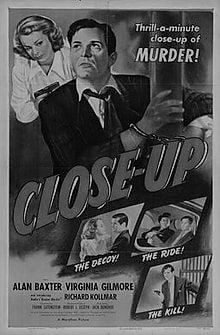 CLOSE-UP (1948)
CLOSE-UP (1948) (72 Min.) Genre: 1940 SUSPENSE, Transfer Quality: B
Filmed entirely on location in New York, Close-Up affords a rare starring role for character actor Alan Baxter. While on assignment, newsreel photographer Phil Sparr (Baxter) happens to film a passerby named Beaumont (Richard Kollmar). Suddenly, everyone is interested in what Sparr has captured on film, none more so than girl reporter Peggy (Virginia Gilmore). It turns out that both Beaumont and Peggy are members of a secret neo-Nazi organization, headed by the very mean-spirited Mr. Gibbons (Philip Huston). Taking advantage of his newfound "hero" status (he was usually the bad guy), Alan Baxter shows off his athletic prowess in a pulse-pounding climactic chase involving two speeding ferryboats.
Starring: Alan Baxter, Richard Kollmar, Virginia Gilmore, Joey Faye | Directed by: Jack Donohue
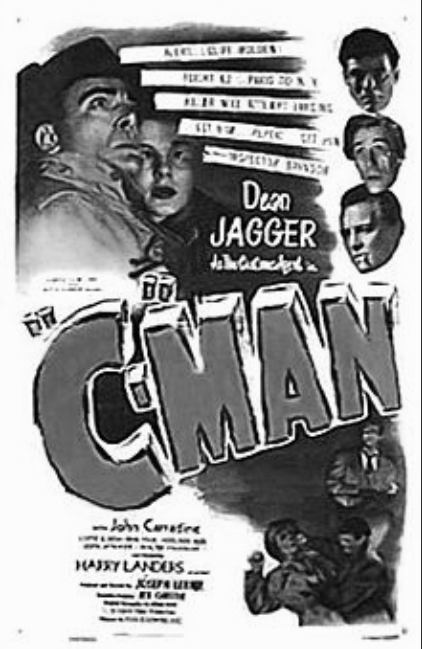 C-MAN (1949)
C-MAN (1949) (75 Min.) Genre: 1940 SUSPENSE, Transfer Quality: B
In the tradition of such big-budget "docudramas" as House on 92nd Street and Call Northside 777, the modestly budgeted C-Man adopts a quasi-documentary approach to its subject matter. The "C" stands for Customs, and indeed the leading character, Cliff Holden (Dean Jagger), is a detective for the U.S. Customs Department. Against a backdrop of genuine New York locations (with a few rather obvious back-projected shots thrown in), Holden puts the heat on a homicidal jewelry smuggler. John Carradine steals the show as an alcoholic doctor, reduced to fronting for the smugglers. The rest of the cast is populated with such Broadway regulars as Edith Atwater and Walter Brooke. Though it obviously cost next to nothing to produce, C-Man is far more atmospheric and suspenseful than many a major-studio effort.
Starring: Dean Jagger, John Carradine, Harry Landers, Rene Paul | Directed by: Joseph Lerner
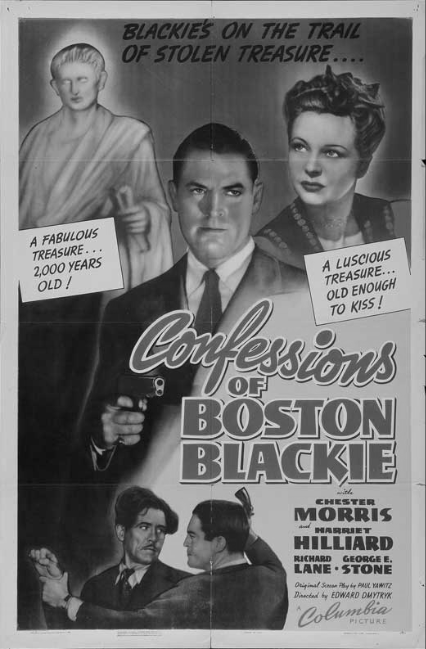 CONFESSIONS OF BOSTON BLACKIE (1941)
CONFESSIONS OF BOSTON BLACKIE (1941) (65 Min.) Genre: 1940 SUSPENSE, Transfer Quality: A
Chester Morris makes his second screen appearance as crook-turned-detective Boston Blackie in this superior series entry. This time, Blackie gets into trouble when he attends an art auction with his millionaire pal Arthur Manleder (Lloyd Corrigan). It so happens that the auction gallery is run by thieves, which heroine Diane Parrish (Harriet Hilliard) has just discovered. To keep her quiet, head crook Joe Buchanan (Ralph Theodore) takes a shot at Diane, but though he only wounds her he kills sculptor Allison (Walter Soderling). Conclusion-jumping Inspector Farraday (Richard Lane) assumes that Blackie fired the shot, forcing our hero to spend the rest of the film eluding both the police and the criminals. Highlights include a hilarious fit of rage perpetrated by secondary villainess Joan Woodbury, and an amusing if slightly sadistic running gag involving hapless ice-cream vendor Billy Benedict. — Hal Erickson
Starring: Chester Morris, Richard Lane, George E. Stone, Lloyd Corrigan | Directed by: Edward Dmytryk
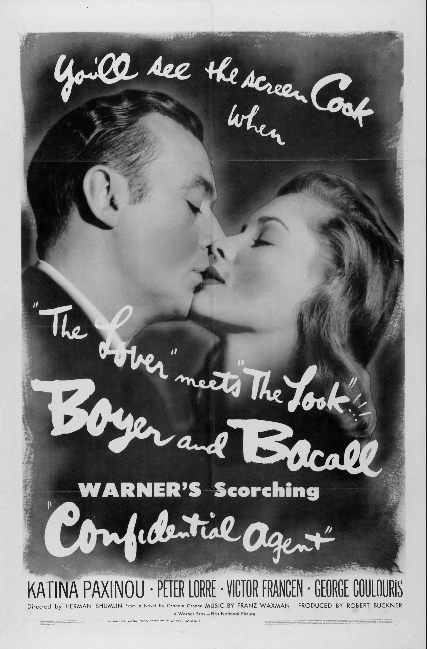 CONFIDENTIAL AGENT (1945)
CONFIDENTIAL AGENT (1945) (118 Min.) Genre: 1940 SUSPENSE, Transfer Quality: A
A Graham Greene novel was the source of the Warner Bros. espionage thriller Confidential Agent. Charles Boyer stars as Denard, a former concert musician operating as anti-Fascist secret agent in the Spanish Civil War. While negotiating with the neutral British for some much needed fuel supplies, Denard falls in love with gorgeous Rose Cullen (Lauren Bacall) Sympathetic to his cause, Rose helps Denard contend with such backstabbing villains as Contreras (Peter Lorre) and Mrs. Melandy (Katina Paxinou, who'd ironically won an Academy Award for her sympathetic potrayal in another Spanish Civil War drama, For Whom the Bell Tolls). Critics in 1945 liked Confidential Agent but trounced leading lady Lauren Bacall, suggesting that she was merely a pretty amateur who'd coasted to stardom via her associations with actor Humphrey Bogart and director Howard Hawks. At this point in her career, Bacall was inclined to agree with her detractors-though in time, she certainly proved them wrong. — Hal Erickson
Starring: Charles Boyer, Lauren Bacall, Wanda Hendrix, Peter Lorre, Katina Paxinou, George Zucco | Directed by: Herman Shumlin
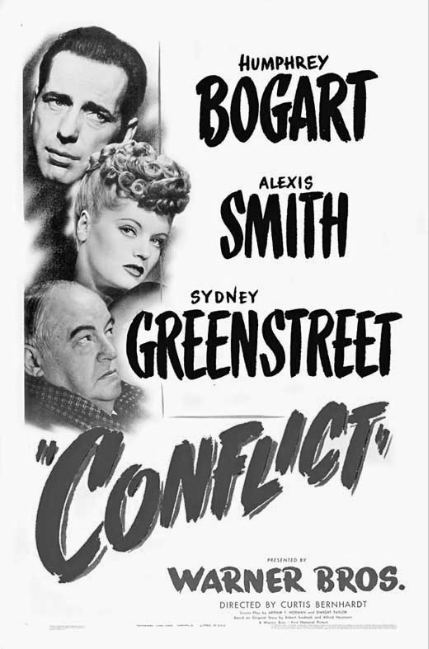 CONFLICT (1945)
CONFLICT (1945) (86 Min.) Genre: 1940 SUSPENSE, Transfer Quality: A
Filmed some eighteen months before its release, Conflict is one of two melodramas in which Humphrey Bogart self-consciously portrayed a wife murderer (the other was The Two Mrs. Carrolls). Bogie plays unhappily married Richard Mason, who concocts a meticulous scheme to kill his shrewish wife Kathryn (Rose Hobart) so that he'll be free to marry her sister Evelyn (Alexis Smith). Alas, Mason inadvertently tips his hand to family friend Dr. Mark Hamilton (Sydney Greenstreet). — Hal Erickson
Starring: Humphrey Bogart, Alexis Smith, Sydney Greenstreet, Rose Hobart | Directed by: Curtis Bernhardt
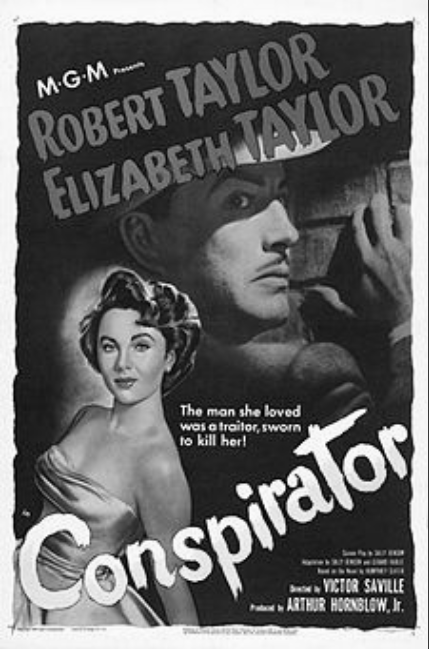 CONSPIRATOR (1949)
CONSPIRATOR (1949) (85 Min.) Genre: 1940 SUSPENSE, Transfer Quality: A
Elizabeth Taylor played her first grown-up romantic lead in the Anglo-American melodrama Conspirator. Taylor portrays Melinda Greyton, the new bride of highly respected Major Michael Curraugh (Robert Taylor). It comes as quite a jolt when Melinda learns that her husband is actually a spy for the communists (ironically, Robert Taylor had been one of the friendliest of friendly witnesses during the HUAC hearings.) Much of the film takes place in a picturesque Welsh village, an unusual setting for a tense espionage yarn. Reversing the usual MGM "tailor the story to the stars" formula, the storyline in Conspirator is sometimes more compelling than its leading players. Still, Liz Taylor acquitted herself nicely, proving that she'd have little difficulty tackling meaty dramatic roles in future films. — Hal Erickson
Starring: Robert Taylor, Elizabeth Taylor, Robert Flemyng, Honor Blackman | Directed by: Victor Saville
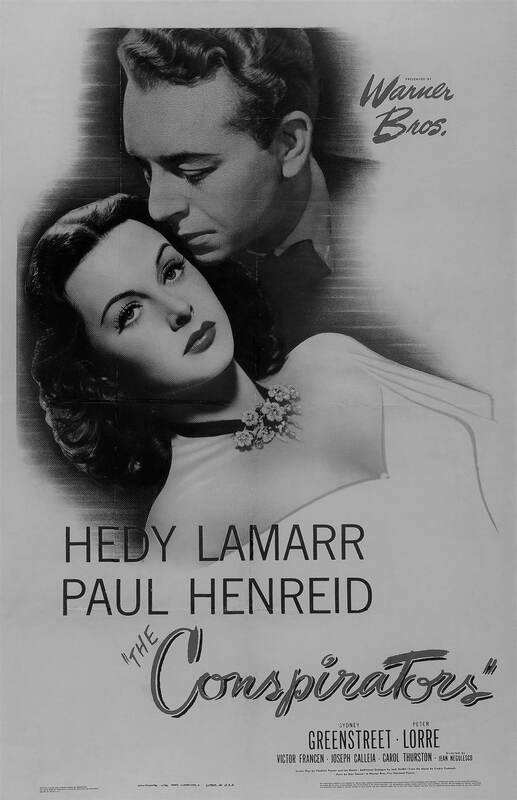 CONSPIRATORS, THE (1944)
CONSPIRATORS, THE (1944) (101 Min.) Genre: 1940 SUSPENSE, Transfer Quality: A
This Casablanca-esque spy thriller set during WWII centers on the exploits of the notorious "Flying Dutchman," a fugitive resistance leader from Holland who heads for Lisbon where he hooks up with other members of the underground. One of them is a beautiful young woman, and none of the others trust her because she is married to an important German official. For the resistance leader, real trouble comes when he is framed for the murder of a fellow agent. Still he escapes from prison and hides out with his other colleague while he works to prove that he is innocent and carry out a major secret mission for the resistance.
Starring: Hedy Lamarr, Paul Henreid, Sydney Greenstreet, Peter Lorre | Directed by: Jean Negulesco
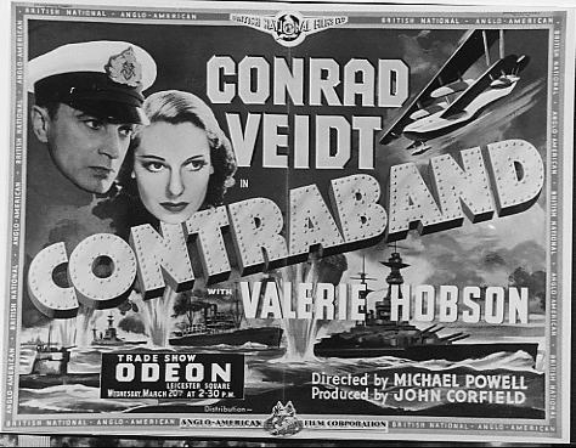 CONTRABAND (1940)
CONTRABAND (1940) (88 Min.) Genre: 1940 SUSPENSE, Transfer Quality: A
The Danish freighter Helvig approaches English waters in early 1940 and, in keeping with the needs of British security, it is boarded by customs and naval officials in search of contraband cargo. Her skipper, Captain Anderson (Conrad Veidt), is compelled to ascede to British demands, but dreads the delay, pointing out that the medical supplies in his cargo are vital. Anderssen is a dedicated seaman, all business, even where Mrs. Sorenson (Valerie Hobson), a headstrong passenger, is concerned. Then, on their first night in port, Mrs. Sorenson and a Mr. Pidgeon (Esmond Knight) disappear from the ship with Anderson's landing papers, the captain is in hot pursuit. Forced to join the woman in what seems a mad chase across London by night, he plunges into an Alice-in-Wonderland world of the blacked out city, following a set of clues through the maze of darkened streets and uncover a Nazi spy ring operating out of a basement in Soho. Each also discovers that there's a lot to admire and even possibly to love in the other — the challenge is for Hobson, who is something other than the divorcee and mother she pretends to be, to stay alive long enough for Captain Anderson to effect a rescue and prevent the German spies from turning the British counter-intelligence effort against the Allies. — Bruce Eder
Starring: Conrad Veidt, Valerie Hobson, Hay Petrie, Joss Ambler | Directed by: Michael Powell
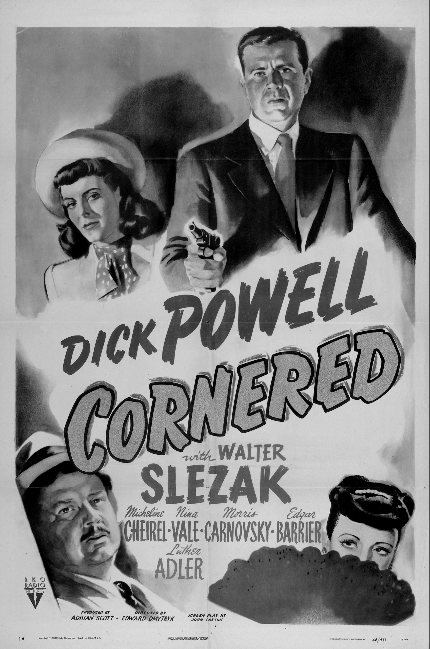 CORNERED (1945)
CORNERED (1945) (102 Min.) Genre: 1940 SUSPENSE, Transfer Quality: A
Canadian WW II pilot Gerard (Dick Powell) intends to track down and kill collaborationist Marcel Jarne, the man responsible for the wartime death of Gerard's French wife. The trouble is, Jarne has never been effectively identified by the authorities — and in fact could be just about anyone whom Gerard meets. Following the trail of evidence to Buenos Aires, Gerard's strongarm methods run afoul not only of the Argentine authorities, but also of a pro-French underground movement which also wants to bring the villain to justice. Weaselly Incza (Walter Slezak) plays all sides down the middle until he too is ruthlessly rubbed out by the bad guy. From start to finish, Cornered is a superb thriller, directed with graphic ingenuity and economy — and with a dash of endearingly naïve left-leaning politicizing (with Edward Dmytryk as director, how could it be otherwise?) Avoid at all costs the computer-colored version of this beautifully photographed black-and-white film. — Hal Erickson
Starring: Dick Powell, Walter Slezak, Nina Vale, Micheline Cheirel | Directed by: Edward Dmytryk
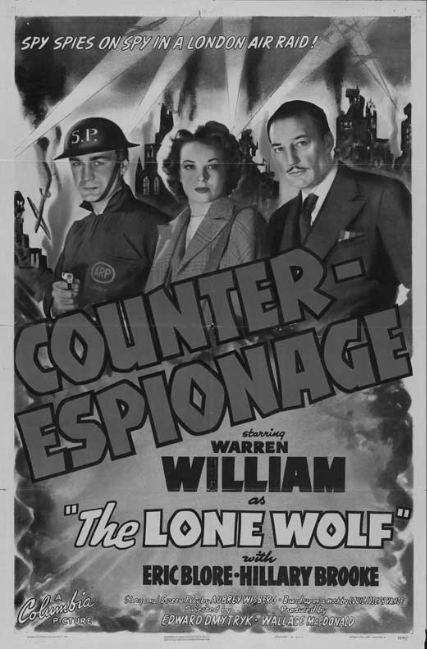 COUNTER-ESPIONAGE (1942)
COUNTER-ESPIONAGE (1942) (71 Min.) Genre: 1940 SUSPENSE, Transfer Quality: B
Counter-Espionage was the ninth film in Columbia's "Lone Wolf" series, based on characters created by Louis Joseph Vance. Warren William stars as Michael Lanyard, the suave ex-criminal known as The Lone Wolf. This time around, Lanyard is in London during the Blitz, where he finds himself up to his neck in Nazi spies. Counter-Espionage was one of several mid-1940s Columbia "series" films which dropped the name of the series from the title in hopes of attracting new audiences. Other examples of this trend include the "Blondie" episode It's a Great Life (43) and the "Boston Blackie" opus The Chance of a Lifetime (43).
Starring: Warren William, Eric Blore, Hillary Brooke, Thurston Hall | Directed by: Edward Dmytryk
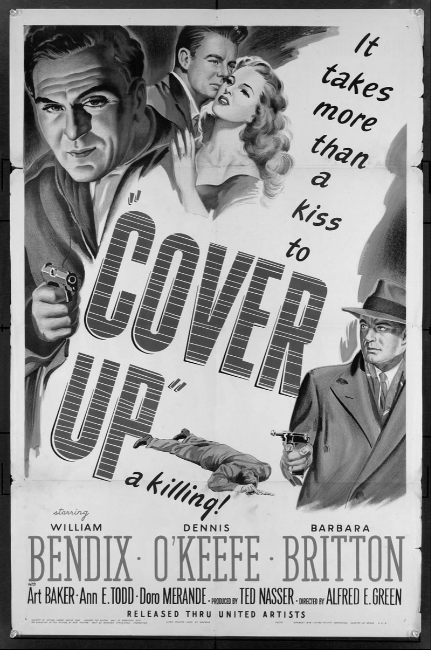 COVER-UP (1949)
COVER-UP (1949) (85 Min.) Genre: 1940 SUSPENSE, Transfer Quality: A
Cover-Up transfers the metropolitan "film noir" milieu to a small Midwestern town. Dennis O'Keefe plays Sam Donovan, an insurance detective, investigating the suicide of a policy holder. All signs point to murder, but no one in the victim's hometown is willing to cooperate with Donovan, least of all sheriff Larry Beat (William Bendix). Local girl Anita (Barbara Britton) breaks through the wall of silence and helps Donovan solve the mystery. Intriguingly, the action of Cover-Up takes place at Christmastime, with the tinselly Yuletide atmosphere providing stark contrast to the sordid murder story.
Starring: William Bendix, Dennis O'Keefe, Barbara Britton, Art Baker | Directed by: Alfred E. Green
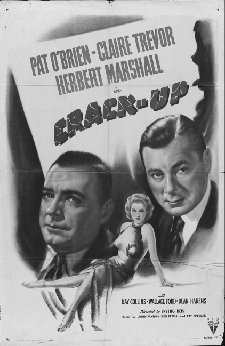 CRACK UP (1946)
CRACK UP (1946) (70 Min.) Genre: 1940 SUSPENSE, Transfer Quality: A
Art critic and forgery expert George Steele (Pat O'Brien) is apprehended by the police as he desperately tries to break into the Manhattan Museum in the opening scene of Crack-Up, a noir mystery directed by Irving Reis. Steele does not understand his own bizarre actions, but explains that he was in a train wreck and had to get back to the museum. Questioned by Lt. Cochrane (Wallace Ford), who tells him there have been no train wrecks in months, Steele relates, in flashback, the events leading up to the incident. Earlier in the day the head of the museum had suspended him for alienating wealthy patrons by criticizing "art snobs" in a lecture. He then received a phone call informing him that his mother was sick, and caught the train to the hospital, but never got there. Though suspicious of Steele, Cochrane is persuaded by the shadowy Mr. Traybin (Herbert Marshall) to release him so he can follow Steele. The next day Steele retraces his steps and discovers that someone had set him up to be discredited, though he knows neither who nor why. Following the murder of a friend who was trying to help him, he discovers that forgeries of some very famous paintings are at the heart of the matter, but getting to the culprit is a more difficult task. — Steve Press
Starring: Pat O'Brien, Claire Trevor, Herbert Marshall, Ray Collins, Wallace Ford | Directed by: Irving G. Reis
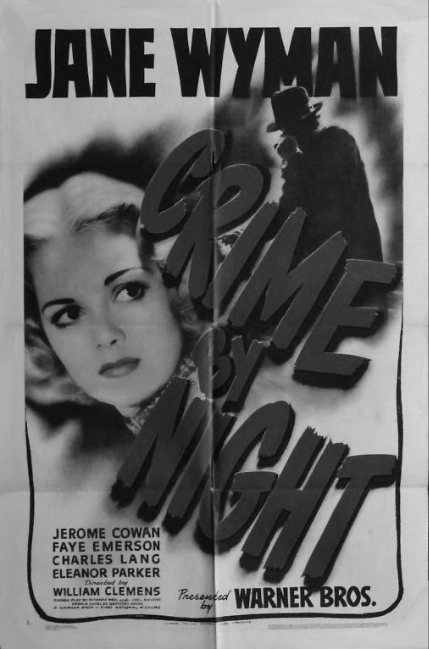 CRIME BY NIGHT (1944)
CRIME BY NIGHT (1944) (73 Min.) Genre: 1940 SUSPENSE, Transfer Quality: A
In this mystery, a detective and his secretary go on vacation and end up solving a murder. — Sandra Brennan
Starring: Jane Wyman, Jerome Cowan, Faye Emerson, Charles Lang , Eleanor Parker | Directed by: William B. Clemens
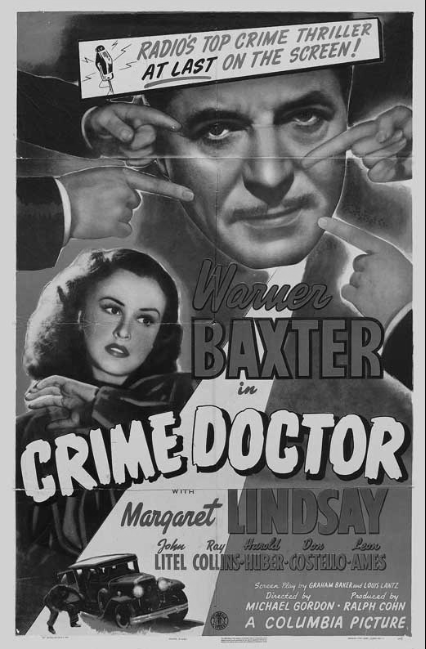 CRIME DOCTOR (1943)
CRIME DOCTOR (1943) (66 Min.) Genre: 1940 SUSPENSE, Transfer Quality: A
In this drama, based on a popular radio program, the leader of a ring of burglars suffers a blow to the head and loses his memory. Unable to remember anything about his past, he starts anew and becomes a psychiatrist. He never does stop trying to remember his past life, even while his present life continues to advance. He is soon made the head of the state parole board. There he gets entangled with former gang members, one of whom hits him in the head, again. Suddenly, he remembers. He gives himself up, but then receives a suspended sentence. — Sandra Brennan
Starring: Warner Baxter, Margaret Lindsay, John Litel, Ray Collins | Directed by: Michael Gordon
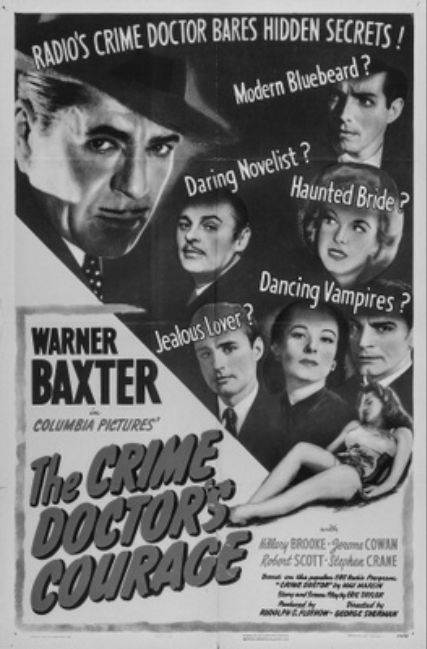 CRIME DOCTOR'S COURAGE, THE (1945)
CRIME DOCTOR'S COURAGE, THE (1945) (70 Min.) Genre: 1940 SUSPENSE, Transfer Quality: A
Warner Baxter makes his fourth appearance as Dr. Robert Ordway, criminal-turned-criminologist, in Crime Doctor's Courage. This time, Ordway investigates the murder of fortune-hunter Gordon Carson (Stephen Crane), not long after his marriage to wealthy Kathleen Carson (Hillary Brooke). It's just possible that Kathleen, taking into consideration the mysterious deaths of Carson's previous wives, may have killed her husband out of self-preservation. Ah, but there are several other suspects around and about, including a brace of Spanish dancers (Lupita Tovar and Anthony Caruso), an eccentric young man (Robert Scott) and a mystery novelist (Jerome Cowan). Murder-movie buffs will probably glom onto the killer's identity long before Dr. Ordway does.
Starring: Warner Baxter, Hillary Brooke, Jerome Cowan, Robert Scott | Directed by: George Sherman
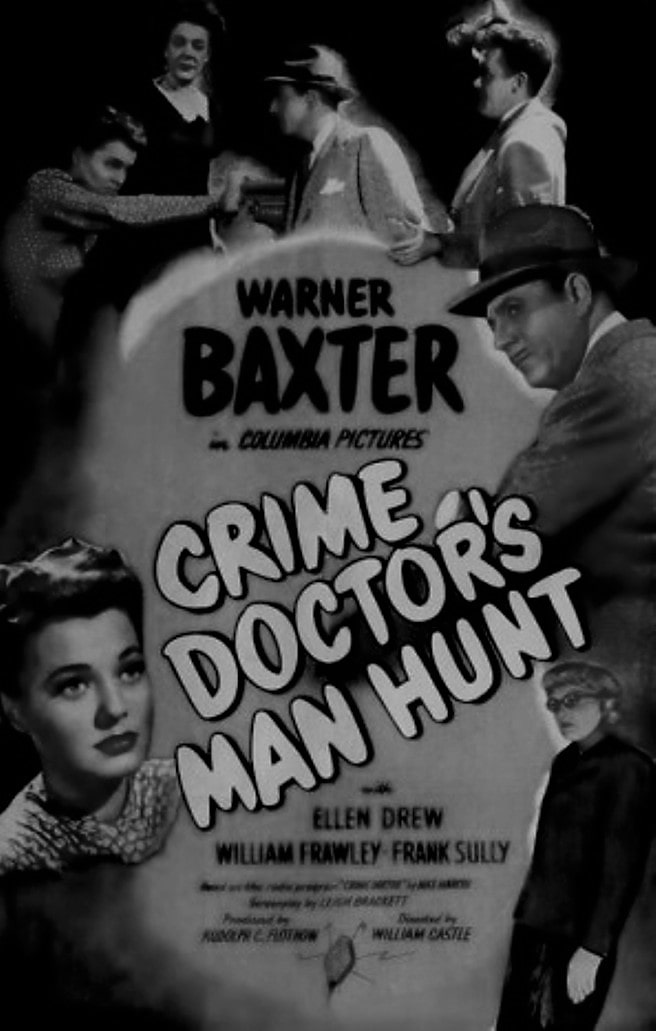 CRIME DOCTOR'S MANHUNT (1946)
CRIME DOCTOR'S MANHUNT (1946) (61 Min.) Genre: 1940 SUSPENSE, Transfer Quality: B
Scripted by Leigh Brackett of The Big Sleep fame and directed by future horrormeister William Castle, Crime Doctor's Manhunt has been singled out by many film buffs as the best of Columbia's "Crime Doctor" series. This time, criminal-turned-sleuth Dr. Robert Ordway (Warner Baxter) befriends amnesiac war veteran Philip Armstrong (Myron Healey), who is morbidly drawn to a small-town carnival. When Armstrong is murdered, Ordway recalls him saying that his death was preordained by sideshow fortune-teller Alfredi (Ivan Triesault). An interested observer to the events is Armstrong's meek fiancee Irene (Ellen Drew) whose cruel twin sister Natalie would seem to be the instigator of the murder. That's a swell theory-except for the fact that Natalie has been dead for two years! The film's best line is delivered by Inspector Manning (William Frawley), but to repeat it here would be giving away the ending.
Starring: Warner Baxter, Bernard Nedell, Francis Pierlot, Frank Sully | Directed by: William Castle
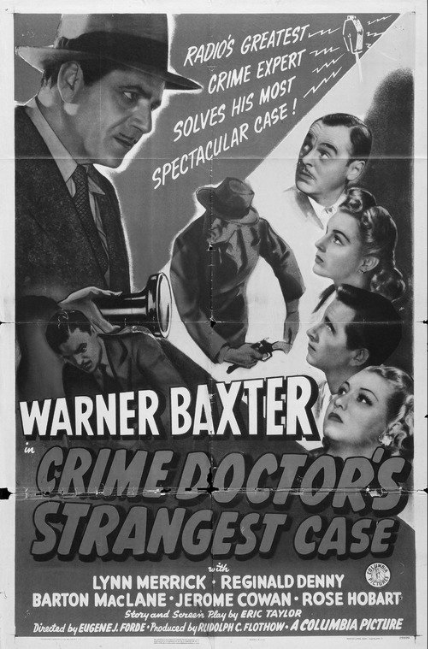 CRIME DOCTOR'S STRANGEST CASE (1943)
CRIME DOCTOR'S STRANGEST CASE (1943) (68 Min.) Genre: 1940 SUSPENSE, Transfer Quality: A
This second entry in Columbia's "Crime Doctor" series once again stars Warner Baxter as Dr. Ordway, a former criminal turned criminologist. In this outing, Ordway is called in to analyze the dreams of elderly Patricia Cornwall (Virginia Brissac). It is hoped that this will provide a clue to the long-ago disappearance of Patricia's husband-not to mention $30,000. Naturally, there's at least one person who doesn't want the secret revealed, and that's the person who murdered Cornwall and hid his body in the basement of a popular café. Could the guilty party be Diana Burns (Rose Hobart), widow of Cornwall's former partner, who has just become a murder victim himself? Billed ninth in the cast of Crime Doctor's Strangest Case is young Columbia contractee Lloyd Bridges. — Hal Erickson
Starring: Warner Baxter, Barton MacLane, George Lynn, Rose Hobart | Directed by: Eugene J. Forde
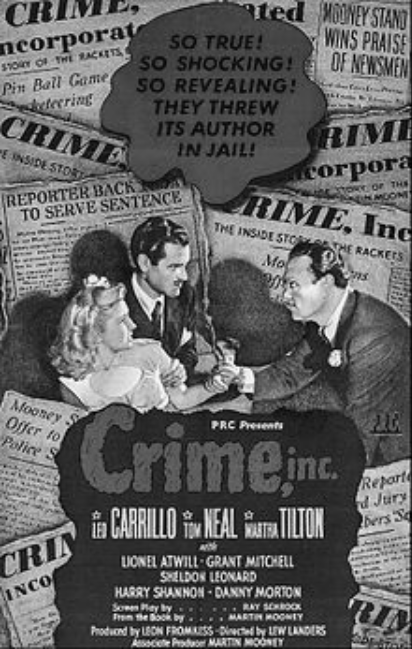 CRIME, INC. (1945)
CRIME, INC. (1945) (82 Min.) Genre: 1940 SUSPENSE, Transfer Quality: B
More expensive-looking than most PRC productions, Crime Inc. is based on a story by former crime reporter Martin Mooney. Drawing from his own experiences, Mooney has concocted a tale of a newspaper journalist who faces a prison term because he refuses to reveal his sources. Tom Neal plays the Mooney counterpart, a crime reporter who takes on a gang of racketeers. His effectiveness is somewhat diluted when he falls in love with Martha Tilton, the sister of one of the crooks. Further complicating things is the fact that the foreman of a jury listening to testimony against the racketeers is in fact the leader of the gang.
Starring: Leo Carrillo, Tom Neal, Martha Tilton, Lionel Atwill, Grant Mitchell, Sheldon Leonard | Directed by: Lew Landers
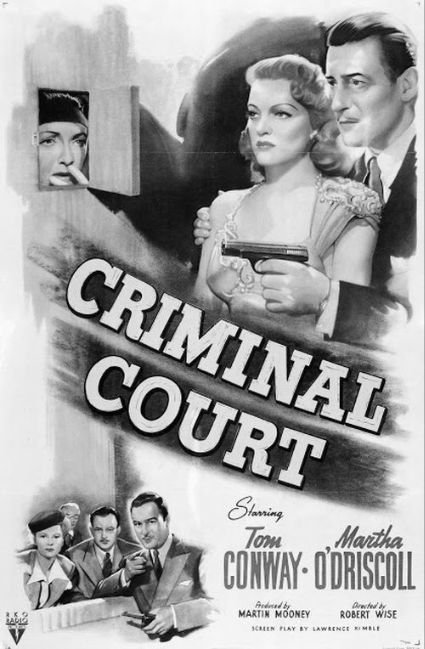 CRIMINAL COURT (1946)
CRIMINAL COURT (1946) (63 Min.) Genre: 1940 SUSPENSE, Transfer Quality: A
Elevating Criminal Court above the B-picture norm is the inventive direction by Robert Wise and the better-than-usual performances by all concerned. In a break from his heroic "Falcon" role, Tom Conway stars as Steve Barnes, a criminal attorney known for his unorthodox courtroom tactics. After accidentally killing a crooked nightclub owner, Barnes is stuck on the horns of a dilemma when his sweetheart, cabaret singer Georgia Gale (Martha O'Driscoll), is arrested for the crime The problem: How can Barnes clear Georgia of the murder without implicating himself? As for the solution...well, best not to reveal that here. All that keeps Criminal Court from A-picture status is its 62 minute running time; on the other hand, the film's impact might have been blunted had it been any longer. — Hal Erickson
Starring: Tom Conway, Martha O'Driscoll, June Clayworth, Robert Armstrong, Barbara Hale | Directed by: Robert Wise
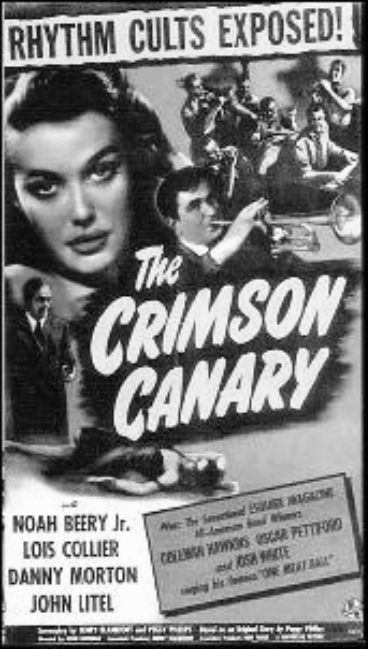 CRIMSON CANARY, THE (1945)
CRIMSON CANARY, THE (1945) (64 Min.) Genre: 1940 SUSPENSE, Transfer Quality: B
An offbeat Universal murder mystery, Crimson Canary is set in the very special world of jazz musicians. A duplicitous songstress is murdered, and the prime suspects are members of a nightclub jazz combo. John Litel, the detective assigned to the case, is himself a jazz fan and thus takes proprietary interest in the band. As suspicion shifts from one musician to another, those involved with the case (notably Lois Collier, the girlfriend of one of the musicians) dig deeper into the clues, discovering at last that the culprit is someone with no music in his soul at all. Though the plot is nothing special, the wall-to-wall music and "hip" ambience of Crimson Canary result in a better than average Universal "B".
Starring: Noah Beery, Jr., Lois Collier, John Litel, Claudia Drake, Steve Brodie, Danny Morton | Directed by: John Hoffman
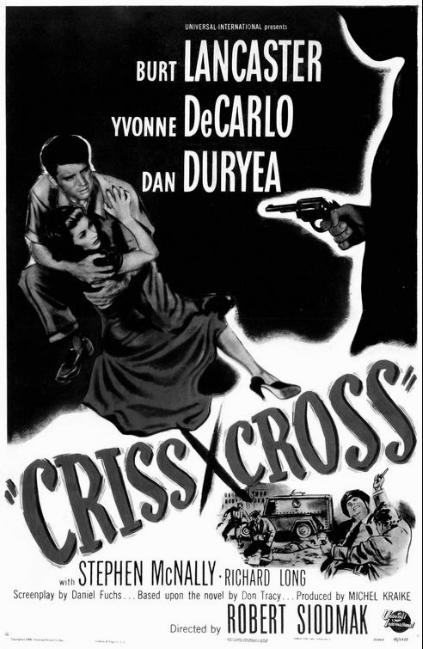 CRISS CROSS (1949)
CRISS CROSS (1949) (87 Min.) Genre: 1940 SUSPENSE, Transfer Quality: A
Lancaster returns to hometown, where he crosses path with ex-wife De Carlo, who's taken up with gangster Duryea. Potent film noir look (by cinematographer Franz Planer) and music (by Miklos Rozsa) help compensate for Lancaster's miscasting as an easily manipulated husband. Tony Curtis' screen debut; he's briefly seen as De Carlo's dance partner.
Starring: Burt Lancaster, Yvonne De Carlo, Dan Duryea, Stephen McNally, Gene Evans | Directed by: Robert Siodmak
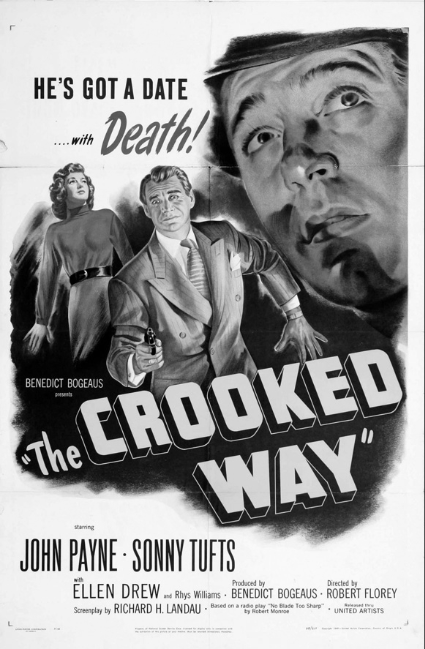 CROOKED WAY, THE (1949)
CROOKED WAY, THE (1949) (90 Min.) Genre: 1940 SUSPENSE, Transfer Quality: A
Postwar films were festooned with amnesiac ex-GIs who found themselves mixed up with crime. In The Crooked Way, John Payne plays memory-deficient veteran Eddie Rice, who runs afoul of mobster Vince Alexander (Sonny Tufts) and police inspector Lt. Williams (Rhys Williams). Both the crooks and the cops seem to have good reason to despise Rice, and he'd like to find out why. He won't get any help from his wife Nina (Ellen Drew), however, since she is as hostile towards Rice as everyone else. Gradually, Rice puts the pieces together and discovers that he's far better off not remembering his former self. Film noir habitues Percy Helton, John Doucette and Greta Grandstedt are eminently suited to their minor roles. The Crooked Way was based on "No Blade Too Sharp", a radio drama by Robert Monroe.
Starring: John Payne, Sonny Tufts, Ellen Drew, Rhys Williams | Directed by: Robert Florey
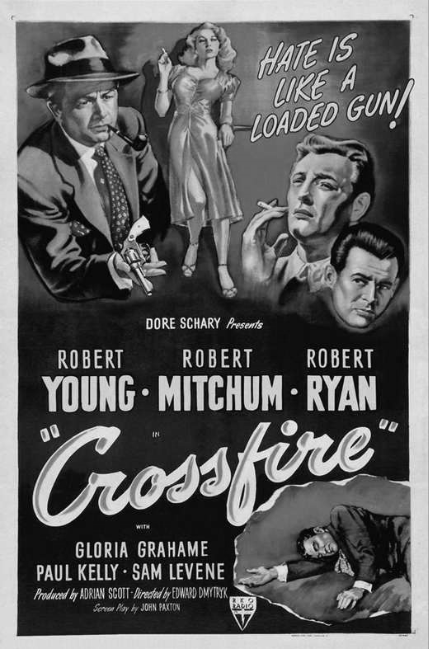 CROSSFIRE (1947)
CROSSFIRE (1947) (86 Min.) Genre: 1940 SUSPENSE, Transfer Quality: A
This drama was one of the first major-studio efforts to confront anti-semitism (beating the Oscar-winning Gentleman's Agreement by several months), and it features a standout performance from Robert Ryan as a bigoted soldier on the run. Monty Montogomery (Ryan) is a violent and unstable soldier who, while out on a pass, goes on a drinking spree with three buddies, Floyd (Steve Brodie), Arthur (George A. Cooper), and Leroy (William Phipps). While boozing it up in a tavern, the four men meet Joseph Samuels (Sam Levene) and his girlfriend Ginny (Gloria Grahame), who invite the soldiers back to their apartment for a party. Monty, however, has a fierce hatred of Jews, and he later goes into a drunken rage in which he beats Joseph to death. Monty's friends can barely remember the incident through their liquor-shrouded memories, but they recall just enough to make themselves scarce when police detective Capt. Finlay (Robert Young) begins making the rounds looking for information on Joseph's murder. Sgt. Kelly (Robert Mitchum), a soldier who knows the four men, begins to suspect that something is up, and he works with Finlay and Ginny to help ferret out the killer in his ranks, while Monty kills Floyd when he becomes convinced that he's going to talk to the authorities. While director Edward Dmytryk showed real bravery in bringing this story to the screen, it had greater repercussions than he might have expected; the film's controversial themes led to Dmytryk's denunciation by the House Un-American Activities Committee during the McCarthy-era investigations of the 1950s; luckily, unlike other filmmakers who suffered similar accusations by HUAC, Dmytryk continued to work steadily through the '50s and '60s. — Mark Deming
Starring: Robert Ryan, Robert Mitchum, Robert Young, Gloria Grahame | Directed by: Edward Dmytryk
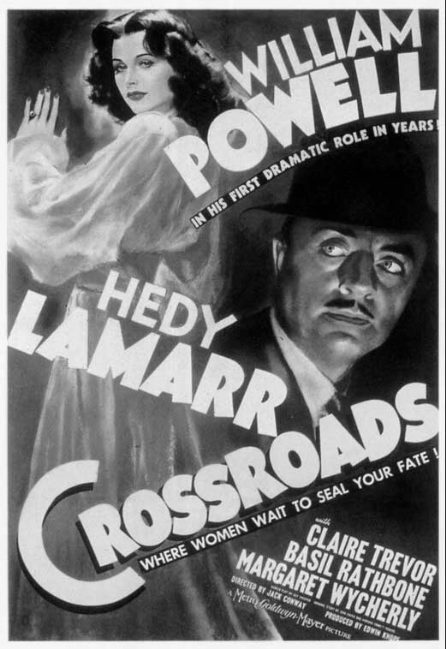 CROSSROADS (1942)
CROSSROADS (1942) (82 Min.) Genre: 1940 SUSPENSE, Transfer Quality: A
An innocent man is put on trial, but is he really as innocent as he claims? Diplomat David Talbot (William Powell) and his bride Lucienne (Hedy Lamarr) are enjoying a honeymoon in Paris when David is confronted by extortionists who demand money in exchange for not turning him in to the police. David has no idea what the men are talking about and ignores their threats, but the men prove good to their word, and David finds himself on trial for a series of thefts. At the trial, David's name is cleared when Henri Sarrow (Basil Rathbone) testifies that he knew the man who committed the crimes, a friend of his who recently died. However, after the trial, David meets Sarrow, who informs David that he lied under oath; according to Sarrow, David did indeed commit the robberies while suffering from amnesia after a severe blow to the head, and if he wants to keep the facts quiet, he'll do whatever Sarrow says. — Mark Deming
Starring: William Powell, Hedy Lamarr, Claire Trevor, Basil Rathbone | Directed by: Jack Conway
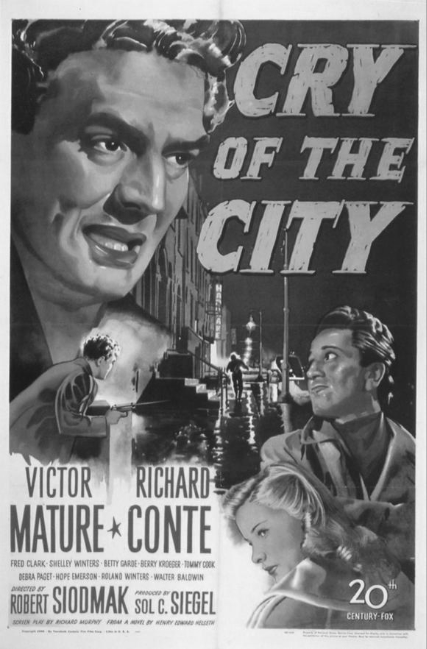 CRY OF THE CITY (1948)
CRY OF THE CITY (1948) (95 Min.) Genre: 1940 SUSPENSE, Transfer Quality: B
The opening scene of Robert Siodmak's grim film noir depicts police Lieutenants Candella (Victor Mature) and Collins (Fred Clark) observing wounded cop killer Martin Rome (Richard Conte) receive last rites. Though Rome recovers, he still must elude Candella and Collins in his desperate attempt to escape his fate. Rome has two visitors in the hospital: his girl friend Teena (Debra Paget), who goes into hiding, and Niles (Barry Kroeger), a crooked lawyer. Niles tries to bribe Rome to take a jewel theft and homicide rap for a client of his since Rome is facing the electric chair anyway. When Rome refuses, Niles threatens to frame Teena as the client's female accomplice. Worried that Candella might find Teena, Rome breaks out of jail and goes to Niles's office to accept the offer, but he actually plans to leave the country with Teena. When Niles reneges, Rome kills him, but not before learning the accomplice's identity and discovering the stolen jewels in the lawyer's safe. Rome finds the accomplice, Rose Given (Hope Emerson), and offers to trade the jewelry for the means to leave the country. She agrees, and they arrange a meeting in the subway, but Rome informs Candella of the plan. When the police arrive, Candella is shot, Rose is arrested, and Rome escapes to meet up with Teena in a church. As he is trying to convince Teena to run away with him, a wounded Candella shows up and tells Teena how Rome uses people and that everyone who helped in his escape will be paying a price. Teena rejects Rome, and he runs again, only to be shot down by Candella. The moral order is ultimately restored, but no one has been left unscarred. — Steve Press
Starring: Victor Mature, Richard Conte, Fred Clark, Shelley Winters | Directed by: Robert Siodmak
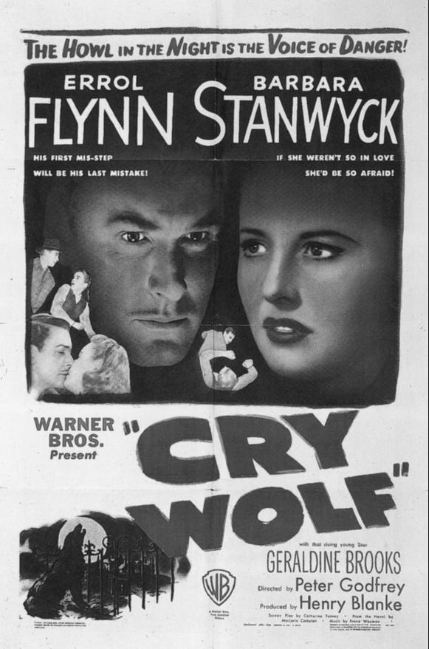 CRY WOLF (1947)
CRY WOLF (1947) (84 Min.) Genre: 1940 SUSPENSE, Transfer Quality: A
The tense psychological drama Cry Wolf offers a fascinating if not altogether successful change of pace for action star Errol Flynn. Most of the story takes place at a remote and forbidding mansion, where Sandra Marshall (Barbara Stanwyck), the widow of the house's owner, arrives to take charge. An apparent golddigger, Sandra refuses to be bought off with a small cash settlement and insists on claiming her late husband's entire estate, which earns her a powerful enemy in the form of research scientist Mark Caldwell (Flynn). Upon learning that her headstrong sister-in-law Julie (Geraldine Brooks) is kept a virtual prisoner in the house, Sandra begins suspecting that Caldwell is up to no good-a suspicion seemingly confirmed when Julie dies under mysterious circumstances. But as the story slowly unravels, it becomes clear that Caldwell is actually the hero of the piece, while the villain is...well, best not to give too much away here. Cry Wolf was Geraldine Brooks' first film, and the second for her costar Richard Basehart. — Hal Erickson
Starring: Errol Flynn, Barbara Stanwyck, Richard Basehart, Geraldine Brooks | Directed by: Peter Godfrey
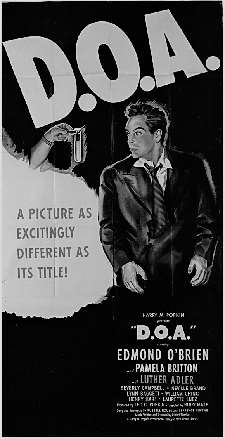 D.O.A. (1949)
D.O.A. (1949) (83 Min.) Genre: 1940 SUSPENSE, Transfer Quality: A
I want to report a murder...mine. So begins D.O.A. Told in flashback, the story tells of how vacationing CPA Frank Bigelow (Edmond O'Brien) becomes the recipient of a deadly poison known as iridium. Told by a doctor that he only has a few hours to live, Bigelow desperately retraces his movements of the previous 24 hours, trying to locate his murderer. Through the aid of his secretary Paula Gibson (Pamela Britton) (who doesn't know of her boss' imminent demise), Bigelow traces a shipment of iridium to a gang of criminals who've used the poison in the commission of a crime. Bigelow had been targeted because he'd notarized the shipment, which came from the chemical firm where he works. Though we know from the outset that Bigelow isn't long for this world, the film builds up an incredible amount of suspense towards the end, when master crook Holiday (William Ching) orders his crazed henchman (Neville Brand) to take Bigelow for "a ride." DOA was remade in 1988 with Dennis Quaid and Meg Ryan. — Hal Erickson
Starring: Edmund O'Brien, Pamela Britton, Luther Adler, Beverly Campbell | Directed by: Rudolph Mate
(78 Min.) Genre: 1940 SUSPENSE, Transfer Quality: A
In this drama, an amoral, manipulative womanizer gets his comeuppance. The story begins as the handsome cad is witnessed quickly leaving a hotel room in the East. He has just stolen money, and a wedding band from a dead woman. He is next seen in L.A. living under an alias. There, he begins victimizing two naive sisters and uses them to substantially increase his wealth. Eventually, the two figure out the man's evil game, but there is little they can do to thwart him. Meanwhile, the gigolo is being stalked by the husband of the woman he robbed in the film's beginning. — Sandra Brennan
Starring: Faye Emerson, Zachary Scott, Rosemary DeCamp, Bruce Bennett, Mona Freeman | Directed by: Robert Florey
(80 Min.) Genre: 1940 SUSPENSE, Transfer Quality: B
Stalwart supporting actor Allyn Joslyn is afforded a rare leading role in the Columbia mystery meller Dangerous Blondes. Joslyn and Evelyn Keyes play Harry and Jane Craig, a road-company Nick and Nora Charles. A popular mystery writer, Harry occasionally indulges in amateur detective work, with wife Jane at his side; their friendly nemesis is Inspector Clinton (Frank Craven), who'd prefer that the Craigs would stay home and mind their own business. This proves impossible when Ralph McCormick (Edmund Lowe), the owner of a swank fashion studio, is accused of murdering his wife for the love of designer Julie Taylor (Anita Louise). Snooping around on their own, the Craigs find the real killer-and nearly wind up victims themselves.
Starring: Allyn Joslyn, Evelyn Keyes, Edmund Lowe, John Hubbard, Ann Savage | Directed by: Leigh Jason
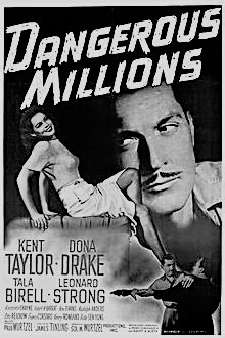 DANGEROUS MILLIONS (1946)
DANGEROUS MILLIONS (1946) (69 Min.) Genre: 1940 SUSPENSE, Transfer Quality: B
In this mystery, a millionaire shipping tycoon commands that eight of his relatives come to his Chinese mountain retreat upon his death. There each will be entitled to an equal share of his fortune. He dies, and the eight go to China. Trouble ensues in the remote cabin when two relatives are murdered. More murder attempts soon follow before the survivors learn the surprising truth.
Starring: Kent Taylor, Dona Drake, Tala Birell, Leonard Strong, Rex Evans, Victor Sen Yung | Directed by: James Tinling
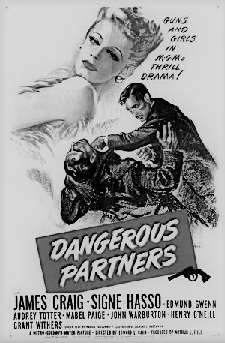 DANGEROUS PARTNERS (1945)
DANGEROUS PARTNERS (1945) (74 Min.) Genre: 1940 SUSPENSE, Transfer Quality: A
In this a briefcase containing four wills is found next to the unconscious body of a man. He lies beside a plane crash. Each of the wills is made out to the man. Meanwhile a recent widow and a man work together to get the money her husband died for. They almost get it when they are accosted by the man who was found lying beside the planed. He claims to be a Nazi spy who is trying to get the money and use it to escape to Germany. The couple captures the spy and donates the money to their government. — Sandra Brennan
Starring: James Craig, Signe Hasso, Edmund Gwenn, Audrey Trotter | Directed by: Edward L. Cahn
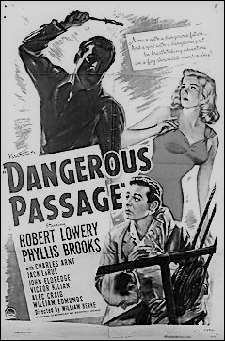 DANGEROUS PASSAGE (1944)
DANGEROUS PASSAGE (1944) (60 Min.) Genre: 1940 SUSPENSE, Transfer Quality: B
No production unit at Paramount Pictures was busier in 1944 than the Pine-Thomas unit-and few were as bankable at the box-office. In Pine-Thomas' Dangerous Passage, Joe Beck (Robert Lowery), an easygoing resident of Central America, is summoned to Texas to claim his share of an inheritance. Making the journey by boat, Beck finds himself the target of several attempts on his life. He also forms a more than professional relationship with his attorney, Nita Paxton (Phyllis Brooks). En route to Galveston, Beck and Nita are shipwrecked and forced to swim for their lives. The identity of their mystery assailant is revealed in the last reel, though for a while it doesn't look like either the hero or the heroine will survive long enough to profit from this knowledge.
Starring: Robert Lowery, Phyllis Brooks, Charles Arnt, Jack LaRue, Victor Kilian | Directed by: William A. Berke
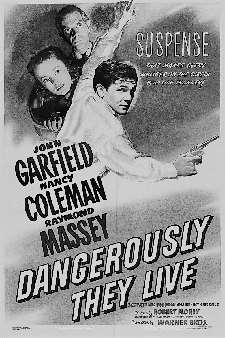 DANGEROUSLY THEY LIVE (1941)
DANGEROUSLY THEY LIVE (1941) (77 Min.) Genre: 1940 SUSPENSE, Transfer Quality: A
In this wartime drama, a doctor discovers that one of his patients isn't as crazy as he thought, with dangerous consequences for the whole world. Dr. Michael Lewis (John Garfield) is an intern at a hospital where a woman named Jane (Nancy Coleman) is admitted. Jane was injured in a car wreck, and she tells Michael a remarkable story. She claims that she is actually an espionage agent with top-secret information that could help the Allied war effort; the accident occurred while she was trying to escape from Axis spies who will do anything to get her documents. Michael, who is supposed to keep an eye on Jane, thinks she must be delusional, and when psychiatrist Dr. Ingersol (Raymond Massey) arrives with Jane's father, Mr. Goodwin (Moroni Olsen), he signs Jane out in their custody. However, Michael soon discovers that Mr. Goodwin isn't Jane's father at all; he and Ingersol are actually the Nazi spies Jane was fleeing in the accident, and someone must rescue her before it's too late, both for Jane and the Allied war effort. Dangerously They Live was scripted by Marion Parsonnet from her novel, Remember Tomorrow. — Mark Deming
Starring: John Garfield, Nancy Coleman, Raymond Massey, Lee Patrick | Directed by: Robert Florey
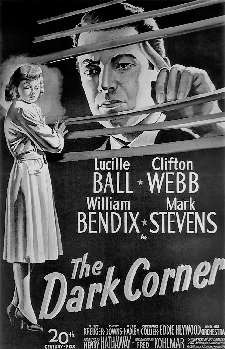 DARK CORNER, THE (1946)
DARK CORNER, THE (1946) (99 Min.) Genre: 1940 SUSPENSE, Transfer Quality: A
A detective is neatly framed for murder in this well played and generally interesting melodrama.
Starring: Mark Stevens, Lucille Ball, Clifton Webb, William Bendix, Cathy Downs | Directed by: Henry Hathaway
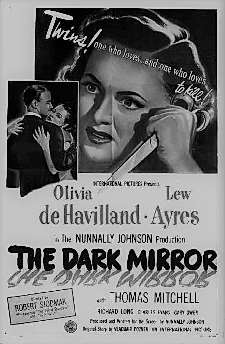 DARK MIRROR, THE (1946)
DARK MIRROR, THE (1946) (85 Min.) Genre: 1940 SUSPENSE, Transfer Quality: A
Olivia De Havilland, with the assistance of some eye-popping special photographic effects, plays twins in The Dark Mirror. One twin commits a murder: The "good" twin is blamed, but provides no alibi in her own defense, since she can't believe that the "bad" twin is guilty. Psychologist Lew Ayres and detective Thomas Mitchell try to get to the truth, a task made difficult by the bad twin's habit of imitating her sister to perfection. Ayres solves the mystery and sorts out which twin is which, but not before nearly ending up on a slab in the morgue himself. Based on a novel by Vladimir Pozner (the same), The Dark Mirror was remade for television in 1984, with Jane Seymour in the lead—er, leads.
Starring: Olivia de Havilland, Lew Ayres, Thomas Mitchell, Richard Long | Directed by: Robert Siodmak
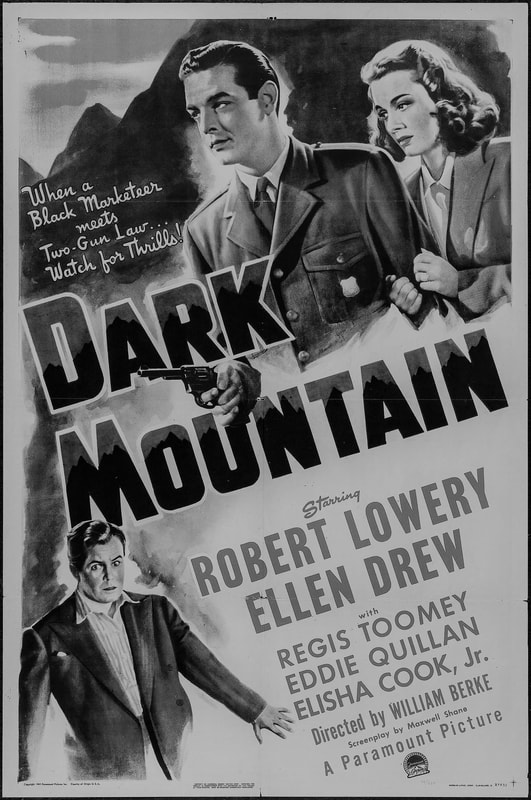 DARK MOUNTAIN (1944)
DARK MOUNTAIN (1944) (56 Min.) Genre: 1940 SUSPENSE, Transfer Quality: B
This Pine-Thomas actioner stars Robert Lowery as two-fisted forest ranger Don Bradley. Promoted to supervisor, Bradley finds his success hollow when his childhood sweetheart Kay (Ellen Drew) marries big-time gangster Steve Downey (Regis Toomey). In soon develops that Kay has wedded Downey against her will, and is being held prisoner in a remote mountain cabin. Bradley then dashes to the rescue, which culminates in a perilous car chase through dangerous mountain passages. Eddie Quillan provides comic relief as Bradley's pal Willie.
Starring: Robert Lowery, Ellen Drew, Regis Toomey, Elisha Cook Jr. | Directed by: William A. Berke / William C. Thomas
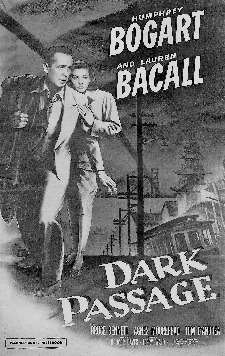 DARK PASSAGE (1947)
DARK PASSAGE (1947) (107 Min.) Genre: 1940 SUSPENSE, Transfer Quality: A
Robert Montgomery's 1946 film Lady in the Lake attempted to tell the entire story with a "subjective camera": shooting the film from the point of view of the main character, with the camera acting as his "eyes". The first hour or so of Dark Passage does the same thing—and the results are far more successful than anything seen in Montgomery's film. Humphrey Bogart heads the cast as an escaped convict, wrongly accused of his wife's murder. After being forced to beat up a man (Clifton Young) from whom he's hitched a ride, Bogart hides out in the apartment of Lauren Bacall. With the help of friendly cabbie Tom D'Andrea, Bogart makes contact with sympathetic plastic surgeon Housley Stevenson, and with his new face (actually his old face, which we haven't seen during the first hour or so of the film) he seeks out Agnes Moorehead, the actual murderer. An extortion attempt by the man whom Bogart had earlier punched out slows down things a bit, but Bogie finally catches up with Moorehead. Curiously, Bogart is never completely cleared, but he is granted a happy ending of sorts when, to the strains of "Too Marvelous for Words", he and Bacall head for Peru to start life anew. Dark Passage is more interesting in its individual parts than its sum total, but it does manage to provide an new slant on the traditional Bogey-Bacall pairing. — Hal Erickson
Starring: Humphrey Bogart, Lauren Bacall, Bruce Bennett, Agnes Moorehead | Directed by: Delmer Daves
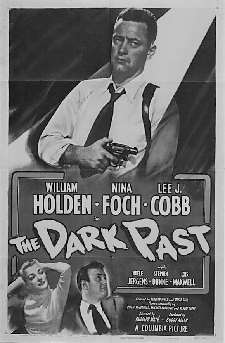 DARK PAST, THE (1948)
DARK PAST, THE (1948) (75 Min.) Genre: 1940 SUSPENSE, Transfer Quality: C
In this faithful remake of Blind Alley (1939), psychoanalyst Andrew Collins (Lee J. Cobb), his wife, his son, and some friends are taken hostage by escaped murderer Al Walker (William Holden) and his gang, including girlfriend Betty (Nina Foch). Collins, an advocate of rehabilitating criminals through psychiatry, induces his captor to talk about himself through the course of the night. By calmly and methodically piecing together the strands of the killer's unconscious motivation, Collins rids Walker of his literally murderous rage and prevents a massacre. Shrinks who practice in the noir universe are frequently painted as absurdly omnipotent. When not using their power for evil, like Dr. Cross (Vincent Price) in Aubrey Schenck's Shock (1949), they may be capable, like the benign Dr. Collins, of miracle cures. A more complex depiction of an unrealistically powerful, but ambiguously motivated, psychiatrist can be seen in Joseph Losey's The Sleeping Tiger (1954). In that British film, Dr. Clive Esmond (Alexander Knox) cures a criminal in a few short months but destroys his own marriage in the process.
Starring: William Holden, Lee J. Cobb, Nina Foch, Adele Jergens | Directed by: Rudolph Maté
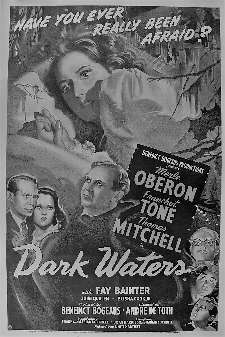 DARK WATERS (1944)
DARK WATERS (1944) (93 Min.) Genre: 1940 SUSPENSE, Transfer Quality: B
Adapted from a Saturday Evening Post serial by Frank and Marian Cockrell, Dark Waters stars Merle Oberon as heiress Leslie Calvin, a woman with a neurotic aversion to water. This stems from the fact that in her childhood, Leslie was one of four survivors of a torpedoed steamship. Preying upon Leslie's fears, conniving Mr. Sydney (Thomas Mitchell), a guest at the Calvin family's Louisiana plantation, concocts a campaign of terror designed to drive the poor girl crazy so that he can claim her vast inheritance. Sydney and his cohorts also have the presence of mind to murder all of Leslie's closest relatives, leaving her utterly helpless.
Starring: Merle Oberon, Franchot Tone, Thomas Mitchell, Fay Bainter, Elisha Cook, Jr. | Directed by: André De Toth
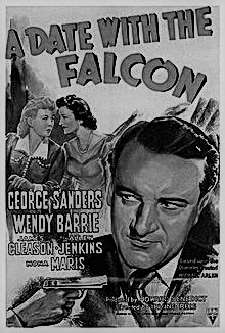 DATE WITH THE FALCON, A (1941)
DATE WITH THE FALCON, A (1941) (63 Min.) Genre: 1940 SUSPENSE, Transfer Quality: A
This second entry in RKO Radio's "Falcon" series begins with Gay Lawrence (George Sanders), aka the Falcon, promising to give up his private-eye activities for the sake of fiancee Helen Reed (Wendy Barrie). This resolves lasts for about eight minutes, whereupon Lawrence tackles the case of a missing scientist named Waldo Sampson (Alec Craig), the inventor of a synthetic-diamond process. Kidnapped by Sampson's abductors, Lawrence manages to escape, only to be kidnapped again and later accused of murder. The resolution of the plot hinges on the old mistaken-identity device (one of the principal characters has an identical twin, and that's all that can be said without giving the game away). Carryovers from the first "Falcon" film include Allen Jenkins as Lawrence's dimwitted sidekick Goldie and character actor Hans Conried, here cast as a snotty hotel night clerk. A Date with the Falcon was unofficially remade as The Falcon's Adventure, the final entry in the RKO series. — Hal Erickson
Starring: George Sanders, Wendy Barrie, James Gleason, Allen Jenkins | Directed by: Irving G. Reis
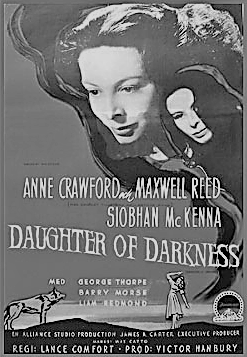 DAUGHTER OF DARKNESS (1948)
DAUGHTER OF DARKNESS (1948) (91 Min.) Genre: 1940 SUSPENSE, Transfer Quality: B
Daughter of Darkness was based on They Walk Alone, a play by Max Catto. The heroine of the play can be described as a "homicidal nymphomaniac," which understandably posed censorship problems when the Catto original was adapted to the screen. In her second film, Irish stage star Siobhan McKenna plays Emma Baudine, a "black widow" who lures men with her sexual charms and then murders them. Because she is the trusted assistant of village priest Father Corcoran (Liam Redmond), no one suspects what Emma is up to -- no one, that is, except the inquisitive Bess Stanforth (Anne Crawford), who emerges as the heroine of the piece. Also appearing in her first movie role is Honor Blackman, long before her international TV fame vis-a-vis The Avengers.
Starring: Anne Crawford, Maxwell Reed, Siobhan McKenna, Grant Tyler, Honor Blackman | Directed by: Lance Comfort
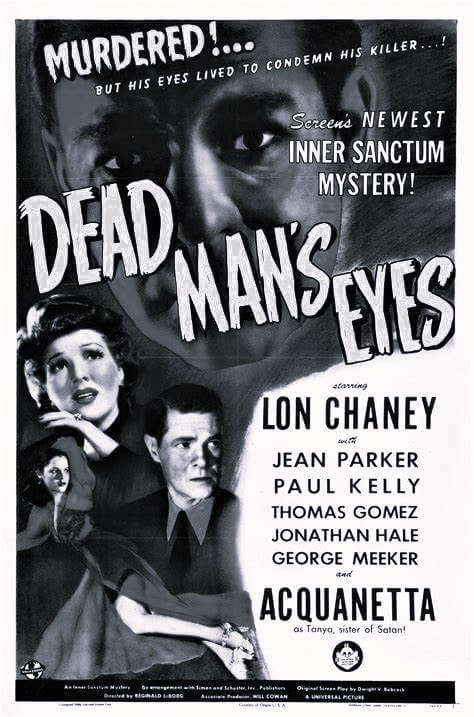 DEAD MAN'S EYES (1944)
DEAD MAN'S EYES (1944) (64 Min.) Genre: 1940 SUSPENSE, Transfer Quality: A
The third installment in Universal's low-budget "Inner Sanctum" mysteries, Dead Man's Eyes promises a great deal more than screenwriter Dwight W. Babcock can deliver. Lon Chaney Jr. stars as Dave Stuart, a struggling artist promising his fiancée Heather Hayden (Jean Peters) that he will marry her as soon as he finishes a portrait of beautiful Tanya Czoraki (Acquanetta). The jealous Tanya causes Dave to have an accident that blinds him. According to eye specialist Dr. Sam Welles (Jonathan Hale), Dave's sight can only be restored by a cornea transplant and Heather's father, "Dad" Hayden (Edward Fielding), promptly wills the unfortunate young man his own eyes. When Dad is found killed, Dave becomes the obvious suspect but Welles nevertheless goes ahead with the operation. Tanya, meanwhile, has her suspicions about the identity of the killer, but before she can reveal the name to Heather, she, too, is killed. Although the operation seems at first to have been a failure, Dave regains his sight just in time to unmask the killer, who is made to confess.
Starring: Lon Chaney Jr., Acquanetta, Jean Parker, Paul Kelly, Thomas Gomez | Directed by: Reginald Le Borg
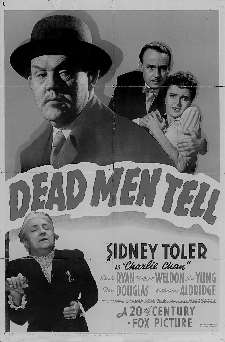 DEAD MEN TELL (1941)
DEAD MEN TELL (1941) (60 Min.) Genre: 1940 SUSPENSE, Transfer Quality: C
Wily Honolulu detective Charlie Chan (Sidney Toler) is summoned when Miss Nodbury (Ethel Gryffies), an elderly eccentric, is murdered just before taking part in a seafaring treasure hunt. Chan deduces that the old lady died of fright, brought on by the apparent visitation of the ghost of her ancestor, a notorious pirate. Suspecting that the ghost was actually one of Miss Nodbury's enemies in disguise, Chan tags along on the treasure hunt to pinpoint the real killer. Meanwhile, Number Two Son Jimmy Chan (Victor Sen Yung) seeks out suspects on the waterfront, only to be constantly dunked in the briny by a wild-eyed but essentially harmless lunatic (Milton Parsons). A lesser Charlie Chan entry, Dead Men Tell is redeemed by its atmospheric harbor scenes, a specialty of director Harry Lachman.
Starring: Sidney Toler, Sheila Ryan, Robert Weldon, Donald Douglas | Directed by: Harry Lachman
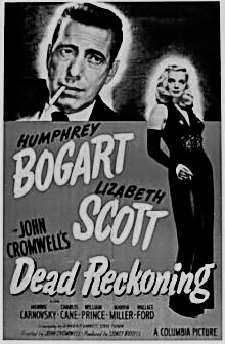 DEAD RECKONING (1947)
DEAD RECKONING (1947) (100 Min.) Genre: 1940 SUSPENSE, Transfer Quality: A
In Dead Reckoning, Rip Murdock (Humphrey Bogart) recites the film's plotline to a priest in the confessional. Murdock and Johnny Drake (William Prince) are Congressional Medal of Honor recipients, en route to Washington by train. Drake hops off and disappears, leading Murdock on a hectic manhunt. Upon meeting Drake's former girlfriend Coral Chandler (Lizabeth Scott), Murdock is thrown into a maelstrom of intrigue involving a crooked gambler (Morris Carnovsky) and a complex blackmailing scheme. The upshot of this is that Murdock finds himself the prime suspect in a murder. — Hal Erickson
Starring: Humphrey Bogart, Lizabeth Scott, Morris Carnovsky, William Prince | Directed by: John Cromwell
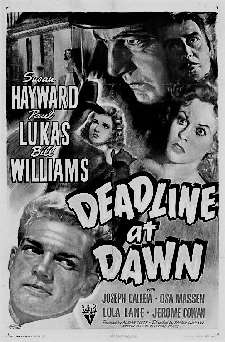 DEADLINE AT DAWN (1946)
DEADLINE AT DAWN (1946) (83 Min.) Genre: 1940 SUSPENSE, Transfer Quality: A
Deadline at Dawn represented not only the sole film directorial effort of Broadway's Harold Clurman, but also the only cinematic collaboration between Clurman and his former Group Theatre associate, screenwriter Clifford Odets. While on shore leave in New York, sailor Alex (Bill Williams) is slipped a doped-up drink by B-girl Edna (Lola Lane). When he awakens, Alex discovers that she has been murdered. Though he believes that he's the killer, our hero is talked into locating the actual miscreant by philosophical cab driver gus (Paul Lukas) and nightclub dancer June (Susan Hayward). Adapted from a novel by Cornell Woolrich, Deadline at Dawn leans towards pretentiousness at times, but is redeemed by the no-nonsense performance by Susan Hayward. — Hal Erickson
Starring: Susan Hayward, Paul Lukas, Bill Williams, Joseph Calleia | Directed by: Harold Clurman
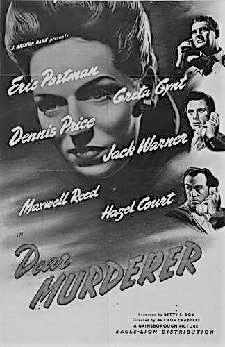 DEAR MURDERER (1947)
DEAR MURDERER (1947) (94 Min.) Genre: 1940 SUSPENSE, Transfer Quality: B
When a wealthy man discovers that his wife is having an affair, he murders her lover, committing the perfect crime.
Starring: Eric Portman, Greta Gynt, Dennis Price, Jack Warner | Directed by: Arthur Crabtree
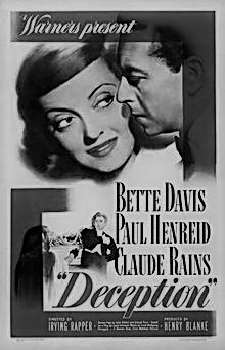 DECEPTION (1946)
DECEPTION (1946) (112 Min.) Genre: 1940 SUSPENSE, Transfer Quality: A
Deception is an operatic rehash of the 1929 film Jealousy. Music teacher Bette Davis—who evidently has a large student pool, judging by the size of her penthouse apartment—is reunited with her cellist lover Paul Henreid, whom she believed to have been killed in the war. Henreid wants to marry Davis, but he is unaware that she has, for the past several years, been the "protege" of composer Claude Rains. Rains agrees to keep quiet about his affair with Davis, but takes sadistic delight in tormenting the woman and working behind the scenes to sabotage Henreid's career. When Rains tells Bette of his plans to publicly humiliate Henreid, she shoots her ex-lover dead. Henreid agrees to stand by Davis no matter what is in store for her. Director Irving Rapper had originally wanted to treat the hoary plot twists of Deception comically, with the three principals walking off together at the end with a "what the hell?" attitude. He was tersely told to stick to the script; after all, people didn't pay to see Bette Davis but to see her suffer. Like the 1929 version of Jealousy, Deception was based on a play by Louis Verneuil. — Hal Erickson
Starring: Bette Davis, Claude Rains, Paul Henreid, John Abbott | Directed by: Irving Rapper
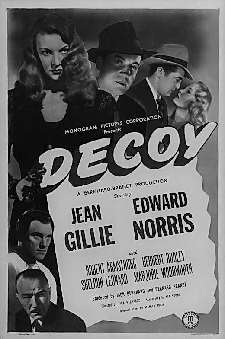 DECOY (1946)
DECOY (1946) (76 Min.) Genre: 1940 SUSPENSE, Transfer Quality: C
This gripping, gritty film noir begins as a mortally wounded physician staggers into the apartment of a vicious vixen, the leader of a notorious gang of thieves. Shots ring out, and the police rush to the scene. Sergeant Leonard gets there to find the doctor dead, and the woman failing fast. As she lay gasping she decides to tell the sergeant the whole terrible story that began when she got involved with a cop-killing robber who was captured and sentenced to death. Before his fateful date with the gas chamber, he lets the rest of the gang know where he hid the $40,0000 they netted from the caper; he, with her help, also arranges to ingest the doctor's newly developed drug, an antidote to cyanide, to escape his "execution." The plot works, and eventually, the gangster is back in business. He gives his girl half of the map, but unfortunately gets shot by a rival before he can give her the other half. The ruthless woman and another gang member then force the doctor to assist them with their search. They are heading off to the location, when the double-crossing she-devil kills the other gangster in a horrible manner and continues on with the doctor. They find the chest containing the loot and they get an awful surprise. The woman begins laughing hysterically as if on the verge of a full-blown break down. She shoots the doctor and then flees, thereby bringing the story up to the present. Just before she dies, the ruthless woman reveals the astonishing contents of the chest.
Starring: Jean Gillie, Edward Norris, Robert Armstrong, Herbert Rudley, Sheldon Leonard | Directed by: Jack Bernhard
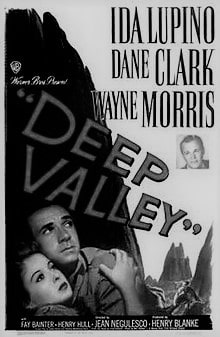 DEEP VALLEY (1947)
DEEP VALLEY (1947) (104 Min.) Genre: 1940 SUSPENSE, Transfer Quality: A
Just as she had in High Sierra (1941), Ida Lupino enjoys a brief moment of bliss with a man on the run in this highly emotional drama from Warner Bros. She plays Libby, a mountain girl nearly deprived of speech due to her rather hostile environment in general and repressive home life in particular. A true innocent, she falls head-over-heels in love with Barry Burnett (Dane Clark), a member of a prison chain gang building a road through the wilderness. One of those convenient storms endemic to this kind of narrative allows Barry and Libby to escape into the hills but their blissful existence proves of short duration. Deep Valley was filmed on location at Big Sur and Big Bear, CA.
Starring: Ida Lupino, Dane Clark, Wayne Morris, Fay Bainter, Henry Hull | Directed by: Jean Negulesco
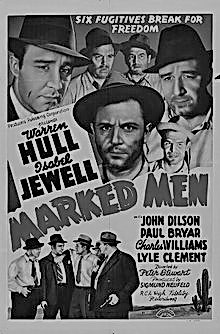 DESERT ESCAPE (1940)
DESERT ESCAPE (1940) (66 Min.) Genre: 1940 SUSPENSE, Transfer Quality: B
PRC's Marked Men gets under way when hero Bill Carver (Warren Hull) is thrown into jail for a crime he didn't commit. Breaking out, Carver hits upon a clever scheme to exact a confession from the genuine miscreants. Pretending to help five mobsters escape the Law after committing a bank robbery, Carver drives them far, far into the desert, threatening to leave them at the mercy of the vultures and the sun unless one or all of them confess to the frame-up. Isabel Jewell is atypically cast as the good-natured daughter of a small-town physician. Director "Sherman Scott" is actually Sam Newfield, who helmed more PRC films than any other craftsman.
Starring: Warren Hull, Isabel Jewell, John Dilson, Paul Bryar | Directed by: Sam Newfield
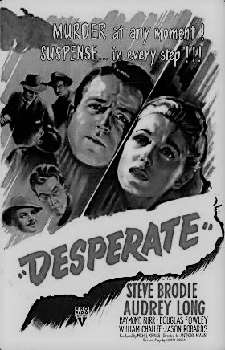 DESPERATE (1947)
DESPERATE (1947) (73 Min.) Genre: 1940 SUSPENSE, Transfer Quality: A
With 1947's Desperate, a disturbing, noirish twist on traditional moral values, responsibility, and guilt, director Anthony Mann entered the ranks of class-A directors, though he'd still have to spend a few more years in "B" pictures. In his first important role, Steve Brodie plays newlywed trucker Steve Randall, who finds himself in the wrong place at the wrong time during a fur robbery. Kidnapping Steve, the criminals, led by Walt Radak (Raymond Burr), threaten to mutilate Mrs. Randall (Audrey Long) unless Steve confesses to a murder committed by Radak's brother during the theft. Pretending to play along with the villains, Steve manages to escape with his wife in tow. The rest of the film is a prolonged chase, with the Randalls pursued by both the crooks and the cops. A surprise ending caps this film noir mini-classic, which is best appreciated when not seen in its computer-colorized version. — Hal Erickson
Starring: Steve Brodie, Audrey Long, Raymond Burr, Douglas Fowley | Directed by: Anthony Mann
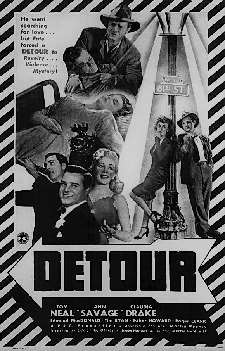 DETOUR (1945)
DETOUR (1945) (69 Min.) Genre: 1940 SUSPENSE, Transfer Quality: A
Edgar G. Ulmer's Detour begins when hitchhiker Al Roberts Tom Neal accepts a ride from affable gambler Charles Haskell Jr. Edmund MacDonald. When Haskell suffers a fatal heart attack, Roberts, afraid that he'll be accused of murder, disposes of the body, takes the man's clothes and wallet, and begins driving the car himself. He picks up beautiful but sullen Vera (Ann Savage), who suddenly breaks the silence by asking "What did you do with the body?" It turns out that Vera had earlier accepted a ride from Haskell and has immediately spotted Roberts as a ringer. Holding the threat of summoning the police over his head, Vera forces Roberts to continue his pose so that he can collect a legacy from Haskell's millionaire father, who hasn't seen his son in years. — Hal Erickson
Starring: Tom Neal, Ann Savage, Claudia Drake, Edmund MacDonald | Directed by: Edgar G. Ulmer
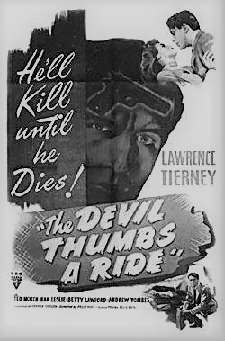 DEVIL THUMBS A RIDE, THE (1947)
DEVIL THUMBS A RIDE, THE (1947) (63 Min.) Genre: 1940 SUSPENSE, Transfer Quality: A
Not by any means a great film, The Devil Thumbs a Ride nonetheless has an indefinable audience allure that sucks the viewer into its labyrinthine storyline and doesn't let go until the fade-out. Lawrence Tierney plays Steve Morgan, a charming but utterly sociopathic criminal who has just robbed and killed a movie theater cashier. Morgan hitches a ride with inebriated conventioneer Jimmy Furguson (Ted North). Later on, Furguson picks up two more hitchhikers: virginal Beulah Zorn (Nan Leslie) and good-time girl Agnes Smith (Betty Lawford). When circumstances lead Jimmy to believe that Steve is the fugitive whom the cops are looking for, Morgan sweet-talks his way into everyone's confidence. Before he knows what's happening, Jimmy is holed up in a beach house while Steve parties with Beulah and Agnes. Not even the most fervent of film noir fans will be able to predict the outcome of this one. Long ignored by movie buffs, The Devil Thumbs a Ride gained a large following through repeated TV showings in the 1960s and '70s. It is now considered so representative of its genre that one film historian used the film's title for a collection of his essays on B-melodramas. — Hal Erickson
Starring: Lawrence Tierney, Ted North, Nan Leslie, Betty Lawford | Directed by: Felix E. Feist
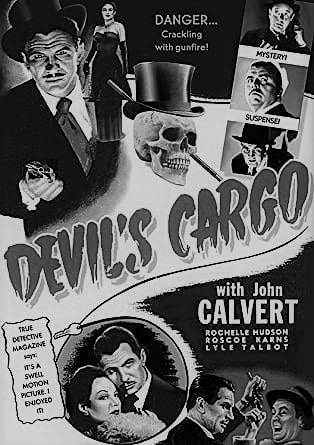 DEVIL'S CARGO (1948)
DEVIL'S CARGO (1948) (61 Min.) Genre: 1940 SUSPENSE, Transfer Quality: B
Dropped by RKO Radio in 1946, the "Falcon" mystery series was briefly revived by low-budget Film Classics productions in 1948. In Devil's Cargo, professional magician-turned-actor John Calvert takes over from Tom Conway in the role of amateur sleuth Michael Waring, aka The Falcon. The story gets under way when Raymond Delgado (Paul Marion), accused of murder, comes to Waring for help. Soon afterward, Delgado is poisoned to death in his jail cell. Among the suspects are Delgado's girlfriend Margo (Rochelle Hudson) and shady criminal lawyer Tom Mallon (Theodore von Eltz), while Lt. Hardy (Roscoe Karns) represents the Law. A pedestrian affair, The Devil's Cargo comes to life whenever John Calvert is given a chance to show off his magician's skills.
Starring: John Calvert, Rochelle Hudson, Roscoe Karns, Lyle Talbot | Directed by: John F. Link
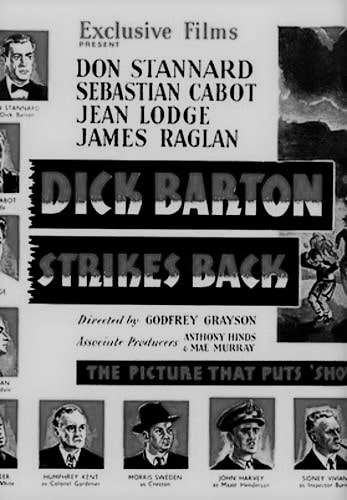 DICK BARTON STRIKES BACK (1949)
DICK BARTON STRIKES BACK (1949) (73 Min.) Genre: 1940 SUSPENSE, Transfer Quality: B
Dick Barton (Don Stannard) investigates the northern village of High Glen, where every living thing has suddenly died without any apparent explanation. Autopsies reveal that the brains of the victims were all shrunken -- literally dehydrated -- but there is no known scientific process that would explain how this could happen. Barton must not only determine the cause, but also its connection, if any, to the mysterious Mr. Fouracada (Sebastian Cabot) and the murder of Crespin, a British agent who was returning from Prague with news of a plot against England. While Barton is investigating the first tragedy, another village is destroyed, making it imperative that he tie up the ends of the case before more people die -- and figure out what the connection of all of it may be to a traveling fair that was seen in the vicinity of both villages before they were wiped out.
Starring: Sebastian Cabot, John Harvey, Jean Lodge, James Raglan, Sydney Vivian | Directed by: Godfrey Grayson
(61 Min.) Genre: 1940 SUSPENSE, Transfer Quality: A
Dick Tracy, Detective (originally just Dick Tracy) was the first of four RKO Radio B-pictures based on Chester Gould's classic comic strip. Though Ralph Byrd is most closely associated with the role of Tracy, the title character is played herein by Morgan Conway (Byrd would be seen as Tracy in the last two series entries). The jut-jawed detective takes on a vicious criminal named Splitface (Mike Mazurki), who upon escaping from jail vows to murder all 12 of the jurors who found him guilty. He manages to knock off three of the jurors before the police force figures out what's happening. Galvanized into action, Dick Tracy and his partner Pat Patton (Lyle Latell) track Splitface to a deserted riverboat (a leftover set from the 1945 RKO feature Man Alive) where the villain is holding Tracy's girlfriend Tess Truehart (Anne Jeffreys) and adopted son Junior (Mickey Kuhn) captive. Jane Greer, an RKO contractee on the verge of bigger things, appears briefly as one of Splitface's intended victims (the film's publicity misled filmgoers into believing that both Greer and Anne Jeffreys would be in the villain's clutches by the end of the picture, when in fact Greer disappears from the proceedings in reel four!) On the plus side, Dick Tracy, Detective admirably recreates the larger-than-life milieu of Chester Gould's comic strip, with bizarre camera angles, slightly unreal sets, and character names like Deathridge the Coroner; on the minus side, the film is cheap in the extreme, with a script that seems to have been made up as it went along. When asked about Dick Tracy Detective in 1990, Anne Jeffreys flatly denied she'd ever played Tess Trueheart until she caught up with the film on videotape (she'd completely forgotten the whole experience)! — Hal Erickson
Starring: Morgan Conway, Anne Jeffreys, Mike Mazurki, Jane Greer, Lyle Latell | Directed by: William A. Berke
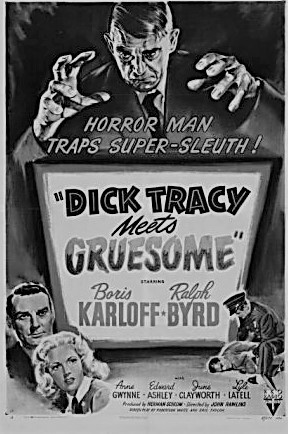 DICK TRACY MEETS GRUSOME (1947)
DICK TRACY MEETS GRUSOME (1947) (65 Min.) Genre: 1940 SUSPENSE, Transfer Quality: A
Befitting his status as a genre star, Boris Karloff earns top billing over leading man Ralph Byrd in RKO's final Dick Tracy caper. The former Frankenstein monster plays an escaped convict masterminding a daring bank robbery. To get in and out of the bank without being noticed, the gang uses an asphyxiating gas that leaves anyone inside momentarily frozen in place. Everyone, that is, except for bank customer Tess Truehart (Anne Gwynne), who is able to contact Dick Tracy (Byrd) from a phone booth in the bank. With little or no clues, Tracy and his man Friday, Pat Patton (Lyle Latell), question the bank customers but none can shed any light on the mysterious goings-on. The disappearance of Dr. A. Tomic (Milton Parsons) and the odd behavior of his associate, Dr. I.M. Learned (June Clayworth), crack the case wide open, however, and Tracy is eventually able to track down both Gruesome and the surprising identity of his boss, L.E. Thal (Edward Ashley). According to some reports, RKO wanted to release Dick Tracy Meets Gruesome as "Dick Tracy Meets Karloff" but that title was vetoed by Karloff himself. The legendary horror star apparently later accepted his own box-office value and a 1949 Universal comedy was released as Abbott and Costello Meet the Killer, Boris Karloff. — Hans J. Wollstein
Starring: Ralph Byrd, Boris Karloff, Lyle Latell, Anne Gwynne | Directed by: John Rawlins
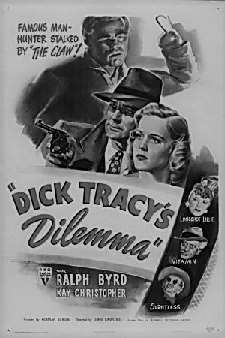 DICK TRACY'S DILEMMA (1947)
DICK TRACY'S DILEMMA (1947) (60 Min.) Genre: 1940 SUSPENSE, Transfer Quality: A
Ralph Byrd returns to the character he had originated ten years earlier in the serial Dick Tracy. This time, Chester Gould's immortal comic strip hero is called in to handle a fur theft. The owner of Flawless Furs, Humphreys (Charles Marsh), has just signed on with the Honesty Insurance Company whose investigator, Cudd (Al Bridge), made him change the combination to the vault. The insurance policy —as the head of Honesty, Peter Premium (William B. Davidson), explains — holds the company liable if the stolen furs haven't been recovered within 24 hours of the theft. The trail leads to Longshot Lily (Bernadene Hayes), a would-be fence who is promptly arrested. But when Tracy's snitch, Sightless (Jimmy Conlin), is found brutally murdered, the detective realizes that he has more than a simple fur theft on his hands. With the help of master thespian Vitamin Flintheart (Ian Keith) and ever-present sidekick Pat Patton (Lyle Latell), Tracy follows a series of clues that leads him to a deserted junkyard and a fateful confrontation with fiendish killer "the Claw" (Jack Lambert). Dick Tracy's Dilemma was followed by Dick Tracy Meets Gruesome (1947), after which RKO retired the series. — Hans J. Wollstein
Starring: Ralph Byrd, Lyle Latell, Kay Christopher, Jack Lambert | Directed by: John Rawlins
(70 Min.) Genre: 1940 SUSPENSE, Transfer Quality: A
Dillinger, the was the ninth effort from the enterprising King Brothers, and their most financially successful film to date. Lawrence Tierney became an overnight cult favorite with his gritty portrayal of maverick bank robber John Dillinger, though top billing is bestowed upon Edmund Lowe as gang chieftan Specs. The film traces Dillinger's criminal career from his first petty theft to his spectacular 1934 demise outside Chicago's Biograph Theater (incidentally, this film was banned in Chicago for several years). Anne Jeffreys plays Dillinger's fictional moll Helen, while Elisha Cook Jr., Marc Lawrence and Eduardo Cianelli go through their usual crime-flick paces. The film's setpiece is an elaborate armored-car holdup, lifted in its entirety from footage originally shot for Fritz Lang's You Only Live Once (1937). Screenwriter Philip Yordan, fresh from his Broadway triumph Anna Lucasta, earned an Academy Award nomination for Dillinger. — Hal Erickson
Starring: Lawrence Tierney, Marc Lawrence, Edmund Lowe, Anne Jeffreys, Elisha Cook, Jr. | Directed by: Max Nosseck
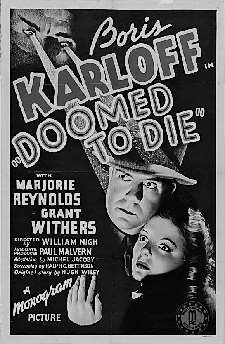 DOOMED TO DIE (1940)
DOOMED TO DIE (1940) (67 Min.) Genre: 1940 SUSPENSE, Transfer Quality: A
In his final "Mr. Wong" mystery, Boris Karloff solves the case of who killed shipping magnate Cyrus P. Wentworth (Melvin Lang). Wentworth's flagship "The Wentworth Castle" had tragically caught on fire with a tremendous loss of life. Near suicidal, the shipping tycoon is helped into the next world by persons unknown but dunderhead police captain Bill Street (Grant Withers) points the finger at Dick Fleming (William Stelling), the son of a rival tycoon and in love with Wentworth's daughter Cynthia (Catherine Craig). Promising to eat his hat if young Fleming isn't the killer, Street can only watch as enterprising cub reporter Bobby Logan (Marjorie Reynolds) assigns Mr. Wong (Karloff) to solve the case. Which the eminent Oriental sleuth does to the point where Bobby can gleefully add salt to Street's less than edible headgear. The burning of the fictional "Wentworth Castle" was actual footage from the infamous 1934"Morro Castle" fire, a tragedy that took the lives of 137 passengers. — Hans J. Wollstein
Starring: Boris Karloff, Grant Withers, Marjorie Reynolds, Melvin Lang | Directed by: William Nigh
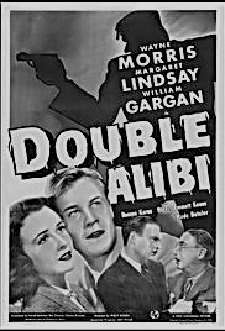 DOUBLE ALIBI (1940)
DOUBLE ALIBI (1940) (60 Min.) Genre: 1940 SUSPENSE, Transfer Quality: C
Throughout most of the running time of Universal's Double Alibi, it looks as though ostensible hero Stephen Wayne (Wayne Morris) really is guilty of three murders. Even so, girl reporter Sue Carey (Margaret Lindsay) falls in love with Wayne, despite the fact that she also thinks he's guilty. This causes no end of discomfort for city editor Walter Gifford (William Gargan), who is in love with Sue himself, and police captain Orr (James Burke), who has a vested interest in seeing Wayne delivered to the executioner. By film's end, of course, Sue has helped to prove Wayne's innocence, through the simple expedient of stumbling upon the identity of the real killer. With so much going on, it's surprising that Double Alibi could squeeze in the traditional comedy relief of Roscoe Karns, cast once more as a wisecacking photojournalist.
Starring: Wayne Morris, Margaret Lindsay, William Gargan, Roscoe Karns | Directed by: Phil Rosen
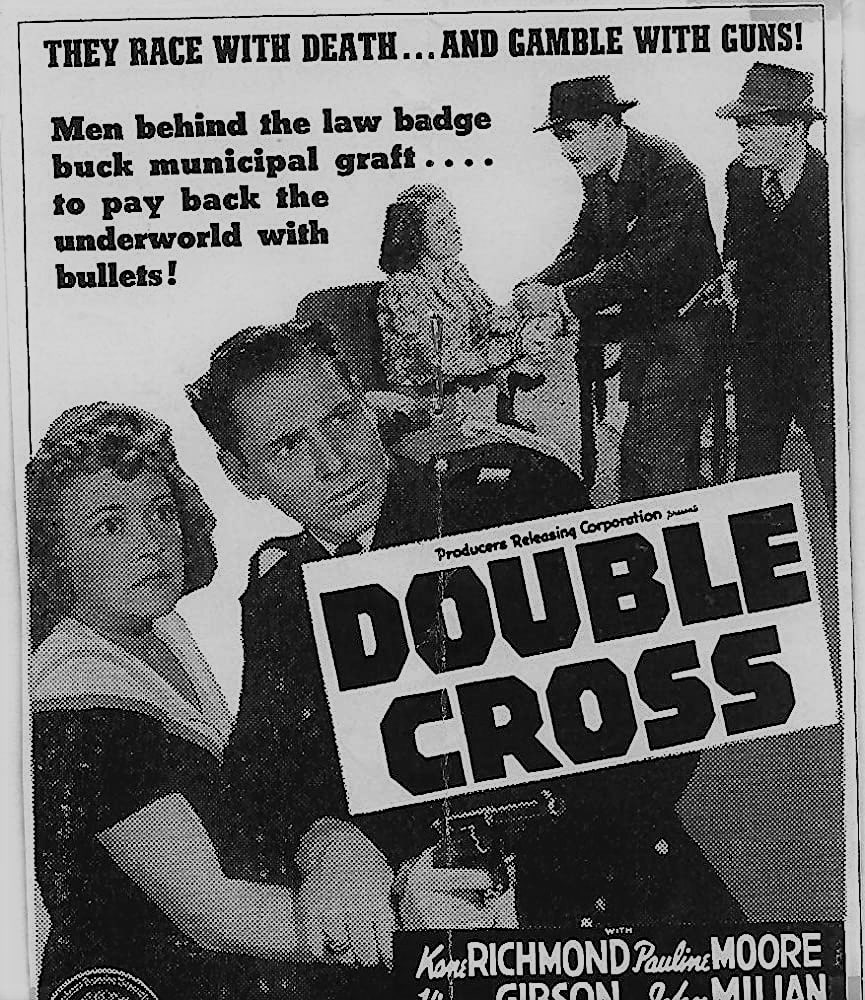 DOUBLE CROSS (1941)
DOUBLE CROSS (1941) (64 Min.) Genre: 1940 SUSPENSE, Transfer Quality: B
In this action film, an officer is thrown off the force by his father the chief of police. The bitter ex-cop then joins a racketeering operation. The ring leader assigns him to drive a truck-load of armed hoods to ambush his father. Unbeknownst to the crooks, the ex-cop is still active on the force. The whole affair was a ruse to capture them. The brave cop succeeds in warning his peers of the ambush and the bad-guys die in a hail of bullets.
Starring: Wynne Gibson, Kane Richmond, Pauline Moore, John Miljan | Directed by: Albert Kelley
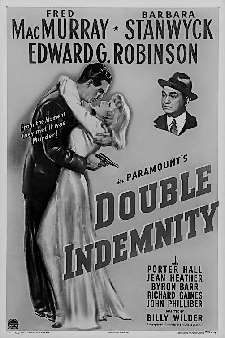 DOUBLE INDEMNITY (1944)
DOUBLE INDEMNITY (1944) (106 Min.) Genre: 1940 SUSPENSE, Transfer Quality: A
Directed by Billy Wilder and adapted from a James M. Cain novel by Wilder and Raymond Chandler, Double Indemnity represents the high-water mark of 1940s film noir urban crime dramas in which a greedy, weak man is seduced and trapped by a cold, evil woman amidst the dark shadows and Expressionist lighting of modern cities. Phyllis Dietrichson (Barbara Stanwyck) seduces insurance agent Walter Neff (Fred MacMurray) into murdering her husband to collect his accident policy. The murder goes as planned, but after the couple's passion cools, each becomes suspicious of the other's motives. The plan is further complicated when Neff's boss Barton Keyes (Edward G. Robinson), a brilliant insurance investigator, takes over the investigation. Told in flashbacks from Neff's perspective, the film moves with ruthless determinism as each character meets what seems to be a preordained fate. Movie veterans Stanwyck, MacMurray, and Robinson give some of their best performances, and Wilder's cynical sensibility finds a perfect match in the story's unsentimental perspective, heightened by John Seitz's hard-edged cinematography. Double Indemnity ranks with the classics of mainstream Hollywood movie-making. — Linda Rasmussen
Starring: Fred MacMurray, Barbara Stanwick, Edward G. Robinson, Porter Hall | Directed by: Billy Wilder
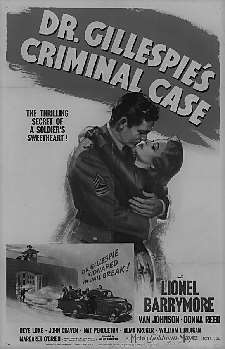 DR. GILLESPIE'S CRIMINAL CASE (1943)
DR. GILLESPIE'S CRIMINAL CASE (1943) (89 Min.) Genre: 1940 SUSPENSE, Transfer Quality: A
The third of MGM's Dr. Kildare series to dispense with the services of Dr. Kildare (Lew Ayres), Dr. Gillespie's Criminal Case stars crusty old Lionel Barrymore in the title role. The first half of the film concerns Gillespie's efforts to expedite the romance of Army sergeant Orisin (Michael Duane) and Marcia Bradburn (Donna Reed), with the help of doctors Red Adams (Van Johnson) and Lee Wong How (Keye Luke). The closing reels lapse into melodrama when Gillespie is kidnapped by mentally unstable convict patient Roy Todwell (John Craven) and his gang. In addition to new MGM contractees Van Johnson and Donna Reed, Dr. Gillespie's Criminal Case gave a boost to young star-in-the-making Margaret O'Brien. Like most of the later films in the series, this one is hampered a bit by its excessive length. — Hal Erickson
Starring: Lionel Barrymore, Van Johnson, Donna Reed, Keye Luke | Directed by: Willis Goldbeck
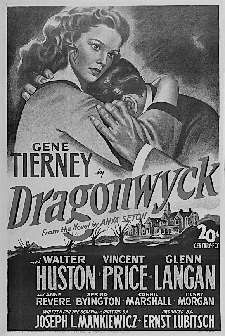 DRAGONWYCK (1946)
DRAGONWYCK (1946) (103 Min.) Genre: 1940 SUSPENSE, Transfer Quality: A
Years before he became the leading star in horror movies, Vincent Price starred in this gothic thriller based on the best-selling novel by Anya Seton. Nicholas Van Ryn (Vincent Price) is a wealthy Dutch immigrant living in New York's Hudson Valley in the 1840s. Nicholas has come to hate his wife because she has been unable to give him a son; their only child is a daughter he doesn't care for. Miranda Wells (Gene Tierney), a distant relative of the Van Ryns, comes to live at their estate and work as an au pair girl; Nicholas becomes infatuated with her and eventually poisons his wife so they can marry. However, while Miranda gives birth to a son, the boy is sickly and does not live to adulthood. Nicholas begins to slip into insanity, moving to the attic of his mansion and drowning his sorrows in drugs. A distraught Miranda seeks the counsel of the local doctor, Dr. Jeff Turner (Jeff Langan); Dr. Turner falls in love with Miranda, and he eventually discovers that Nicholas killed his first wife to be with her, and that Miranda might be next on the madman's list. Dragonwyck was the directorial debut of screenwriter and producer Joseph L. Mankiewicz. — Mark Deming
Starring: Gene Tierney, Walter Huston, Vincent Price, Spring Byington, Henry (Harry) Morgan, Jessica Tandy | Directed by: Joseph L. Mankiewicz
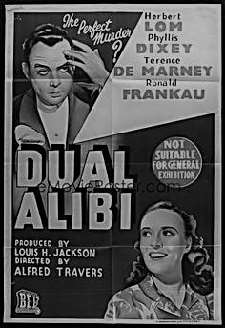 DUAL ALIBI (1947)
DUAL ALIBI (1947) (87 Min.) Genre: 1940 SUSPENSE, Transfer Quality: B
Herbert Lom essays a dual role as a team of trapeze artists. When a circus colleague finds himself in possession of a winning lottery ticket, the twins conspire to kill the man and claim the fortune for themselves. One twin makes certain to establish an alibi for the other, so that no one will suspect the pair of the crime. But blood isn't quite as thick as greed, and the twins come to a bad end when they fall out over their ill-gotten gains. Dual Alibi uses its meager budget to its advantage; most of the film is photographed with deep, dark shadows, which serve to hide any deficiencies in the split-screen work.
Starring: Terence de Marney, Phyllis Dixey, Ronald Frankau, Abraham Sofaer, Sebastian Cabot, Herbert Lom | Directed by: Alfred Travers
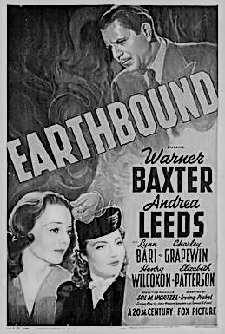 EARTHBOUND (1940)
EARTHBOUND (1940) (67 Min.) Genre: 1940 SUSPENSE, Transfer Quality: A
A remake of a 1920 Goldwyn production which starred Wyndham Standing and Naomi Childers, Earthbound top-bills Warner Baxter and Andrea Leeds as Nick and Ellen Desbrough. Murdered early on, Nick returns to earth in ghostly form to help his widow Ellen bring the killer to justice. It is giving away nothing to reveal that the murderer is Linda Reynolds (Lynn Bari), Nick's jealous ex-lover. But it takes the courage of scientist Jeffrey Reynolds (Henry Wilcoxon), Linda's husband and Nick's best friend, to prevent another person from being falsely accused of Nick's death. Earthbound was no more believable in 1940 than it had been twenty years earlier, but the performances are credible and the direction (by Irving Pichel) is outstanding
Starring: Warner Baxter, Andrea Leeds, Lynn Bari, Charles Grapwin | Directed by: Irving Pichel
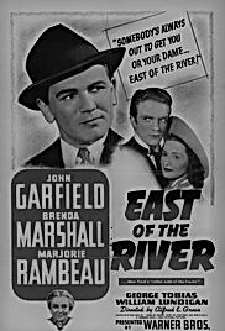 EAST OF THE RIVER (1940)
EAST OF THE RIVER (1940) (73 Min.) Genre: 1940 SUSPENSE, Transfer Quality: A
In this drama, set in New York City, two brothers fight it out over a girl. The boys were raised by their Italian mother. The younger brother is adopted and they grow up to pursue very different life directions. The adopted brother goes to college, but the older brother gets involved with crime and ends up going to San Quentin. He is released from prison just as the younger brother graduates. Later the older brother returns home with his girlfriend. It is not long before he is in trouble with the local syndicate. Meanwhile, the girl and the other brother fall in love and decide to marry. The older brother is not amused. Still, when the mob bursts in at the wedding, it is the older brother who keeps them at bay until the ceremony is completed. — Sandra Brennan
Starring: John Garfield, Brenda Marshall, Marjorie Rambeau, William Lundigan | Directed by: Alfred E. Green
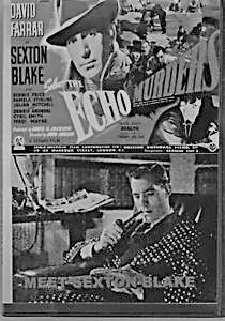 ECHO MURDERS, THE (1945)
ECHO MURDERS, THE (1945) (75 Min.) Genre: 1940 SUSPENSE, Transfer Quality: B
That daring pulp-novel detective Sexton Blake is back again in The Echo Murders. David Farrar stars as Blake, a Sherlock Holmes wannabe who takes on a gang of Nazi spies. While solving a series of baffling murders, Blake is captured and beaten by the bad guys, but emerges from his ordeal none the worse for wear and with hardly a crease in his trousers. In one scene, our hero uses acid to burn off the ropes that bind his hands, miraculously doing no harm whatsoever to his wrists. Of interest is the presence in the cast of future British leading man Dennis Price, who like David Farrar seems to be grateful to have the work.
Starring: David Farrar, Dennis Price, Pamela Stirling, Dennis Arundell | Directed by: John Harlow
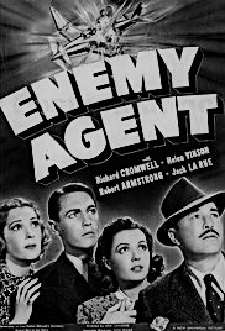 ENEMY AGENT (1940)
ENEMY AGENT (1940) (62 Min.) Genre: 1940 SUSPENSE, Transfer Quality: B
In this espionage adventure, a courageous millworker must prove himself innocent of treason charges after the title spies purloin valuable blueprints from his plant. He also tries to bring the spies to justice, but soon finds himself in deep trouble. Fortunately, the good-guy spies show up at the crucial moment and justice is served.
Starring: Richard Cromwell, Helen Vinson, Robert Armstrong, Marjorie Reynolds | Directed by: Lew Landers
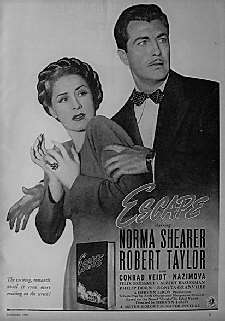 ESCAPE (1940)
ESCAPE (1940) (104 Min.) Genre: 1940 SUSPENSE, Transfer Quality: A
Based on a novel by Ethel Vance, Escape stars Robert Taylor as a young American, the son of a widowed European woman (Alla Nazimova). The mother has been imprisoned in a German concentration camp, compelling her son to ignore America's neutrality and attempt a rescue. Sneaking into German-occupied Europe, Taylor is befriended by a countess (Norma Shearer) who is the mistress of a Nazi general (Conrad Veidt). Taylor isn't certain of the countess' loyalties, but she proves herself by aiding in the rescue of the imprisoned woman. Escape is distinguished by a surprisingly subtle performance from Norma Shearer, though she gives in to her tendency to "ham" in her final denunciation of her Nazi paramour. — Hal Erickson
Starring: Norma Shearer, Robert Taylor, Conrad Veidt, Alla Nazimova | Directed by: Mervyn LeRoy
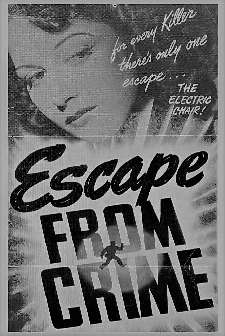 ESCAPE FROM CRIME (1942)
ESCAPE FROM CRIME (1942) (51 Min.) Genre: 1940 SUSPENSE, Transfer Quality: A
Escape from Crime is a pared-down (51 minute) remake of 1933's Picture Snatcher, with Richard Travis in the old James Cagney role. Recently paroled from jail, Red O'Hara (Travis) manages to wangle a photographer's job at the tabloid newspaper managed by hard-drinking Cornell (Frank Wilcox). Flamboyantly "grabbing" photos where no one else can, Red is able to support his wife Molly (Julie Bishop) and child, but the stigma of his prison sentence still hangs over him. Only by rounding up his former gang is Red able to square himself with police lieutenant "Biff" Malone. Though billed third, Jackie \"C\" Gleason has a very minor role as an overfed convict.
Starring: Richard Travis, Julie Bishop, Jackie Gleason, Frank Wilcox | Directed by: David Ross Lederman
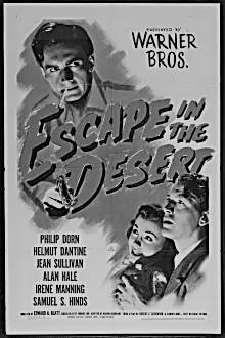 ESCAPE IN THE DESERT (1945)
ESCAPE IN THE DESERT (1945) (81 Min.) Genre: 1940 SUSPENSE, Transfer Quality: A
Escape in the Desert is a thinly disguised remake of The Petrified Forest (1936), updated with a WW II angle. Cynical Dutch pilot Philip Artveld (Philip Dorn) pays a visit to the American desert before being shipped off to the Front. He wanders into a lonely inn, where he befriends starry-eyed watiress Jane (Jean Sullivan). Before long, Philip, Jane, and several other innocent bystanders find themselves being held captive by a group of escaped German POWS, led by Captain Becker (Helmut Dantine). The existentialist philosophy of the original Robert E. Sherwood play is replaced with a great deal of Nazified prattle and All-American flagwaving, with misplaced moments of comedy relief from Alan Hale and Irene Manning. While Petrified Forest is regarded as a classic, Escape in the Desert is generally dismissed as a contrived propaganda piece
Starring: Helmut Dantine, Philip Dorn, Jean Sullivan, Alan Hale | Directed by: Edward A. Blatt
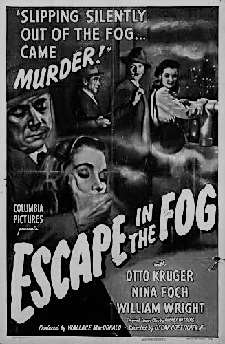 ESCAPE IN THE FOG (1945)
ESCAPE IN THE FOG (1945) (65 Min.) Genre: 1940 SUSPENSE, Transfer Quality: C
A nurse recovering in a hospital from a nervous breakdown keeps having dreams where she sees two men trying to murder a third. When she meets the the officer in charge of psychology at the hospital, she is astounded to discover that he is the man in her dream who is the intended murder victim.
Starring: Otto Kruger, Nina Foch, William Wright, Konstantin Shayne | Directed by: Budd Boetticher
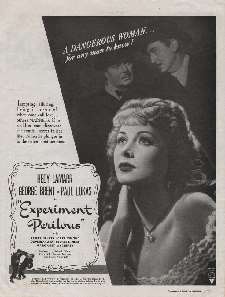 EXPERIMENT PERILOUS (1945)
EXPERIMENT PERILOUS (1945) (91 Min.) Genre: 1940 SUSPENSE, Transfer Quality: A
Officially based on a novel by Margaret Carpenter, Experiment Perilous would seem to be more inspired by MGM's psychological thriller Gaslight. Set at the turn of the century, the film stars Hedy Lamarr as Allida, the beautiful young wife of an elderly "gentleman" named Nick (Paul Lukas). Treating his wife like a possession, Nick keeps her a virtual prisoner in their London town house, cutting off all contact with the outside world. The situation is exacting a terrible emotional toll on Allida and her stepson Alec (George N. Neise). Enter kindly psychiatrist Huntington Bailey (George Brent), who takes it upon himself to free Allida and Alec from the despotic control of the insanely jealous Nick. The film's "money scene" is a frenzied gun battle in an aquarium, replete with shattered glass, gushing water and floundering fish; this sequence would be imitated ad nauseum in such future films as Lethal Weapon (1988) and Mission: Impossible (1996). — Hal Erickson
Starring: Hedy Lamarr, George Brent, Paul Lukas, Albert Dekker | Directed by: Jacques Tourneur
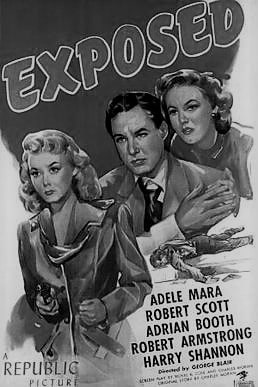 EXPOSED (1947)
EXPOSED (1947) (59 Min.) Genre: 1940 SUSPENSE, Transfer Quality: B
Not precisely the best film of 1947, the Republic comedy-mystery Exposed is nevertheless consistently enjoyable. Adele Mara is a delight as wisecracking female private eye Belinda Prentice, who has to put in a lot of overtime when her first client is murdered. Following the clues to an apartment house chock-full of suspicious characters, Belinda predicts-correctly, as it turns out--that there'll be several more killings unless she can pinpoint the guilty party and ascertain his or her motives. Meanwhile, her police-inspector father (Robert Armstrong) wishes aloud that Belinda would give up the p.i. business and settle down with a nice young fellow. Some choice moments are provided by Joyce Compton as Belinda's garrulous secretary, William Haade as her cloddish assistant, and Bob Steele as a neurotic gunman.
Starring: Adele Mara, Robert Scott, Robert Armstrong, Bob Steele | Directed by: George Blair
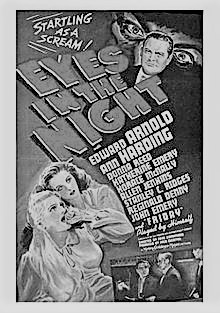 EYES IN THE NIGHT (1942)
EYES IN THE NIGHT (1942) (80 Min.) Genre: 1940 SUSPENSE, Transfer Quality: A
Edward Arnold made the first of his two screen appearances as Bayard Kendrick's blind detective Captain Duncan McLain in MGM's Eyes in the Night. The plot is set in motion by Norma Lawry (Ann Harding), whose stepdaughter Barbara (Donna Reed) has been keeping company with washed-up actor Paul Gerente (John Emery). Norma feels that Gerente, an ex-lover of hers, is a bad influence for Barbara, but the girl merely assumes that Norma wants Gerente all to herself. When the ageing actor is murdered, Barbara assumes that Norma committed the crime. Rather than go to the police, Norma heads to her old friend Duncan McLain, but when the detective arrives at the scene of the murder, the body has disappeared. Detecting the odor of violets in the room, McLain uses this tiny clue to build a case against a gang of Nazi spies, headed by the Lawry's butler Hansen (Stanley Ridges), with whom the late Mr. Gerente had been collaborating. Just knowing who did it isn't enough in this case, however: getting the drop on McLain and his associates, the villains hold the detective and Lawry prisoner until they are able to get their hands on a secret formula developed by Barbara's father (Reginald Denny). In true movie-serial fashion, it is McLain's faithful seeing-eye dog Friday (played by "himself") who saves the day. A "B" picture with "A" entertainment value, Eyes in the Night proved successful enough to warrant a sequel, 1945's The Hidden Eye. — Hal Erickson
Starring: Edward Arnold, Ann Harding, Katherine Emery, Horace McNally | Directed by: Fred Zinnemann
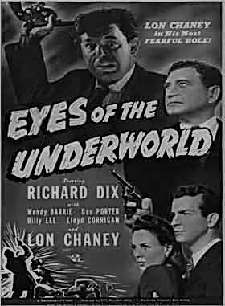 EYES OF THE UNDERWORLD (1942)
EYES OF THE UNDERWORLD (1942) (61 Min.) Genre: 1940 SUSPENSE, Transfer Quality: B
Some unexpected casting choices distinguish this so-so Universal actioner. Richard Dix stars as police chief Richard Barry, whose present respectable veneer obscures the fact that he once served a prison sentence. When Barry is threatened with exposure by silky-smooth gangster functionary Thomas (played by the usually lovable Lloyd Corrigan), he is bailed out by his affable ex-con chauffeur Benny (played by the usually villainous Lon Chaney Jr.) The perfunctory romantic angle is handled by Wendy Barrie as Barry's faithful secretary and Don Porter as the chief's rival-in-love. A remake of a 1929 crime flick of the same name, this 1942 version of Eyes of the Underworld updates the material by having the bad guys dip their crooked mitts into the bootlegged rubber-tire trade.
Starring: Richard Dix, Wendy Barrie, Lon Chaney, Jr., Lloyd Corrigan | Directed by: Roy William Neill
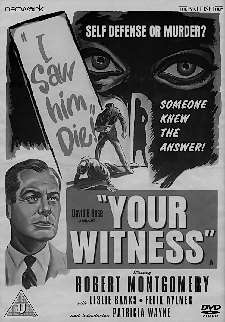 EYEWITNESS (1949)
EYEWITNESS (1949) (104 Min.) Genre: 1940 SUSPENSE, Transfer Quality: C
The fourth directorial effort of actor Robert Montgomery, Eye Witness was lensed on location in England. Montgomery plays an American attorney whose British pal (Michael Ripper) has been accused of murder. Ripper insists that he spent the evening of the crime with a woman, who has seemingly disappeared from the face of the earth. Montgomery dedicates himself to locating the missing witness before sentence can be pronounced. A compact courtroom drama highlighted by unexpected moments of humor, Eye Witness was released in some areas as Your Witness.
Starring: Robert Montgomery, Leslie Banks, Felix Aylmer, Patricia Wayne | Directed by: Robert Montgomery
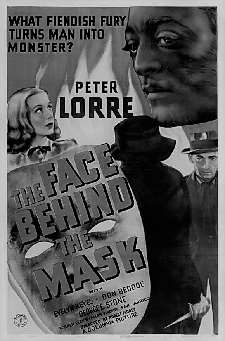 FACE BEHIND THE MASK, THE (1941)
FACE BEHIND THE MASK, THE (1941) (69 Min.) Genre: 1940 SUSPENSE, Transfer Quality: A
In this low-budget thriller (which developed something of a cult following among film buffs in the '60s and '70s), Peter Lorre plays Janos Szabo, an immigrant from Hungary who is a skilled craftsman. After he's caught in a fire, his face is horribly scarred; his terrifying appearance makes it impossible for him to get a job. With nowhere else to turn, Janos begins working for the criminal underworld, where he eventually raises enough money to purchase an expensive mask whose expressionless features are only a slight improvement over his distorted visage, but at least allow him to go out in public. However, Janos begins having second thoughts about his life of crime, especially after he falls in love with Helen (Evelyn Keyes), a kind-hearted blind woman. Director Robert Florey supposedly shot this film and Meet Boston Blackie in a mere 24 days. Florey and Lorre would team up again for another offbeat film buff favorite, The Beast with Five Fingers.
Starring: Peter Lorre, Evelyn Keyes, George E. Stone, Don Beddoe | Directed by: Robert Florey
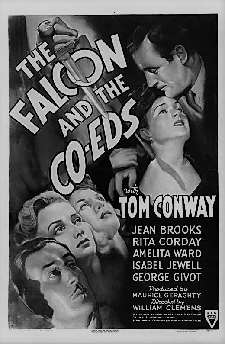 FALCON AND THE CO-EDS, THE (1943)
FALCON AND THE CO-EDS, THE (1943) (68 Min.) Genre: 1940 SUSPENSE, Transfer Quality: B
When an instructor dies mysteriously at an exclusive girl's school, Tom Lawrence (Tom Conway), a devil-may-care sleuth known as "The Falcon", reluctantly agrees to investigate. The death appears to have been induced by a heart attack, but the instructor's roommate (Rita Corday) had predicted that the victim would be murdered. The school's dean (Barbara Brown) dies shortly afterward, and suspicion falls upon the fencing instructor (Jean Brooks), who'd been in line to inherit the school. Other suspects include a foreign psychology professor (George Givot) who'd once courted the fencing teacher, and a meek music teacher (Isabel Jewell), to whom the foreign prof is secretly married. The murderer is revealed in a heart-stopping climactic scene played out on a perilous cliff overlooking the ocean. Falcon and the Co-Eds is the sixth film in RKO Radio's "Falcon" series. — Hal Erickson
Starring: Tom Conway, Jean Brooks, Rita Corday, Amelita Ward | Directed by: William B. Clemens
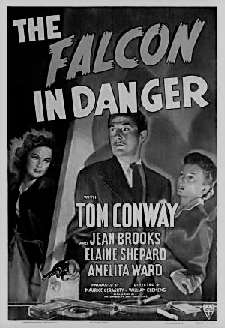 FALCON IN DANGER, THE (1943)
FALCON IN DANGER, THE (1943) (73 Min.) Genre: 1940 SUSPENSE, Transfer Quality: A
In this entry, the detective must find two missing industrialists. They and $100,000 suddenly vanished while flying in a passenger plane. It does not take long for the supersleuth to discover that their disappearance is part of a conspiracy against the government. — Sandra Brennan
Starring: Tom Conway, Jean Brooks, Elaine Shepard, Amelita Ward, Barbara Hale | Directed by: William B. Clemens
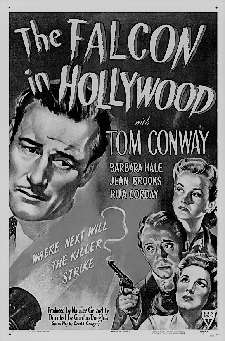 FALCON IN HOLLYWOOD, THE (1944)
FALCON IN HOLLYWOOD, THE (1944) (67 Min.) Genre: 1940 SUSPENSE, Transfer Quality: A
This delightful entry in RKO Radio's "Falcon" series finds amateur Tom Lawrence (Tom Conway), aka The Falcon, tring to solve a series of Tinseltown murders. The killings all seem to be tied in with a "jinxed" movie production, supervised by neurotic studio executive Martin Dwyer (John Abbott). Accompanied by wisecracked lady cabbie Billie (Veda Ann Borg), Lawrence pokes around a studio backlot, gathering clues and grilling suspects all along the way. Could the murderer be pretty starlet Peggy Callahan (Barbara Hale), haughty prima donna Lili D'Alio (Rita Corday) or shady "businessman" Louie (Sheldon Leonard)? Filmed on such locations as the Hollywood Park race track and the Hollywood Bowl, The Falcon in Hollywood spends most of its time within the offices, sound stages, technical departments and walkways of the RKO Radio studio itself. The film was one of the most popular of RKO's "Falcon" efforts, posting a $115,000 profit. — Hal Erickson
Starring: Tom Conway, Barbara Hale, Rita Corday, Jean Brooks | Directed by: Gordon M. Douglas
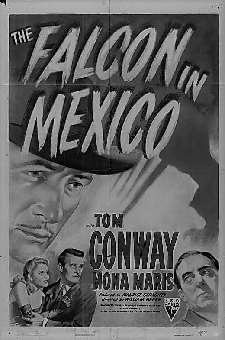 FALCON IN MEXICO, THE (1944)
FALCON IN MEXICO, THE (1944) (70 Min.) Genre: 1940 SUSPENSE, Transfer Quality: A
The Falcon in Mexico wastes no time getting started: within the first ten minutes, amateur sleuth Tom Lawrence (Tom Conway), aka The Falcon, gets mixed up with a damsel in distress, the murder of an art gallery owner, and a collection of valuable paintings attributed to a supposedly dead artist. Flying to Mexico, Lawrence gets in touch with Barbara (Martha MacVicar, later Vickers), the daughter of the allegedly deceased Humphrey Wade (Bryant Washburn). Before long, Lawrence has three more murders on his hands, not to mention an unknown assassin who's gunning for him. The film's most memorable performance is delivered by Nestor Paiva as a resourceful Mexican cabbie who's got a little more on the ball than is immediately apparent. — Hal Erickson
Starring: Tom Conway, Mona Maris, Nestor Paiva, Mary Currier | Directed by: William A. Berke
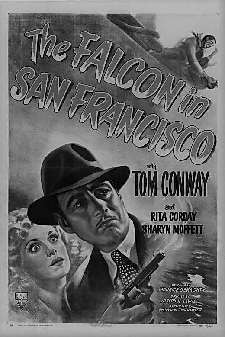 FALCON IN SAN FRANCISCO, THE (1945)
FALCON IN SAN FRANCISCO, THE (1945) (66 Min.) Genre: 1940 SUSPENSE, Transfer Quality: A
Filmed extensively on location, The Falcon in San Francisco is one of the best of RKO Radio's "Falcon" series. This time around, amateur sleuth Tom Lawrence (Tom Conway), aka The Falcon, comes to the aid of 10-year-old Annie Marshall (Sharyn Moffet). While trying to solve the murder of Annie's nurse, Lawrence is accused of kidnapping the kid. Several beatings, warnings and murders later, Lawrence discovers that the solution of the mystery is tied in with a gang of silk smugglers, headed by none other than?.Oh, no! The surprise ending isn't going to be tipped off here! Director Joseph H. Lewis' occasional utilization of "cinema verite" techniques would later develop full-blown into such noir classics as Gun Crazy. — Hal Erickson
Starring: Tom Conway, Rita Corday, Edward S. Brophy, Fay Helm | Directed by: Joseph H. Lewis
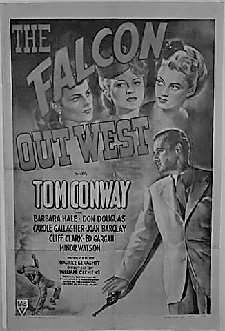 FALCON OUT WEST, THE (1944)
FALCON OUT WEST, THE (1944) (64 Min.) Genre: 1940 SUSPENSE, Transfer Quality: B
The murder of a wealthy, much-married rancher (Lyle Talbot) in a posh Manhattan nightclub is the catalyst for The Falcon Out West. Amateur sleuth Tom Lawrence (Tom Conway), aka The Falcon, deduces that the victim was killed with rattlesnake venom. He follows the trail of evidence to a dude ranch in a frontier town. The suspects include pretty Marion (Barbara Hale) and Vanessa (Carol Gallegher) and not-so-pretty Bates (Minor Watson) and Hayde (Don Douglas). Though Tom Conway seems bored and distracted throughout The Falcon Out West, the film itself is an above-average "Falcon" series entry. — Hal Erickson
Starring: Tom Conway, Carol Gallagher, Barbara Hale, Joan Barclay | Directed by: Donald Dillaway, William B. Clemens
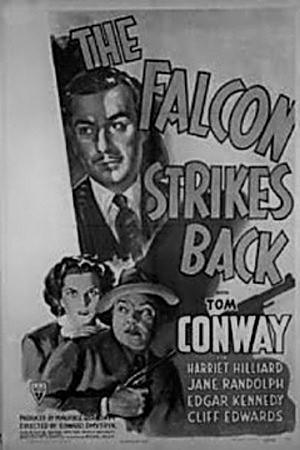 FALCON STRIKES BACK, THE (1942)
FALCON STRIKES BACK, THE (1942) (66 Min.) Genre: 1940 SUSPENSE, Transfer Quality: A
Tom Conway makes his second appearance as amateur sleuth Tom Lawrence, aka "The Falcon", in RKO Radio's The Falcon Strikes Back. Framed for the theft of valuable war bonds, Lawrence hides out at a country resort. Here he discovers that Mia Bruger (Rita Corday), who engineered the frame, has been murdered by persons unknown. Snooping around a bit, Lawrence uncovers an insidious and widespred war-bond racket. The revelation of the murderer's identity will come as a jolt to fans of old 2-reel comedies. Atmospherically directed by Edward Dmytryk (who obviously had his eye on bigger projects), The Falcon Strikes Back costars Harriet Hilliard, better known to TV fans as Mrs. Ozzie Nelson. As a bonus, there's a plug for Walt Disney, who was then releasing his product through RKO. — Hal Erickson
Starring: Tom Conway, Jane Randolph, Edgar Kennedy, Cliff Edwards | Directed by: Edward Dmytryk
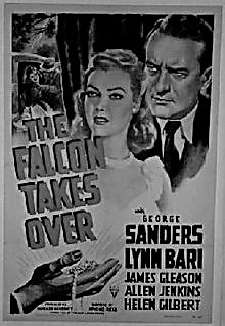 FALCON TAKES OVER, THE (1942)
FALCON TAKES OVER, THE (1942) (63 Min.) Genre: 1940 SUSPENSE, Transfer Quality: B
The plot of the RKO Radio programmer The Falcon Takes Over will be instantly recognizable to anyone who has seen the 1944 Philip Marlowe mystery Murder My Sweet: indeed, both films were based on the same Raymond Chandler novel, Farewell My Lovely. It all begins when brutish prison escapee Moose Malloy (Ward Bond) forces nervous Broadwayite Goldie Locke (Allen Jenkins) to drive him to a posh nightclub, where Moose hopes to be reunited with his old girlfriend. Unable to find his elusive sweetheart, Moose tears the joint apart, obliging Goldie to flee for his life. As it happens, Goldie is the assisant of private eye Gay Lawrence (George Sanders), aka The Falcon, who has been hired by foppish socialite Lindsey Marriot (Hans Conried) to ransom a necklace stolen from Marriot's lady friend Diane Kenyon (Helen Gilbert). Shortly afterward, Marriot is murdered, and the Falcon discovers that there's an inextricable link between the dead man and the inimitable Moose Malloy. The rest of the film follows the plot convolutions set down by Chandler in Farewell My Lovely, carefully retailed to suit the breezy urbanity of George Sanders as the Falcon. Though Murder My Sweet is the better of the two versions of the Chandler novel, The Falcon Takes Over has a few advantages of its own, notably the casting of future Oscar winner Ann Revere as blowzy murder suspect Jessie Florian.
Starring: George Sanders, Lynn Bari, James Gleason, Allen Jenkins | Directed by: Irving G. Reis
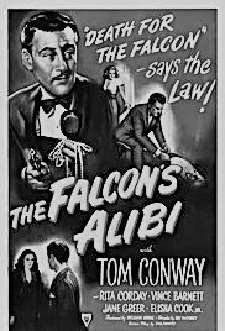 FALCON'S ALIBI, THE (1946)
FALCON'S ALIBI, THE (1946) (63 Min.) Genre: 1940 SUSPENSE, Transfer Quality: A
A loose remake of 1941's The Gay Falcon, The Falcon's Alibi is one of the better entries in RKO's "Falcon" series, and one of the few that can stand on its own merits as a "film noir." This time, amateur detective Tom Lawrence (Tom Conway), aka the Falcon, endeavors to protect wealthy journalist Henryette Alcott (Ann Richards) lobbies to bring Law and Order into Quinto. As it turns out, the villain of the piece is ruthlessly ambitious marshal Bill Hampton (Morgan Conway), who hopes to foment trouble between the outlaws and the peaceable settlers for his own political gain. Badman's Territory proved so successful that the formula was repeated several times by RKO and other studios. — Hal Erickson
Starring: Tom Conway, Rita Corday, Vince Barnett, Jane Greer, Elisha Cook, Jr. | Directed by: Ray McCarey
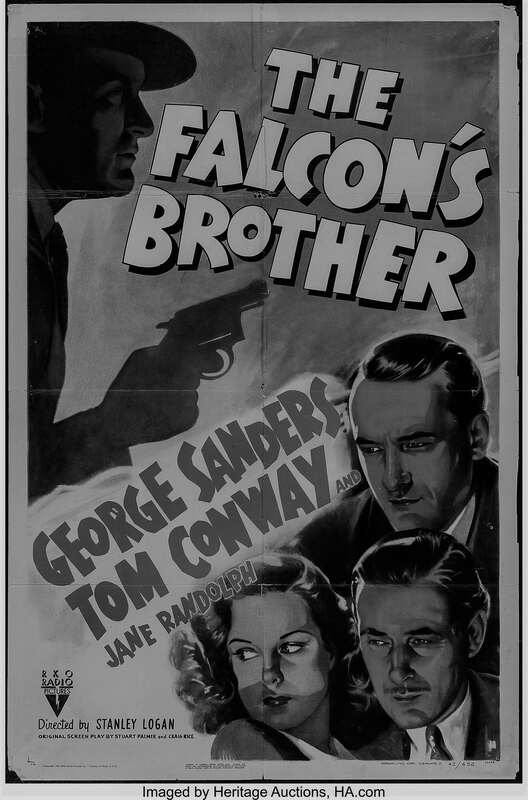 FALCON'S BROTHER, THE (1942)
FALCON'S BROTHER, THE (1942) (63 Min.) Genre: 1940 SUSPENSE, Transfer Quality: A
When George Sanders announced that he was leaving the "Falcon" series, RKO Radio came up with the perfect replacement: Sanders' own brother, Tom Conway. The transition was handled with style in The Falcon's Brother, with private detective Gay Lawrence (Sanders), aka The Falcon, incapacitated early in the proceedings. Anxious to break up an Axis spy ring, Gay calls upon his brother Tom (Tom Conway) to help out. The villains intend to foment a rift in the relationship between North and South America, which Tom, with the aid of intrepid heroine Marcia (Jane Randolph) and dopey sidekick Goldy (Don Barclay), hopes to prevent. By film's end, Tom Lawrence has assumed his brother's mantle as the Falcon, and the Falcon he would remain for the next eight entries in the series. — Hal Erickson
Starring: George Sanders, Tom Conway, Jane Randolph, Don Barclay | Directed by: Stanley Logan
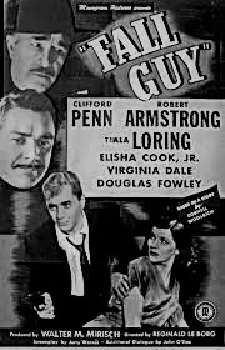 FALL GUY (1947)
FALL GUY (1947) (64 Min.) Genre: 1940 SUSPENSE, Transfer Quality: B
Nice guys don't always finish last as can be seen in this crime drama. The story begins as a perfectly nice fellow finds himself arrested for murder. The trouble is, the man cannot remember a thing about the night of the murder. Though he insists he is innocent, all the evidence tells a different story. He was found at the scene with a bloody knife in his hand. Fortunately, a policeman friend, believes him. He gets him out of jail and together, they begin looking for the real killer. They soon find that the set-up was perpetrated by his uncle who strongly disapproved of his dating his ward. The woman who died had been the uncle's lover who was blackmailing him. To get even with them all, the uncle drugged his nephew, killed his mistress and planted the knife upon his unconscious relative. In the end, the uncle is arrested and the nephew and his lover live a long and happy life together.
Starring: Iris Adrian, Lou Lubin, Katherine Marlowe, Elisha Cook, Jr. | Directed by: Reginald Le Borg
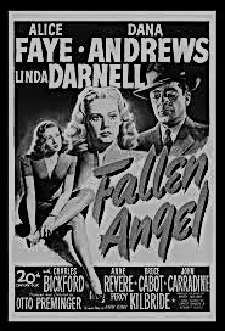 FALLEN ANGEL (1945)
FALLEN ANGEL (1945) (97 Min.) Genre: 1940 SUSPENSE, Transfer Quality: A
Otto Preminger directed this stylish film noir exercise, intended as a follow-up to his surprise hit Laura. Kicked off a bus traveling cross-country for not being able to come up with the fare, down-and-out press agent Eric Stanton (Dana Andrews) ends up in Walton, a small coastal town in California. Stanton fast-talks Joe Ellis (Olin Howland) into giving him a place to stay for the night in exchange for promoting Professor Madley (John Carradine), a "mentalist" whose show Ellis manages. While in Walton, Stanton makes the acquaintance of June Mills (Alice Faye), a wealthy but reclusive young woman, and has his eye on Stella (Linda Darnell), a good-looking waitress working at the local diner. Thanks to Madley, Stanton learns a few things about June, and when Ellis and the Professor pull up stakes after a successful engagement, Stanton opts to stay behind, hoping to win Stella's heart. Golddigger Stella makes it known that she has no interest in Stanton unless he comes into a lot of money, but June has made her interest in Stanton quite clear. Stanton hatches a plan: he'll marry June, take her money, divorce her, and then take up with Stella. Stanton and June do in fact marry, but just as he's about to give her the brush-off, Stella turns up dead. Mark Judd (Charles Bickford), a retired cop turned detective, is investigating the murder, and while the initial suspect is Dave Atkins (Bruce Cabot), Stella's ne'er-do-well ex-boyfriend, Judd's focus eventually falls on Stanton. Stanton flees Walton for San Francisco, with ever-loyal June at his side; he quickly abandons her after taking her money, but he returns to her side when word reaches him that June has been charged with Stella's murder. Fallen Angel marked a dramatic change of pace for Alice Faye; however, she was very unhappy with how Preminger edited her performance, convinced that much of her best work ended up on the cutting room floor. Faye was so angry that she quit the movie business altogether and didn't appear in another film until State Fair in 1962. — Mark Deming
Starring: Dana Andrews, Alice Faye, Linda Darnell, Charles Bickford | Directed by: Otto Preminger
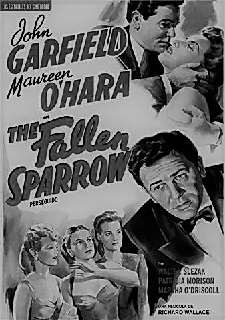 FALLEN SPARROW, THE (1943)
FALLEN SPARROW, THE (1943) (94 Min.) Genre: 1940 SUSPENSE, Transfer Quality: A
John Garfield was borrowed from Warner Bros. by RKO Radio for the tense espionage melodrama The Fallen Sparrow. Garfield is cast as Kit, an idealistic Spanish Civil War veteran who survives two torturous years in a fascist prison. Upon returning to New York, Kit is pounced upon by Nazi agents, who hope to learn the valuable secrets that Kit would not reveal to his captors during his ordeal. Among the methods of persuasion utilized by the Nazis is the beautiful Toni (Maureen O'Hara in a masterpiece of against-type casting). But Kit is made of stronger stuff than the spies are used to, and eventually he is able to beat them at their own game. Walter Slezak costars as the mellifluous-but-deadly Dr. Skaas. The Fallen Sparrow was based on the best-selling novel by Dorothy B. Hughes. — Hal Erickson
Starring: John Garfield, Maureen O'Hara, Walter Slezakak, Patricia Morison, Hugh Beaumont | Directed by: Richard Wallace
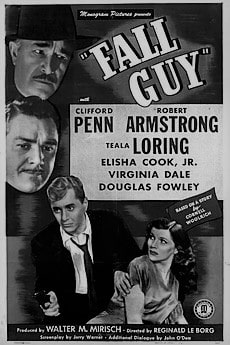 FALLGUY (1947)
FALLGUY (1947) (64 Min.) Genre: 1940 SUSPENSE, Transfer Quality: B
Nice guys don't always finish last as can be seen in this crime drama. The story begins as a perfectly nice fellow finds himself arrested for murder. The trouble is, the man cannot remember a thing about the night of the murder. Though he insists he is innocent, all the evidence tells a different story. He was found at the scene with a bloody knife in his hand. Fortunately, a policeman friend, believes him. He gets him out of jail and together, they begin looking for the real killer. They soon find that the set-up was perpetrated by his uncle who strongly disapproved of his dating his ward. The woman who died had been the uncle's lover who was blackmailing him. To get even with them all, the uncle drugged his nephew, killed his mistress and planted the knife upon his unconscious relative. In the end, the uncle is arrested and the nephew and his lover live a long and happy life together.
Starring: Clifford Penn, Robert Armstrong, Elisha Cook Jr., Douglas Fowley | Directed by: Reginald Le Borg
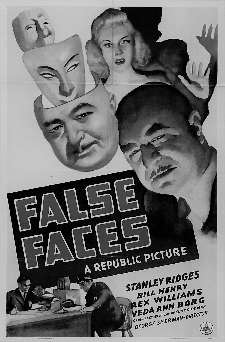 FALSE FACES (1943)
FALSE FACES (1943) (52 Min.) Genre: 1940 SUSPENSE, Transfer Quality: B
Republic's False Faces is a choice example of wartime "victory casting", with all the male cast members drawn from the ranks of the undraftable. Rex Williams plays morose saloon patron Craig Harding, who is on hand during a barroom brawl which leads to the death of songstress Joyce Ford (Veda Ann Borg). Suspected in the murder are Harding and his pal Don Westcott (Bill Henry). Harding's father, district attorney Stanley Harding (Stanley Ridges), faces a difficult decision: on the basis of circumstantial evidence, he may be forced to send his own son up the river for life. It's giving nothing away to reveal that the Most Likely Suspects didn't do it, but the Least Likely Suspect did.
Starring: Stanley Ridges, Rex Williams, Veda Ann Borg, Janet Shaw | Directed by: George Sherman
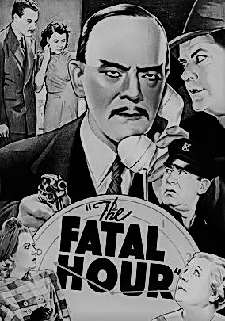 FATAL HOUR, THE (1940)
FATAL HOUR, THE (1940) (68 Min.) Genre: 1940 SUSPENSE, Transfer Quality: A
The Fatal Hour was the fourth entry in Monogram's "Mr. Wong" series, based on the gentlemanly oriental detective created by Hugh Wiley. Boris Karloff returns as Wong, supported by Grant Withers as dyspeptic police captain Street and Marjorie Reynolds as brash gal reporter Bobbie Logan. On this occasion, Mr. Wong investigates the murder of a police officer, nearly ending up murdered himself during a climactic jewelry-store robbery. The principal suspect is Belden (Craig Reynolds), the son of a crooked businessman (John Hamilton) whose perfidy has apparently caused all the trouble in the first place. The Fatal Hour was scripted by Joseph West, a pseudonym for director George Waggner (who didn't direct this one). — Hal Erickson
Starring: Boris Karloff, Grant Withers, Marjorie Reynolds, Charles Trowbridge | Directed by: William Nigh
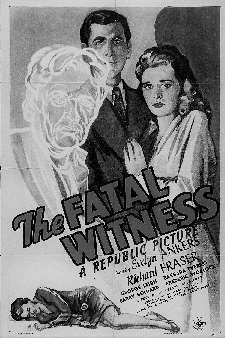 FATAL WITNESS, THE (1945)
FATAL WITNESS, THE (1945) (59 Min.) Genre: 1940 SUSPENSE, Transfer Quality: B
In this murder mystery, a Scotland Yard inspector investigates the murder of a prominent matron.
Starring: Evelyn Ankers, Richard Fraser, George Leigh, Barbara Everest | Directed by: Lesley Selander
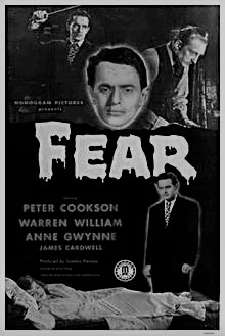 FEAR (1946)
FEAR (1946) (68 Min.) Genre: 1940 SUSPENSE, Transfer Quality: B
Peter Cookson, Monogram's answer to Jimmy Stewart, stars in Fear, also known as Black Tower Cookson plays a medical student who becomes involved in a murder. Anne Gwynne is the girl who doesn't completely trust Cookson, but helps him out anyway. Also appearing as one of those oh-too-helpful types is Warren William, who died in 1948, suggested that perhaps Black Tower was lensed a few years before its official 1950 release date. Some sources list Black Tower as a PRC production; this is possible, though PRC was defunct by 1950.
Starring: Peter Cookson, Warren William, Anne Gwynne, Nestor Paiva, Darren McGavin | Directed by: Alfred Zeisler
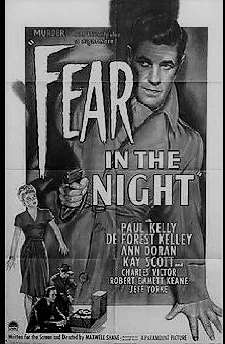 FEAR IN THE NIGHT (1947)
FEAR IN THE NIGHT (1947) (72 Min.) Genre: 1940 SUSPENSE, Transfer Quality: A
One of several low-budget mellers directed by scriptwriter Maxwell Shane, Fear in the Night was based on the short story Nightmare by William Irish (pseudonym for Cornell Woolrich). In his first starring role, DeForest Kelley plays a young man who has a terrible nightmare, wherein he sees himself killing someone. When he awakens, Kelley finds a couple of pieces of evidence indicating that his dream was no dream. Detective Paul Kelly doesn't believe that Kelley has killed anyone, but agrees to investigate. While taking shelter from a storm in a remote mansion, the detective and the young man stumble upon a mirrored room—just like the one in Kelley's dream. The frenzied Kelley is nearly driven to suicide, but detective Kelly deduces that his friend's nightmare was the handiwork of Robert Emmett Keane, the mansion's owner, who is a dabbler in hypnosis. Fear in the Night was remade in 1956 as Nightmare, with Kevin McCarthy and Edward G. Robinson. — Hal Erickson
Starring: Paul Kelly, DeForest Kelley, Ann Doran, Kay Scott | Directed by: Maxwell Shane
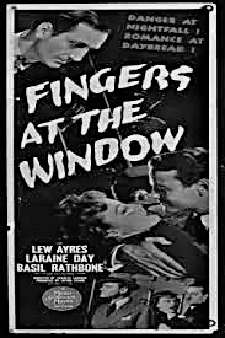 FINGERS AT THE WINDOW (1942)
FINGERS AT THE WINDOW (1942) (80 Min.) Genre: 1940 SUSPENSE, Transfer Quality: A
A fun though abortive bid to pair crime-solving duo Lew Ayres and Laraine Day for a series of thrillers, this murder mystery benefits from good performances by the leads. The plot involves a series of axe murders in Chicago being perpetrated by the patients of an insane asylum, all of whom have been hypnotically conditioned to kill by madman Doctor Santelle (Basil Rathbone). The plot is finally foiled by Oliver Duffy (Ayres), a former actor turned amateur sleuth, just in time to save his none-too-bright companion Edwina (Day). Though the suspense elements are fairly well-mounted, they are too frequently diluted by some rather ill-conceived attempts at comic relief. Despite his popularity as Doctor Kildare, Ayres' star potential would fade quickly after this film thanks to his subsequent conscientious-objector status during World War II. — Cavett Binion
Starring: Lew Ayres, Laraine Day, Basil Rathbone, Walter Kingsford, Miles Mander | Directed by: Charles Lederer
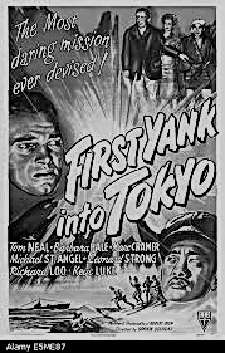 FIRST YANK INTO TOKYO (1945)
FIRST YANK INTO TOKYO (1945) (83 Min.) Genre: 1940 SUSPENSE, Transfer Quality: A
This WW II drama is the first to deal with the fateful atomic bomb attack on Japan. Originally, the film centered on the acquisition of a new kind of gun, but as it was in production during the time the Bomb was dropped, the producers were quick to change the story to suit the times. It tells the story of a straight-arrow American pilot who was raised in Japan and is asked to return there to get a captured scientist to garner valuable information about the A-bomb. The pilot, Major Ross, realizes that he will not survive the mission, but as he has just lost his lover, he cares little for life. Before he goes, his face is surgically altered so he looks Japanese and he then infiltrates the camp where the scientist is being held. There he finds his girl friend, an army nurse, who has also been captured. Unfortunately, she has fallen in love with a fellow inmate. The determined Major Ross remains focused and completes his mission, but not before encountering considerable danger at the hands of enemy officers. The end of the film features actual newsreel footage of nuclear bombings from Pathe. — Sandra Brennan
Starring: Barbara Hale, Richard Loo, Keye Luke, Leonard Strong | Directed by: Gordon M. Douglas
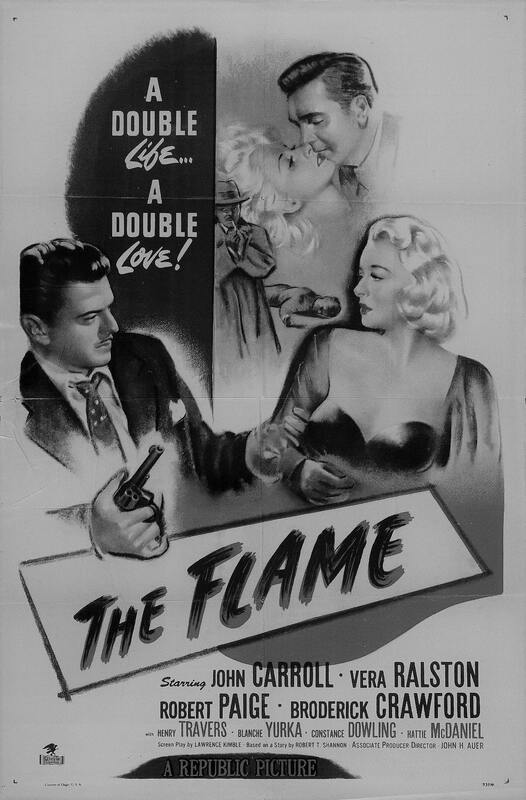 FLAME, THE (1947)
FLAME, THE (1947) (96 Min.) Genre: 1940 SUSPENSE, Transfer Quality: B
Carlotta Duval (Vera Ralston) is willing to help her boyfriend George McAllister (John Carroll) get his hands on his ailing brother Barry's (Robert Paige) fortune. She is willing to marry Barry, knowing full well that he has only been given a few months to live. And when she deviates from the scheme by falling in love with Barry, she is willing to nurse her husband back to health, despite what George has to say about it. But is George willing to prevent slimy blackmailer Ernie Hicks (Broderick Crawford) from destroying Carlotta and Barry's newfound happiness? In terms of both budget and histrionic level, The Flame is one of the most lavish of Republic Pictures' late-1940s productions.
Starring: John Carroll, Vera Ralston, Broderick Crawford, Robert Paige | Directed by: John H. Auer
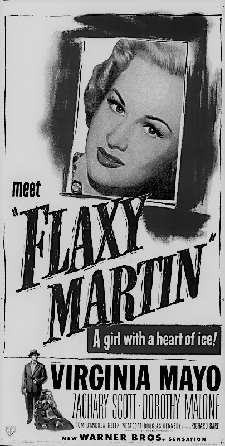 FLAXY MARTIN (1949)
FLAXY MARTIN (1949) (86 Min.) Genre: 1940 SUSPENSE, Transfer Quality: A
Virginia Mayo is Flaxy Martin in this complicated Warner Bros. melodrama. Flaxy is a bad girl but good company, especially when she's around criminal attorney Walter Colby (Zachary Scott). When Colby begins to have second thoughts about his gangster cohorts, Flaxy arranges a murder frame, forcing the attorney to go on the run. The bulk of the film is a thrill-packed chase teaming Colby with the film's resident Good Girl, Nora Carson (Dorothy Malone). Also figuring into the proceedings is Elisha Cook Jr., playing his usual shifty little creep. Director Richard L. Bare had only recently moved up from the "Joe McDoakes" comedy shorts to features when he guided Flaxy Martin with skill and aplomb. — Hal Erickson
Starring: Virginia Mayo, Zachary Scott, Dorothy Malone, Tom D'Andrea, Elisha Cook Jr. | Directed by: Richard L. Bare
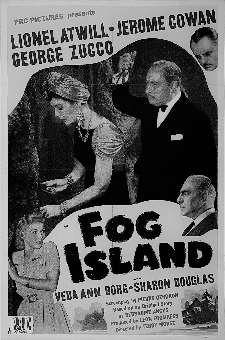 FOG ISLAND (1945)
FOG ISLAND (1945) (72 Min.) Genre: 1940 SUSPENSE, Transfer Quality: B
An early low-budget spin on Ten Little Indians, this cheap but entertaining PRC production features a wonderful cast of familiar B-movie faces, particularly George Zucco and Lionel Atwill. Zucco plays a man wrongfully imprisoned after being framed for his wife's murder by one of his colleagues. After his release, he joins forces with a mad inventor to carry out his long-awaited plans of revenge, inviting a group of his former associates to a remote island mansion — which is enveloped in a thick perpetual fog and rigged with a plethora of lethal booby-traps — in an effort to reveal and destroy the guilty party. Rather cheap-looking but boasting some remarkable special effects, this film is worth a look for its pairing of the wonderfully hammy Atwill and Zucco.
Starring: George Zucco, Lionel Atwill, Jerome Cowan, Sharon Douglas | Directed by: Terrell O. Morse
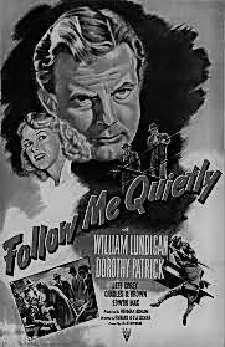 FOLLOW ME QUIETLY (1949)
FOLLOW ME QUIETLY (1949) (60 Min.) Genre: 1940 SUSPENSE, Transfer Quality: A
Though RKO Radio had trouble turning out successful "A" pictures in the late 1940s-early 1950s, the studio's "B" productions were the best in the business. One of the best was 1949's strange, obsessive film noir Follow Me Quietly, which manages to pack more excitement and sheer entertainment value in 59 minutes than most big-budgeters can accomplish in twice that time. Detective Harry Grant (William Lundigan) is assigned to track down "The Judge," an unknown serial killer. With only a handful of sketchy clues, Grant constructs a faceless dummy to help his men conduct their investigation. The film's "money scene" finds the murderer quietly taking the dummy's place, right under the noses of the entire police force! Logic is not the film's strong suit, but Follow Me Quietly builds carefully to a dynamite finale filmed on location at an LA refinery (shades of White Heat!) — Hal Erickson
Starring: William Lundigan, Dorothy Patrick, Jeff Corey, Charles D. Brown | Directed by: Richard Fleischer
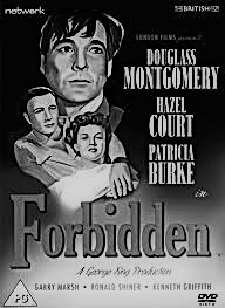 FORBIDDEN (1949)
FORBIDDEN (1949) (87 Min.) Genre: 1940 SUSPENSE, Transfer Quality: B
In this drama, a medicine seller falls for an ice cream vendor. Unfortunately, his wife won't grant him a divorce. In order to help her change her mind, he slips her some pills in an attempt to give her a coronary. It works and so he buries her. As he does, he finds the extra pills. She had died of natural causes. The police chase him down because they think she was murdered.
Starring: Richard Bird, Patricia Burke, Erik Chitty, Peggy Ann Clifford | Directed by: George King
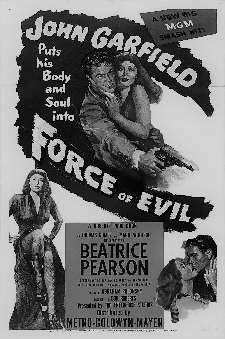 FORCE OF EVIL (1948)
FORCE OF EVIL (1948) (78 Min.) Genre: 1940 SUSPENSE, Transfer Quality: A
Rock-solid film noir about a racketeer's lawyer (Garfield, in a stunning performance), whose ideals have been obscured by his greed. Beautifully photograghed (by George Barnes) and lit; this has become something of a cult item. Polonsky, who coscripted with Ira Wolfert, was blacklisted and didn't make another film until 1969's "Tell Them Willie Boy Is Here".
Starring: John Garfield, Beatrice Pearson, Thomas Gomez, Marie Windsor | Directed by: Abraham Polonsky
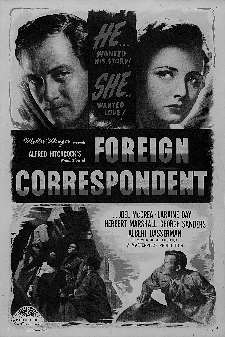 FOREIGN CORRESPONDENT (1940)
FOREIGN CORRESPONDENT (1940) (120 Min.) Genre: 1940 SUSPENSE, Transfer Quality: A
Fourteen scriptwriters spent five years toiling over a movie adaptation of war correspondent Vincent Sheehan's Personal History before producer Walter Wanger brought the property to the screen as Foreign Correspondent. What emerged was approximately 2 parts Sheehan and 8 parts director Alfred Hitchcock—and what's wrong with that? Joel McCrea stars as an American journalist sent by his newspaper to cover the volatile war scene in Europe in the years 1938 to 1940. He has barely arrived in Holland before he witnesses the assassination of Dutch diplomat Albert Basserman: at least, that's what he thinks he sees. McCrea makes the acquaintance of peace-activist Herbert Marshall, his like-minded daughter Laraine Day, and cheeky British secret agent George Sanders. A wild chase through the streets of Amsterdam, with McCrea dodging bullets, leads to the classic "alternating windmills" scene, which tips Our Hero to the existence of a formidable subversive organization. McCrea returns to England, where he nearly falls victim to the machinations of jovial hired-killer Edmund Gwenn. The leader of the spy ring is revealed during the climactic plane-crash sequence—which, like the aforementioned windmill scene, is a cinematic tour de force for director Hitchcock and cinematographer Rudolph Mate. Producer Wanger kept abreast of breaking news events all through the filming of Foreign Correspondent, enabling him to keep the picture as "hot" as possible: the final scene, with McCrea broadcasting to a "sleeping" America from London while Nazi bombs drop all around him, was filmed only a short time after the actual London blitz. The script was co-written by Robert Benchley, who has a wonderful supporting role as an eternally tippling newsman. Foreign Correspondent was Alfred Hitchcock's second American film, and remained one of his (and his fans') personal favorites. — Hal Erickson
Starring: Joel McCrea, Laraine Day, Herbert Marshall, George Sanders | Directed by: Alfred Hichcock
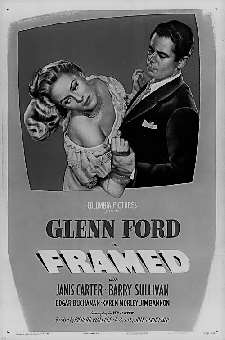 FRAMED (1947)
FRAMED (1947) (82 Min.) Genre: 1940 SUSPENSE, Transfer Quality: A
A man down on his luck runs afoul of a beautiful but dangerous woman in this superior low-budget film noir. Mike Lambert (Glenn Ford), while trained as a mining engineer, has fallen on hard times and is driving a truck when his rig breaks down in a small town. He soon meets the seductive Paula Craig (Janis Carter) at a cafe and is quickly drawn into her web of larceny. Paula encourages her lover, Stephen Price (Barry Sullivan), to rob the bank that he manages, then kills Stephen and takes the ill-gotten money. Paula confesses the killing to Mike and begs him to run away with her, claiming she murdered Price in a fit of passion while she was drunk. Mike considers her offer until he learns that his close friend Jeff Cunningham (Edgar Buchanan) has been accused of killing Stephen — and that Paula intends to pin the robbery that Stephen committed on Mike. Femme Fatale Janis Carter originally studied to be a classical musician before her career as an actress took off, while Edgar Buchanan's big break would come 16 years down the road, when he was cast as "Uncle Joe" on the television series Petticoat Junction.
Starring: Glenn Ford, Janis Carter, Barry Sullivan, Edgar Buchanan | Directed by: Richard Wallace
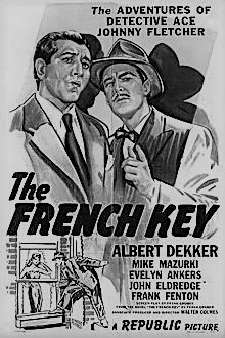 FRENCH KEY, THE (1946)
FRENCH KEY, THE (1946) (64 Min.) Genre: 1940 SUSPENSE, Transfer Quality: B
French Key is a Republic Pictures murder mystery with all of the studio's genre trademarks: Good cast, reasonably good direction, fairly good sets and middling story values. Albert Dekker plays a private eye who is framed for murder. With the police breathing down his neck, it's up to the detective to solve the mystery himself. The supporting suspects include such reassuringly familiar faces as Evelyn Ankers, Mike Mazurki, Richard Arlen, Frank Fenton and Byron Foulger. Some prints of French Key have been cut from 64 to 54 minutes in order to fit into a TV "hour".
Starring: Albert Dekker, Mike Mazurki, Evelyn Ankers, John Eldredge | Directed by: Walter Colmes
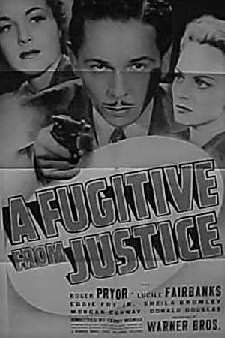 FUGITIVE FROM JUSTICE, A (1940)
FUGITIVE FROM JUSTICE, A (1940) (53 Min.) Genre: 1940 SUSPENSE, Transfer Quality: A
The 1940 Warner Bros. quickie A Fugitive From Justice is based on Leonard Neubauer's short story "Million Dollar Fugitive." Roger Pryor plays insurance investigator Don Miller, who endeavors to hide Lee Leslie (Donald Douglas), holder of a million-dollar policy, from both the police and the underworld. Miller's efforts are frequently stymied by Mark Rogers (John Gallaudet), a Winchellesque radio reporter in cahoots with the G-Men. Our hero's allies include his wisecracking assistant Ziggy (Eddie Foy Jr., brother of Bryan Foy, the film's producer) and all-purpose heroine Janet Leslie (Lucille Fairbanks, niece of Douglas Fairbanks Sr.) A Fugitive from Justice sure looks like a remake, but a remake of what remains a mystery. — Hal Erickson
Starring: Roger Pryor, Lucille Fairbanks, Eddie Foy, Jr., Sheila Bromley | Directed by: Terrell O. Morse, Sam Newfield
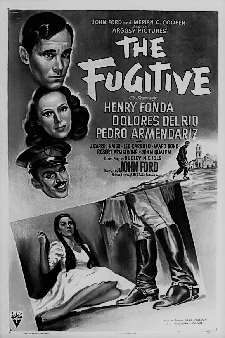 FUGITIVE, THE (1947)
FUGITIVE, THE (1947) (104 Min.) Genre: 1940 SUSPENSE, Transfer Quality: A
The Fugitive was shot on location in Mexico by that country's premiere cinematographer, Gabriel Figueroa. Henry Fonda plays a Christ-like priest in an unnamed Latin-American country where religion has been outlawed. Though incognito in a backwater village, Fonda cannot help but seem more spiritual and mystical than those around him. Meanwhile, another fugitive, homicidal-bandit Ward Bond, stumbles into the village. Bond and the beautiful Dolores del Rio, whose illegitimate child has been secretly baptized by Fonda, conspire to help the priest escape. Once Fonda is on safe ground, he is implored by police spy J. Carroll Naish to return to the village, ostensibly because Bond is dying and wishes to have last rites. Fonda is captured and sentenced to death, but is willing to forgive the repentant Naish for betraying him. The priest dies a martyr, and the outpouring of public grief proves to the authorities that simply outlawing religion will never subjugate the hearts and minds of the people. — Hal Erickson
Starring: Henry Fonda, Dolores Del Rio, Pedro Armendáriz, J. Carrol Naish | Directed by: John Ford
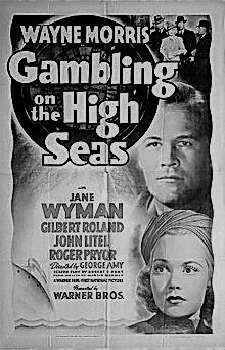 GAMBLING ON THE HIGH SEAS (1940)
GAMBLING ON THE HIGH SEAS (1940) (56 Min.) Genre: 1940 SUSPENSE, Transfer Quality: A
This 55-minute remake of the 75-minute Warner Bros. crime drama Special Agent retains a surprising amount of the original's plotline. Wayne Morris plays crusading journalist Jim Carter, who hopes to get the goods on crime boss Greg Morella (Gilbert Roland), the owner of a posh gambling ship anchored just outside the 12-mile limit. Trouble is, every time a witness is lined up for the federal district attorney (John Litel), said witness is either bought off or killed off, thanks to a stool pigeon in the DA's office. Eventually, Carter must rely upon the eyewitness testimony of Laurie Ogden (Jane Wyman), Morella's bookkeeper. To prevent this, Morella has Laurie kidnapped and hidden away on his ship, but Carter comes to the rescue. The film's central gimmick, a roulette wheel with a concealed camera, evidently caught the fancy of director George Amy, since this particular prop is given more close-ups than the two stars.
Starring: Wayne Morris, Jane Wyman, Gilbert Roland, John Litel, George Reeves | Directed by: George J. Amy
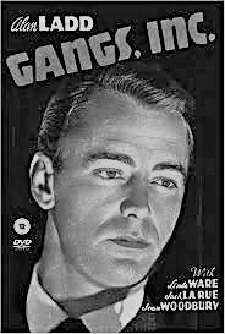 GANGS, INC (1941)
GANGS, INC (1941) (72 Min.) Genre: 1940 SUSPENSE, Transfer Quality: B
Paper Bullets (aka Crime Inc.) was the first production by former slot-machine entrepreneurs Maurice and Frank Kozinski, later and better known as the King Brothers. Written by former crime reporter Martin Mooney, the story focuses on the efforts by an undercover agent Bob Elliot (John Archer) to get the goods on mobster Mickey Roma (Jack LaRue). The key to Elliot's investigation is gorgeous ex-convict Rita Adams (Joan Woodbury), who hopes to get even with Harold Dewitt (Philip Trent), the cad responsible for her incarceration. Rita's plan is to inveigle herself into the graft operation run by Harold's "respectable" politician father Clarence Dewitt (George Pembroke), then to obtain valuable evidence against Dewitt and his partner-in-crime Roma. Billed sixth as reporter Jimmy Kelly is young up-and-comer Alan Ladd, who managed to land a part in Paper Bullets because he and costar Philip Trent shared the same agent, Sue Carol (later Mrs. Ladd). When the film was reissued in 1943 as Gangs Inc, Ladd was awarded star billing.
Starring: Joan Woodbury, Jack LaRue, Linda Ware, Alan Ladd, Philip Trent, Lionel Atwill | Directed by: Phil Rosen
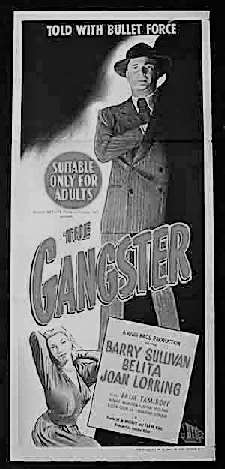 GANGSTER, THE (1947)
GANGSTER, THE (1947) (84 Min.) Genre: 1940 SUSPENSE, Transfer Quality: A
Having struck gold with the previous season's Dillinger, the King Brothers returned to Monogram as producers of The Gangster. Adapted by Daniel Fuchs from his own novel Low Company, the film stars Barry Sullivan as flint-faced racketeer Shubunka. Shown to be a product of the slums, Shubunka spends his adulthood in pursuit of power and riches, with no time for friendship or romance. Wounded in a gangland shootout, Shubunka ruminates on his past, present and (unlikely) future, wondering if it's all been worth it. Promoted as a "psychological" drama, The Gangster has plenty of gunplay and bloodshed to satiate action fans, and a surfeit of sex appeal in the form of gangster's moll Nancy (played by Monogram's resident skating star Belita). Prominent in the supporting cast is the ineluctable Sheldon Leonard as Shubunka's chief rival, delivering a subtler variation on his patented tough-guy screen persona. The Gangster was directed by Oscar-winning art director Gordon Wiles, later a mainstay of such TV series as Land of the Lost and Rowan and Martin's Laugh-In. — Hal Erickson
Starring: Barry Sullivan, Belita, Joan Lorring, Akim Tamiroff, Charles McGraw, Elisha Cook Jr. | Directed by: Gordon Wiles
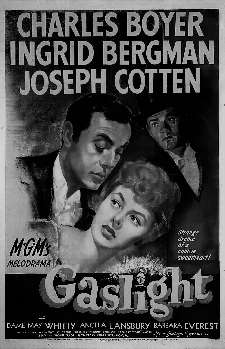 GASLIGHT (1944)
GASLIGHT (1944) (114 Min.) Genre: 1940 SUSPENSE, Transfer Quality: A
Ingrid Bergman won her first of three Oscars for this suspense thriller, crafted with surprising tautness by normally genteel "women's picture" director George Cukor. Bergman stars as Paula Alquist, a late 19th century English singer studying music in Italy. However, Paula abandons her studies because she's fallen in love with dapper, handsome Gregory Anton (Charles Boyer). The couple marries and returns to the U.K. and a home inherited by Paula from her aunt, herself a famous singer, who was mysteriously murdered in the house ten years before. Once they have moved in, Gregory, who is in reality a jewel thief and the murderer of Paula's aunt, launches a campaign of terror designed to drive his new bride insane. Though Paula is certain that she sees the house's gaslights dim every evening and that there are strange noises coming from the attic, Gregory convinces Paula that she's imagining things. Gregory's efforts to make Paula unstable are aided by an impertinent maid, Nancy (teenager Angela Lansbury in her feature film debut). Meanwhile, a Scotland Yard inspector, Brian Cameron (Joseph Cotton), becomes suspicious of Gregory and sympathetic to Paula's plight. — Karl Williams
Starring: Charles Boyer, Ingrid Bergman, Joseph Cotton, Dame May Whitty, Angela Lansbury | Directed by: George Cukor
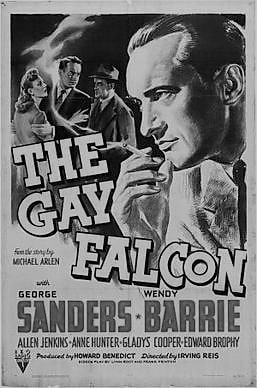 GAY FALCON, THE (1941)
GAY FALCON, THE (1941) (67 Min.) Genre: 1940 SUSPENSE, Transfer Quality: A
When the film rights to its "Saint" series proved too expensive to renew, RKO Radio came up with a lookalike property in the form of "The Falcon", even engaging George Sanders, the best of the "Saint" impersonators, to play the studio's newest gentleman detective. The Gay Falcon opens as Gay Lawrence (Sanders) -- aka the Falcon -- is hired to guard a priceless diamond. When the owner of the gem is murdered, suspicious immediately falls upon Lawrence's ex-con chauffeur Goldie (Allen Jenkins). Two more killings occur before Lawrence is able to uncover the insurance scam behind it all. Along the way, he romance a pair of toothsome leading ladies, Helen (played by series regular Wendy Barrie) and Elinor (Anne Hunter). Hans Conried contributes a sparkling bit as a snide police sketch artist.
Starring: George Sanders, Wendy Barrie, Allen Jenkins, Gladys Cooper, Edward S. Brophy, Turhan Bey | Directed by: Irving G. Reis
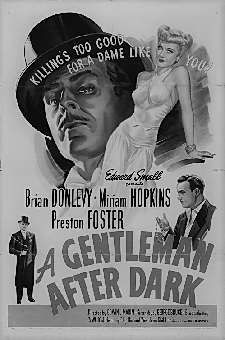 GENTLEMAN AFTER DARK, A (1942)
GENTLEMAN AFTER DARK, A (1942) (77 Min.) Genre: 1940 SUSPENSE, Transfer Quality: B
In this crime drama, a remake of Forgotten Faces (1936), a convict busts out of prison to protect his daughter from her conniving mother so that the girl will be able to marry a decent guy in the future.
Starring: Brian Donlevy, Miriam Hopkins, Preston S. Foster, Harold Huber | Directed by: Edwin L. Marin
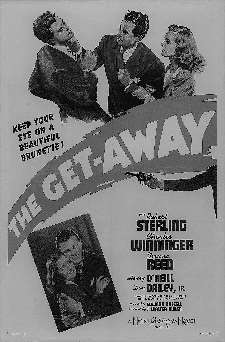 GET-AWAY, THE (1941)
GET-AWAY, THE (1941) (89 Min.) Genre: 1940 SUSPENSE, Transfer Quality: A
The Get-Away is a remake of 1935's Public Hero Number One, using generous amounts of stock footage from the earlier film. Robert Sterling, Donna Reed and Dan Dailey (billed as Dan Dailey Jr.) fill the roles originally played by Chester Morris, Jean Arthur and Joseph Calleia. In order to get the goods on mobster Sonny Black (Dailey), G-man Jeff Crane (Sterling) has himself thrown into prison, where Black is currently doing time on a lesser charge. The FBI's plan is to arrange a jailbreak for Crane and Black, then lie in wait as Black makes his way back to his old gang, the better to capture the whole bunch. Complicating this scheme is the fact that Crane has fallen in love with Black's sister Maria (Reed). In an attempt to update this 1935-vintage yarn, it is emphasized that Black's crimes include the robbing of US defense payrolls. — Hal Erickson
Starring: Robert Sterling, Donna Reed, Dan Dailey, Charles Winninger | Directed by: Edward N. Buzzell
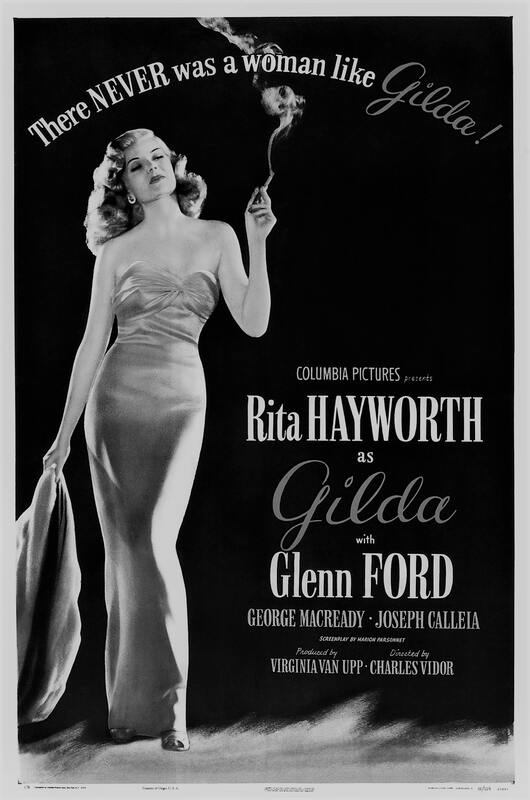 GILDA (1946)
GILDA (1946) (110 Min.) Genre: 1940 SUSPENSE, Transfer Quality: A
Columbia's lush and lavish film noir Gilda offers one of the strangest romantic triangles in any 1940s film. Played by Rita Hayworth in her considerable prime, Gilda is the sexy wife of mysterious, crippled casino owner George Macready. She is also the former love of gambler Glenn Ford, who takes a job as a croupier in Macready's Buenos Aires casino. Realizing that there is some sort of sexual tension between Hayworth and Ford, Macready goes out of his way to throw the two of them together by ordering Ford to act as Hayworth's bodyguard. One has the feeling throughout that Macready lusts after both Hayworth and Ford, all the while manipulating their downfall. In the film's most famous sequence, Hayworth defies both Ford and Macready by performing an overheated rendition of "Put the Blame on Mame" in front of the panting male casino customers. Ford continues to resists Hayworth's charms, but Macready, sensing that their affair has resumed, leaves in a fit of rage and is presumably killed in an airplane crash. Hayworth and Ford marry, but theirs in an abusive relationship due to Ford's inability to trust Hayworth and her supposed alley-cat behavior. At a crucial moment, Macready, who is not dead after all, returns to kill both Hayworth and Ford. But since Macready is not only a cuckold but a Nazi collaborator, it isn't hard to figure who's really going to end up sprawled on the floor. Perhaps a little too pretty and well-lit to totally succeed as melodrama, Gilda is nonetheless a superb showcase for Rita Hayworth—as well as a marvelous example of how a clever scriptwriter (Marion Parsonnet) could suggest all sorts of sexual aberrations while still remaining within the boundaries of the Production Code. — Hal Erickson
Starring: Rita Hayworth, Glenn Ford, George Macready, Joseph Calleia | Directed by: Charles Vidor
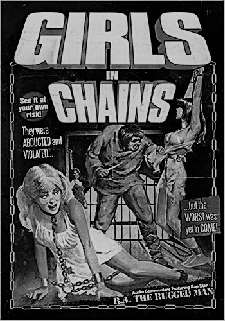 GIRLS IN CHAINS (1943)
GIRLS IN CHAINS (1943) (72 Min.) Genre: 1940 SUSPENSE, Transfer Quality: B
In this unique murder mystery, that reveals the killer at the beginning of the film. The story concerns some women living in a prison reformatory and centers around a vengeful teacher who works there. With the help of a detective, an inmate endeavors to get her corrupt brother-in-law arrested and put in jail. Her sister is a teacher who recently lost her job because of her marriage to the crook. The sister ends up taking a teaching job at the reformatory. It is there that she finally finds enough evidence (her spouse is also involved with some shady deals with the school superintendent) to put him away for good.
Starring: Arline Judge, Roger Clark, Robin Raymond, Barbara Pepper | Directed by: Edgar G. Ulmer
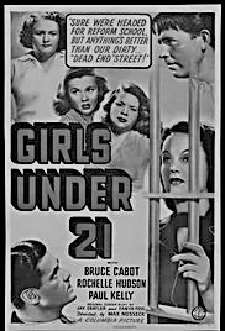 GIRLS UNDER 21 (1940)
GIRLS UNDER 21 (1940) (64 Min.) Genre: 1940 SUSPENSE, Transfer Quality: B
In this drama, six street-wise tough girls try to imitate the older sister of one who became a gangster's wife and lives a comfortable life. Unfortunately, because she married a crook, the young woman is sent to prison along with her man. When she is finally released, she gets hooked up with an ex-lover who sets her on the straight and narrow. The newly redeemed big sister attempts to help her little sister and her pals, but does not succeed until one of the gals is killed during a petty robbery at as department store.
Starring: Bruce Cabot, Rochelle Hudson, Paul Kelly, Tina Thayer | Directed by: Max Nosseck
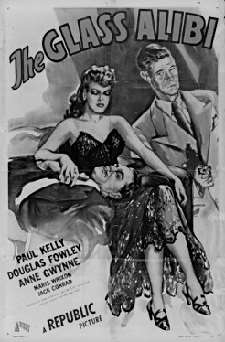 GLASS ALIBI, THE (1946)
GLASS ALIBI, THE (1946) (70 Min.) Genre: 1940 SUSPENSE, Transfer Quality: C
In this drama, a reporter marries a socialite with a bad ticker. The gold-digging reporter is well aware of her delicate condition, and he and his girlfriend conspire to kill her. He shoots her, but does not realize that she was dead from a heart attack before the bullet entered her body. He is later captured and convicted. The detective who caught him was well aware that the woman died of heart failure, but he decided to say nothing.
Starring: Paul Kelly, Douglas Fowley, Anne Gwynne, Maris Wrixon | Directed by: W. Lee Wilder
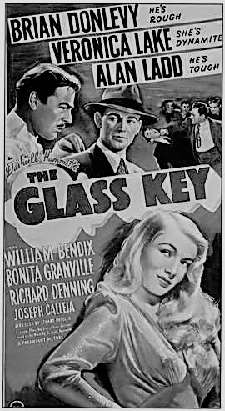 GLASS KEY, THE (1942)
GLASS KEY, THE (1942) (85 Min.) Genre: 1940 SUSPENSE, Transfer Quality: A
Dashiel Hammett's The Glass Key, a tale of big-city political corruption, was first filmed in 1935, with Edward Arnold as a duplicitous political boss and George Raft as his loyal lieutenant. This 1942 remake improves on the original, especially in replacing the stolid Raft with the charismatic Alan Ladd. Brian Donlevy essays the role of the boss, who is determined to back reform candidate Moroni Olsen, despite Ladd's gut feeling that this move is a mistake. Ladd knows that Donlevy is doing a political about-face merely to get in solid with Olsen's pretty daughter Veronica Lake. It is Ladd who is left to clean up the mess when crime lord Joseph Calleila murders Olsen's wastrel son Richard Denning and pins the rap on Donlevy. As Ladd struggles to clear Donlevy's name, he falls in love with Lake—when he's not being pummeled about by Calleila's psychopathic henchman William Bendix. Far less complex than the Dashiel Hammett original (and far less damning of the American political system), The Glass Key further increased the box-office pull of Paramount's new team of Alan Ladd and Veronica Lake. — Hal Erickson
Starring: Brian Donlevy, Alan Ladd, Veronica Lake, Joseph Calleia, William Bendix | Directed by: Stuart Heisler
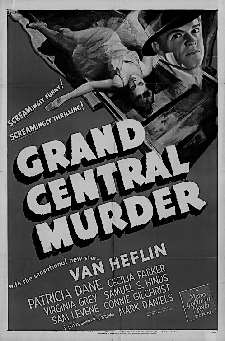 GRAND CENTRAL MURDER (1942)
GRAND CENTRAL MURDER (1942) (73 Min.) Genre: 1940 SUSPENSE, Transfer Quality: A
Grand Central Murder was intended as a followup to the MGM "sleeper" Kid Glove Killer, with the earlier film's star, Van Heflin, appearing in a similar role. When bitchy actress Mida King (Patricia Dane) is bumped off in a private train car at Grand Central Station, police inspector Gunther (Sam Levene) gathers together all likely suspects. One of these is wisecracking private eye Rocky Custer (Heflin), who endeavors to uncover the genuine murderer himself before Gunther slaps the cuffs on him. Custer's seemingly casual, off-the-cuff methods of detection prove infuriating to Gunther, but guess who solves the mystery-and a particularly baffling one at that—by fadeout time? The film received a mixed reviews from the New York critics, who enjoyed the mystery angle but found fault with Hollywood's convoluted concept of Grand Central Station's floor plan and its unbelievably close proximity to a fictional Broadway theatre (even so, these critics also applauded the ongoing illusion of trains arriving and leaving throughout the picture). — Hal Erickson
Starring: Van Heflin, Patricia Dane, Cecilia Parker, Virginia Grey | Directed by: S. Sylvan Simon
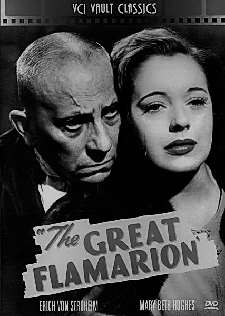 GREAT FLAMARION, THE (1945)
GREAT FLAMARION, THE (1945) (78 Min.) Genre: 1940 SUSPENSE, Transfer Quality: B
This ambitious independent production was packaged by producer W. Lee Wilder, brother of Billy Wilder, and distributed by Republic. The title character, played with relish (and a bit of mustard) by Erich Von Stroheim, is an arrogant vaudeville artiste specializing in a trick-gunshot act. A dyed-in-the-wool misogynist, Flamarion at first pays little attention to his beautiful assistant Connie (Mary Beth Hughes)-just as well, since Connie is already married to Flamarion's other assistant, Al Wallace (Dan Duryea). Bored with marriage, Connie begins playing up to her boss, the result being the "accidental" death of Al during Flamarion's act. Having committed murder for Connie's sake, Flamarion fully expects to be sexually compensated-but he doesn't know the treacherous Connie as well as the late Al did. Future cult favorite Anthony Mann's direction is rather perfunctory, suggesting perhaps that he was somewhat intimidated in the presence of the flamboyant Von Stroheim.
Starring: Erich Von Stroheim, Dan Duryea, Mary Beth Hughes, Stephen Barclay | Directed by: Anthony Mann
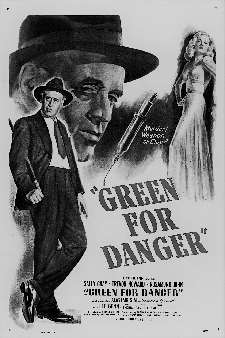 GREEN FOR DANGER (1947)
GREEN FOR DANGER (1947) (91 Min.) Genre: 1940 SUSPENSE, Transfer Quality: B
At the outset of this British murder mystery, a dispassionate narrator informs the audience that at least two of the characters seen onscreen will meet with sudden deaths. The story takes place in a rural British emergency hospital during the last years of WW2, when the "doodlebugs" (Nazi V-2 rockets) periodically interrupted the tranquility of the English countryside. When the local postman dies under anesthetic while undergoing a minor operation, six people are present, any one of whom could have murdered the patient. One of the nurses discovers that the man was indeed killed intentionally-just before she too is neatly dispatched by the mystery killer. Sent out from London to investigate is droll-but-businesslike Scotland Yard Inspector Cockrill (Alastair Sim, in one of his most memorable performances). He quickly ascertains that each of the five surviving witnesses had a motive for murder, and that it is likely that the killer will strike again if not immediately caught. After calmly prodding and probing about, Cockrill stages a phony operation, which the participants are led to believe is real. It is by this process that the murderer is revealed, leading to the now-classic denoument wherein a weary Cockrill submits his resignation from the Force-with the understanding that the resignation will be immediately destroyed upon receipt! Based on a novel by Christianna Brand, Green for Danger cried out for a subsequent series of Inspector Cockrill films, which alas never came to be. — Hal Erickson
Starring: Alastair Sim, Leo Genn, Trevor Howard, Sally Gray | Directed by: Sidney Gilliat
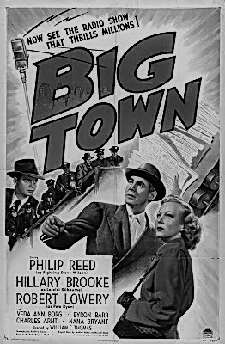 GUILTY ASSIGNMENT (1947)
GUILTY ASSIGNMENT (1947) (59 Min.) Genre: 1940 SUSPENSE, Transfer Quality: C
Big Town was the first of a series of Pine-Thomas productions inspired by the radio series of the same name—which in turn was spun off into a long-running TV series. Philip Reed stars as crusading newspaper editor Steve Wilson, while Hillary Brooke portrays Wilson's ever-loving, ever-efficient "Girl Friday" Lorelei Kilbourne. Vowing to rid his community of the stench of Yellow Journalism, Wilson assumes command of the Illustrated Daily Press, utilizing his tabloid as a bastion of truth and a weapon against big-city corruption. Crusading against a local crime ring, Wilson unfortunately goes "too far", and is nearly destroyed by lawsuits before he can redeem himself. To avoid confusion with the teleivision series, Big Town was retitled Guilty Assignment for its earliest TV showings.
Starring: Phillip Reed, Hillary Brooke, Robert Lowery, Veda Ann Borg | Directed by: William C. Thomas
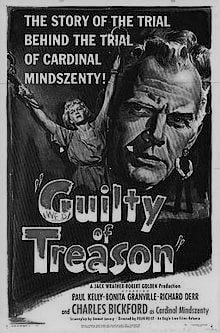 GUILTY OF TREASON (1949)
GUILTY OF TREASON (1949) (86 Min.) Genre: 1940 SUSPENSE, Transfer Quality: B
Made in the same atmosphere and paranoia that spawned the infamous Joseph McCarthy, this is an anti-communist propaganda movie looking more at the dark side of communism than at its subject matter--the life and times of Joszef Cardinal Mindszenty of Hungary. Mindszenty was imprisoned as an enemy of the State for his outspokenness and, during his trial, it was revealed that his confession was obtained by the use of torture, hypnosis and drugs.
Starring: Charles Bickford, Paul Kelly, Bonita Granville, Richard Derr, Roland Winters | Directed by: Felix E. Feist
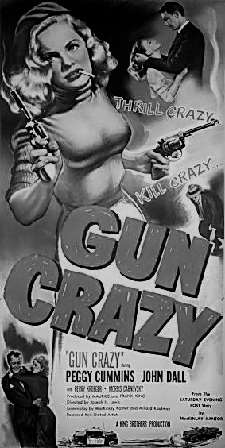 GUN CRAZY (1949)
GUN CRAZY (1949) (86 Min.) Genre: 1940 SUSPENSE, Transfer Quality: A
The definitive Joseph H. Lewis-directed melodrama, Gun Crazy is the "Bonnie and Clyde" story retooled for the disillusioned postwar generation. John Dall plays a timorous, emotionally disturbed World War II veteran who has had a lifelong fixation with guns. He meets a kindred spirit in carnival sharpshooter Peggy Cummins, who is equally disturbed — but a lot smarter, and hence a lot more dangerous. Beyond their physical attraction to one another, both Dall and Cummins are obsessed with firearms. They embark on a crime spree, with Cummins as the brains and Dall as the trigger man. As sociopathic a duo as are likely to be found in a 1940s film, Dall and Cummins are also perversely fascinating. As they dance their last dance before dying in a hail of police bullets, the audience is half hoping that somehow they'll escape the Inevitable. Some critics have complained that Dall is far too effeminate and Cummins too butch, but Joseph H. Lewis was never known to draw anything in less than broad strokes: recall the climax of Terror in a Texas Town, wherein Sterling Hayden participates in a western showdown armed with a whaler's harpoon. The best and most talked-about scene in Gun Crazy is the bank robbery sequence, shot in "real time" from the back seat of Dall and Cummins' getaway car. Originally slated for Monogram release, Gun Crazy enjoyed a wider exposure when its producers, the enterprising King Brothers, chose United Artists as the distributor. The film was based on a magazine article by MacKinlay Kantor; one of the scenarists was uncredited blacklistee Dalton Trumbo. — Hal Erickson
Starring: Peggy Cummins, John Dall, Berry Kroeger, Morris Carnovsky | Directed by: Joseph H. Lewis
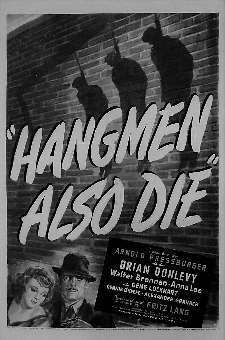 HANGMEN ALSO DIE (1943)
HANGMEN ALSO DIE (1943) (131 Min.) Genre: 1940 SUSPENSE, Transfer Quality: A
Hangmen Also Die is set in Czechoslovakia during the Nazi occupation. Czech loyalist Brian Donlevy assassinates the vicious Gestapo leader Heydrich, then goes into hiding. The wounded patriot is sheltered by history professor Walter Brennan, who is already under surveillance by the Nazis thanks to his veiled classroom attacks on the Third Reich. Fifth columnist Gene Lockhart arranges for the professor and 400 other Prague citizens to be rounded up as hostages, to be killed if Heydrich's assassin is not revealed. Ultimately Lockhart himself is framed by the citizenry, giving the actor full scope to cringe and cower as only he could. Persuasively directed by Fritz Lang, Hangmen Also Die was based on a story by Lang and expatriate German playwright Bertold Brecht. — Hal Erickson
Starring: Brian Donlevy, Walter Brennan, Dennis O'Keefe, Anna Lee, Gene Lockhart | Directed by: Fritz Lang
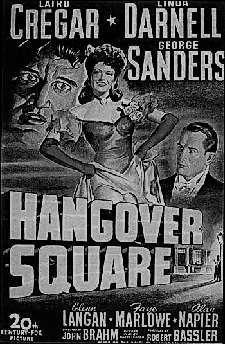 HANGOVER SQUARE (1945)
HANGOVER SQUARE (1945) (80 Min.) Genre: 1940 SUSPENSE, Transfer Quality: A
Set in turn-of-the century London, this period thriller stars Laird Cregar as George Harvey Bone, a composer who suffers from a rather severe case of artistic temperament. Driven to distraction by the discordant sounds of the city, the usually sensitive Bone occasionally snaps when exposed to undue stress, and the results can be deadly; he sometimes blacks out and commits murders that he can't quite recall the next morning. Working on a major concerto, Bone is at his wit's end, and when an antique dealer tries to cheat him, the salesman turns up dead. Dr. Allen Middleton (George Sanders), a psychologist with Scotland Yard, questions Bone about the crime; he claims to know nothing about it, but the perceptive doctor suggests that Bone needs to relax more. Taking Middleton's advice, Bone visits a music hall that evening and sees Netta London (Linda Darnell), a singer with whom Bone immediately becomes entranced. This makes the composer even less patient with his sweetheart Barbara Chapman (Faye Marlowe), whose father, the wealthy Sir Henry Chapman (Alan Napier), has commissioned Bone's latest work. When Barbara tells Bone that his concerto is not up to snuff, she only narrowly escapes with her life, and while Bone believes that he's found true love with the beautiful Netta, the singer finds herself in danger when Bone suspects her of infidelity. Hangover Square gave character actor Laird Cregar his first starring role. Sadly, it was also his last film; Cregar, who struggled with weight problems all his life, tipped the scales at nearly 300 pounds when he made this film. Eager for more starring roles, Cregar went on a dangerous crash diet, and while he soon lost 100 pounds, it put his health into serious disarray, and the actor died of a heart attack at the age of 28, shortly before the release of his first starring vehicle. — Mark Deming
Starring: Laird Cregar, Linda Darnell, George Sanders, Glenn Langan | Directed by: John Brahm
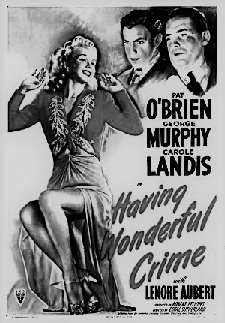 HAVING WONDERFUL CRIME (1945)
HAVING WONDERFUL CRIME (1945) (70 Min.) Genre: 1940 SUSPENSE, Transfer Quality: A
Having Wonderful Crime spotlights Michael J. Malone, the murder-solving attorney created by author Craig Rice. The film is also ostensibly based on a novel by Rice, though precious little of the original actually made it to the screen. The story begins as Malone (Pat O'Brien) brusquely informs his newlywed friends Jake and Helene Justus (George Murphy and Carole Landis) that he's not going to allow them to suck him into another murder mystery. Unfortunately for the attorney, Jake and Helene shortly afterward attend a stage magic show wherein the star magician (George Zucco) disappears for real! Their investigation leads to a resort hotel literally packed with murder suspects. When the newlyweds learn too much for their own good, it's up to Malone to come to the rescue and nab the killer. One of the suspects is played by an actress named Anje Berens, who as "Gloria Holden" previously starred in Dracula's Daughter (1936). — Hal Erickson
Starring: Pat O'Brien, George Murphy, Carole Landis, Lenore Aubert, George Zucco | Directed by: Edward Sutherland
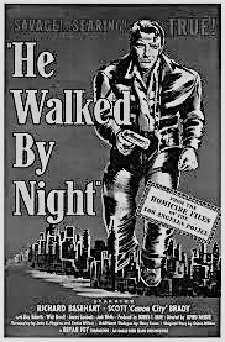 HE WALKED BY NIGHT (1948)
HE WALKED BY NIGHT (1948) (80 Min.) Genre: 1940 SUSPENSE, Transfer Quality: A
The "He" of the title is Richard Basehart, a clever but psychopathic burglar (based on real-life criminal Erwin Walker) Basehart stays one step ahead of the law by listening in to the police band on his radio. To avoid detection, he changes his M.O. on each crime, making it seem that the string of burglaries is the work of several thieves. But Basehart trips himself up when he kills a cop. His own personal Waterloo occurs in the Los Angeles sewer system—a stylish predecessor to the similar (and more widely praised) climax in Sir Carol Reed's The Third Man. Though the direction is credited to Hollywood old-timer Alfred Werker, most of He Walked By Night is the handiwork of an uncredited Anthony Mann. Featured in the film's cast is Jack Webb in the small role of a police lab technician. Impressed by first-hand experience with police procedure and by the semi-documentary quality of He Walked By Night Webb expanded on these elements for his own radio and TV project, Dragnet. — Hal Erickson
Starring: Richard Basehart, Scott Brady, Roy Roberts, Whit Bissell | Directed by: Alfred L. Werker
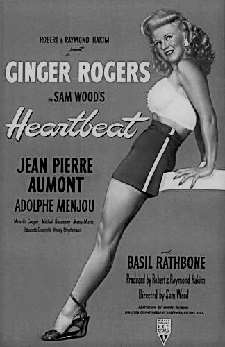 HEARTBEAT (1946)
HEARTBEAT (1946) (100 Min.) Genre: 1940 SUSPENSE, Transfer Quality: B
A remake of the 1939 French film Battement de Couer, Heartbeat reunites star Ginger Rogers with her Kitty Foyle director Sam Wood. Ms. Rogers plays Arlette, a reform school alumnus who is recruited by Faginlike Professor Aristide, headmaster at a school for pickpockets. Before long, Arlette becomes Aristide's prize pupil, and is being groomed for bigger things. Assigned by a corrupt foreign ambassador (Adolphe Menjou) to steal a valuable watch from wealthy and handsome diplomat Pierre (Jean Pierre Aumont), Arlette not only bungles the job, but also falls in love with her would-be victim. Heartbeat wasn't the first mediocre American remake of a French film, and it certainly wouldn't be the last.
Starring: Ginger Rogers, Jean-Pierre Aumont, Adolphe Menjou, Basil Rathbone, Eduardo Ciannelli | Directed by: Sam Wood
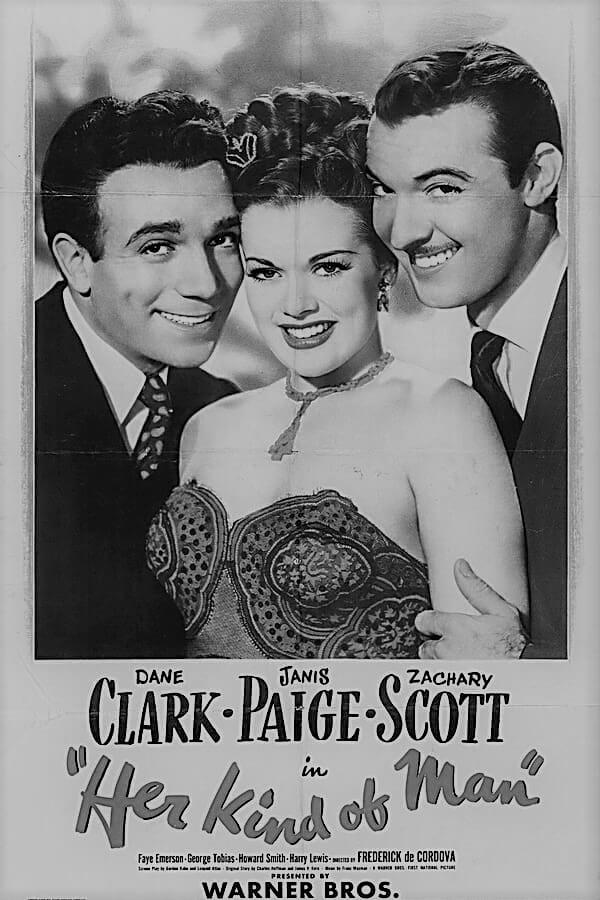 HER KIND OF MAN (1946)
HER KIND OF MAN (1946) (78 Min.) Genre: 1940 SUSPENSE, Transfer Quality: A
This Warner Bros. programmer stars Dane Clark as Prohibition-era columnist Don Corwin and Janis Paige as speakeasy singer Georgia King. Corwin is in love with Georgia, but she has promised herself to disreputable gambler/gangster Steve Maddux (Zachary Scott). With the repeal of Prohibition, Maddux's high-rolling days come to an abrupt end, leaving poor Georgia high and dry. But through it all, Corwin has remained faithful and true-blue. The film scores on a nostalgic level, with its colorful recreation of the Roaring 20s and its denizens. Otherwise, Her Kind of Man is rather tame stuff, with the stars looking somewhat ill at ease with their roles.
Starring: Dane Clark, Janis Paige, Zachary Scott, Faye Emerson, George Tobias, Sheldon Leonard | Directed by: Frederick de Cordova
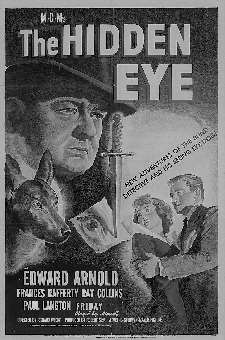 HIDDEN EYE, THE (1945)
HIDDEN EYE, THE (1945) (69 Min.) Genre: 1940 SUSPENSE, Transfer Quality: A
The Hidden Eye was the second of two MGM films featuring mystery writer Baynard Kendrick's blind detective Duncan McLain. As in Eyes of the Night, sightless sleuth McLain is played by Edward Arnold. This time, our hero tackles a series of murders apparently tied in with an ancient oriental cult. The one clue to the killer's identity is the scent of a rare Oriental perfume. Refusing to jump to conclusions, McLain, accompanied by his faithful seeing-eye dog Friday, meticulously follows the trail of evidence to the Least Likely Suspect. The finale finds the judo-trained McLain taking on his evil adversary; though it's obvious that stunt doubles are used, it's an exciting sequence all the same. — Hal Erickson
Starring: Edward Arnold, Frances Rafferty, Ray Collins, Paul Langton | Directed by: Richard Whorf
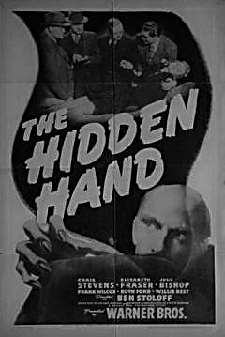 HIDDEN HAND, THE (1942)
HIDDEN HAND, THE (1942) (67 Min.) Genre: 1940 SUSPENSE, Transfer Quality: A
Everybody seems to have had a good time making the overripe melodrama The Hidden Hand, especially cadaverous Milton Parsons as insane-asylum escapee John Channing. In her efforts to protect her brother from the authorities, John's sister Lorinda (Cecil Cunningham) opens the door for a series of grisly murders. Hero Peter Thorne (Craig Stevens) and heroine Mary Winfield (Elizabeth Fraser) try to stop John before he overracts-er, kills-again. Absolutely impossible to take seriously, The Hidden Hand is nonetheless worth a glance, if for no other reason than to see perennial bit player Parsons in a juicy leading role. The film was based on Invitation to a Murder, a play by Rufus King.
Starring: Craig Stevens, Elisabeth Fraser, Julie Bishop, Willie Best, Milton Parsons | Directed by: Benjamin Stoloff
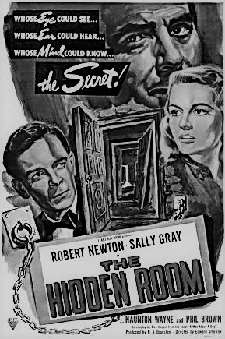 HIDDEN ROOM, THE (1949)
HIDDEN ROOM, THE (1949) (98 Min.) Genre: 1940 SUSPENSE, Transfer Quality: B
Blacklisted in Hollywood, director Edward Dmytryk managed to find work in England. Dmytryk's Obsession is based on Alec Coppel's suspense play A Man About a Dog. Robert Newton stars as Dr. Clive Riordan, the insanely jealous husband of unfaithful Storm Riordan (Sally Gray). Aware that Storm is having a torrid affair with an American named Bill Kronin (Phil Brown), Riordan kidnaps the man and chains him up in a deserted building, intending to kill him with an acid bath. The wife's dog, however, turns up at the last minute and spoils his plot. Obsession was released in the U.S. as The Hidden Room.
Starring: Robert Newton, Sally Gray, Naunton Wayne, Phil Brown | Directed by: Edward Dmytryk
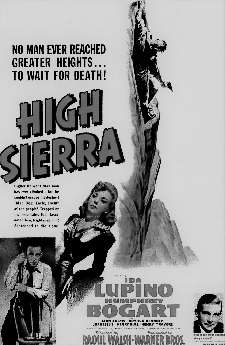 HIGH SIERRA (1941)
HIGH SIERRA (1941) (96 Min.) Genre: 1940 SUSPENSE, Transfer Quality: A
In a manner of speaking, Humphrey Bogart had George Raft to thank for his ascendancy to stardom: after all, if Raft hadn't turned down both High Sierra and The Maltese Falcon, Bogart might have continued playing second-billed gangsters to the end of his days. Adapted from W. R. Burnett's novel by Burnett and John Huston, High Sierra opens with gangster Roy Earle (Bogart) being paroled after a lengthy prison term. Though he enjoys the fresh air and sunshine of the outside world, Earle has no intention of giving up his criminal ways. In fact, his parole has been arranged by Big Mac (Donald MacBride), so that Earle can mastermind a big-time heist at a fancy California resort hotel. After a few unkind words with a crooked cop, Kranmer (Barton MacLane), in Big Mac's employ, Earle heads toward a fishing resort, where he is to commiserate with his inexperienced, hot-headed cohorts Babe (Alan Curtis) and Red (Arthur Kennedy). En route, he befriends a farm family, heading to LA in search of work. He falls in love with the family's club-footed daughter Velma (Joan Leslie)--though she never really gives him any encouragement--and makes a silent promise to finance an operation on her foot once he's gotten his share of the loot. At the mountain cabin rendezvous, Earle meets Marie (Ida Lupino), Babe's tough-but-vulnerable girlfriend. He angrily orders her to scram, but she stubbornly remains. Earle also finds himself the owner of a "jinxed" dog, whose previous masters have all met with early demises (a none-too-subtle foretaste of things to come). Marie is strongly attracted to Earle, but he refuses to have anything to do with her, reserving his affections for Velma. He arranges an operation for the girl with mob doctor Banton (Henry Hull), never suspecting that the self-serving Velma is planning all along to marry someone else. The robbery goes off without a hitch, save for the fact that "inside man" Mendoza (Cornel Wilde) panics and nearly gives the game away. While escaping, Babe and Red are killed in a car accident, but Earle and Marie escape. Having been disillusioned by Velma's indifference and by the fact that the untrustworthy Kranmer has taken over the late Big Mac's operation, Earle at last realizes that the only person he can truly depend upon is the faithful Marie. With the police hot on his trail, Earle tells Marie to look after herself, then heads alone into the High Sierras--where, in Greek Tragedy fashion, he "busts out" of life. As in Petrified Forest, Humphrey Bogart plays a burnt-out anachronism from an earlier era in crime in High Sierra; in the latter film, however, Bogart has an innate nobility that allows the audience to empathize with him throughout. It is nothing short of amazing that, despite his superb performance in this 1940 film, he still had to wait until The Maltese Falcon for top billing in an "A picture." High Sierra was remade in 1949 as Colorado Territory and in 1955 as I Died a Thousand Times.
Starring: Humphrey Bogart, Ida Lupino, Arthur Kennedy, Joan Leslie, Alan Curtis, Barton MacLane | Directed by: Raoul Walsh
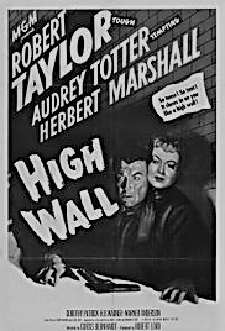 HIGH WALL, THE (1947)
HIGH WALL, THE (1947) (99 Min.) Genre: 1940 SUSPENSE, Transfer Quality: A
Former army pilot Robert Taylor is accused, on the basis of strong circumstantial evidence, of his wife's murder. Suffering from periodic blackouts, Taylor isn't so certain of his innocence himself. When offered a brain operation, Taylor refuses, knowing that if he is proven sane he will be executed for murder. Instead, he opts for confinement in a high-walled veteran's mental institution. A compassionate lady doctor (Audrey Totter) falls in love with Taylor, convincing him to have the operation. Even after emerging from the ether, Taylor cannot remember any of the details concerning his wife's death—but he does recall that the dead woman had recently taken a job with a publisher (Herbert Marshall) of religious books. While the killer's identity is tipped off by this revelation, the audience is never certain that Robert Taylor isn't a murderer—especially since he'd previously appeared as a homicidal maniac in the 1946 film Undercurrent. The best moment in High Wall is the casual disposal of the sole witness to the murder, via a long, dark elevator shaft. — Hal Erickson
Starring: Robert Taylor, Audrey Totter, Herbert Marshall, H.B. Warner | Directed by: Curtis Bernhardt
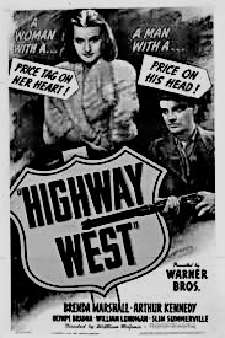 HIGHWAY WEST (1941)
HIGHWAY WEST (1941) (62 Min.) Genre: 1940 SUSPENSE, Transfer Quality: B
In this crime drama, a remake of Heat Lightning(1931), a robber kills a bank teller during a robbery and then takes his wife, who believes he is a traveling businessman, on the road with him as he flees. He is eventually captured and sentenced. Meanwhile his wife returns to running a motel and gas station with her sister. Her drab daily existence changes dramatically when her husband escapes from prison three years later and forces her to protect him. In the end, he is finally captured by the dogged cop who has been pursuing him.
Starring: Brenda Marshall, Arthur Kennedy, Olympe Bradna, William Lundigan | Directed by: William McGann
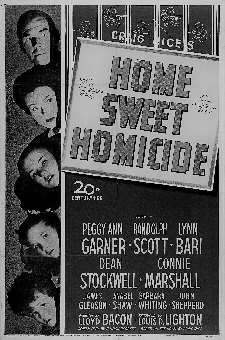 HOME SWEET HOMICIDE (1946)
HOME SWEET HOMICIDE (1946) (90 Min.) Genre: 1940 SUSPENSE, Transfer Quality: B
Based on a novel by Craig Rice, Home Sweet Homicide is a delightful blend of domestic comedy and murder mystery. Peggy Ann Garner, Dean Stockwell and Connie Marshall play Dinah, Archie and April Carstairs, the precocious offspring of widowed mystery writer Marian Carstairs (Lynn Bari). When a real-life murder occurs, the kids join forces to solve the crime over their mother's objections. It isn't that Dinah, Archie and April are all that interested in serving the cause of justice: it's simply that they want to play matchmaker for Marian and handsome homicide lieutenant Bill Smith (Randolph Scott). The revelation of the killer will come as no surprise to dyed-in-the-wool mystery movie fans, but this shouldn't spoil the fun. Incidentally, the actor billed as "John Shepard" is actually Shepperd Strudwick.
Starring: Peggy Ann Garner, Randolph Scott, Lynn Bari, Dean Stockwell | Directed by: Lloyd Bacon
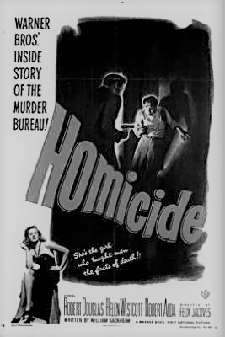 HOMICIDE (1949)
HOMICIDE (1949) (77 Min.) Genre: 1940 SUSPENSE, Transfer Quality: A
British actor Robert Douglas stars in the Warner Bros. crime melodrama Homicide. Douglas plays police lieutenant Michael Landers, whose suspicions are aroused when the only witness to an accidental killing is found dead, an apparent suicide. Though the case is officially closed, Landers investigates in his off-hours. He soon uncovers evidence of an illegal wire-service gang, operated by an outwardly affable fellow named Andy (Robert Alda). Landers finds an unexpected ally in the shapely form of cigarette girl Jo Ann Rice (Helen Westcott). Old-timer Monte Blue has a juicy supporting role as a desert sheriff. Writer William Sackheim based his Homicide screenplay on his own story "Night Beat." — Hal Erickson
Starring: Robert Douglas, Helen Westcott, Robert Alda, Monte Blue | Directed by: Felix Jacoves
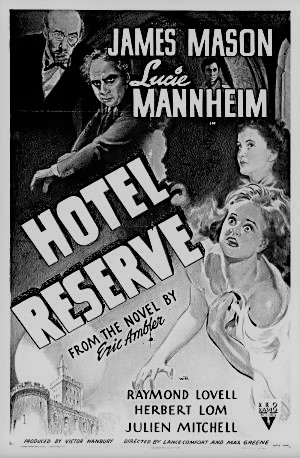 HOTEL RESERVE (1944)
HOTEL RESERVE (1944) (79 Min.) Genre: 1940 SUSPENSE, Transfer Quality: A
Based on the Eric Ambler novel entitled "Epitaph for a Spy," this is the story of a medical student on the Riviera during the Summer before WWII begins. A refugee from Austria, he has been photographing wildlife. When the film he develops contains secret installations, he must prove that he is not a German spy or be deported. With the police and help from a romantic interest that pops up along the way, he has to try to flush out the real spy to clear himself. Critical reviews were mixed, though Mason did an admirable job on his character. — Tana Hobart
Starring: James Mason, Max Greene, Victor Hanburry, Herbert Lom | Directed by: Lance Comfort
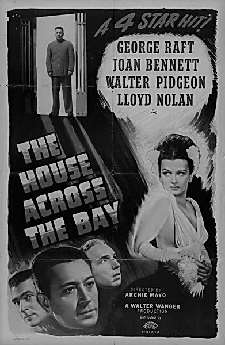 HOUSE ACROSS THE BAY, THE (1940)
HOUSE ACROSS THE BAY, THE (1940) (88 Min.) Genre: 1940 SUSPENSE, Transfer Quality: C
Producer Walter Wanger's House Across the Bay serves as an excellent showcase for Wanger's then-wife Joan Bennett. She is cast as nightclub singer Brenda Bentley, the wife of high-rolling gambler Steve Lawrett (George Raft). When Steve is railroaded into Alcatraz by duplicitous attorney Slant Kolma (Lloyd Nolan), Brenda promises to remain faithful to her husband during his incarceration, even going so far as to purchase an apartment "across the bay" from the island prison so that she can be near him. But while Steve is serving his time, he discovers that Brenda has succumbed to the charms (and innate decency) of handsome Tim Nolan (Walter Pidgeon). Enraged, Steve vows to kill Nolan, staging a daring escape attempt to realize his goal. But will Steve be able to get off "the rock" in one piece, succeeding where so many others have failed? — Hal Erickson
Starring: George Raft, Joan Bennett, Lloyd Nolan, Gladys George | Directed by: Archie Mayo
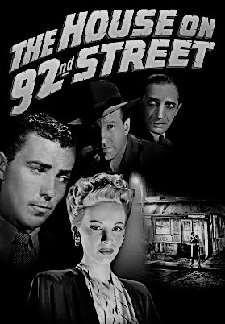 HOUSE ON 92ND STREET, THE (1945)
HOUSE ON 92ND STREET, THE (1945) (88 Min.) Genre: 1940 SUSPENSE, Transfer Quality: A
Filmed in semi-documentary fashion, House on 92nd Street is a "now it can be told" drama about the smashing of a Nazi spy ring operating the U.S. Thanks to covert surveillance, the FBI learns of the presence of several suspicious persons in NYC. William Eythe is a German-American college student approached by the spies to become a secret Nazi operative. Eythe instead heads directly to FBI chief Lloyd Nolan and offers his services as a double agent. His mission is to locate the head of the spy ring, an unseen figure known only as Mr. Christopher, and to that end Eythe infiltrates the ring, headquarted in a town house on 92nd street. Among the conspirators are an erudite German colonel (Leo G. Carroll) and the beautiful female owner of the house (Signe Hasso). Part of the plot involves the smuggling to Germany of America's atomic secrets by a weak-willed document clerk (played by Gene Lockhart, one of the best "cringers" in the business). Dwelling a bit too long on the meticulous research techniques of the FBI, House on 92nd Street picks up momentum in the final sequence, wherein "Mr. Christopher" is revealed and double agent Eythe barely escapes with his skin intact. — Hal Erickson
Starring: William Eythe, Lloyd Nolan, Signe Hasso, Gene Lockhart | Directed by: Henry Hathaway
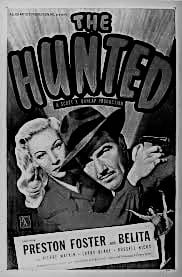 HUNTED, THE (1948)
HUNTED, THE (1948) (67 Min.) Genre: 1940 SUSPENSE, Transfer Quality: A
In this detective story, a private eye must send his fiancee to prison as he truly believes that she was involved in a bank robbery. Unfortunately, she is innocent. Still she serves her time. Upon her release someone frames her for murder. The detective is in quite a quandary until the real criminal is found. The woman finally returns to her beloved private eye.
Starring: Preston S. Foster, Belita, Pierre Watkin, Charles McGraw | Directed by: Jack Bernhard
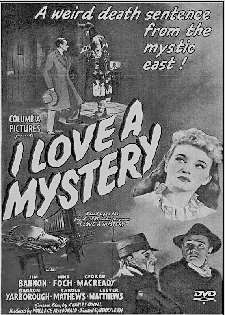 I LOVE A MYSTERY (1945)
I LOVE A MYSTERY (1945) (70 Min.) Genre: 1940 SUSPENSE, Transfer Quality: C
Based on Phillips Lord's popular radio serial, I Love a Mystery centers around the exploits of two pugnacious private eyes (marked down from the radio version's three heroes). The adventuresome Jack Packard (Jack Bannon) and Doc Long (Barton Yarborough) are hired by a nervous socialite (George Macready), who lives in mortal fear of being decapitated. The man has been the recipient of strange, cryptic messages from an Oriental secret society, which predict his impending doom. The brains behind the society is the man's duplicitous wife (Nina Foch), who hopes to goad her husband into suicide and thus fall heir to his millions. A grisly little item, I Love a Mystery was the first of three Columbia "B" pictures inspired by the radio original. — Hal Erickson
Starring: Nina Foch, Jim Bannon, George Macready, Barton Yarborough | Directed by: Henry Levin
(94 Min.) Genre: 1940 SUSPENSE, Transfer Quality: B
Private detective Franchot Tone is hired by a prominent politician (Tom Powers) to run a background check on the politician's wife (Lynn Merrick). Meanwhile, another client (Janet Blair) engages Tone to locate her missing sister-in-law. The two assignments merge into one before long, and Tone is up to his ears in the trouble he claims to love in the film's title. Like most movie private eyes, Tone attracts women like a magnet: In addition to the aforementioned Lynn Merrick and Janet Blair, the cast includes Glenda Farrell (as the p.i.'s faithful secretary), Janis Carter and Adele Jergens. I Love Trouble was based on The Double Take, a novel by Roy Higgins.
Starring: Franchot Tone, Janet Blair, Janis Carter, Adele Jergens, Glenda Farrell | Directed by: S. Sylvan Simon
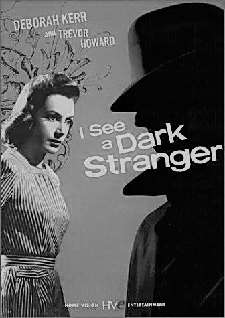 I SEE A DARK STRANGER (1946)
I SEE A DARK STRANGER (1946) (112 Min.) Genre: 1940 SUSPENSE, Transfer Quality: B
I See a Dark Stranger manages to be both an absorbing espionage yarn and a slyly amusing send-up of the entire genre. Deborah Kerr is terrific as Irish colleen Bridie Quilty, raised from childhood to despise the British and everything they stand for. Bridie's anglophobia proves useful to Nazi spy Miller (Raymond Huntley), who hopes to use the girl to help him steal the plans for the D-day invasion. Playing her "Mata Hari" role to the hilt, Bridie wholeheartedly throws herself into a world of clandestine meetings and coded messages, certain that by helping the Germans she is also helping Mother Ireland. Eventually she realizes the error of her ways, enabling her to turn the tables on Miller and his co-conspirators. Trevor Howard co-stars as David Baynes, with whom the impulsive Bridie falls in love despite his English forebears. I See a Dark Stranger was released in the U.S. as The Adventuress.
Starring: Deborah Kerr, Trevor Howard, Raymond Huntley, Garry Marsh, Tom Macauley | Directed by: Frank Launder
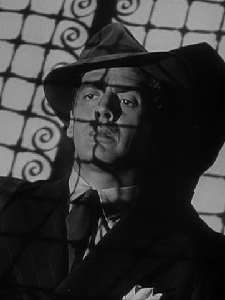 I WAKE UP SCREAMING (1941)
I WAKE UP SCREAMING (1941) (82 Min.) Genre: 1940 SUSPENSE, Transfer Quality: A
Well-known New York sports promoter Frankie Christopher (Victor Mature) is the prime suspect in the murder of Vicky Lynn (Carole Landis), a successful model and would-be actress. Questioned relentlessly by the police, and particularly by hulking detective squad commander Ed Cornell (Laird Cregar), he maintains his innocence. Meanwhile, Vicky's sister Jill (Betty Grable) is also being questioned. Their answers, given in adjoining interrogation rooms, become the basis for brief, neatly constructed interlocking flashbacks at the opening of the movie that explain a ton of plot in very little time. Both are released after admitting nothing, and the police begin working on other suspects, including journalist Larry Evans (Allyn Joslyn), aging actor Robin Ray (Alan Mowbray), and hotel clerk William Harrison (Elisha Cook Jr.) Jill had little use for Frankie, the man who had been promoting her sister's career, but the two are drawn together in the course of trying to sort out their lives and the murder of her sister, and her realization that Frankie is capable of truly loving a woman, and not just exploiting her. Meanwhile, Cornell makes it his business to pressure and torment Frankie, illegally entering his apartment and promising him an arrest and a death sentence. Eventually, the noose seems to tighten around Frankie as the circumstantial evidence piles up, until Frankie, trying to clear himself, uncovers a clue leading back to the real killer — who was known to Cornell all along. Confronting the detective in his apartment, Frankie discovers a veritable shrine to Vicky — copies of her magazine covers and photos filling the walls of his apartment — and learns that the man had his own dark reasons for wanting to kill him. His psychosis finally catching up with him, his career and reputation in ruins, Cornell reveals the truth to Frankie as he proceeds to take his own life. — Bruce Eder
Starring: Betty Grable, Victor Mature, Carole Landis, Laird Cregar, Elisha Cook, Jr | Directed by: H. Bruce Humberstone
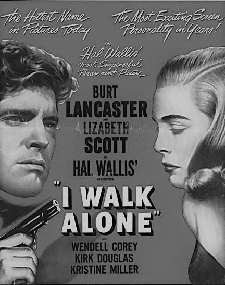 I WALK ALONE (1948)
I WALK ALONE (1948) (98 Min.) Genre: 1940 SUSPENSE, Transfer Quality: B
On the run from the cops, bootleggers Frankie Madison (Burt Lancaster) and Noll Turner (Kirk Douglas), find themselves racing up to an enormous roadblock. The two split up, agreeing that if one was caught, the other would operate their nightclub and save half the profits for his partner. The unlucky Madison is caught and when released from prison 14 years later, he returns to claim his money. Turner, never intending to split the money, tries to distract Madison by offering him the affections of his girlfriend Kay (Lizabeth Scott). Madison's brother Dave (Wendell Corey), Turner's accountant, help's Turner by doctoring the books to hide the lucrative profits of the club. Madison is enraged that he has been swindled by his friend and his brother, and Dave finally helps Madison get his revenge and Kay's love. Byron Haskin, in his directorial debut, brings a post-war idealism into the ordinarily cynical noir sensibility. Wendell Corey is particularly fine as Madison's cowardly brother, who manages to redeem himself, and Lizabeth Scott is touching as the vulnerable, romantic Kay.
Starring: Burt Lancaster, Lizabeth Scott, Kirk Douglas, Wendell Corey | Directed by: Byron Haskin
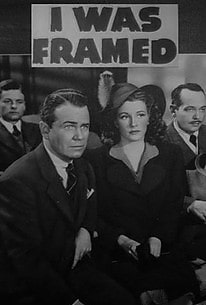 I WAS FRAMED (1942)
I WAS FRAMED (1942) (61 Min.) Genre: 1940 SUSPENSE, Transfer Quality: B
I Was Framed was a heavily disguised remake of Dust Be My Destiny, filmed only three years earlier. Michael Ames stars in the old John Garfield role, originally a drifter named Joe Bell but here a crusading reporter named Ken Marshall. Framed by a corrupt politician for a crime he dind't commit, Marshall escapes from jail with the help of his pregnant wife Ruth (Julie Bishop). They migrate to a small town where Ken is given a newpaper job by Dr. Phillip Black (Aldrich Bowker), the kindly general practitioner who delivered Ruth's baby. Five years later, the Marshalls' new life is threatened when Mike's old cellmate shows up in town, threatening blackmail. The ending is considerably more upbeat and less "meaningful" than in the original Dust be My Destiny.
Starring: Michael Ames, Julie Bishop, Regis Toomey, John Harmon | Directed by: David Ross Lederman
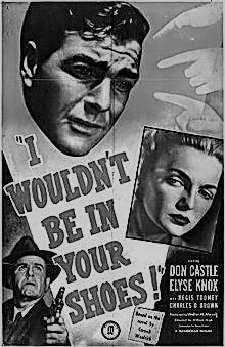 I WOULDN'T BE IN YOUR SHOES (1948)
I WOULDN'T BE IN YOUR SHOES (1948) (70 Min.) Genre: 1940 SUSPENSE, Transfer Quality: B
A Cornell Woolrich novel was the source for the variable Monogram melodrama I Wouldn't Be in Your Shoes. The plot refers to the dancing shoes of young terpsichorean Tom (Don Castle). A print from one of those shoes is found at the scene of a murder, and the police don't buy Tom's story that his footwear was stolen. The only person who believes in Tom's innocence is his wife and dancing partner Ann (Elyse Knox), and it is she who follows the trail of clues to the genuine killer. Without revealing the ending, it can be noted here that the actual miscreant has remained in very close proximity of both Tom and Ann all along — and has been encouraged to do so by the police!
Starring: Jimmy Aubrey, Stanley Blystone, Walden Boyle, Charles D. Brown | Directed by: William Nigh
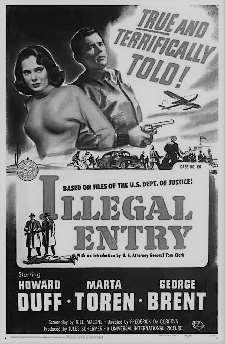 ILLEGAL ENTRY (1949)
ILLEGAL ENTRY (1949) (84 Min.) Genre: 1940 SUSPENSE, Transfer Quality: B
Long before he became producer/director of The Tonight Show, Fred DeCordova helmed the Universal meller Illegal Entry. Howard Duff, who later worked with DeCordova on the TV series Mr. Adams and Eve, stars as Bert Powers, an undercover agent for the U.S. Department of Immigration. While attempting to bring a vicious gang of alien smugglers to justice, Powers falls in love with Anna Duvak (Marta Toren), a gang member who is Not What She Seems. The film leaves no cliché unturned, not even the familiar scene wherein the airborne smugglers dispose of their human cargo by way of a handy lever which causes the bottom of the plane's passenger section to drop out. Illegal Entry is staged in semi-documentary fashion, maintaining the then-prevalent tradition of such popular films as House on 92nd Street and Call Northside 777.
Starring: Howard Duff, Märta Torén, George Brent, Tom Tully | Directed by: Frederick de Cordova
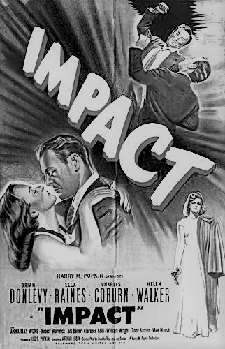 IMPACT (1949)
IMPACT (1949) (111 Min.) Genre: 1940 SUSPENSE, Transfer Quality: B
Though he doesn't know it at first, industrialist Walter Williams (Brian Donlevy) shouldn't trust his wife Irene (Helen Walker) any farther than he can throw her. Irene schemes with her lover Jim Torrance (Tony Barrett) to kill Walter in an "accidental" car crash. The plan fails, and it is Jim who is killed. When it develops that he is assumed to have also died in the accident, Walter changes his name and heads to a small town where no one knows him. Here he starts life all over again as a humble garage mechanic, falling in love with his boss Marsha Peters (Ella Raines) in the process. Disaster looms when detective Quincy (Charles Coburn) comes sniffing around; it seems that Lt. Quincy suspects the incognito Williams of murdering Torrance. To reveal any more would be giving the game away. Impact co-stars longtime favorite Anna May Wong, making her first screen appearance since 1942. — Hal Erickson
Starring: Brian Donlevy, Ella Raines, Charles Coburn, Helen Walker, Anna May Wong | Directed by: Arthur Lubin
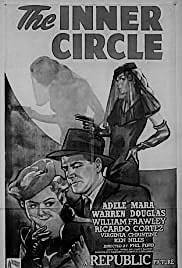 INNER CIRCLE, THE (1946)
INNER CIRCLE, THE (1946) (57 Min.) Genre: 1940 SUSPENSE, Transfer Quality: B
In this mystery, a private detective is falsely accused of murder by his secretary. The woman wants to protect her little sister, who has been formally charged with the crime. In an attempt to solve the crime, the detective gathers the suspects at a radio station and reenacts the murder.
Starring: Adele Mara, Warren Douglas, William Frawley, Ricardo Cortez | Directed by: Philip Ford
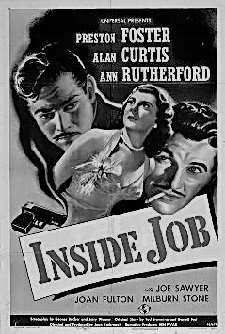 INSIDE JOB (1946)
INSIDE JOB (1946) (65 Min.) Genre: 1940 SUSPENSE, Transfer Quality: B
In this crime drama, two ex-hoods find their attempts to straighten up and fly right are foiled by a blackmailing gangster who threatens to expose their past who forces them to rob the department store they work at. Outwardly, the crooks go along with the scam, but they have also devised a scam of their own. In the end, the extortionist is killed by a cop and the two reluctant robbers turn themselves in.
Starring: Preston S. Foster, Alan Curtis, Ann Rutherford, Joe Sawyer | Directed by: Jean Yarbrough
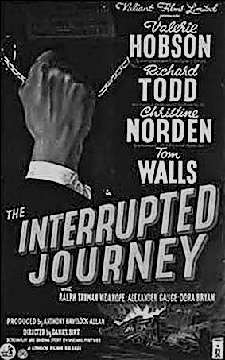 INTERRUPTED JOURNEY (1949)
INTERRUPTED JOURNEY (1949) (80 Min.) Genre: 1940 SUSPENSE, Transfer Quality: B
Intending to run off with the wife (Christine Norden) of his publisher (Alexander Gauge), novelist John North (Richard Todd) thinks the better of it as he sits in the compartment of a speeding train. North's journey is interrupted (hence the title) by a train crash, in which his lover is killed. Sifting through the wreckage, railroad inspector Clayton (Tom Walls) discovers that the dead woman didn't perish in the crash: someone shot her in the back! That's all the information that can be revealed without giving away the ending. Top billed in Interrupted Journey as Richard Todd's patient, supportive wife is Valerie Hobson, whose patience and support would be sorely tested in real life when she stood by her husband John Profumo during the British Parliament sex scandals of the early 1960s.
Starring: Valerie Hobson, Richard Todd, Christine Norden, Tom Walls, Alexander Gauge, Vida Hope | Directed by: Daniel Birt
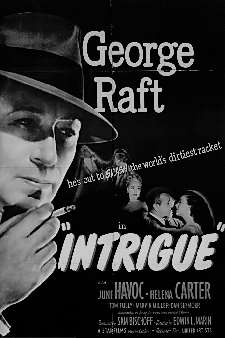 INTRIGUE (1947)
INTRIGUE (1947) (90 Min.) Genre: 1940 SUSPENSE, Transfer Quality: C
George Raft once again plays the outcast of society who comes through in the end in Intrigue. Dishonorably discharged from the Army Air Corps, Brad Dunham (Raft) disconsolately decides to try his luck with Shanghai's postwar black market. Teaming with the treacherous Tamara Baranoff (June Havoc), Dunham prospers in his newly-found illicit profession, much to the dismay of his best friend, reporter Mark Andrews (Tom Tully). When Tamara has the troublesome Andrews murdered, Dunham realizes the folly of his behavior and works overtime to squash the black market for good and all. Meanwhile, social worker Linda Parker (Helena Carter), who realizes that Dunham's a good guy underneath and hopes against hope that he'll eventually realize it.
Starring: George Raft, June Havoc, Helena Carter, Tom Tully | Directed by: Edwin L. Marin
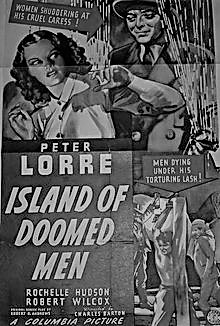 ISLAND OF DOOMED MEN (1940)
ISLAND OF DOOMED MEN (1940) (67 Min.) Genre: 1940 SUSPENSE, Transfer Quality: B
Following in the footsteps of Boris Karloff and Charles Laughton, Peter Lorre turns sadist in this routinely made but efficient little potboiler from Columbia Pictures. Lording over Dead Man's Island where he uses paroled convicts as slaves, Stephen Danel frames G-Man Mark Sheldon (Robert Wilcox) for murdering a colleague and then arranges for the convict's transfer to the island. Mark immediately becomes attracted to Danel's glamorous wife, Lorraine (Rochelle Hudson), beautifully gowned and bejeweled but like the slaves, a caged bird susceptible to her husband's rages. With the assistance of Cort (Charles B. Middleton), the two attempt to escape, but are eventually caught by Danel's spy, Brand (Don Beddoe). Happily, when all seems lost, the sadistic Stephen is killed by one of his own men, the disgruntled Siggie (George E. Stone). Although most of Island of Doomed Men was produced on sound stages, some scenes were filmed at famous Bronson Canyon in Los Angeles' Griffith Park.
Starring: Peter Lorre, Rochelle Hudson, Robert Wilcox, George E. Stone | Directed by: Charles Barton
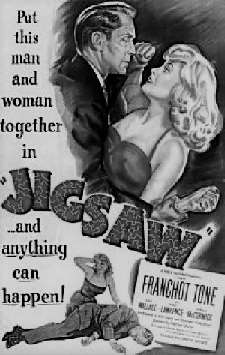 JIGSAW (1949)
JIGSAW (1949) (70 Min.) Genre: 1940 SUSPENSE, Transfer Quality: B
Made on a miniscule budget primarily financed by its star Franchot Tone, Jigsaw is a strange little crime film. Howard Malloy (Tone), a crusading New York assistant district attorney, is dedicated to exposing a group of supposedly patriotic Americans who have murdered his friend after he discovered that they were truly a fascist "hate group." The group sends Barbara, (Jean Wallace) to seduce and compromise Malloy. Barbara regrets her actions and is murdered as she attempts to confess to Malloy. Malloy now is determined to expose the group. All the loose ends are tied up in the climax, which takes place in a modern art museum. Jigsaw is a competent, uninspired crime drama peppered with cameo appearances by top Hollywood stars including Marlene Dietrich, Henry Fonda, Burgess Meredith and John Garfield.
Starring: Franchot Tone, Jean Wallace, Myron McCormick, Marc Lawrence, Henry Fonda | Directed by: Fletcher Markle
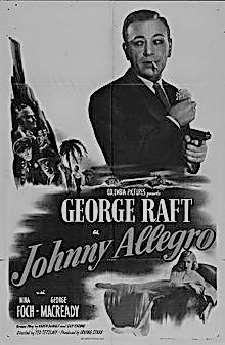 JOHNNY ALLEGRO (1949)
JOHNNY ALLEGRO (1949) (81 Min.) Genre: 1940 SUSPENSE, Transfer Quality: A
A reformed gangster, accustomed to a life of danger, finds himself dealing with a new and different threat in this adventure thriller. Johnny Allegro (George Raft) is a former mobster who has gone over to the other side and now works for the U.S. Treasury Department as an undercover agent. Allegro is asked to help get the goods on Morgan Vallin (George MacReady), a polished counterfeiter who is involved in a right-wing plot to bring down the American government by flooding the U.S. economy with bogus currency. Allegro makes his way to the island that's Vallin's base of operations, with Glenda Chapman (Nina Foch) in tow, and he convinces Vallin that he's a fugitive from American justice. Vallin takes Allegro and Glenda in, but he soon discovers Johnny's true identity, and Allegro learns that Vallin has a bizarre hobby — he likes to hunt, but he feels that humans are a more interesting quarry than animals. Vallin gives his guests a head start, then sets out to capture them, hoping to fell Johnny and Glenda with silver-tipped arrows, while the two agents hope that their associate Schultzy (Will Geer) will arrive in time to save them. — Mark Deming
Starring: George Raft, Nina Foch, George Macready, Will Geer | Directed by: Ted Tetzlaff
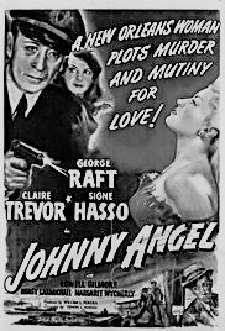 JOHNNY ANGEL (1946)
JOHNNY ANGEL (1946) (79 Min.) Genre: 1940 SUSPENSE, Transfer Quality: A
No relation to the later Shelley Fabares song hit of the same name, RKO Radio's Johnny Angel was adapted by Steve Fisher and Frank Gruber from a short story by Charles Gordon Booth. In one of his better performances, George Raft plays sea captain Johnny Angel, who doggedly pursues the no-good rats who murdered his father and swiped a shipment of gold bullion. Along the way, Johnny crosses paths (and words) with Lilah (Claire Trevor), the faithless wife of his boss, and French stowaway Paulette (Signe Hasso), apparently the only witness to the murder-hijacking. Aiding and abetting Johnny is philosophical cab driver Celestial O'Brien, engagingly played by songwriter Hoagy Carmichael. Considered a second-echelon effort by RKO, Johnny Angel proved to be a surprise hit, toting up a box-office take of $1,192,000. — Hal Erickson
Starring: George Raft, Claire Trevor, Signe Hasso, Lowell Gilmore | Directed by: Edwin L. Marin
(93 Min.) Genre: 1940 SUSPENSE, Transfer Quality: A
Tyrone Power plays the college-grad son of jailed-embezzler Edward Arnold. Power tries to find work, only to be turned away because of his father's reputation. When he decides to use a phony name, he is still fired, because his ex-convict boss feels that Power is being unfair to his imprisoned father. If you can't win for losing in a 1940 film, you turn to crime. Power hires on as the right-hand man of personable but deadly gangster Lloyd Nolan. Arnold, who has become a model convict, is disgusted that his son has turned to crime. He even refuses to have anything to do with his son when Power lands in the slammer himself. Through the intervention of Nolan's moll Dorothy Lamour, a nightclub singer who has grown to love Power, Arnold realizes that his son is still a good guy underneath. Power proves as much by preventing a climactic jailbreak engineered by the homicidal Nolan. — Hal Erickson
Starring: Tyrone Power, Dorothy Lamour, Edward Arnold, Lloyd Nolan, Lionel Atwill | Directed by: Henry Hathaway
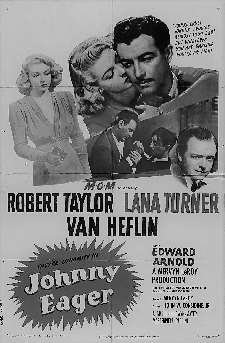 JOHNNY EAGER (1941)
JOHNNY EAGER (1941) (107 Min.) Genre: 1940 SUSPENSE, Transfer Quality: A
Robert Taylor toughened up his image considerably with this gangster movie, which was unusual both in its plot and origins, having come from MGM, which was generally not known for its crime movies. Taylor plays a parolee who is pretending to follow the straight-and-narrow as a hardworking cabbie, but is really the mastermind behind a dog-racing track being built with mob money. Eager works every angle, has a gang that's generally in line, and also has a loyal right-hand man in Jeff Hartnett (Van Heflin, who won an Oscar), his educated assistant, who drinks too much and waxes poetic when he isn't looking after Johnny's interests (and sometimes when he is, too). Eager has only one problem, special prosecutor John Benson Farrell (Edward Arnold) — who was also the attorney instrumental in sending Eager up — who has gotten an injunction against the track's opening. But the hood sees an opening when he accidentally crosses paths with a young sociology student, Lisbeth Bard (Lana Turner), who is drawn to him romantically, and then finds out that she's Farrell's step-daughter. After romancing her for a few months, he sets her up in a scam, making her believe that she killed one of Eager's men (Paul Stewart). He "generously" gets her away from the scene and then informs Farrell of what has happened, pointing out that he holds the evidence against Lisbeth. Farrell has no choice but to withdraw the injunction, and the track opens, but problems ensue when rival mobsters decide to try and cut in on Eager and his racket, and he finds out that Lisbeth is so guilt-ridden over her "crime," that she's destroying herself mentally. Eager can't figure out why she feels the way she does or what to do about it, or even if he should do anything to help her, but with Jeff's help, he discovers a nobler side to his nature. Realizing that she really does love him, and knowing it's not possible for the two of them to be together, he goes out in a blaze of glory — laced with a special irony built into the plot — solving Lisbeth's problem and also curing her of her love for him, and settling a score or two in the process. — Bruce Eder
Starring: Robert Taylor, Lana Turner, Edward Arnold, Van Heflin, Glenda Farrell | Directed by: Mervyn LeRoy
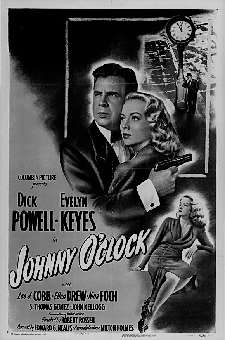 JOHNNY O'CLOCK (1947)
JOHNNY O'CLOCK (1947) (100 Min.) Genre: 1940 SUSPENSE, Transfer Quality: A
Three years after song-and-dance man Dick Powell reshaped his nice-guy image by playing hard-boiled gumshoe Phillip Marlowe in Murder My Sweet, he returned to film noir with this crime-based thriller. Johnny O'Clock (Dick Powell) and his partner Pete Marchettis (Thomas Gomez) operate a gambling casino that has seen better days. Chuck Blayden (Jim Bannon), a cop on the take, wants in on the casino, and he makes friends with Pete while trying to convince him that Johnny, the smarter of the two, should go. When Chuck's girlfriend Harriet (Nina Foch) is found dead, a supposed suicide, his sister Nancy (Evelyn Keyes) smells a rat, especially after Chuck skips town. Nancy is convinced that her sister was murdered, and she asks Johnny to help her prove it. Johnny, who already has a number of women in his life — including Nelle (Ellen Drew), Pete's wife — figures that one more can't hurt and agrees to help her. But Police Inspector Koch (Lee J. Cobb), convinced that Johnny and Pete were behind Harriet's death, is making it hard for Johnny to do much investigating, and matters get worse when Chuck's body is found floating in the river. Screenwriter Robert Rossen made his directorial debut with this film, 14 years later, he would return to this film's tough, gritty style for his best picture, The Hustler. — Mark Deming
Starring: Dick Powell, Evelyn Keyes, Lee J. Cobb, Ellen Drew, Nina Foch | Directed by: Robert Rossen
(76 Min.) Genre: 1940 SUSPENSE, Transfer Quality: A
In Johnny Stool Pigeon, the title character's name is really Johnny Evans (Dan Duryea). Evans is an imprisoned crook whose wife died as a result of a vicious narcotics ring. Federal agent Howard Duff works out a deal with Evans, who agrees to help the agent infiltrate the gang. After making connections up and down the West Coast, the gang is brought to heel by the combined efforts of Evans, the agent, and a reformed gun moll (Shelley Winters). Johnny Stool Pigeon was one of a group of intriguing Universal second features directed by future horror-film maestro William Castle between 1948 and 1951. — Hal Erickson
Starring: Howard Duff, Shelley Winters, Dan Duryea, John McIntire | Directed by: William Castle
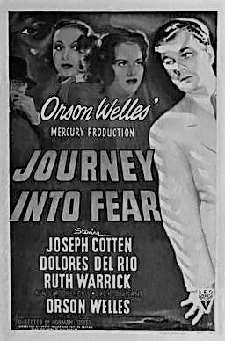 JOURNEY INTO FEAR (1942)
JOURNEY INTO FEAR (1942) (71 Min.) Genre: 1940 SUSPENSE, Transfer Quality: A
Orson Welles had planned to produce, direct and star in RKO's Journey Into Fear, but prior commitments compelled him to vacate the director's chair in favor of Norman Foster. Joseph Cotten, who starred as an American gunnery engineer up to his armpits in international intrigue, adapted the screenplay from the novel by Eric Ambler. Targeted for extermination by the Gestapo, Cotten secretly books passage on a steamer bound from Turkey to Batumi. His fellow passengers include dancer Dolores Del Rio and her gigolo partner Jack Durant; talkative Frenchwoman Agnes Moorehead and her browbeaten husband Frank Readick; German archaeologist Eustace Wyatt; and a secretive, obese, thick-spectacled gent, played by Orson Welles' business partner Jack Moss. From the outset, it is no secret that Moss is a Nazi assassin. The question: who are his contacts, and how long will it be before Cotten is forced into a showdown? The very complex storyline was made even more so by RKO's decision to pare the film down to 69 minutes; several resultant plot gaps had to be bridged by an ongoing offscreen narration, presented in the form of a letter written by Cotten to his worried wife Ruth Warrick. As one can see, virtually the entire roster of Welles' Mercury Theatre troupe is involved in Journey into Fear. Welles himself plays colorful Turkish police officer Colonel Haki, while Everett Sloane, Hans Conried and Edgar Barrier essay significant smaller roles. Director Norman Foster so slavishly imitates the patented Wellesian visual style (following Welles' pre-production "storyboards" dictating choice of camera angle, lighting etc.) that many historians have assumed that Welles himself directed the picture. Remade for Canadian TV in 1975. — Hal Erickson
Starring: Joseph Cotton, Orson Welles, Dolores Del Rio, Ruth Warrick, Agnes Moorehead | Directed by: Norman Foster
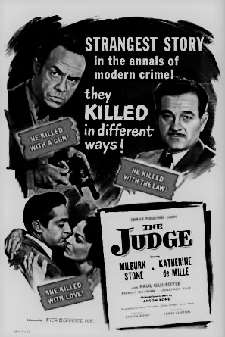 JUDGE, THE (1949)
JUDGE, THE (1949) (69 Min.) Genre: 1940 SUSPENSE, Transfer Quality: B
The terrible consequences of perverting the legal system are spelled out in The Judge. In one of his rare starring roles, Milburn Stone plays criminal lawyer Martin Strang. Suspecting his wife Lucille (Katherine de Mille) of infidelity, Strang schemes to have her put out of the way. He wangles a not-guilty verdict for murderer William Jackson (Paul Guilfoyle), then blackmails Jackson into participating in his plan to punish Lucille. Things don't quite go off as expected, and before long several lives are needlessly destroyed. The title character of The Judge, played by Jonathan Hale, relates the sordid goings-on in flashback form. Two future "regulars" of the Superman TV series, John Hamilton and Herb Vigran, show up in minor roles.
Starring: Milburn Stone, Katherine de Mille, Paul Guilfoyle, Stanley Waxman | Directed by: Elmer Clifton
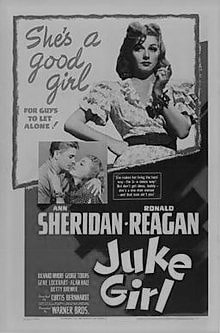 JUKE GIRL (1942)
JUKE GIRL (1942) (90 Min.) Genre: 1940 SUSPENSE, Transfer Quality: B
Director Curtis Bernhardt hadn't wanted to make Juke Girl, but he was under contract to Warner Bros. and had to tow the line lest he find himself drawing Unemployment. One of Bernhardt's gripes against the film is that it starred Ronald Reagan, whom he considered an "unimportant" screen personality. In all fairness, Reagan is pretty good in his role as itinerant fruit-picker Steve Talbot, who gets involved in the middle of a labor dispute between the farmers and the packers. Talbot casts his lot with the farmers, while his longtime pal Danny Frazier (Richard Whorf) goes with the packers. Juke-joint hostess Lola Meers (Anne Sheridan) falls for Steve and supports his cause, only to be fired for her troubles at the behest of powerful packing-plant operator Henry Madden (Gene Lockhart). She and Steve try to escape Madden's influence, but when their farmer friend Nick Garcos (George Tobias) is murdered, the couple is framed for the crime. There follows "orgies of fights" (director Bernhardt's description) and a lynching attempt before Steve's old buddy Danny comes to the rescue. Anne Sheridan is at her most gorgeous in Juke Girl, making it difficult for the viewer to remain concentrated on the story.
Starring: Ronald Reagan, Richard Whorf, Gene Lockhart, Ann Sheridan, Faye Emerson | Directed by: Curtis Bernhardt
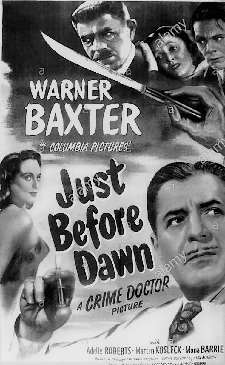 JUST BEFORE DAWN (1946)
JUST BEFORE DAWN (1946) (65 Min.) Genre: 1940 SUSPENSE, Transfer Quality: B
In this entry in the Crime Doctor series, amateur sleuth Dr. Ordway is duped into giving one of his patients a fatal shot. Now he must find the real killers before he is arrested and put away for life.
Starring: Warner Baxter, Craig Reynolds, Adelle Roberts, Martin Kosleck | Directed by: William Castle
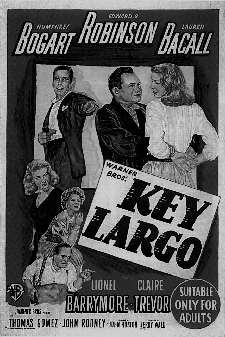 KEY LARGO (1948)
KEY LARGO (1948) (101 Min.) Genre: 1940 SUSPENSE, Transfer Quality: A
Richard Brooks and John Huston's screenplay for Huston's Key Largo eschews the lofty blank verse of Maxwell Anderson's original play, concentrating instead on the simmering tensions among the many characters. Humphrey Bogart plays Frank McCloud, an embittered war veteran who travels to Key Largo in Florida, there to meet Nora Temple (Lauren Bacall), the wife of his deceased war buddy. Arriving at a tumbledown hotel managed by Nora's father-in-law James Temple (Lionel Barrymore), McCloud discovers that the establishment has been taken over by exiled gangster Johnny Rocco (Edward G. Robinson) and what's left of his mob. Also in attendance is Gaye Dawn (Claire Trevor), Rocco's alcoholic girlfriend. While the others bristle at the thought of being held at bay by the gangsters, the disillusioned McCloud refuses to get involved: "One Rocco more or less isn't worth dying for." As he awaits a contact who is bringing him enough money to skip the country, Rocco is responsible for the deaths of a deputy sheriff and two local Indian youth. Unwilling to take a stand before these tragedies, McCloud finally comes to realize that Rocco is a beast who must be destroyed. To save the others from harm, McCloud agrees to pilot Rocco's boat to Cuba through the storm-tossed waters. Just before McCloud leaves, Gaye Dawn slips him a gun — which leads to the deadly final confrontation between McCloud and Rocco. His resolve to go on living renewed by this cathartic experience, McCloud heads back to Nora, with whom he's fallen in love. Claire Trevor's virtuoso performance as a besotted ex-nightclub singer won her an Academy Award — as predicted by her admiring fellow actors, who watched her go through several very difficult scenes in long, uninterrupted takes. While Key Largo sags a bit during its more verbose passages, on a visual level the film is one of the best and most evocative examples of the "film noir" school. — Hal Erickson
Starring: Humphrey Bogart, Edward G. Robinson, Monte Blue, Lauren Bacall | Directed by: John Huston
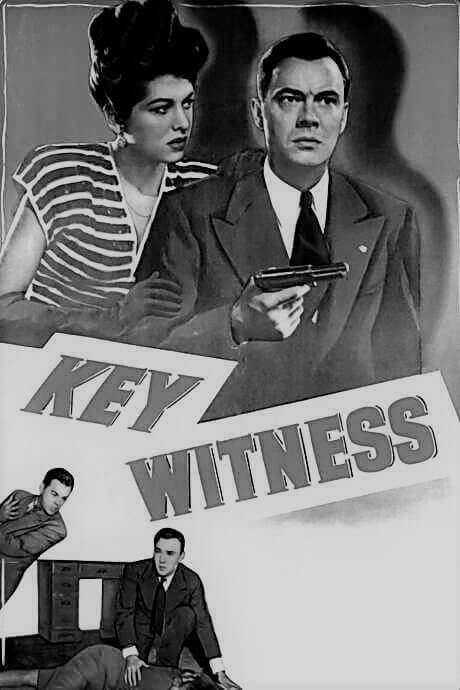 KEY WITNESS (1947)
KEY WITNESS (1947) (67 Min.) Genre: 1940 SUSPENSE, Transfer Quality: B
With a little extra effort, Columbia's Key Witness might have been a model B picture. John Beal plays inventor Milton Higby, whose treacherous ex-girlfriend is mysteriously murdered. As the number one suspect, Higby is in the doghouse witht he Law. Fortunately, it seems as though someone witnessed the crime; less fortunately, that someone has apparently disappeared from the face of the earth. Higby also tries to disappear by disguising himself as a bum, which only adds to his already mounting problems. So little critical attention was paid to Columbia's B product in the late 1940s that one reviewer labelled Key Witness costar Trudy Marshall as a "newcomer", even though she'd been in pictures since 1942 (Marshall, incidentally, is the mother of 1970s star Deborah Raffin).
Starring: John Beal, Trudy Marshall, Jimmy Lloyd, Helen Mowery | Directed by: David Ross Lederman
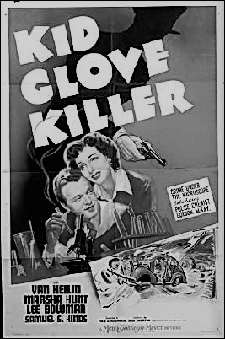 KID GLOVE KILLER (1942)
KID GLOVE KILLER (1942) (74 Min.) Genre: 1940 SUSPENSE, Transfer Quality: A
Kid Glove Killer is an expanded remake of They're Always Caught (1938), a 2-reel entry in MGM's "Crime Does Not Pay" series. Van Heflin stars as criminologist Gordon McKay, at present investigating the murder of of reform mayor Daniels (Samuel S. Hinds). What the audience knows, but McKay doesn't, is that the the culprit is district attorney Gerald Ladimer (Lee Bowman), ostensibly a crusader against organized crime. Thickening the plot is the fact that McKay and Ladimer are rivals for the affections of McKay's pretty lab assistant Jane Mitchell (Marsha Hunt). The question: Will McKay be able to piece together the fragmentary clues in his forensic lab before Ladimer is able to strike again? An excellent example of MGM's "B" unit at the height of its powers, Kid Glove Killer served as the feature-film directorial debut of Fred Zinnemann, who obviously was destined for bigger things. — Hal Erickson
Starring: Van Heflin, Marsha Hunt, Lee Bowman, Samuel S. Hinds, Ava Gardner | Directed by: Fred Zinnermann
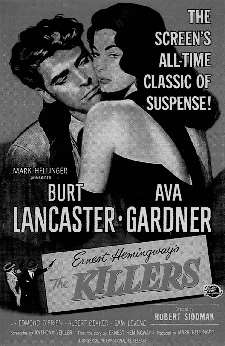 KILLERS, THE (1946)
KILLERS, THE (1946) (105 Min.) Genre: 1940 SUSPENSE, Transfer Quality: A
The Killers uses Ernest Hemingway's short story as a springboard for a complex film noir. Two mysterious men (William Conrad and Charles McGraw) muscle their way into a small town and kill an aging boxer (Burt Lancaster, making his screen debut), who offers no resistance and seems to be welcoming his death. An insurance investigator (Edmond O'Brien) is hired to locate the beneficiary to Lancaster's policy, and in the course of his investigation reopens a long-dormant robbery case. In a series of flashbacks, O'Brien makes the connection between Lancaster and the robbery and tracks down the "brains" behind the operation. He also comes in contact with Lancaster's former girlfriend (Ava Gardner), whose duplicity played a big part in Lancaster's demise — and his indifferent reaction to it. Siodmak's hard-edged, moody direction of the Oscar-nominated screenplay by Anthony Veiller, makes The Killers one of the definitive films noirs, including what is considered to be one of the greatest opening sequences in movie history. — Hal Erickson
Starring: Burt Lancaster, Ava Gardner, Edmond O'Brien, Albert Dekker, William Conrad, Charles McGraw | Directed by: Robert Siodmak
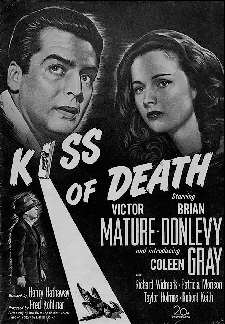 KISS OF DEATH (1947)
KISS OF DEATH (1947) (98 Min.) Genre: 1940 SUSPENSE, Transfer Quality: A
Based in part on a true story, Kiss of Death is given a veneer of reality by being filmed on location in New York, with a bare minimum of studio work. In one of his best performances, Victor Mature plays a cheap crook who is sent up the river for 20 years for robbery. District attorney Brian Donlevy, out of sympathy for Mature's two young daughters, gives him a chance to go free—if Mature will blow the whistle on his accomplices. Stubbornly adhering to the "code" of thieves, Mature refuses to do so, until his wife kills herself and his kids are placed in an orphanage. Once paroled, Mature is prevailed upon to extract additional information from sadistic mob torpedo Richard Widmark (in his chilling screen debut). Living with his children under an assumed name, Mature gradually divests himself of all criminal tendencies, and falls in love with sympathetic Coleen Gray. But Mature feels that it's only a matter of time before Widmark will come gunning for him, so he goes back to Donlevy, offering to turn over evidence that will send Widmark up for life. Thanks to a clever mob attorney, Widmark beats the rap, and Mature knows he is doomed. On his own, he schemes to arrange his impending demise so that the cops will have an air-tight case against Widmark. The last five minutes—one of the most tense 300 seconds on film—is devoted to the cat-and-mouse showdown and ultimate shootout between Mature and Widmark. Though much of Kiss of Death is a "conformist gangster film" (to quote critic Andrew Sarris), the presence of Richard Widmark makes up for any of the script's banalities. This is the film in which Widmark gigglingly pushes a wheelchair-bound old lady down a flight of stairs. Reviewer James Agee said it best: "You feel that murder is the kindest thing he is capable of". The film made Widmark a star—and also convinced him to start lobbying immediately for good-guy roles so that he wouldn't be typecast as maniacal killers for life. Kiss of Death was remade as the 1958 western The Fiend Who Walked the West, then re-remade under its original title in 1994, with David Caruso in the Mature role and Nicolas Cage in the Widmark part. — Hal Erickson
Starring: Victor Mature, Brian Donlevy, Coleen Gray, Richard Widmark, Karl Malden | Directed by: Henry Hathaway
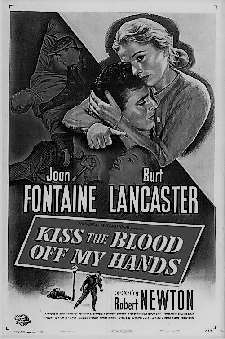 KISS THE BLOOD OFF MY HANDS (1948)
KISS THE BLOOD OFF MY HANDS (1948) (79 Min.) Genre: 1940 SUSPENSE, Transfer Quality: B
In this film noir drama, Bill Saunders (Burt Lancaster) is a former Prisoner of War living in England whose experiences have left him emotionally unstable and prone to violence. One night, while drinking in a pub, he gets into an argument with the owner which quickly escalates into a brutal fist fight; Bill kills the publican and flees with the police giving chase. Bill is given shelter by Jane Wharton (Joan Fontaine), a kind-hearted nurse who believes Bill when he tells her that the killing was an accident and that he's innocent of any wrongdoing. Bill soon gets in a fight with a policeman and ends up in jail, but Jane, who has fallen in love with Bill, still has faith in him, and upon his release she finds him a job driving a truck delivering drugs for the clinic where she works. Career criminal Harry Carter (Robert Newton), who witnessed Bill's murder of the pub owner, now sees a perfect opportunity for blackmail, and he forces Bill to tip him off for his next major drug shipment, which can then be routed to the black market at a high profit. Bill has little choice but to agree, but when Jane ends up tagging along when Bill is to make the delivery in question, he refuses to jeopardize her and makes the delivery to the clinic without incident. This quickly earns Harry's wrath, and they soon find themselves at the mercy of a very dangerous man. Miklos Rozsa composed the film's highly effective score.
Starring: Joan Fontaine, Burt Lancaster, Robert Newton, Lewis L. Russell | Directed by: Norman Foster
(92 Min.) Genre: 1940 SUSPENSE, Transfer Quality: B
In this taut, creepy melodrama, a housemaid works as the companion of an aging, retired British actress. One day the maid (Ida Lupino) is visited by her two looney half sisters. The actress finds the slightly mad sisters intolerable and demands that they leave. Unfortunately, the maid realizes that if the sisters are sent away they will end up involuntarily committed to an insane asylum and so the maid kills the actress and lets the sisters stay. Things go well until a suspicious relative shows up and starts to investigate. Nominated for Oscars for Best Interior Decoration and Best Score, Ladies in Retirement is based upon a stage play that was in turn based upon the true story from 1886.
Starring: Ida Lupino, Louis Hayward, Evelyn Keyes, Elsa Lanchester | Directed by: Charles Vidor
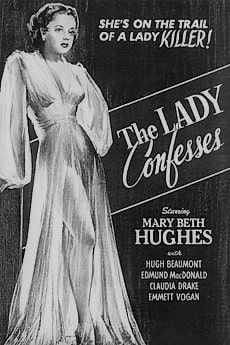 LADY CONFESSES, THE (1945)
LADY CONFESSES, THE (1945) (64 Min.) Genre: 1940 SUSPENSE, Transfer Quality: B
The title The Lady Confesses is slightly misleading, since it's the hero of the film is accused of murder. On the eve of his marriage to Vicki McGuire (Mary Beth Hughes), Larry Craig (Hugh Beaumont) discovers that his first wife Norma (Barbara Slater), long missing and presumed dead, is very much alive. Shortly thereafter, Norma is killed, and Larry is the number one suspect. To save her sweetie, Vicki becomes an amateur detective, hoping to expose the genuine murderer
Starring: Hugh Beaumont, Mary Beth Hughes, Edmund MacDonald, Claudia Drake | Directed by: Sam Newfield
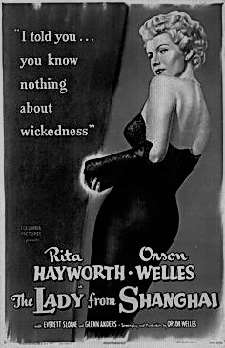 LADY FROM SHANGHAI, THE (1948)
LADY FROM SHANGHAI, THE (1948) (96 Min.) Genre: 1940 SUSPENSE, Transfer Quality: A
The Lady From Shanghai, a complex, involving puzzle-within-a-puzzle mystery story, is a showcase for Orson Welles, showing his singular talents and sensibilities as few other films have. The story is superficially simple: a seaman Michael O'Hara (Welles) is hired as a crew member on the yacht of the wealthy Banister (Everett Sloane). His beautiful but mysterious wife Elsa (Rita Hayworth) has met O'Hara earlier, when he saved her from a mugging. What ensues is a complicated and bizarre pattern of deception, fraud and murder, with O'Hara finding himself implicated in a murder, despite his innocence. The film is best remembered for its final sequence when the plot comes to a literally smashing climax in the famous "hall of mirrors" sequence, with Elsa and Banister shooting it out amidst shards of shattering glass. Orson Welles, who produced, directed, wrote and starred in the film, is sometimes self-indulgent in his use of visual tricks and techniques, which at times sacrifice plot for visual brilliance, but he pulls it together in the end to produce a stunning, difficult film. Rita Hayworth gives one of her best performances as the deceptive, seductive temptress, hard-edged and cynical. The film confounds, unsettles and disorients the viewer, very much as Welles intended to do. While not an easy film, it is well worth the attention required to follow it, and Welles offers no easy solutions or any false happy endings to his tour-de-force mystery. — Linda Rasmussen
Starring: Rita Hayworth, Orson Wells, Everett Sloane, Ted de Corsia | Directed by: Orson Welles
(62 Min.) Genre: 1940 SUSPENSE, Transfer Quality: A
The direction of Warner Bros.' Lady Gangster is credited to one "Florian Roberts," who on closer examination turns out to be veteran helmsman Robert Florey, working pseudonymously. Faye Emerson plays the title character, aspiring actress Dot Burton, whose chance association with a gang of bank robbers leads inexorably to a life of crime. She eventually ends up in prison, where she participates in a break-out. Her regeneration comes about when she rescues Kenneth Phillips (Frank Wilcox), the only man who has ever shown her any kindness, from being rubbed out by the mob. The supporting cast includes Julie Bishop (who only a year earlier had been billing herself as Jacqueline Wells), and Jackie "C." Gleason, wasted in the role of a rotund henchman. Lady Gangter bears some traces of the 1932 Warner Bros. drama The Life of Vergie Winters. — Hal Erickson
Starring: Faye Emerson, Julie Bishop, Frank Wilcox, Roland Drew, Jackie Gleason | Directed by: Robert Florey
(56 Min.) Genre: 1940 SUSPENSE, Transfer Quality: B
Like many PRC films, Lady in the Death House was run incessantly in the early days of television, then disappeared into the void of Public Domain once better-quality films were made available to TV. Actually, this women-in-prison low-budget attempt at film noir is pretty good as far as PRC productions go, with lovely Jean Parker as the title character, an innocent girl framed for murder. Cast against type, Lionel Atwill plays a kindly criminologist (and part-time psychologist) who clears the heroine's name and traps the real killer. With most of the handsomer leading men out fighting WW II, Parker's love interest in Lady in the Death House is played by the usually sinister Douglas Fowley. Former child star Marcia Mae Jones delivers a surprising characterization in a supporting role.
Starring: Jean Parker, Lionel Atwill, Douglas Fowley, Marcia Mae Jones | Directed by: Steve Sekely
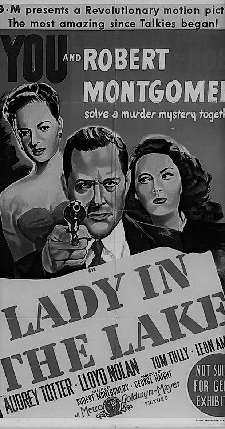 LADY IN THE LAKE (1946)
LADY IN THE LAKE (1946) (103 Min.) Genre: 1940 SUSPENSE, Transfer Quality: A
Robert Montgomery is the director and star of the film noir mystery Lady in the Lake, adapted for the screen by source novelist Raymond Chandler. Montgomery plays detective Philip Marlowe, a private eye who just wants to publish his own crime stories. Kingsby Publications editor Adrienne Fromsett (Audrey Totter) meets with Marlowe, but offers him a job as a detective instead of a writer. She wants him to find the missing wife of her boss, Mr. Kingsby (Leon Ames). (Adrienne wants them to proceed with their divorce so she can marry Kingsby herself.) Marlowe accepts the job and goes looking for clues at the home of the wife's sometime lover, Chris Lavery (Dick Simmons). When Marlowe gets knocked out and picked up for drunk driving, he decides to drop the case. He is drawn back in, however, when Adrienne suggests that Kingsby's wife is responsible for the murder of a mysterious lady in the lake. Lloyd Nolan and Tom Tully play two police detectives also on the case. Lady in the Lake is remembered as being filmed with a subjective camera — almost entirely from Marlowe's point of view — and subsequently hyped by an MGM ad campaign. — Andrea LeVasseur
Starring: Robert Montgomery, Audrey Trotter, Lloyd Nolan, Tom Tully | Directed by: Robert Montgomery
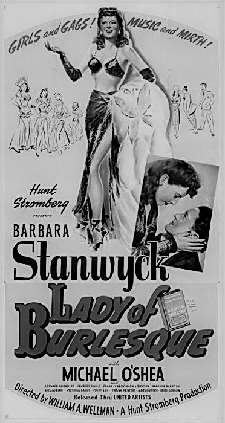 LADY OF BURLESQUE (1943)
LADY OF BURLESQUE (1943) (91 Min.) Genre: 1940 SUSPENSE, Transfer Quality: C
Barbara Stanwyck shines in her second portrayal of a showgirl in less than two years (the first was in Howard Hawks' Ball of Fire in 1941). In Lady of Burlesque — which, at times, has a Hawksian edge to the dialogue — she portrays Dixie Daisy, a striptease artist at a Broadway theater in New York at the end of the 1930s. In the course of fending off the unwanted advances of brash comic Biff Brannigan (Michael O'Shea), with whom she is teamed in several numbers, and staying clear of the dressing room feuds of her fellow dancers — including a very nasty dispute between Dolly Baxter (Gloria Dickson) and Lolita La Verne (Victoria Faust) — she finds herself up to her neck in trouble when one of the women is found strangled with her own G-string. The police don't know what to make of it, especially as the victim was already dying of a fatal dose of poison, which means that there are two murderers somewhere in the theater; and when a second woman turns up strangled inside a prop that Dixie was supposed to be hiding in onstage, she looks like a good suspect. Between the backstage comedy-drama, and the songs, dances, and on-stage comic routines, with the police breathing down both their necks at different times, Dixie and Biff manage to solve the mystery and find each other in this briskly paced, funny, yet amazingly gritty comedy-thriller. Lady of Burlesque was allowed to fall out of copyright in 1971, and since then it was seen in substandard editions until the May 2001 DVD release from Image Entertainment. — Bruce Eder
Starring: Barbara Stanwyck, Michael O'Shea, J. Edward Bromberg, Iris Adrian | Directed by: William Wellman
(66 Min.) Genre: 1940 SUSPENSE, Transfer Quality: A
A partial remake of 1936's Wanted: Jane Turner, Lady Scarface is a seedy but entertaining tour de force for the great Judith Anderson. Embittered over the ugly facial scar which covers the left side of her face, a woman named Slade becomes a criminal mastermind. The cops have no idea that the elusive Slade is female, which enables her to move about freely without attracting attention. After a robbery-murder, Slade has her share of the loot mailed to her at a post-office box registered under the phony name of Mary Powell. When the real Mary Powell (Mildred Coles) receives the stolen loot in the mail, the fur-and the bullets-really begin to fly. Judith Anderson once explained that she accepted the starring role in Lady Scarface in hopes that the film would do for her what Little Caesar did for Edward G. Robinson. It didn't. — Hal Erickson
Starring: Dennis O'Keefe, Frances Neal, Judith Anderson, Mildred Coles | Directed by: Frank Woodruff
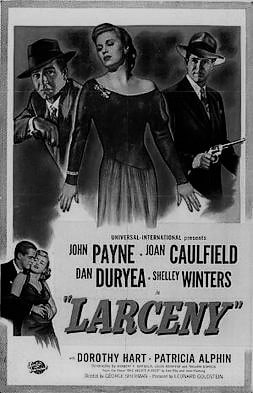 LARCENY (1948)
LARCENY (1948) (89 Min.) Genre: 1940 SUSPENSE, Transfer Quality: B
John Payne is the no-good lowdown rat who tries to capitalize on postwar patriotism and grief. He finagles a war widow (Joan Caulfied) into giving up her savings for a nonexistent memorial. When Payne falls in love with the widow he has pangs of conscience, but he reckons without his con-artist boss (Dan Duryea), who tends to bolster his arguments with muscle and bullets. Larceny is a second-echelon "film noir" based on The Velvet Fleece, a novel by Lois Ely and John Fleming. When costar Shelley Winters (who plays Duryea's moll) was asked years later what she did in Larceny, she snapped "lousy acting."
Starring: John Payne, Joan Caulfield, Dan Duryea, Shelley Winters, Dorothy Hart | Directed by: George Sherman
(68 Min.) Genre: 1940 SUSPENSE, Transfer Quality: C
Larceny in Her Heart was the second entry in PRC's revival of the "Michael Shayne" series, with Hugh Beaumont as Brett Halliday's two-fisted sleuth. It all starts when Shayne agrees to track down the stepdaughter (Marie Harmon) of a local bigwig. But when his client's corpse turns up at his doorstep, our hero finds himself reluctantly involved in yet another murder mystery. Along the way, he must fend off femme fatale Phyllis (Cheryl Walker), who may or may not be intimately involved in the killing. He also endures a chilling episode at an alcoholic ward that's straight out of The Lost Weekend, by way of Murder My Sweet. It says in the credits that Larceny in Her Heart is based on a novel by Brett Halliday, though liberties were obviously taken.
Starring: Hugh Beaumont, Cheryl Walker, Ralph Dunn, Charles Wilson | Directed by: Sam Newfield
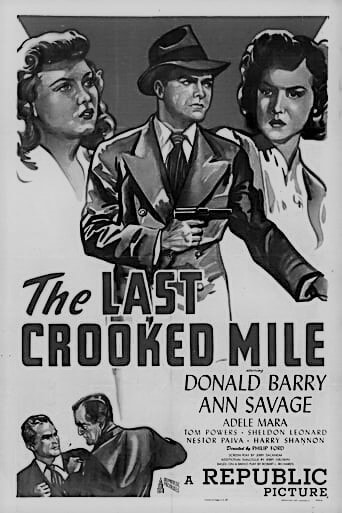 LAST CROOKED MILE, THE (1946)
LAST CROOKED MILE, THE (1946) (67 Min.) Genre: 1940 SUSPENSE, Transfer Quality: B
Republic contractee Don Barry plays private eye Tom Dwyer, whose ability to irritate both cops and crooks alike hides his keen deductive skills. Dwyer takes on the case of a missing $300,000, stolen from a bank by three robbers who were subsequently killed in a car accident. Before he can recover the loot, three more murders are committed to cover up the tracks of the person in possession of the money. Two B-picture icons, Adele Mara and Ann Savage, weave in and out of the proceedings. Among the suspects are veterans Tom Powers and Sheldon Leonard and relative newcomer John Dehner. Released at 67 minutes, The Last Crooked Mile was cut by 13 minutes for its earliest TV showings.
Starring: Don 'Red' Barry, Ann Savage, Adele Mara, Tom Powers, Sheldon Leonard | Directed by: Philip Ford
(88 Min.) Genre: 1940 SUSPENSE, Transfer Quality: A
This adaptation of Vera Caspary's suspense novel was begun by director Rouben Mamoulien and cinematographer Lucien Ballard, but thanks to a complex series of backstage intrigues and hostilities, the film was ultimately credited to director Otto Preminger and cameraman Joseph LaShelle (who won an Oscar for his efforts). At the outset of the film, it is established that the title character, Laura Hunt (Gene Tierney), has been murdered. Tough New York detective Mark McPherson (Dana Andrews) investigates the killing, methodically questioning the chief suspects: Waspish columnist Waldo Lydecker (Clifton Webb), wastrel socialite Shelby Carpenter (Vincent Price), and Carpenter's wealthy "patroness" Ann Treadwell (Judith Anderson). The deeper he gets into the case, the more fascinated he becomes by the enigmatic Laura, literally falling in love with the girl's painted portrait. As he sits in Laura's apartment, ruminating over the case and his own obsessions, the door opens, the lights switch on, and in walks Laura Hunt, very much alive! To tell any more would rob the reader of the sheer enjoyment of watching this stylish film noir unfold on screen. Everything clicks in Laura, from the superbly bitchy peformance of Clifton Webb (a veteran Broadway star who became an overnight movie favorite with this film) to the haunting musical score by David Raskin. Long available only in the 85-minute TV version Laura has since been restored to its original 88-minute running time. — Hal Erickson
Starring: Gene Tierney, Dana Andrews, Clifton Webb, Vincent Price | Directed by: Otto Preminger
(66 Min.) Genre: 1940 SUSPENSE, Transfer Quality: A
Adapted from the Cornell Woolrich novel Black Alibi, The Leopard Man is a lesser but still fascinating psychological-horror effort from producer Val Lewton. Someone has been killing off the citizens of a small New Mexico town, and the most likely suspect is a huge leopard, purchased for a local nightclub act by press agent Jerry Manning (Dennis O'Keefe). Neither Manning nor his star Clo-Clo (Margo) are totally convinced that the big cat is responsible, and as it turns out they're right. The haunting finale takes place during the annual "Dance of the Dead" festivities, during which the genuine predator is revealed. The opening sequence of Leopard Man, atmospherically detailing the last few moments of murder victim Teresa Delgado (Margaret Landry), is so powerful that the rest of the film seems anticlimactic. Long available only in its 59-minute reissue form, the film was restored to its original 65-minute running time in the mid-1980s. — Hal Erickson
Starring: Dennis O'Keefe, Margo, Jean Brooks, Isabel Jewell | Directed by: Jacques Tourneur
(84 Min.) Genre: 1940 SUSPENSE, Transfer Quality: A
The Lodger was the third film version of Mrs. Marie Belloc-Lowndes' classic "Jack the Ripper" novel, and in many eyes it was the best (even allowing for the excellence of the 1925 Alfred Hitchcock adaptation). Laird Cregar stars as the title character, a mysterious, secretive young man who rents a flat in the heart of London's Whitechapel district. The Lodger's arrival coincides with a series of brutal murders, in which the victims are all female stage performers. None of this phases Kitty (Merle Oberon), the daughter of a "good family" who insists upon pursuing a singing and dancing career. Scotland Yard inspector John Warwick (George Sanders), in love with Kitty, worries about her safety and works day and night to solve the murders. All the while, Kitty draws inexorably closer to The Lodger, who seems to have some sort of vendetta on his mind?..Some slight anachronisms aside (for example, the villain falls off a bridge that hadn't yet been built at the time of the story), The Lodger is pulse-pounding entertainment, with a disturbingly brilliant performance by the late, great Laird Cregar. — Hal Erickson
Starring: Merle Oberon, George Sanders, Laird Cregar, Cedric Hardwicke | Directed by: John Brahm
(71 Min.) Genre: 1940 SUSPENSE, Transfer Quality: A
The lady in question in this delightful whodunit is Joan Bradley (Jean Muir), a former secretary who is about to marry her employer's son, Bob Pennison (Warren Hull). Mrs. Pennison (Georgia Caine) graciously lends her future daughter-in-law a priceless necklace, but when Joan returns to her apartment, she is met by what at first appears to be the ghost of her late husband, Rennick (Roger Pryor). He is no ghost — but very much alive, in fact. Rennick grabs the necklace, shoves poor Joan away, and he's promptly shot and killed by...well, that is indeed the question. Brought into the case by accident (literally), former jewel thief-turned-master sleuth Michael Lanyard (Warren William) must once again cross swords not only with a dangerous criminal but with the ubiquitous foe, Inspector Crane (Thurston Hall). The Lone Wolf Meets a Lady was the third entry in the Lone Wolf series.
Starring: Warren William, Jean Muir, Eric Blore, Victor Jory | Directed by: Sidney Salkow
(57 Min.) Genre: 1940 SUSPENSE, Transfer Quality: A
In this entry in the long-running series, the reformed master jewel thief rushes to help a lovely heiress whose pearl necklace has been stolen by other thieves. Using his consummate skill, the Wolf pulls a deft switcheroo and substitutes the real ones for fakes. He then brings the real necklace back to the socialite. The crooks are soon arrested by the cops.
Starring: Warren William, Jean Muir, Eric Blore, Alan Baxter | Directed by: Sidney Salkow
(76 Min.) Genre: 1940 SUSPENSE, Transfer Quality: A
The title of this series entry may strike some as a tad redundant: After all, isn't crook-turned-sleuth Michael Lanyard, aka the Lone Wolf, always taking a chance? On this occasion, Lanyard (Warren William) and his trusty valet Jamison (Eric Blore) are framed on a murder charge. The actual miscreants are a gang of counterfeiters, shipping their plates into the country in a thief-proof carrier invented by Johnny Baker (Lloyd Bridges). In the course of clearing their names, Lanyard and Jamison are sealed up with poor Johnny in one of his own carriers, which is then filled with poison gas. Will they escape? Is there really any doubt?
Starring: Warren William, June Storey, Henry Wilcoxon, Eric Blore | Directed by: Sidney Salkow
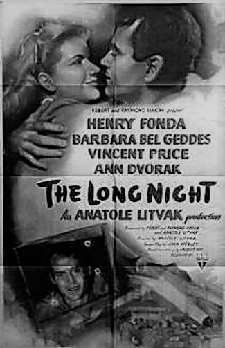 LONG NIGHT, THE (1947)
LONG NIGHT, THE (1947) (101 Min.) Genre: 1940 SUSPENSE, Transfer Quality: A
Based upon the French film Le Jour Se Lève, The Long Night opens in the in the midst of a dire situation: ex-serviceman Joe Adams (Henry Fonda) finds himself holed up in his apartment, surrounded by policemen who soon open fire in a relentless and determined manner. Adams has been accused of murder, and as his apartment is riddled with bullets, he flashes back to how this all came about. It began when Adams met Jo Ann (Barbara Bel Geddes), who, it turns out, grew up in the same orphanage at the same time as he. They soon fall in love, but things are complicated when a magician named Maximilian (Vincent Price) enters the picture. He tells Adams that he is Jo Ann's father, but that he doesn't want her to know this. Maximilian begins spending a lot of time with Jo Ann, which makes Adams feel vaguely unsettled. He discovers that Maximilian lied -- that he is not her father but is someone who has been trying to seduce her for a long time. Maximilian goes to Adams' apartment to taunt him, with the result that Adams shoots him, thus bringing about the current state of affairs. As Adams has been recalling all of this, a crowd has gathered, including Jo Ann. She leads the crowd in protesting the police's actions, and a riot brews. With tension continuing to rise, Jo Ann desperately tries to find a way to rescue the man she loves.
Starring: Henry Fonda, Barbara Bel Geddes, Vincent Price, Ann Dvorak, Elisha Cook, Jr., Charles McGraw | Directed by: Anatole Litvak
(102 Min.) Genre: 1940 SUSPENSE, Transfer Quality: A
Lucille Ball is an American taxi-dancer living in London whose roommate has disappeared. The missing girl had left to answer a job offer in the "personal" column of the Times...just like several other women who've vanished without a trace. Scotland Yard detective George Zucco suggests that Ball answer the personals herself in hopes trapping the killer. She crosses the paths of several eccentrics, including deranged artist Boris Karloff, who for a brief time is the prime suspect. The actual culprit, a sex murderer, is the least likely and most helpful of Ball's contacts - a fact that she learns almost too late. - Hal Erickson *** Based upon the French film Pièges, Lured is a lightweight but very entertaining mystery-thriller. True, the plot is somewhat contrived and over convoluted, but the contrivances rarely make the viewer wince, and the plot turns and abundance of red herrings will appeal to fans of the genre. Director Douglas Sirk brings his customary attention to visual detail here, giving Lured a unique look that takes film noir basics and applies a glossy sheen to them. He has also assembled a uniformly strong cast. Lucille Ball is perfectly on target throughout, giving a very fine performance that anchors the film. Ball is allowed to demonstrate her dramatic skills to good effect, and the result is about as good as can be achieved within the confines of the genre. George Sanders brings his smooth ease to the role and convincingly gets to portray the love interest, with only a hint of the misanthropy with which he is usually associated. Horror mainstay Boris Karloff is especially notable, delineating quite believably a man going over the edge. Lured may not be great art, but it's a delightful way to spend a stormy night. - Craig Butler
Starring: George Sanders, Lucille Ball, Charles Coburn, Alan Mowbray, Cedric Hardwicke, George Zucco | Directed by: Douglas Sirk
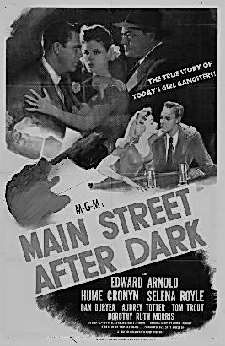 MAIN STREET AFTER DARK (1944)
MAIN STREET AFTER DARK (1944) (57 Min.) Genre: 1940 SUSPENSE, Transfer Quality: A
Produced by the same team responsible for MGM's Crime Does Not Pay short subjects, Main Street After Dark is an energetic crime melodrama with a topical wartime theme. The film's criminal element is a family of pickpockets, who've been fleecing visiting servicemen. The crooks are challenged by a civic clean-up committee, and are brought to justice by the time the film's allotted 57 minutes have run their course. Only MGM could produce a "B" picture with a star lineup including Edward Arnold, Hume Cronyn, Dan Duryea and Audrey Totter. Main Street After Dark also provided a good showcase for newcomer Gloria Grahame as the prettiest of the pickpockets. — Hal Erickson
Starring: Edward Arnold, Selena Royle, Tom Trout, Audrey Totter, Dan Duryea | Directed by: Edward L. Cahn
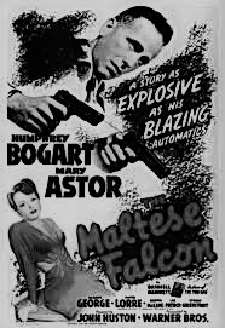 MALTESE FALCON, THE (1941)
MALTESE FALCON, THE (1941) (100 Min.) Genre: 1940 SUSPENSE, Transfer Quality: A
After two previous film versions of Dashiell Hammett's detective classic The Maltese Falcon, Warner Bros. finally got it right in 1941—or, rather, John Huston, a long-established screenwriter making his directorial debut, got it right, simply by adhering as closely as possible to the original. Taking over from a recalcitrant George Raft, Humphrey Bogart achieved true stardom as Sam Spade, a hard-boiled San Francisco private eye who can be as unscrupulous as the next guy but also adheres to his own personal code of honor. Into the offices of the Spade & Archer detective agency sweeps a Miss Wonderly (Mary Astor), who offers a large retainer to Sam and his partner Miles Archer (Jerome Cowan) if they'll protect her from someone named Floyd Thursby. The detectives believe neither Miss Wonderly nor her story, but they believe her money. Since Archer saw her first, he takes the case — and later that evening he is shot to death, as is the mysterious Thursby. Miss Wonderly's real name turns out to be Brigid O'Shaughnessey, and, as the story continues, Sam is also introduced to the effeminate Joel Cairo (Peter Lorre) and the fat, erudite Kasper Gutman (Sydney Greenstreet, in his film debut). It turns out that Brigid, Cairo and Gutman are all international scoundrels, all involved in the search for a foot-high, jewel-encrusted statuette in the shape of a falcon. Though both Cairo and Gutman offer Spade small fortunes to find the "black bird," they are obviously willing to commit mayhem and murder towards that goal: Gutman, for example, drugs Spade and allows his "gunsel" Wilmer (Elisha Cook Jr.) to kick and beat the unconscious detective. This classic film noir detective yarn gets better with each viewing, which is more than can be said for the first two Maltese Falcons and the ill-advised 1975 "sequel" The Black Bird. — Hal Erickson
Starring: Humphrey Bogart, Mary Astor, Peter Lorre, Sydney Greenstreet | Directed by: John Huston
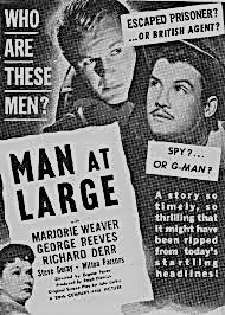 MAN AT LARGE (1941)
MAN AT LARGE (1941) (70 Min.) Genre: 1940 SUSPENSE, Transfer Quality: B
Fresh from his contract-player duties at Warner Bros., future TV "Superman" George Reeves heads the cast of 20th Century-Fox's Man at Large. Reeves is cast as FBI agent Bob Grayson, working in collaboration with Max (Richard Derr), a British agent posing as a fugitive German aviator. Meanwhile, fearless girl reporter Dallas Dayle (Marjorie Weaver) is assigned by her editor to track down the enemy aviator and get an exclusive story. When she catches up with Grayson and Max, Dallas is under the impression that Grayson is a rival reporter and Max is the genuine fugitive, leading to the usual complications. All three protagonists ultimately pool their resources to expose a German spy ring operating in the United States.
Starring: Marjorie Weaver, George Reeves, Richard Derr, Steven Geray, Elisha Cook Jr. | Directed by: Eugene J. Forde
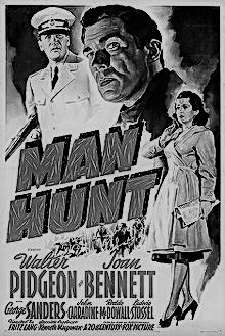 MAN HUNT (1941)
MAN HUNT (1941) (105 Min.) Genre: 1940 SUSPENSE, Transfer Quality: A
A hunter finds himself in a world of danger when he pursues a new and dangerous quarry — Adolph Hitler — in this WWII thriller. Capt. Thorndike (Walter Pidgeon) is an expert big-game hunter from England who, while vacationing in Bavaria, happens upon Hitler's Berchtesgaden estate; he has his rifle in tow, and he quickly realizes that it would be surprisingly easy to assassinate the fascist leader. After catching Hitler in the crosshairs of his rifle, Thorndike is about to load and fire when he is ambushed by Maj. Quive-Smith (George Sanders), a Gestapo leader assigned to guard the Führer. By the time Thorndike returns to London, the hunter has become the hunted, with Gestapo agents combing the streets of London looking for the would-be assassin. Thorndike finds an unlikely ally in Jerry (Joan Bennett), a seamstress and sometimes streetwalker who takes him in and helps him hide from the German forces closing in around him. Man Hunt was directed by Fritz Lang, the great German director who fled to Paris in 1933 rather than accept a commission from Joseph Goebbels to make Nazi propaganda films. He came to America the following year. — Mark Deming
Starring: Walter Pidgeon, Joan Bennett, George Sanders, Roddy McDowell | Directed by: Fritz Lang
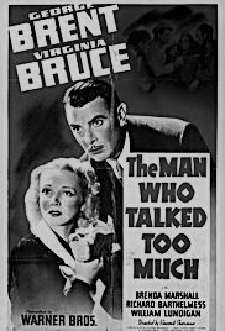 MAN WHO TALKED TOO MUCH, THE (1940)
MAN WHO TALKED TOO MUCH, THE (1940) (75 Min.) Genre: 1940 SUSPENSE, Transfer Quality: A
This slightly laundered remake of the 1932 courtroom classic The Mouthpiece stars George Brent as brilliant but unprincipled DA Steve Forbes, a character based on legendary lawyer William Fallon. After railroading an innocent boy into the electric chair, Forbes goes on a bender, then cynically builds up a new practice as a criminal attorney. His underhanded legal tactics cause a rift between Forbes and his idealistic younger brother Johnny (William Lundigan), despite the fact that it was Steve's income that enabled Johnny to finish law school. Angered that his brother has enabled big-time gangster J.B. Roscoe (Richard Barthelmess) to continually elude the law, Johnny turns in damning evidence to the FBI. On Roscoe's orders, Steve frames Johnny on a murder charge, but reforms his ways in the nick of time. Based on a play by Frank J. Collins, The Man Who Talked too Much was remade in 1955 as Illegal, with Edward G. Robinson in the lead. — Hal Erickson
Starring: George Brent, Virginia Bruce, Brenda Marshall, Richard Barthelmess, William Lundigan, George Tobias | Directed by: Vincent Sherman
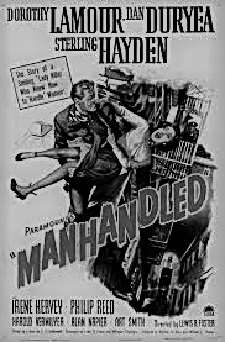 MANHANDLED (1949)
MANHANDLED (1949) (97 Min.) Genre: 1940 SUSPENSE, Transfer Quality: B
Produced by Paramount's Pine-Thomas unit, Manhandled is a no-nonsense film noir with a well-chosen cast. Small-time hoodlum Karl Benson (Dan Duryea) uses and abuses several innocent people in his efforts to get ahead. Among Benson's victims is Merl Kramer (Dorothy Lamour), who doesn't find out about her boyfriend's perfidy until it's almost too late. Sterling Hayden co-stars as insurance investigator Joe Cooper, who likewise exploits poor Merl, albeit for a good cause: Cooper is on the trail of some missing jewels. A subplot involves a married couple (Irene Hervey and Alan Napier) and the wife's would-be lover (Phillip Reed). Manhandled's level of tension never lets up, not even in its final scenes. — Hal Erickson
Starring: Dorothy Lamour, Sterling Hayden, Dan Duryea, Irene Hervey | Directed by: Lewis R. Foster
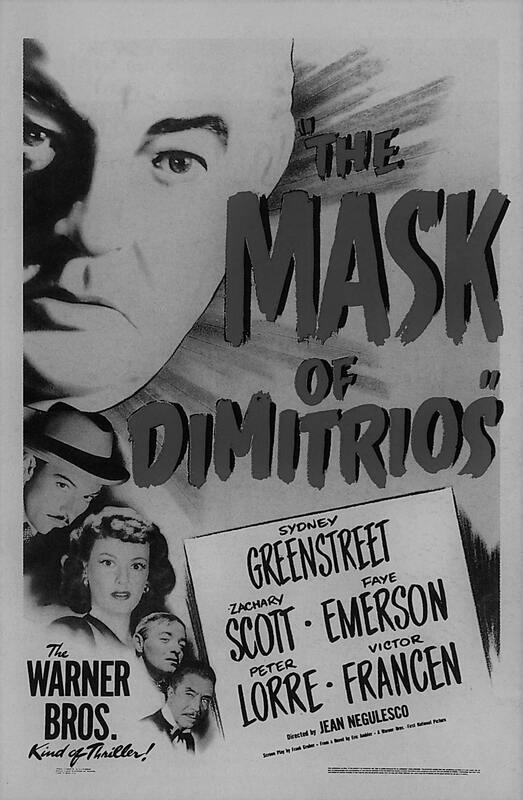 MASK OF DIMITRIOS, THE (1944)
MASK OF DIMITRIOS, THE (1944) (95 Min.) Genre: 1940 DRAMA, Transfer Quality: A
Zachary Scott made his screen debut in this clever bit of film noir that has gained a cult reputation in recent years. Dutch mystery novelist Cornelius Leyden (Peter Lorre) is travelling through Istanbul when he meets Col. Haki (Kurt Katch), head of the secret police and a big fan of Leyden's work. He offers to tell Leyden about Dimitrios Makropoulos (Zachary Scott), a notorious criminal whose body was just found washed up on the beach. It seems that Makropoulos was involved in nearly every sort of lawless act imaginable, from murder and blackmail to espionage and political assassination. Fascinated, Leyden decides that Makropoulos would be a fine subject for his next book, and he begins researching his life, beginning with Haki's dossier on the criminal. Leyden's research takes him through much of Europe; while en route by rail to Sophia, he meets a large man with an ingratiating chuckle, Mr. Peters (Sydney Greenstreet), who informs Leyden that "There is not enough kindness in the world," and tells him of a good hotel in town. Grateful for the advice, Leyden checks in, only to later find Peters ransacking his room and holding him at gunpoint; it seems that Peters had business with Makropoulos, and he isn't entirely convinced that the master criminal is dead — especially since his body was found with shabby clothes and no money, and the police in Istanbul had never actually seen a photo of Makropoulos. Based on a novel by Eric Ambler, The Mask of Dimitrios also features Faye Emerson, who was in the news at the time, as she had just wed the son of President Franklin D. Roosevelt. — Mark Deming
Starring: Peter Lorre, Sydney Greenstreet, Zachary Scott, Faye Emerson | Directed by: Jean Negulesco
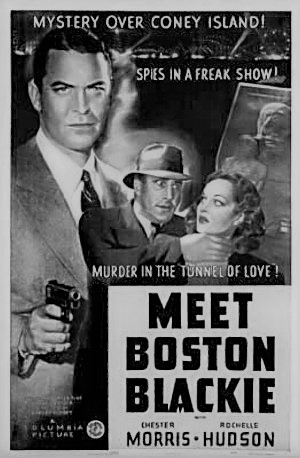 MEET BOSTON BLACKIE (1941)
MEET BOSTON BLACKIE (1941) (61 Min.) Genre: 1940 SUSPENSE, Transfer Quality: A
Boston Blackie, the suave crook-turned-detective created in 1910 by pulp writer Donald Boyle, had been popping up sporadically in films for nearly two decades by the time Columbia launched its "Boston Blackie" series in 1941. Chester Morris starred as the title character in Meet Boston Blackie, wherein the ex-thief protagonist and his underworld cronie The Runt (Charles Wagenheim) meet a mysterious young lady named Marilyn Howard (Constance Worth) while disembarking from an ocean liner. When a murder takes place, Blackie and the Runt trail Marilyn to Coney Island, followed in close proximity by Inspector Farraday (Richard Lane), who thinks (as he always does) that Blackie is somehow tied in with the killing. Before long, our hero and heroine are mixed up with a gang of foreign spies operating out of a funhouse. Cleverly directed by Robert Florey and atmospherically lensed by cinematographer Franz Planer, Meet Boston Blackie was an excellent launching pad for one of Columbia's most profitable film series. — Hal Erickson
Starring: Chester Morris, Rochelle Hudson, Richard Lane, Charles Wagenheim | Directed by: Robert Florey
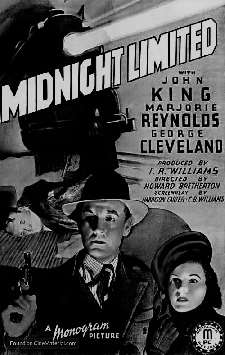 MIDNIGHT LIMITED (1940)
MIDNIGHT LIMITED (1940) (61 Min.) Genre: 1940 SUSPENSE, Transfer Quality: B
Mignight Limited takes place during an eventful nonstop train trip from New York to Montreal. A couple of murders take place, obliging detective Val (John King) to swing into action. There is no shortage of suspects, but Val refuses to believe that pretty Joan (Marjorie Reynolds) is the guilty party-and, of course, his instincts are credit. George Cleveland steals the show as a seemingly eccentric professor, a character obviously inspired by the addlepated religious fanatic in Hecht and MacArthur's Twentieth Century. For reasons best known to the Monogram executives, Midnight Limited is interrupted halfway through with a song performed by hero John King.
Starring: Marjorie Reynolds, George Cleveland, Edward Keane, Pat Flaherty, Monte Collins, Jr. | Directed by: Howard P. Bretherton
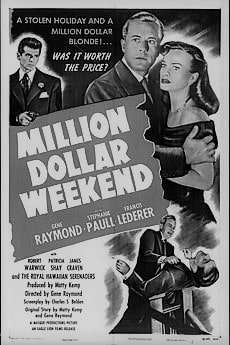 MILLION DOLLAR WEEKEND (1948)
MILLION DOLLAR WEEKEND (1948) (73 Min.) Genre: 1940 SUSPENSE, Transfer Quality: B
In this mystery, a stockbroker embezzles $1 million from his company and flees to Shanghai via plane. En route he encounters a man and a woman. The man is attempting to blackmail the woman, who has been accused of murdering her husband; the embezzler soon finds himself falling in love with her. He is so preoccupied that he does not see the extortionist running off with his briefcase full of loot until it is too late. He then follows the crook back to San Francisco, pursues him, beats him up, and decides to quietly put the money back where it belongs. Meanwhile, the woman attempts to clear herself of the charges against her.
Starring: Gene Raymond, Stephanie Paull, Francis Lederer, Robert Warwick | Directed by: Gene Raymond
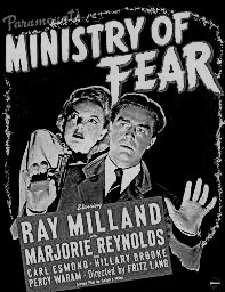 MINISTRY OF FEAR (1944)
MINISTRY OF FEAR (1944) (87 Min.) Genre: 1940 SUSPENSE, Transfer Quality: A
An innocent man is drawn into a web of espionage when he unwittingly comes into possession of a crucial piece of microfilm in this shadowy, ominous film noir. Fritz Lang's adaptation of Graham Greene's novel is filled with unusual touches, beginning with the fact that protagonist Stephen Neale (Ray Milland) has just been released from a mental asylum. To celebrate his return to the real world, he visits a local carnival, only to accidentally receive a "prize" meant for a Nazi agent. When he discovers the error, he turns for help to a detective, whose investigations only make the matter more complicated. Neale soon winds up on the run from both the Nazis and the police, who mistakenly believe him guilty of murder. Lang's famous expressionistic style is somewhat muted here, but Henry Sharp's crisp black-and-white cinematography sets a suitably unsettling mood, and the twists and double-crosses of Greene's story unfold at an appropriately quick pace. While it does not reach the same level of timeless classic as Carol Reed's adaptation of Greene's The Third Man four years later, Ministry of Fear stands as a well-made, thoroughly gripping and intelligent example of film noir. — Judd Blaise
Starring: Ray Milland, Marjorie Reynolds, Dan Duryea, Carl Esmond | Directed by: Fritz Lang
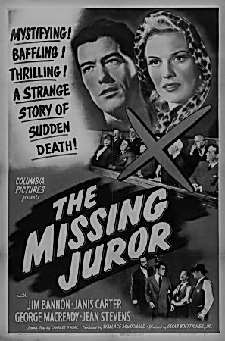 MISSING JUROR, THE (1944)
MISSING JUROR, THE (1944) (66 Min.) Genre: 1940 SUSPENSE, Transfer Quality: B
Jim Bannon, fresh from his radio success on I Love a Mystery, stars in this taut suspenser. The jurors of a celebrated murder case are being bumped off one by one. Now only six jurors are left, and one of them has disappeared, whereabouts unknown. Bannon must find the missing juror before the killer does. The cast includes Janis Carter (menaced) and George MacReady (menacing). The Missing Juror was an excellent post-grad course for future "cult" director Bud Boetticher.
Starring: Jim Bannon, Janis Carter, George Macready, Jean Stevens | Directed by: Budd Boetticher
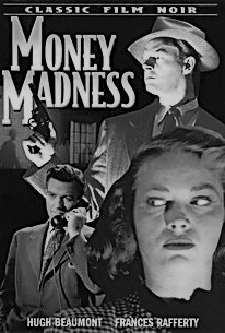 MONEY MADNESS (1947)
MONEY MADNESS (1947) (73 Min.) Genre: 1940 SUSPENSE, Transfer Quality: B
Much of the enjoyment inherent in Money Madness can be derived from watching Hugh Beaumont, nine years before his "Ward Cleaver" stint on TV's Leave It to Beaver, playing a low-down, dirty-rat heavy. Armored-car driver Steve Clark (Beaumont) gets tired of hauling around other people's money and begins drawing up plans to accumulate his own loot. Using inside information, Clark manages to pilfer 200 grand without arousing the suspicions of the authorities. He then weds heiress Julie (Frances Rafferty), for the express purpose of murdering both her and her wealthy aunt Cora (Cecil Weston). Only attorney Donald (Harlan Warde) figures out that the smooth-talking Clark is up to no good, but by then it's too late. Hugh Beaumont's cold-blooded performance in the film's final scenes is enough to make one fear for the future safety of Barbara Billingsley, Tony Dow and Jerry Mathers.
Starring: Hugh Beaumont, Frances Rafferty, Harlan Warde, Ida Moore, Cecil Weston | Directed by: Sam Newfield
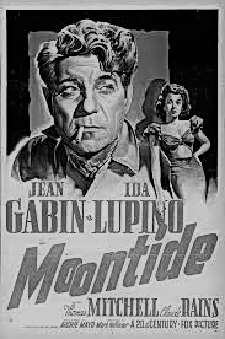 MOONTIDE (1942)
MOONTIDE (1942) (94 Min.) Genre: 1940 SUSPENSE, Transfer Quality: A
Forced to flee Paris during the Occupation, the great French leading man Jean Gabin starred in a brace of Hollywood films, the best of which was the first, 20th Century-Fox's Moontide. Cast to type, Gabin plays Bobo, a brooding itinerant dock-worker who gets mixed up in a drunken brawl. Upon awakening, Bobo is convinced that he has killed a man by his mercenary "pal" Tiny (Thomas Mitchell). Despairing at the thought of having committed murder, not to mentioned being blackmailed for the rest of his life by the treacherous Tiny, Bobo is able to find a few fleeting moments of happiness with Anna (Ida Lupino), a suicidal young girl whom he has saved from a watery grave (The intensity of the love scenes may well be due to the allegedly real-life romance between Jean Gabin and Ida Lupino). Novelist John O'Hara adapted the screenplay from a book by actor Willard Robertson. — Hal Erickson
Starring: Jean Gabin, Ida Lupino, Thomas Mitchell, Claude Rains | Directed by: Archie Mayo
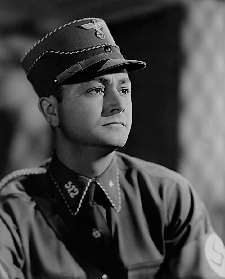 MORTAL STORM, THE (1940)
MORTAL STORM, THE (1940) (100 Min.) Genre: 1940 SUSPENSE, Transfer Quality: A
The Nazi Party's rise to power has disastrous consequences for a German family in this drama. Victor Roth (Frank Morgan) is a college professor teaching in Germany in 1933 who leads a peaceful and contented life with his wife Emelie (Irene Rich), son Rudi (Gene Reynolds), daughter Freya (Margaret Sullavan), and stepsons Otto (Robert Stack) and Erich (William T. Orr). However, Adolph Hitler's emergence as Germany's ruler has an unexpected impact on their lives. Fritz (Robert Young) and Martin (James Stewart) both vie for Freya's hand in marriage, but anti-Nazi activist Martin is forced to flee to Austria, while Freya is disturbed by Fritz's membership in a pro-fascist group. Victor repudiates Hitler's theories about Aryan superiority in class, and he not only loses his teaching position, but he is sentenced to a concentration camp. And while Emelie and Rudi join Freya as she tries to escape to Martin's new home in Austria, they find themselves hunted by Otto and Erich, now members of the Hitler Youth. The Mortal Storm was perhaps the most explicitly anti-Nazi film made in Hollywood prior to America's entry into WWII, and it resulted in all of MGM's product being banned in Germany. — Mark Deming
Starring: Margaret Sullavan, James Stewart, Robert Young, Frank Morgan | Directed by: Frank Borzage
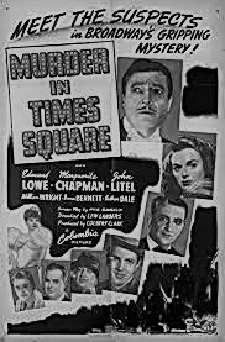 MURDER IN TIMES SQUARE (1943)
MURDER IN TIMES SQUARE (1943) (65 Min.) Genre: 1940 SUSPENSE, Transfer Quality: B
Though somewhat past his prime, Edmund Lowe carries the dramatic weight of Murder in Times Square with breezy assuredness. Lowe plays Barrymoresque stage actor Cory Williams, who vaingloriously tries to solve a bizarre series of murders. Though the killings take place in the heart of New York, the victims are killed by the venom of a rattlesnake. It turns out that the killing has a vendetta against theater people, and Williams may be next on the list. Marguertie Chapman costars as perky press agent Melinda Mathews, while the many suspects and victims include Bruce Bennett, Veda Ann Borg, John Litel, and, best of all, Esther Dale as a crafty panhandler named Longacre Lil.
Starring: Edmund Lowe, Marguerite Chapman, John Litel, Bruce Bennett | Directed by: Lew Landers
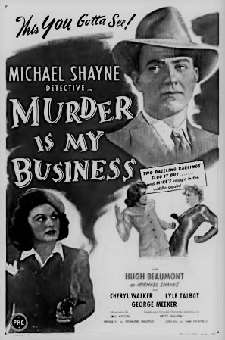 MURDER IS MY BUSINESS (1946)
MURDER IS MY BUSINESS (1946) (64 Min.) Genre: 1940 SUSPENSE, Transfer Quality: C
Several years after the "Michael Shayne" B-movie series ran its course at 20th Century-Fox, PRC Pictures revived the property with Murder is My Business. Hugh Beaumont-yes, Ward Cleaver!--replaces Fox's Lloyd Nolan as Brett Halliday's red-headed gumshoe Michael Shayne. This time around, Shayne is hired by a wealthy woman to protect her from blackmailers. When his client is murdered, Shayne takes it upon himself to track down the killer. Murder is My Business was adapted from the Brett Halliday novel The Uncomplaining Corpse.
Starring: Hugh Beaumont, Cheryl Walker, Lyle Talbot, George Meeker | Directed by: Sam Newfield
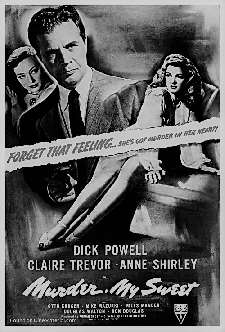 MURDER, MY SWEET (1944)
MURDER, MY SWEET (1944) (95 Min.) Genre: 1940 SUSPENSE, Transfer Quality: A
One-time movie crooner Dick Powell literally turned his career around in the 1944 film noir Murder My Sweet. Powell stars as Phillip Marlowe, the hard-boiled private detective antihero created by novelist Raymond Chandler. Hired by hulking, psychotic Moose Malloy (Mike Mazurki) to locate Moose's old girl friend, Marlowe is pitched headlong into a morass of intrigue and deception. The participants include duplicitous glamour-girl Claire Trevor, sodden slattern Esther Howard, suave blackmailer Otto Kruger and dyspeptic doctor Ralf Harolde. At one point, Marlowe is railroaded into a lunatic asylum, where under the influence of drugs he experiences a surrealistic nightmare the like of which would not be seen on screen again until Hitchcock's Vertigo (1958). So fascinating are the "bad" characters in Murder My Sweet that the two 100% "good" characters, heroine Anne Shirley and detective Don Douglas, seem wishy-washy wimps by comparison. After years of insipid golly-gee roles, Dick Powell startled his fans with his cynical, world-weary portrayal of Philip Marlowe. The part put him back on top of the box-office tallies and enabled him to extend his acting career into the 1950s, which led to an even more lucrative "third life" as a powerful TV-studio executive. Murder My Sweet was based on Chandler's Farewell My Lovely, previously filmed in 1942 as The Falcon Takes Over; a remake, also titled Murder My Sweet, was produced in 1975, with Robert Mitchum as Marlowe. — Hal Erickson
Starring: Dick Powell, Claire Trevor, Anne Shirley, Otto Kruger, Mike Mazurki | Directed by: Edward Dmytryk
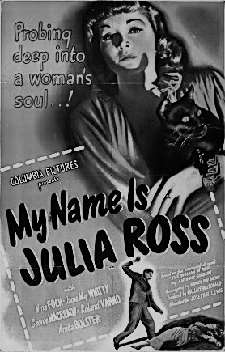 MY NAME IS JULIA ROSS (1945)
MY NAME IS JULIA ROSS (1945) (65 Min.) Genre: 1940 SUSPENSE, Transfer Quality: B
Cult figure and B-movie auteur Joseph H. Lewis directed this taut exercise in film noir. Julia Ross (Nina Foch), an American receiving medical treatment in London, finds herself short on money and takes a job as secretary for Mrs. Hughes (May Whitty), the matriarch of a large estate. Julie meets Mrs. Hughes' son Ralph (George Macready), a mysterious gentleman with a facial scar, shortly before eating lunch and falling into a deep sleep. When she awakes, she's in a different home with a high fence, and everyone around her insists that she's Ralph's wife, just home after a stay in a mental institution. My Name Is Julia Ross was one of Lewis' first "prestige" productions; begun as a ten-day B-picture, studio heads were so impressed with the results that they expanded the schedule by eight days to give the picture more polish.
Starring: Nina Foch, Dame May Whitty, George Macready, Roland Varno | Directed by: Joseph H. Lewis
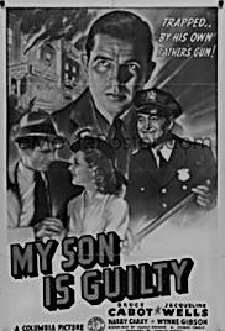 MY SON IS GUILTY (1940)
MY SON IS GUILTY (1940) (63 Min.) Genre: 1940 SUSPENSE, Transfer Quality: B
From the same folks who brought us My Son is a Criminal comes the near-lookalike property My Son is Guilty. Veteran police patrolman Tim Kelly (Harry Carey) despairs over the antics of his ne'er-do-well son Ritzy (Bruce Cabot), who prefers to live life in the fast lane. Released from prison after getting mixed up with mob activities, Ritzy promises his dad that he'll try to reform, but before long he's back with a bad crowd, compounding his misdeeds by plotting the demise of his own father. Meanwhile, Ritzy's sweetheart Julia Allen (Jacqueline Wells) gives up on the lad entirely, preferring a much safer relationship with young author Barney (Glenn Ford, in one of his first major roles).
Starring: Bruce Cabot, Harry Carey, Glenn Ford, Wynne Gibson | Directed by: Charles Barton
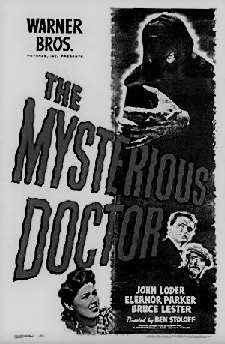 MYSTERIOUS DOCTOR, THE (1943)
MYSTERIOUS DOCTOR, THE (1943) (57 Min.) Genre: 1940 SUSPENSE, Transfer Quality: A
A Warner Bros. attempt to ape the success of the Universal horror films, The Mysterious Doctor is a moody little piece centering around a series of decapitations. These outrages are being committed in a cloistered English village, and the perpetrator is supposedly a legendary headless ghost. For a while, suspicion falls upon the village idiot (Matt Willis), but the true culprit is mad doctor John Loder, who is using the "ghost" legend to cover up his Nazi activities. Eleanor Parker, a recent Warners contractee, is around to scream and look terrified. Mysterious Doctor wraps everything up in 57 minutes. — Hal Erickson
Starring: John Loder, Eleanor Parker, Lester Matthews, Forrester Harvey | Directed by: Benjamin Stoloff
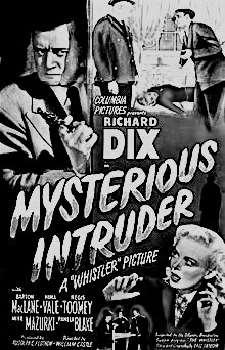 MYSTERIOUS INTRUDER (1946)
MYSTERIOUS INTRUDER (1946) (61 Min.) Genre: 1940 SUSPENSE, Transfer Quality: B
Mysterious Intruder was the fifth entry in Columbia's B-picture series based on the radio anthology "The Whistler". Richard Dix, the leading man in all but one of the "Whistler" films, stars as duplicitous private eye Don Gale. Motivating the storyline are a pair of priceless Jenny Lind wax recordings, which are coveted by a Swedish millionaire. Someone is willing to kill to get his or her hands on the records, prompting Gale and the cops to conduct a citywide search for the killer. The film's resolution is surprising only to those who hadn't seen the previous "Whistler" films, but it still works. Predominant in the supporting cast is Mike Mazurki, offering a virtual reprise of his "Moose Malloy" characterization from Murder My Sweet (1945).
Starring: Richard Dix, Barton MacLane, Nina Vale, Regis Toomey | Directed by: William Castle
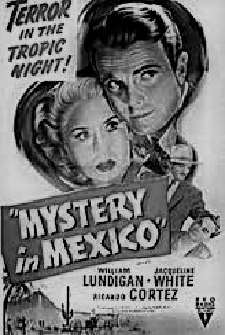 MYSTERY IN MEXICO (1948)
MYSTERY IN MEXICO (1948) (66 Min.) Genre: 1940 SUSPENSE, Transfer Quality: A
Much of Mystery in Mexico was filmed on location through the facilities of RKO Radio's Churubusco Studios. William Lundigan plays Steve an insurance investigator sent to Mexico City to ascertain the whereabouts of a missing colleague. Also concerned for the missing man's welfare is his sister, nightclub singer Victoria (Jacqueline White). A murder and a kidnapping follow in short order, with all the clues leading to a gang of elusive jewel thieves. There are plenty of Latino surnames in the cast list of Mystery in Mexico, including third-billed Ricardo Cortez (who came into the world as Jake Krantz). — Hal Erickson
Starring: William Lundigan, Jacqueline White, Ricardo Cortez, Tony Barrett | Directed by: Robert Wise
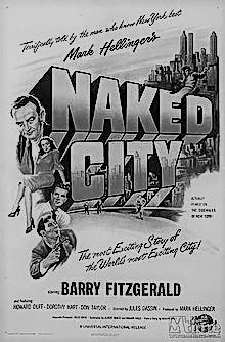 NAKED CITY, THE (1948)
NAKED CITY, THE (1948) (96 Min.) Genre: 1940 SUSPENSE, Transfer Quality: A
Young model Jean Dexter is knocked unconscious and drowned in her own bathtub in her Manhattan apartment, and a lot of jewelry that she supposedly owned is missing. The Naked City is actually about six days in the life of New York City that coincide with the murder and the subsequent investigation by Lt. Dan Muldoon (Barry Fitzgerald) and Detective James Halloran (Don Taylor). The account of their work, and the workings of the New York City police department, is interspersed with brief vignettes about the life of the city around them, and, especially, the reaction of residents to the murder and the newspaper reports of the progress of the case. Muldoon and Halloran first must determine why she was killed, which may (or may not) have to do with how a woman with a minimal income came by the jewelry — was it a love affair gone bad (and if so, with whom?), or something more complex and sinister? Retracing the final 18 months of the victim's life, their investigation reaches out to a mysterious "Philip Henderson" with whom she was supposedly linked romantically, and to Frank Niles (Howard Duff), who's a little too fast-and-loose with the truth when he doesn't have to be to make Muldoon comfortable; to make things more complicated, Muldoon determines that there were at least two men involved with the actual commission of the murder. The victim turns out to have led a wild life, filled with men and parties, and was tied up with several sordid figures. Their investigation carries them into the highest and lowest ends of New York's social strata to find the killer, and it turns out there are a lot of interlocking reasons why at least three men might've wanted her dead.
Starring: Barry Fitzgerald, Howard Duff, Don Taylor, Dorothy Hart | Directed by: Jules Dassin
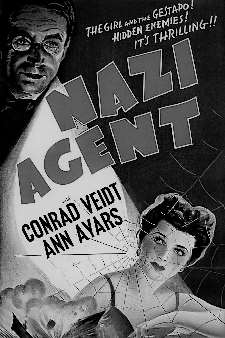 NAZI AGENT (1942)
NAZI AGENT (1942) (84 Min.) Genre: 1940 SUSPENSE, Transfer Quality: A
This Irving Asher production was that rarity, a genuine B-movie from posh MGM. Set in a pre-Pearl Harbor United States, Nazi Agent starred real-life Hitler refugee Conrad Veidt as identical twins, one a timid stamp collector and rare book store owner, the other the Nazi consul. The evil Veidt is killed during an argument between the two and the good Veidt shaves his beard in order to take his brother's place as head of a Nazi spy ring. He manages to quell the group's attempts to sabotage allied shipping routes before being exposed by, of all things, a pet canary. In order to save the life of a defecting fifth columnist (Ann Ayars), Veidt agrees to return to Germany, gaining strength for the upcoming ordeal in the Vaterland as his ship passes the Statue of Liberty. Relatively fast-paced and engrossing most of the way, Nazi Agent was the feature-film debut of director Jules Dassin, formerly of MGM's short subject department. Dassin went on to direct several groundbreaking crime dramas for Universal before finding himself blacklisted during the Hollywood "witch hunts." He continued his career in Europe, helming such genuine classics as Never on Sunday (1959). A lyric soprano, Ann Ayars spent the mostly unrewarding years between 1941 and 1943 in MGM potboilers before leaving films in favor of the New York City Opera. — Hans J. Wollstein
Starring: Conrad Veidt, Ann Ayars, Dorothy Tree, Tom Stevenson | Directed by: Jules Dassin
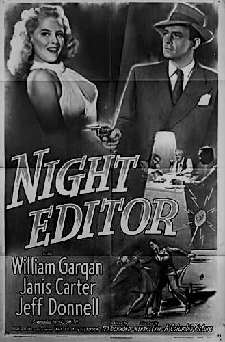 NIGHT EDITOR, THE (1946)
NIGHT EDITOR, THE (1946) (65 Min.) Genre: 1940 SUSPENSE, Transfer Quality: B
Inspired by the radio program of the same name, Night Editor features Charles D. Brown as the editor of the New York Star. In flashback, the editor tells the tale of police lieutenant William Gargan, who forsakes his happy home life for the love of no-good society dame Janis Carter. Both Gargan and Carter begin cheating on their respective spouses, and while on a romantic rendezvous the couple witnesses a murder. They can't report the crime without revealing their own infidelities, a dilemma which leads to blackmail, double-crossing and a second murder attempt. A twist ending caps this snappy little 65-minute morality play. The script of Night Editor was based on the story "Inside Story" by Scott Littleton, previously dramatized on the Night Editor radio series.
Starring: William Gargan, Janis Carter, Jeff Donnell, Coulter Irwin | Directed by: Henry Levin
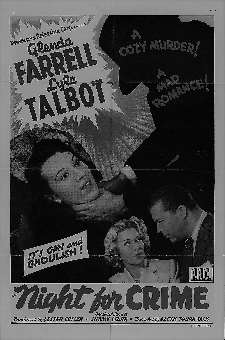 NIGHT FOR CRIME (1942)
NIGHT FOR CRIME (1942) (75 Min.) Genre: 1940 SUSPENSE, Transfer Quality: B
Glenda Farrell reprises her fast-talking girl reporter persona in PRC's Night for Crime. Ms. Farrell is cast as Susan, a big-city sob sister who investigates the murder of movie extra Ellen Smith (Marjorie Manners). Adding to the confusion, movie star Mona (Lina Basquette) disappears in the middle of an important production. As clues and suspects pile up, Susan and detective Joe (Lyle Talbot) try to solve the mystery without ending up as murder victims themselves. A Night for Crime was based on a story by Hollywood columnist Jimmy Starr, who appears on-screen with his journalistic colleagues Erskine Johnson, Edwin Schallert (father of actor William Schallert) and Harry Crocker.
Starring: Glenda Farrell, Lyle Talbot, Lina Basquette, Donald Kirke, Ruby Dandridge, Ralph Sanford | Directed by: Alexis Thurn-Taxis
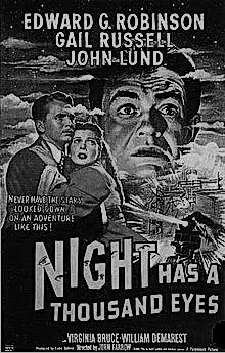 NIGHT HAS A THOUSAND EYES (1948)
NIGHT HAS A THOUSAND EYES (1948) (80 Min.) Genre: 1940 SUSPENSE, Transfer Quality: B
A man who dreams of seeing the future discovers the horrible burden that it can carry in this film noir suspense story. Suicidal Jean Courtland (Gail Russell) is prevented from killing herself by her fiancée Elliot Carson (John Lund). When they consult psychic John Triton (Edward G. Robinson), he confesses that he used his powers to bring on her death. Years ago, Triton was a phony mentalist in a vaudeville act, but he began seeing genuine visions of the future, most of which portended tragic results. After a premonition of the death of his wife Jenny (Virginia Bruce) in childbirth, a terrified Triton went into hiding for five years; upon his return, he discovered that his wife had married Whitney (Jerome Cowan) shortly after John was declared dead...and she died giving birth. Years later, Jenny's child grew up to be Jean Courtland, and when Triton receives a vision of Whitney's death in a plane wreck, he rushes to California in hopes of stopping fate. However, he's foreseen a tragic future for both Jean and Whitney and is afraid of the agony that awaits them. The Night Has a Thousand Eyes was adapted from a novel by Cornell Woolrich.
Starring: Edward G. Robinson, Gail Russell, John Lund, Virginia Bruce | Directed by: John Farrow
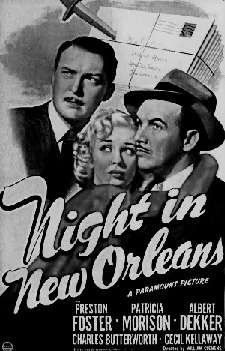 NIGHT IN NEW ORLEANS, A (1942)
NIGHT IN NEW ORLEANS, A (1942) (75 Min.) Genre: 1940 SUSPENSE, Transfer Quality: C
A solid Jonathan Latimer screenplay is one of the "plusses" of the medium-budget mystery A Night in New Orleans. Preston S. Foster plays police lieutenant Steve Abbott, at present engrossed in a baffling murder case. As he pieces the clues together, Abbott comes to the sobering conclusion that his own wife Ethel (Patricia Morrison) may be intimately involved in the murder. It gets worse: soon Abbott himself is accused of the crime. The film is full of clever little touches, notably a scene in which the heroine is seen reading a book written by none other than Jonathan Latimer! Featured in the cast of A Night in New Orleans is Ginger Rogers' former stand-in Jean Phillips, whom Paramount briefly groomed for stardom in the early 1940s.
Starring: Preston S. Foster, Patricia Morison, Albert Dekker, Charles Butterworth | Directed by: William B. Clemens
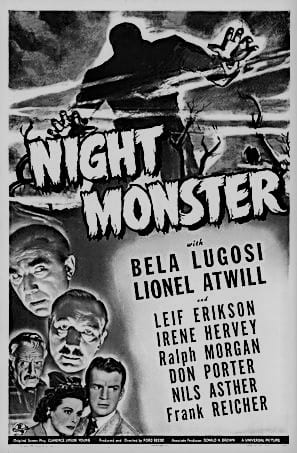 NIGHT MONSTER (1942)
NIGHT MONSTER (1942) (73 Min.) Genre: 1940 SUSPENSE, Transfer Quality: A
Reclusive Kurt Ingston (Ralph Morgan) finds himself playing host to an extraordinary array of guests at his decaying old mansion. Among the medical guests are psychiatrist Lynn Harper (Irene Hervey), who is there to evaluate Ingston's daughter Margaret (Fay Helm), whose sanity has been called into doubt over her claim that she has seen some sort of inhuman fiend stalking the grounds after dark; and then there are doctors Timmons (Frank Reicher), Phipps (Francis Pierlot), and King (Lionel Atwill), all well known to Ingston -- for the botched operation that left him crippled for life; and then there's the mysterious Agor Singh (Nils Asther), a mystic with a strange hold on Ingston. When these people start dying grisly deaths, hero Dick Baldwin (Don Porter) must figure out how these seemingly impossible killings are being carried out, and by whom, despite clues that appear to lead nowhere. Hovering over the proceedings, in one of his least rewarding roles at Universal, is Bela Lugosi playing Rolf the butler. Needless to say, Rolf -- because he is played by Bela Lugosi -- seems to be hiding some mysterious connection to the strange goings on. And the presence of Lionel Atwill is a similar "clue" put before audiences by the movie's makers, which helps to make Night Monster lots of fun, if not always logical. Additionally, future star Leif Erickson cuts a memorable figure as a menacing chauffeur; and Fay Helm, perhaps best remembered today as the disturbed mystery woman in Robert Siodmak's Phantom Lady (1944), dominates the serious acting with her portrayal of the seemingly insane sister.
Starring: Bela Lugosi, Lionel Atwill, Irene Hervey, Ralph Morgan, Nils Asther | Directed by: Ford I. Beebe
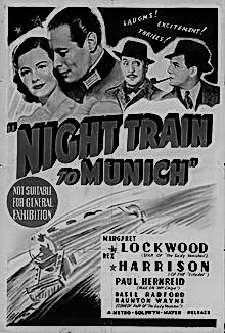 NIGHT TRAIN TO MUNICH (1940)
NIGHT TRAIN TO MUNICH (1940) (93 Min.) Genre: 1940 SUSPENSE, Transfer Quality: A
Rex Harrison astonishes his fans by donning a Nazi uniform in the British suspenser Night Train (original title: Night Train to Munich). Actually he's a British agent, working undercover to rescue a Czech inventor from the Gestapo. The inventor's daughter (Margaret Lockwood) becomes the unwitting pawn of a genuine Nazi (Paul von Hernreid, just before he became Paul Henreid) during a long train ride from Germany to France and back again. Director Carol Reed never denied that his inspiration for Night Train was Hitchcock's The Lady Vanishes (both films were written by Frank Launder and Sidney Gilliatt). The homage was solidified by the presence in Night Train of two carryovers from the Hitchcock film: those ardent British cricket fans Charters and Caldicott (Basil Radford and Naunton Wayne). Night Train was liberally adapted from the Gordon Wellesley novel Report on a Fugitive. — Hal Erickson
Starring: Rex Harrison, Margaret Lockwood, Paul Henreid, Basil Radford | Directed by: Carol Reed
(110 Min.) Genre: 1940 SUSPENSE, Transfer Quality: A
Nightmare Alley is the sordid tale of a conniving young man who, in the words of one of the film's supporting characters, ends up low because he aimed so high. Drifter Tyrone Power sweet-talks his way into a job as barker for a rundown carnival. He is fascinated by an illegal side-show attraction called "The Geek," a near-lunatic who bites the heads off live chickens and then is "paid off" with a cheap bottle of rotgut and a warm place to sleep it off. Otherwise, Power's attention is focussed on a beautiful if slightly stupid carnival performer (Cathy Downs) who works in an "electricity" act with an equally dense strongman (Mike Mazurki). Power also befriends an alcoholic mentalist (Ian Keith), who demonstrates how easy it is to fool an audience into thinking that his mind reading is genuine. When the mentalist dies after accidentally drinking wood alcohol, Power works his way into the confidence of the performer's widow (Joan Blondell), who teaches Power all the tricks and code words of the mind-reading racket. Power walks out on Blondell in favor of Cathy Downs, who marries him and becomes his partner in a classy nightclub mentalist act. But Power is dissatisfied with show business, and with the help of a beautiful but shifty psychiatrist (Helen Walker) he convinces several wealthy people that he can communicate with their dead loved ones...for a price. One elderly millionaire (Taylor Holmes) offers Power a fortune if he can conjure up the spirit of the millionaire's dead daughter. Power enlists his wife to impersonate the deceased girl, but at the crucial moment she has an attack of conscience and exposes the fraud. His career ruined, Power goes to the crooked psychiatrist for help, but she laughs in his face and calls the cops. He escapes the law by going on the bum, and before long is a drunken derelict. When he approaches a carnival for work, he is told that there is only one job open...as a "geek." When asked if he wants the job, the defeated Power replies "Mister, I was born for it." Based on a lurid bestseller by William Lindsay Graham, Nightmare Alley was Tyrone Power's attempt to break away from romantic leads in favor of roles with more substance. The picture wasn't a success, but it proved that Power was more than just a pretty face. — Hal Erickson
Starring: Tyrone Power, Joan Blondell, Coleen Gray, Helen Walker | Directed by: Edmund Goulding
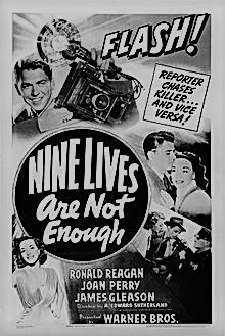 NINE LIVES ARE NOT ENOUGH (1941)
NINE LIVES ARE NOT ENOUGH (1941) (63 Min.) Genre: 1940 SUSPENSE, Transfer Quality: A
Perhaps nine lives weren't enough, but 63 minutes was plenty of time to relate the plot of this Ronald Reagan vehicle. Reagan plays a newspaper reporter who has a story "that'll break this town wide open!" The story involves a mysterious, unsolved boarding house murder. The suspects include the seductive Faye Emerson, wide-eyed Joan Perry, and brainless Peter Whitney. Wanna bet none of them did it? Reagan solves the case, wins the girl, and doesn't retire to politics...yet.
Starring: Ronald Reagan, Joan Perry, James Gleason, Howard Da Silva, Faye Emerson, Edward S. Brophy | Directed by: Edward Sutherland
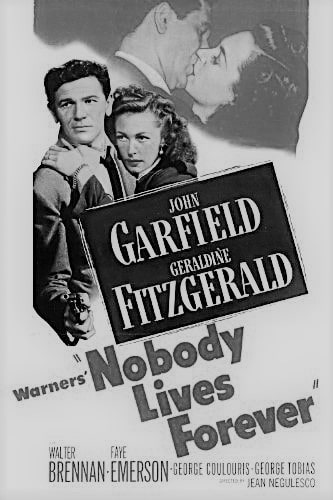 NOBODY LIVES FOREVER (1946)
NOBODY LIVES FOREVER (1946) (100 Min.) Genre: 1940 SUSPENSE, Transfer Quality: A
In this film noir with romantic overtones, con man and cardsharp Nick Blake (John Garfield) returns home after serving in WWII to discover that a rival syndicate now controls New York's gambling rackets — and that his girlfriend Toni (Faye Emerson) has run off with his money. Looking for a fresh start, Nick heads for California, where he becomes reacquainted with Pop Grueber (Walter Brennan), who gave him his start in the underworld. Pop and his boss Doc Ganson (George Coulouris) tip Nick off to a scam they've brainstormed to separate young widow Gladys Halvorsen (Geraldine Fitzgerald) from her recently inherited fortune. Nick's job is to sweet talk Gladys out of her money and then make tracks, but he finds himself falling in love with her and wants out of the deal. Meanwhile, Toni comes back into the picture and tries to convince Doc that Nick is trying to cheat him, leading to a kidnapping. Incidentally, John Garfield won the leading role in Nobody Lives Forever after Humphrey Bogart turned it down. — Mark Deming
Starring: John Garfield, Walter Brennan, Geraldine Fitzgerald, Faye Emerson, George Coulouris | Directed by: Jean Negulesco
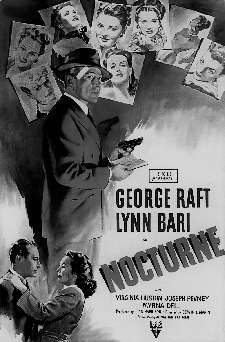 NOCTURNE (1946)
NOCTURNE (1946) (87 Min.) Genre: 1940 SUSPENSE, Transfer Quality: A
The moody mystery melodrama Nocturne was produced by longtime Alfred Hitchcock associate Joan Harrison. The film wastes no time getting started, with a caddish Hollywood composer (Edward Ashley) dropping dead right after the opening credits. The police think it's a suicide, but maverick lieutenent Joe Warne (George Raft) suspects foul play. Checking around, Warne discovers that the dead man had broken at least ten female hearts in the past few years, providing a motive for murder for all ten. The principal suspect is Frances Ransom (Lynn Bari), who may or may not have been avenging her sister, nightclub thrush Carol Page (Virginia Huston). Pursuing the case with such dogged diligence that he's eventually tossed off the police force, Warne nonetheless refuses to give up, and by film's end he has collared the murderer. It wouldn't be fair to reveal the killer's identity, except to note that the actor in question went on to quite a different career at Universal Pictures. Like the previous RKO George Raft vehicle Johnny Angel, Nocturne was a box-office bonanza, posting a then-impressive profit of $568,000. — Hal Erickson
Starring: George Raft, Lynn Bari, Virginia Huston, Joseph Pevney | Directed by: Edwin L. Marin
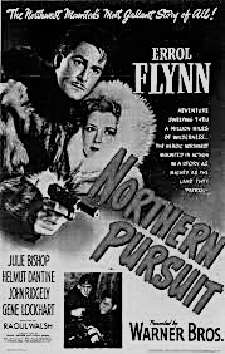 NORTHERN PURSUIT (1943)
NORTHERN PURSUIT (1943) (94 Min.) Genre: 1940 SUSPENSE, Transfer Quality: A
The fact that star Errol Flynn had been recently embroiled in a real-life rape trial only served to increase the box-office "pull" of Warner Bros. Northern Pursuit. Flynn is cast as Canadian mountie Steve Wagner, assigned to track down and capture downed Nazi pilot Hugo von Keller (Helmut Dantine) in the snowier Hudson Bay regions. Once Wagner and fellow mountie Jim Austin (John Ridgely) catch up with Von Keller, they pretend to be on his side, hoping that he'll reveal his espionage plans. Taken in, Von Keller leads the mounties towards a secret Nazi hideaway, where the Germans have hidden a huge bombing plane, to be used against North America. The fact that Wagner is posing as a Nazi sympathizer hardly endears him to Von Keller's hostage Laura McBain (Julie Bishop), but when the truth is revealed she professes her love for him. In the light of Flynn's recent legal problems, one line in Northern Pursuit invariably brought down the house in 1943: After assuring Laura that she's the only woman he's ever loved, Wagner/Flynn turns to the camera and quips "What am I saying?" — Hal Erickson
Starring: Errol Flynn, Julie Bishop, Helmut Dantine, John Ridgely, Gene Lockhart | Directed by: Raoul Walsh
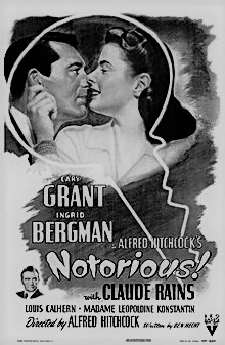 NOTORIOUS (1946)
NOTORIOUS (1946) (101 Min.) Genre: 1940 SUSPENSE, Transfer Quality: A
Though Alfred Hitchcock's Notorious was produced by David Selznick's Vanguard Films, Selznick himself had little to do with the production, which undoubtedly pleased the highly independent Hitchcock. Ingrid Bergman plays Alicia Huberman, who goes to hell in a handbasket after her father, an accused WW2 traitor, commits suicide. American secret agent Devlin (Cary Grant) is ordered to enlist the libidinous Alicia's aid in trapping Alexander Sebastian (Claude Rains), the head of a Brazilian neo-Nazi group. Openly contempuous of Alicia despite her loyalty to the American cause, Devlin calmly instructs her to woo and wed Sebastian, so that that good guys will have an "inside woman" to monitor the Nazi chieftan's activities. It is only after Alicia and Sebastian are married that Devlin admits to himself that he's fallen in love with her. The "maguffin" in this case is a cache of uranium ore, hidden somewhere on Sebastian's estate. Upon discovering that his wife is a spy, Sebastian balks at eliminating her until ordered to do so by his virago of a mother (Madame Konstantin). Tension mounts to a fever pitch as Devlin, a day late and several dollars short, strives to rescue Alicia from Sebastian's homicidal designs. Of the several standout sequences, the film's highlight is an extended love scene between Alicia and Devlin, which manages to ignite the screen while still remaining scrupulously within the edicts of the Production Code. In later years, Hitchcock never tired of relating the story of how he and screenwriter Ben Hecht (who was nominated for an Oscar) fell under the scrutiny of the FBI after electing to use uranium as a plot device-this before the bombing of Hiroshima and Nagasaki. A huge moneymaker for everyone concerned, Notorious remains one of Hitchcock's best espionage melodramas. In 1992, Notorious was remade for cable television; it goes without saying that the original is vastly superior. — Hal Erickson
Starring: Ingrid Bergman, Cary Grant, Claude Rains, Louis Calhern | Directed by: Alfred Hitchcock
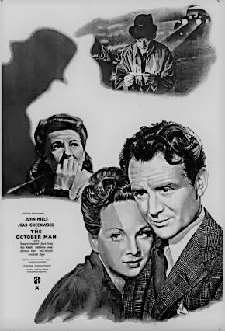 OCTOBER MAN (1948)
OCTOBER MAN (1948) (95 Min.) Genre: 1940 SUSPENSE, Transfer Quality: B
Adapted by Eric Ambler from his own novel, The October Man centers around Jim Ackland (played by John Mills), who has been involved in a terrible accident that killed a friend's daughter and has given Ackland a brain injury. Despondent after his release from the hospital, Ackland moves into a hotel, where he meets Molly Newman (Kay Walsh). Molly has a hard time making ends meet, and must fight off the advances of another man who is willing to pay her rent if she will sleep with him. She asks Ackland to loan her money for the rent; he does, but she is found murdered soon after. Ackland is suspected of committing the deed and, due to his mental problems, he doesn't know if he is innocent. With the help of the kindly Jenny (Joan Greenwood), who believes in him, he sets out to clear his name. The October Man was the directorial debut of Roy Ward Baker, who had been an assistant to Alfred Hitchcock.
Starring: John Mills, Adrianne Allen, Felix Aylmer, Joan Greenwood | Directed by: Roy Ward Baker
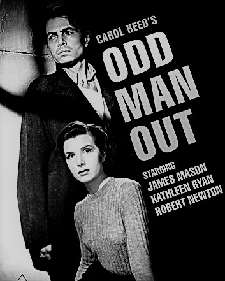 ODD MAN OUT (1947)
ODD MAN OUT (1947) (111 Min.) Genre: 1940 SUSPENSE, Transfer Quality: A
Carol Reed's taut character study (disguised as a suspense melodrama) was adapted from the novel by F.L. Green and stars James Mason in his star-making role as I.R.A. operative Johnny McQueen. Breaking out of jail, Johnny takes it on the lam, but idealism forces him out of hiding in order to raise money for the I.R.A. cause he believes in so strongly. He decides to rob a bank, but the hold-up goes bad and Johnny is seriously wounded by the police. Staggering through the streets of Belfast, Johnny meets a succession of people who either want to help him or turn him over to the authorities. Johnny finally stumbles into a pub, where he is taken in by a homosexual artist (Robert Newton) who wants Johnny to pose for him in order to capture the desperation in his eyes. Johnny breaks free from the artist and tries to make his way to the waterfront in a final effort to escape ... but the police are slowly closing in. — Paul Brenner
Starring: James Mason, Robert Newton, Fay Compton, Robert Beatty | Directed by: Carol Reed
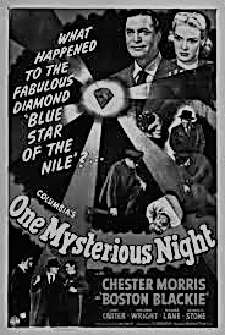 ONE MYSTERIOUS NIGHT (1944)
ONE MYSTERIOUS NIGHT (1944) (61 Min.) Genre: 1940 SUSPENSE, Transfer Quality: B
A nebulously sinister title disguises the fact that this is actually a "Boston Blackie" mystery, the seventh in Columbia's series. Reformed criminal Boston Blackie (Chester Morris) is accused of stealing the Niles diamond from a charity function. The police cut a deal with Blackie: If he'll locate the gem, they'll drop the charges. This time the cops go so far as issuing Blackie a police badge, which he uses with amusing abandon. One Mysterious Night, together with The Chance of a Lifetime (43) and The Phantom Thief (46), was given a non-identifiable title so that Columbia could coerce non-"Boston Blackie" fans into the theatre. — Hal Erickson
Starring: Chester Morris, Richard Lane, Janis Carter, William Wright | Directed by: Budd Boetticher
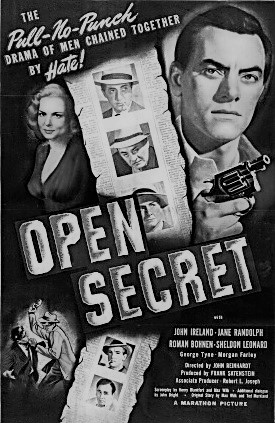 OPEN SECRET (1948)
OPEN SECRET (1948) (70 Min.) Genre: 1940 SUSPENSE, Transfer Quality: B
Photographer Paul Lester (John Ireland) and his wife, Nancy (Jane Randolph), are invited to share an apartment with Paul's ex-army buddy Ed Stevens. They arrive to find Stevens gone, and a mysterious phone call gets Paul to the other end of town. While he's away, Nancy is assaulted by a would-be burglar. Paul thinks there's something more going on than a missing persons case or a burglary and tries to interest Detective Frontelli (Sheldon Leonard) of the police department in looking into it, but Frontelli is initially skeptical. When Stevens turns up under the wheels of a truck along with evidence tying him to an earlier hit-and-run murder, Paul is certain that there's some kind of organized conspiracy afoot. What he finds is a town slowly coming under siege from a secret band of anti-Semitic thugs masquerading as a patriotic organization, with whom Stevens had been involved and tried to quit. Paul and Nancy's situation goes from bad to dangerous when they accidentally stumble upon evidence that could hang the murderers.
Starring: John Ireland, Jane Randolph, Roman Bohnen, Sheldon Leonard, George Tyne, Arthur O'Connell, King Donovan | Directed by: John Reinhardt
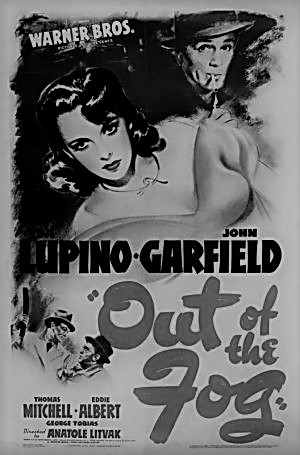 OUT OF THE FOG (1941)
OUT OF THE FOG (1941) (86 Min.) Genre: 1940 SUSPENSE, Transfer Quality: A
Out of the Fog is the film version of the Irwin Shaw play The Gentle People, refashioned to mollify the Hollywood censors by expert wordsmiths Robert Rossen, Jerry Wald and Richard Macaulay. Humphrey Bogart lobbied strenuously to play the leading role of charming but ruthless waterfront loan shark Harold Goff, but in the end Warners chose the more "bankable" John Garfield. The terror of Sheepshead Bay in Brooklyn, Goff is able to extort $5 per week from people like tailor Jonah Goodwin (Thomas Mitchell) and short-order cook Olaf Johnson (John Qualen), knowing full well that his victims are too good-hearted to fight back. Making matters worse for Goodwin is the fact that his restless daughter Stella (Ida Lupino), seeking to escape her humdrum existence, has fallen in love with the fascinating Goff, leaving her mild-mannered sweetheart George Watkins (Eddie Albert) in the cold. The Irwin Shaw play was a symbolic plea for a united front against European fascism, suggesting that the only way that dictatorial bullies like Goff can be destroyed is for good men to forget such edicts as "turn the other cheek" and "love thy neighbors". Originally, The Gentle People ended with Jonah and Olaf, pushed to the brink when Goff seduces Stella and then demands all their money, conspiring to murder the villain-and getting away with it. Hollywood's Hays Office, however, would never approve of an unpunished murder, no matter what the justification, so the screenplay contrives to have Goff killed by accident. This still doesn't resolve the moral guilt suffered by the two elderly conspirators, so the screenplay takes several dizzying twists and turns before it can arrive at a censor-proof happy ending. Atmospherically photographed by James Wong Howe, Out of the Fog was "film noir" before the term was even invented. — Hal Erickson
Starring: Ida Lupino, John Garfield, Thomas Mitchell, Eddie Albert | Directed by: Anatole Litvak
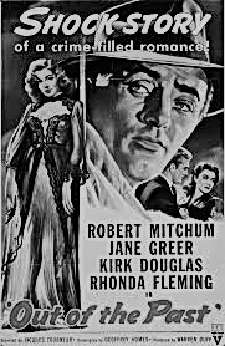 OUT OF THE PAST (1947)
OUT OF THE PAST (1947) (97 Min.) Genre: 1940 SUSPENSE, Transfer Quality: A
Out of the Past is so perfect a film noir that it is consideredpractically a textbook example of the genre. In his first starring role (it had previously been offered to John Garfield and Dick Powell), Robert Mitchum plays Jeff Bailey, the friendly but secretive proprietor of a mountain-village gas station. As Jeff's worshipful deaf-mute attendant (Dick Moore) looks on in curious fascination, an unsavory character named Joe (Paul Valentine) pulls up to the station, obviously looking for the owner. Jeff is all too aware of Joe's identity; he's been dreading this moment for quite some time, knowing full well that it will mean the end of his semi-idyllic existence, not to mention his engagement to local girl Ann (Virginia Huston). In a lengthy flashback, the audience is apprised of the reasons behind Jeff's discomfort. Several years earlier, he'd been a private detective, hired by gangster Whit Sterling (Kirk Douglas) to find his mistress Kathie Moffett (Jane Greer), who shot him and ran off with $40,000. Jeff traces Kathie to Mexico, but when he meets her he falls in love and willingly becomes involved in an increasingly complicated web of double-crosses, blackmail, and murder. The flashback over, Jeff agrees to meet Whit face to face in Lake Tahoe. Surprisingly, Whit apparently bears no malice, and even offers Jeff an opportunity to square himself by retrieving Whit's tax records from mob attorney Eels (Ken Niles). Even more surprisingly, Kathie has returned to Whit on her own volition. When Jeff is taken to Eels' apartment by the beautiful Meta Carson (Rhonda Fleming), he quickly figures out that he has been set up and tries to clue Eels into the plot, but Eels is later found murdered, and Jeff is accused of the crime. Worse yet, Whit has forced Kathie to sign an affadavit that also pins another murder on him. Crosses, double-crosses and triple-crosses abound for the next few reels, culminating in disaster for the oh-so-clever Whit, who has fatally underestimated the deceitful Kathie. When, in an earlier scene, Jeff described Kathie as "a bit cold around the heart," he knew whereof he spoke. And in the end, it is Jeff who must resort to drastic measures to force Kathie to pay the price for her cold-hearted treachery.
Starring: Robert Mitchum, Jane Greer, Kirk Douglas, Rhonda Fleming | Directed by: Jacques Tourneur
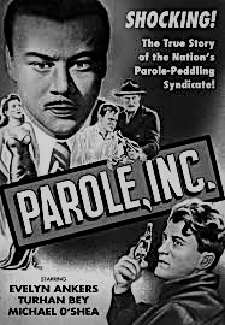 PAROLE, INC. (1949)
PAROLE, INC. (1949) (71 Min.) Genre: 1940 SUSPENSE, Transfer Quality: B
Government agent Richard Hendricks (Michael O'Shea) goes undercover to get goods on a gang responsible for dispensing illegal paroles. Posing as a prisoner, Hendricks links up with the gang's inside man, Barney Rodescu (Turhan Bey). As often happens in real life, several pillars of society are getting rich by manipulating the lives of others. The plot is not always logical, but audience involvement is sustained every step of the way. Parole Inc was one of the "in-between" pictures -- not quite a "B", not expensive enough for "A" -- produced by young-and-hungry Eagle Lion studios in the late 1940s.
Starring: Michael O'Shea, Turhan Bey, Virginia Lindley, Lyle Talbot, Evelyn Ankers | Directed by: Alfred Zeisler
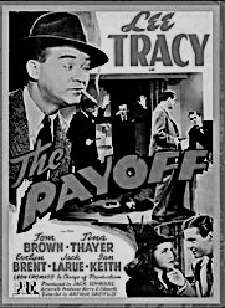 PAYOFF, THE (1943)
PAYOFF, THE (1943) (74 Min.) Genre: 1940 SUSPENSE, Transfer Quality: B
Lee Tracy once more plays a fast-talking, slightly amoral newspaper reporter in PRC's The Payoff. Tracy is cast as Brad McKay, who at present is investigating the murder of a special prosecutor. The dead man was on the verge of delivering damning evidence against racket boss John Angus (Jack LaRue), and it looks as though the killing was an "inside job", committed by one of the victim's associates. Aiding and abetting McKay are cub reporter Guy Morris (Tom Brown), the publisher's son; Phyllis Walker (Tina Thayer), daughter of the murdered man; and Alma Dorene (Evelyn Brent), a femme fatale who is Not What She Seems. Way, way down on the cast list is Pat Costello, the brother of comedian Lou Costello.
Starring: Lee Tracy, Tom Brown, Tina Thayer, Evelyn Brent, Jack LaRue | Directed by: Arthur Dreifuss
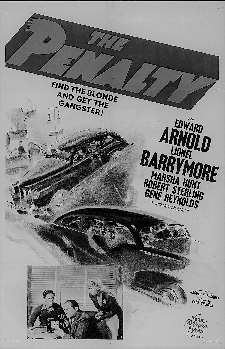 PENALTY, THE (1941)
PENALTY, THE (1941) (79 Min.) Genre: 1940 SUSPENSE, Transfer Quality: A
In this crime drama, a ruthless gangster's son is soon following in his father's footsteps. When his daddy kills an FBI agent and a cabby, the boy sees it all. Fortunately the courts intervene and send the lad off to live with a family of farmers. Country living agrees with the boy and soon with the family's loving support is completely reformed. When his father reappears to bring him home, the boy uses a gun to chase him off the property. — Sandra Brennan
Starring: Edward Arnold, Lionel Barrymore, Marsha Hunt, Robert Sterling | Directed by: Harold S. Bucquet
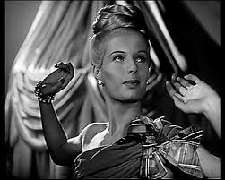 PENNY AND THE POWNALL CASE (1948)
PENNY AND THE POWNALL CASE (1948) (47 Min.) Genre: 1940 SUSPENSE, Transfer Quality: B
An artist's model, with aspirations to be an amateur detective, helps a Scotland Yard detective break a gang helping Nazi war criminals escape from Europe.
Starring: Christopher Lee, Dennis Vance, Diana Dors, Ethel Coleridge | Directed by: Slim Hand
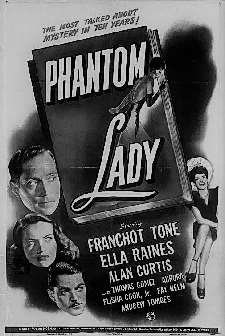 PHANTOM LADY (1944)
PHANTOM LADY (1944) (87 Min.) Genre: 1940 SUSPENSE, Transfer Quality: A
Engineer Scott Henderson (Alan Curtis) is at a seedy midtown Manhattan bar early one evening, drowning his sorrows over a failed marriage, when he strikes up a conversation with a woman (Fay Helm). She's well dressed, with a very ornate hat topping off her ensemble, and also seems even sadder and more lost than he is. Henderson persuades her to join him in taking advantage of the two theater tickets he has. They attend the show — a song-and-dance showcase by a Brazilian artist (Aurora) — and then part company without ever exchanging names. He returns home to find three detectives in his apartment and his wife strangled. Inspector Burgess (Thomas Gomez) questions Henderson and tries to verify his alibi, but no one — not the bartender, the cabbie who hauled them to the theater, or the drummer in the band who was watching her — admits to remembering the woman. Henderson can't prove that he was elsewhere when his wife was strangled and is convicted of murder and sentenced to death. His assistant, Carol Richman (Ella Raines), who has watched all of this happen, can't sit by while Scott is destroyed, and decides to get at the truth, joined by Inspector Burgess, who now believes Henderson to be innocent. Carol hounds the bartender (Andrew Tombes) until he seems ready to crack, but before he talks, he tries to get away from her and dies in an accident. The drummer, Cliff Milburn (Elisha Cook Jr.), proves more talkative and reveals that someone paid him 500 dollars to forget about the woman, but before Burgess can question him, he's strangled. It seems as though there's no hope left, even with the added help of Jack Marlow (Franchot Tone), Scott's best friend, newly returned from Brazil, when Carol gets a line on the unusual hat the woman was wearing. She traces the hat to its owner in a mansion on Long Island, where she is recovering from a breakdown over the death of her fiancé — that was her trouble on the night she crossed paths with Scott Henderson. It is only on returning to New York, while awaiting Burgess' arrival, that she realizes that Jack Marlow is the murderer — that he returned after having dinner with them, following their fight, and strangled Henderson's wife; paid off the bartender, the cab driver, and Cliff Milburn to keep them from revealing the existence of the woman that Scott was with; and killed Milburn to prevent him from talking; and he plans to kill Carol before she can talk to Burgess. — Bruce Eder
Starring: Franchot Tone, Ella Raines, Alan Curtis, Elisha Cook, Jr., Thomas Gomez | Directed by: Robert Siodmak
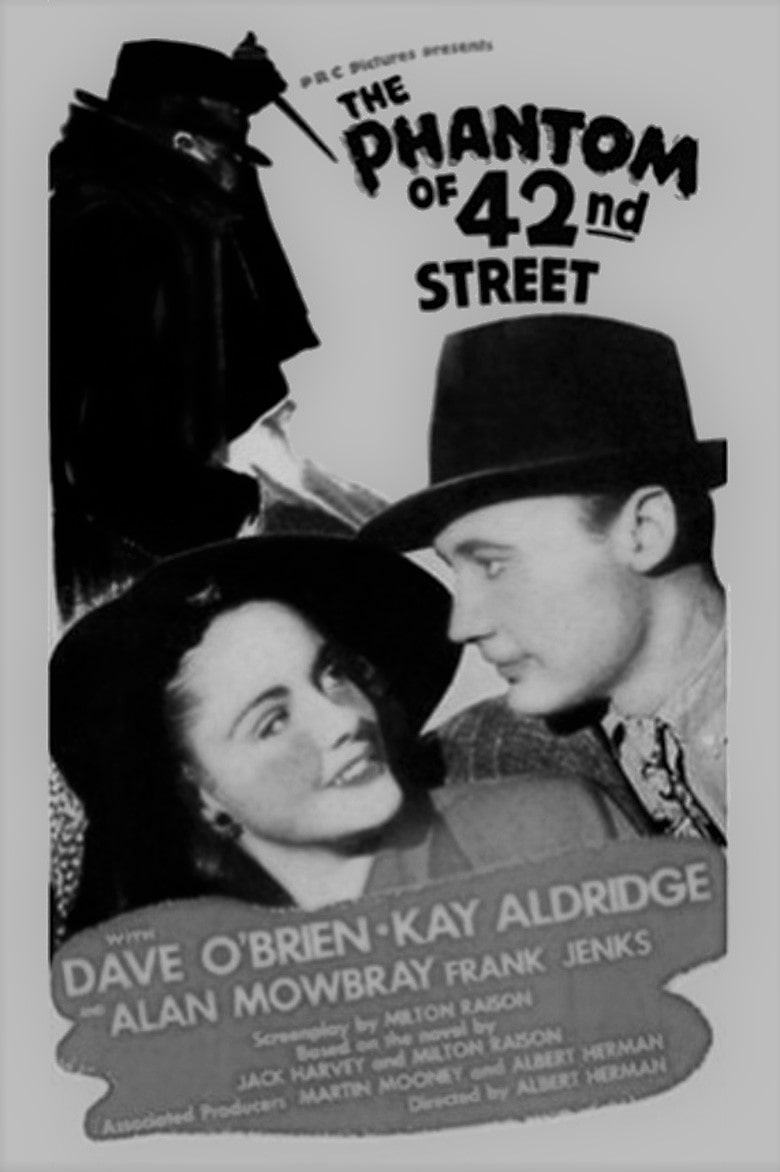 PHANTOM OF 42ND STREET, THE (1945)
PHANTOM OF 42ND STREET, THE (1945) (58 Min.) Genre: 1940 SUSPENSE, Transfer Quality: B
A policeman teams up with a drama critic to solve a mystery in this drama. They look into a case involving a wealthy, famous uncle who is killed backstage. His death destroys the Broadway debut of the uncle's niece whose father, also a very popular actor, becomes the prime suspect as the recently bankrupt fellow was in line to inherit the uncle's fortune. It is a complex case, but somehow the critic and the cop are able to sort through it all and reveal that the killer's identity.
Starring: Dave O'Brien, Kay Aldridge, Frank Jenks, Alan Mowbray | Directed by: Albert Herman
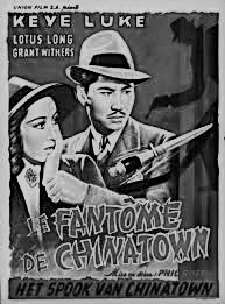 PHANTOM OF CHINATOWN (1940)
PHANTOM OF CHINATOWN (1940) (61 Min.) Genre: 1940 SUSPENSE, Transfer Quality: A
In the last of Monogram's "Mr. Wong" whodunits, Keye Luke takes over from Boris Karloff as the Chinese detective Jimmy Lee Wong, more of an amateur sleuth, really, than his eminent predecessor. The subject for Wong's examination is the poisoning of Dr. Benton (Charles F. Miller), the leader of an expedition to Mongolia and the possessor of a mysterious and seemingly deadly scroll. With Captain Street (Grant Withers) and the dead man's Chinese secretary (Lotus Long alternately aiding and obstructing the investigation, Wong gets to the bottom of things within the expected 68 minutes or so by using himself as a decoy. — Hans J. Wollstein
Starring: Keye Luke, Lotus Long, Grant Withers, Paul McVey | Directed by: Phil Rosen
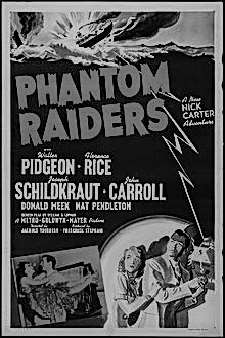 PHANTOM RAIDERS (1940)
PHANTOM RAIDERS (1940) (70 Min.) Genre: 1940 SUSPENSE, Transfer Quality: A
The second entry in MGM's three-film "Nick Carter" series, Phantom Raiders is undeniably the best, and not just by default. In this one, super-sleuth Nick Carter (Walter Pidgeon) arrives in Panama to investigate the destruction of several Allied supply vessels. It's going to be an uphill battle for our hero, who must not only defeat erudite saboteur Al Taurez (Joseph Schildkraut) but also the villain's dumb but deadly henchman Gunboat Jackson (Nat Pendleton). The film builds up skillfully to an exciting conclusion, in which Carter corners the bad guys on a ship doomed for extinction. Donald Meek provides a few laughs as Nick's overenthusiastic assistant Bartholomew the Bee Keeper, who in the film's best scene convinces the heavies that he's a homicidal maniac!
Starring: Walter Pidgeon, Joseph Schildkraut, Donald Meek, Nat Pendleton | Directed by: Jacques Tourneur
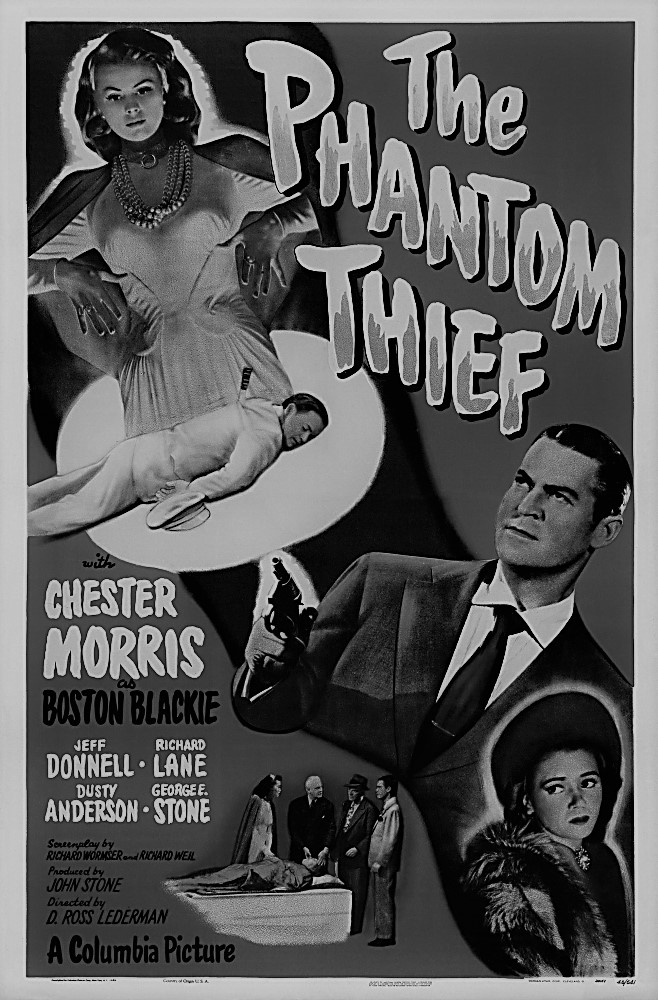 PHANTOM THIEF, THE (1946)
PHANTOM THIEF, THE (1946) (65 Min.) Genre: 1940 SUSPENSE, Transfer Quality: B
Boston Blackie is back and in hot pursuit of a jewel thief and killer in this mystery. The reformed thief soon tracks the thief to the domicile of a suspicious spiritualist. — Sandra Brennan
Starring: Chester Morris, Marvin Miller, George Magrill, George E. Stone | Directed by: David Ross Lederman
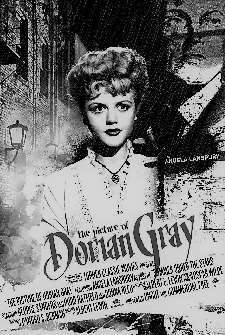 PICTURE OF DORIAN GRAY, THE (1945)
PICTURE OF DORIAN GRAY, THE (1945) (110 Min.) Genre: 1940 SUSPENSE, Transfer Quality: A
The Picture of Dorian Gray was writer/director Albert E. Lewin's fascinating follow-up to his expressive-esoterica masterpiece The Moon and Sixpence. Hurd Hatfield essays the title character, a London aristocrat who would sell his soul to remain handsome and young—and, in a manner of speaking, he does just that. Under the influence of his decadent (albeit witty) friend Lord Henry Wotton (George Sanders), Dorian Gray becomes the embodiment of virtually every sin known to man. The greatest of his sins is vanity: Gray commissions artist Basil Hallward (Lowell Gilmore) to paint his portrait. Admiring his own painted countenance, Gray silently makes a demonic pact. The years pass: everyone grows older but Gray, who seemingly gets younger and more good-looking every day. Hallward eventually stumbles upon the secret of Dorian's eternal youth: he finds his painting hidden in the attic, the portrait's face grown grotesquely aged and disfigured. Gray kills Hallward so that his secret will remain safe. Later on, Gray falls in love with Hallward's niece Gladys (Donna Reed). Certain that Gray is responsible for Hallward's death, Gladys' ex-boyfriend David Stone (Peter Lawford) sets out to prove it. He is joined in this mission by the brother of dance hall performer Sybil Vane (Angela Lansbury), who killed herself after Gray betrayed her. Essentially a black and white film, Picture of Dorian Gray bursts into Technicolor whenever the picture is shown in close-up. — Hal Erickson
Starring: George Sanders, Hurd Hatfield, Angela Landsbury, Donna Reed | Directed by: Albert Lewin
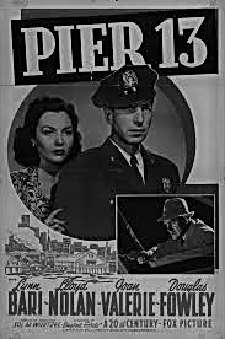 PIER 13 (1940)
PIER 13 (1940) (66 Min.) Genre: 1940 SUSPENSE, Transfer Quality: B
Pier 13 is a remake of the delightful Spencer Tracy-Joan Bennett vehicle Me and My Gal, which itself was a reworking of a 1922 silent picture. Wisecracking cop Danny Dolan (Lloyd Nolan) takes a liking to self-reliant waterfront waitress Sally Kelly (Lynn Bari), and the feeling is definitely mutual. But when Sally begins behaving strangely, Dolan suspects that she's mixed up with notorious criminal Johnnie Hale (Douglas Fowley). In fact, Sally is merely covering up for her flighty sister Helen (Joan Valerie), who has foolishly fallen for Hale and has become deeply involved in the latter's underhanded activities. Things come to a head during a nocturnal warehouse robbery, with Dolan and Hale settling their differences face to face.
Starring: Lynn Bari, Lloyd Nolan, Joan Valerie, Douglas Fowley, Chick Chandler | Directed by: Eugene J. Forde
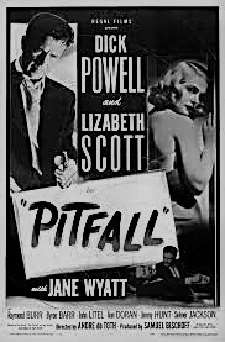 PITFALL (1948)
PITFALL (1948) (85 Min.) Genre: 1940 SUSPENSE, Transfer Quality: A
The darker side of The American Dream is explored in the fascinating film noir Pitfall. Dick Powell stars as John Forbes, a successful insurance man with a trophy wife named Sue (Jane Wyatt) and a model child named Tommy (Jimmy Hunt). Despite all that he's achieved in life, Forbes feels somehow unfulfilled. Thus it is that when his glamorous client Mona Stevens (Lizabeth Scott) "comes on" to him, Forbes falls for her like a ton of bricks. After a brief affair, Forbes suffers the pangs of guilt, a fact immediately capitalized upon by Mona's ex-lover, seedy private eye Macdonald (Raymond Burr). If adultery has always been committed, can murder be far behind? Many individual scenes in Pitfall are standouts, notably a brief moment wherein Forbes' son Tommy suffers a horrible nightmare-in almost exactly the same manner that child actor Jimmy Hunt would endure a similar bad dream in 1953's Invaders from Mars! Like many of the best noir efforts of the 1940s, Pitfall (based on a novel by Jay Dratler) is told in flashback, as John Forbes spills his guts to his disillusioned spouse. — Hal Erickson
Starring: Dick Powell, Lizabeth Scott, Jane Wyatt, Raymond Burr | Directed by: André De Toth
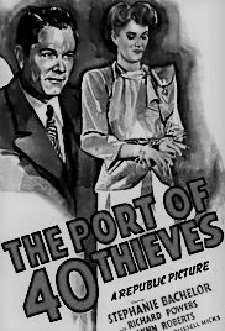 PORT OF FORTY THIEVES, THE (1944)
PORT OF FORTY THIEVES, THE (1944) (58 Min.) Genre: 1940 SUSPENSE, Transfer Quality: B
Port of 40 Thieves is a so-so suspenser completely dominated by the formidable Stephanie Bachelor. The statuesque, sophisticated Republic leading lady is cast as Muriel, the scheming widow of the fabulously wealthy Hartford Chaney 3rd. Muriel's husband has disappearance under mysterious circumstances, freeing her to marry her playboy paramour Frederick St. Clair (George Meeker). Nancy Hubbard (Lynne Roberts), Chaney's daughter from a previous marriage, suspects that her father has been murdered, compelling Muriel to plot and plan a few convenient accidents-including the death of the now-dispensable St. Clair. The film's most memorable scene finds Muriel diligently studying a technical manual so that she can sabotage an elevator!
Starring: Stephanie Bachelor, Lynne Roberts, Russell Hicks, George Meeker | Directed by: Jon English
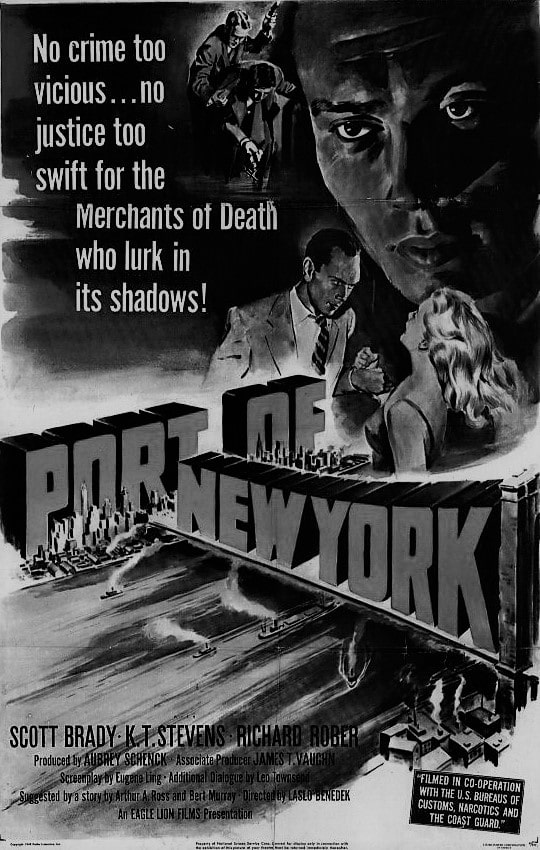 PORT OF NEW YORK (1949)
PORT OF NEW YORK (1949) (79 Min.) Genre: 1940 SUSPENSE, Transfer Quality: B
The location-filmed Port of New York might have been forgotten had it not been for one of its leading players. In his first film role, Yul Brynner plays an erudite narcotics smuggler named Paul Vicola. Using a phony yacht club as a front, Vicola conducts a brisk drug trade, making certain that no one will blow the whistle on his operation by casually murdering his couriers. Detectives Walters (Scott Brady) and Flannery (Richard Rober) infiltrate Vicola's gang; one of the cops is killed, but the other manages to see that justice is done. Yul Brynner was so obscure at the time of Port of New York (his only significant credit was Broadway's Lute Song) that one reviewer referred to him as "Yul Brunner."
Starring: Yul Brynner, Scott Brady, K.T. Stevens, Richard Rober, Neville Brand | Directed by: Laslo Benedek
(113 Min.) Genre: 1940 SUSPENSE, Transfer Quality: A
James M. Cain's novel received its first authorized screen treatment in this MGM production. Drifter Frank Chambers (John Garfield) takes a job at a roadhouse run by slovenly but likeable Nick Smith (Cecil Kellaway). Nick's sexy young wife Cora (Lana Turner) takes an immediate liking to Frank, but he senses that she's trouble and he keeps his distance—for a while, anyway. Inevitably succumbing to Cora's tawdry charms, Frank enters into her scheme to murder Nick and claim the old boy's insurance money. Not long after committing the foul deed, Frank and Cora are arrested. Thanks to the conniving of slimy attorney Arthur Keats (Hume Cronyn), the illicit lovers are able to beat the murder rap—but, as the film's title symbolically indicates, they eventually pay for their misdeeds in an unexpected manner. Fans of the James M. Cain original—not to mention Cain himself—were aghast at the changes made in the novel by screenwriters Harry Ruskin and Niven Busch; many of the alterations were made to conform with censorship standards of the era, while others simply existed to massage the egos of the stars. Even so, the 1946 version of The Postman Always Rings Twice is infinitely more satisfying than the no-holds-barred 1981 remake, directed by Bob Rafelson with Jack Nicholson and Jessica Lange. — Hal Erickson
Starring: Lana Turner, John Garfield, Cecil Kellaway, Hume Cronyn, Audrey Totter | Directed by: Tay Garnett
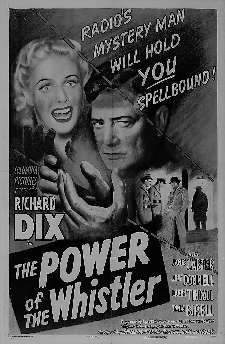 POWER OF THE WHISTLER, THE (1945)
POWER OF THE WHISTLER, THE (1945) (66 Min.) Genre: 1940 SUSPENSE, Transfer Quality: B
The third of Columbia's "Whistler" series, Power of the Whistler once more stars Richard Dix as the tortured protagonist. This time, Dix is cast as an amnesiac named William Everett, who is given aid and comfort by pretty Jean Lang (Janis Carter). Assuming that Everett has been victimized by someone, Jean tries to help him regain his memory. This proves to be a major mistake, which Jean's sister Frances (Jeff Donnell) discovers to her horror. Though it was fascinating to see Richard Dix in an off-the-beaten-track role, Power of the Whistler isn't up to the standard set by the first two "Whistler" films: even so, the climax, staged in the loft of a deserted barn, is a beaut.
Starring: Richard Dix, Janis Carter, Jeff Donnell, Loren Tindall | Directed by: Lew Landers
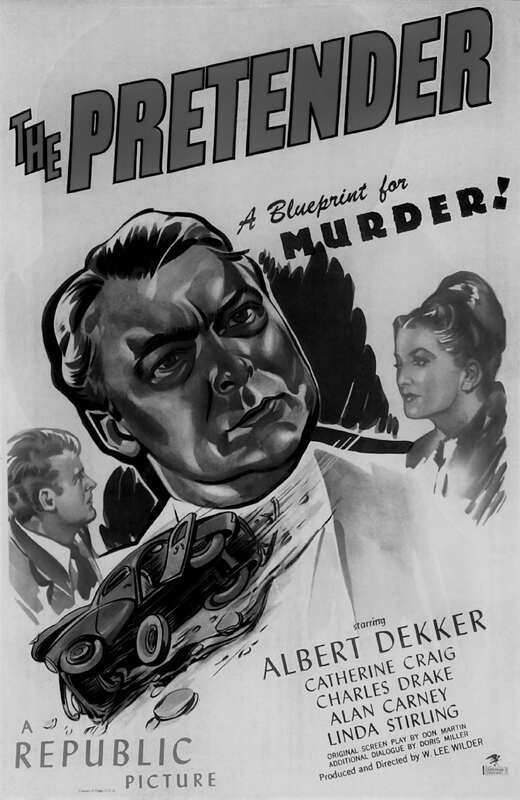 PRETENDER, THE (1947)
PRETENDER, THE (1947) (69 Min.) Genre: 1940 SUSPENSE, Transfer Quality: B
Albert Dekker plays a crooked investment agent who embezzles a large sum from an estate, hoping to cover his crime by marrying the estate's heiress (Catherine Craig). The girl is already engaged, so Dekker arranges to have the fiance killed. The hit man's only means of identifying the victim-to-be is his picture in the society columns. But the girl changes her mind and agrees to marry Dekker--meaning that it is his picture that will appear in the columns, thereby condemning him to death. Desperately trying to contact the hit man, Dekker discovers that the man is dead...but the assassin's successor is still at large. A cheap but tidy "hoist on his own petard" melodrama, The Pretender was produced and directed by W. Lee Wilder, brother of the more famous (and frankly more talented) Billy Wilder.
Starring: Albert Dekker, Ernie S. Adams, Catherine Craig, Charles Drake | Directed by: W. Lee Wilder
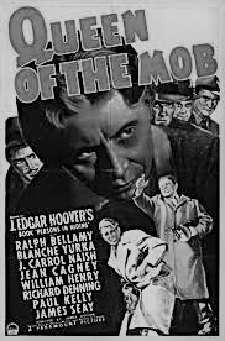 QUEEN OF THE MOB (1940)
QUEEN OF THE MOB (1940) (61 Min.) Genre: 1940 SUSPENSE, Transfer Quality: B
Though the title character is loosely based on that of the notorious killer/robber Ma Barker, she has been sanitized and prettified to meet the perceived conservative values of Hollywood movie audiences. Unlike Barker, who was bad to the bone, Ma Webster is simply a matriarch who would do anything for her three crazy sons, even assisting them with thieving and kidnapping. Their exploits land the nefarious family on the FBI's "most wanted" list and cause the agency to send out their very best man to find them.
Starring: Ralph Bellamy, Blanche Yurka, J. Carrol Naish, William Henry | Directed by: James Hogan
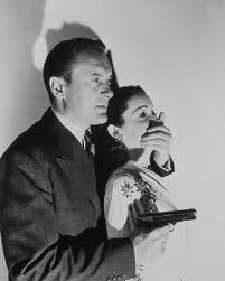 QUIET PLEASE, MURDER (1942)
QUIET PLEASE, MURDER (1942) (70 Min.) Genre: 1940 SUSPENSE, Transfer Quality: C(LOW SOUND)
A public library at night is the setting for this fast-moving crime caper. George Sanders is a gentleman crook specializing in selling forgeries of rare books. In the company of phony policemen, Sanders enters the library unmolested and pilfers a priceless Shakespeare folio in order to expedite his operation. The criminal's girl friend/accomplice Gail Patrick is willing to go along with the crime until Sanders begins displaying a homicidal streak. She calls in a detective (Richard Denning) to foil the criminal. A murder or two later, Sanders is tracked down amidst the dark, forbidding library shelves. It's no small trick to make a library exciting, but Quiet Please, Murder pulls this off with speed and economy. — Hal Erickson
Starring: George Sanders, Gail Patrick, Richard Denning, Sidney Blackmer | Directed by: John Larkin
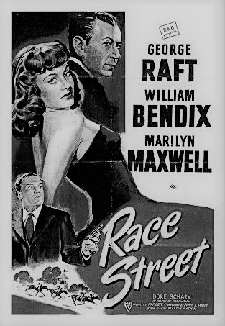 RACE STREET (1949)
RACE STREET (1949) (79 Min.) Genre: 1940 SUSPENSE, Transfer Quality: A
In this dark crime drama, the trouble begins when a San Francisco bookie attempts to lead an honest life by marrying a comely widow. In preparation for his nuptials, the fellow stays on the straight and narrow, but when he learns that one of his cohorts has been murdered by an East Coast gang that is trying to horn in on West Coast territory, he reenters the underworld. A boyhood friend who became a cop tries to convince him to team up with the police, but the vengeful bookie remains determined to things his way. It proves to be a tragic mistake and shows the bookie that those closest to him are not what they seem. — Sandra Brennan
Starring: George Raft, Willian Bendix, Marilyn Maxwell, Frank Faylen | Directed by: Edwin Marin
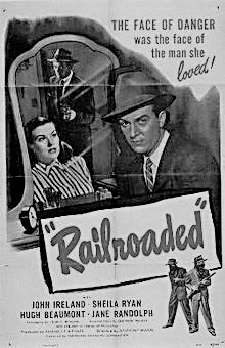 RAILROADED! (1947)
RAILROADED! (1947) (72 Min.) Genre: 1940 SUSPENSE, Transfer Quality: A
One of director Anthony Mann's earlier films, Railroaded features John Ireland as Duke Martin, a seedy criminal looking to skim off of his boss' money. Instead of making the extra cash by his usual means—a small gambling operation run by beautician Clara Cahhoun (Jane Randolph)—Duke (Ireland) chooses instead to hold up the beauty parlor at gunpoint. Things go awry, however, when the cops hear Calhoun's (Randolph) assistant scream in terror. In a spray of gunfire, both a policeman and Martin's partner in crime are killed. Meanwhile, a local delivery boy is accused of killing the police officer. Detective Mike Ferguson (Hugh Beaumont) is assigned to the case, and quickly begins to butt heads with Duke, who he realizes from the start is up to no good.
Starring: John Ireland, Sheila Ryan, Hugh Beaumont, Jane Randolph | Directed by: Anthony Mann
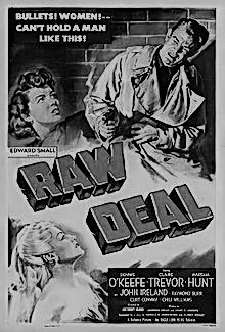 RAW DEAL (1948)
RAW DEAL (1948) (89 Min.) Genre: 1940 SUSPENSE, Transfer Quality: A
Violent and viscerally sexual, Anthony Mann's muscular low-budget noir tells the tale of a framed gangster's quest for vengeance after he busts out of prison. Once freed, gangster Joe Sullivan Dennis O'Keefe) and his girl friend Pat (Claire Trevor) set off to find the mobster who set him up. The kidnapping of Ann Martin (Marsha Hunt), the social worker who wrote to Joe in prison, leads the fugitive into a romantic triangle of death, passion and tragedy. — Sandra Brennan
Starring: Dennis O'Keefe, Claire Trevor, Marsha Hunt, John Ireland, Raymond Burr | Directed by: Anthony Mann
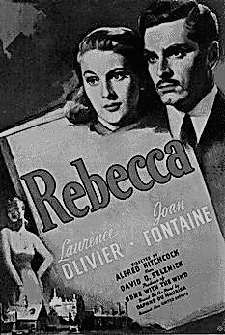 REBECCA (1940)
REBECCA (1940) (130 Min.) Genre: 1940 SUSPENSE, Transfer Quality: A
Based on the novel by Daphne du Maurier, the classic psychological thriller Rebecca was Alfred Hitchcock's first American film. Joan Fontaine plays the unnamed narrator, a young woman who works as a companion to the well-to-do Mrs. Van Hopper (Florence Bates). She meets the wealthy widower Maxim de Winter (Laurence Olivier) in Monte Carlo, where they fall in love and get married. Maxim takes his new bride to Manderlay, a large country estate in Cornwall. However, the mansion's many servants refuse to accept her as the new lady of the house. They seem to be loyal to Maxim's first wife, Rebecca, who died under mysterious circumstances. Particularly cruel to her is the prim housekeeper Mrs. Danvers (Judith Anderson), who is obsessed with Rebecca. She continually attests to her beauty and virtues (referring to her as "the real Mrs. de Winter") and even preserves her former bedroom as a shrine. The new Mrs. de Winter is nearly driven to madness as she begins to doubt her relationship with her husband and the presence of Rebecca starts to haunt her. Eventually, an investigation leads to the revelation about Rebecca's true nature. Producer David O. Selznick had the final cut of the picture, which was drastically altered from Hitchcock's original vision. — Andrea LeVasseur
Starring: Laurence Olivier, Joan Fontaine, George Sanders, Judith Anderson | Directed by: Alfred Hitchcock
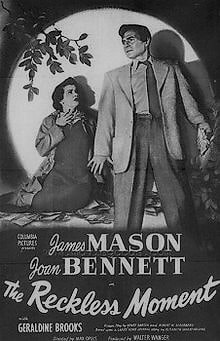 RECKLESS MOMENT, THE (1949)
RECKLESS MOMENT, THE (1949) (82 Min.) Genre: 1940 SUSPENSE, Transfer Quality: B
A blend of melodrama and film noir, The Reckless Moment stars Joan Bennett as Lucia Harper, a suburban housewife whose husband is away on business. Her daughter, Bea (Geraldine Brooks), an aspiring artist, has fallen for Ted Darby (Shepperd Strudwick), a shady older man from Los Angeles who claims to be an ex-art dealer. One night, after a secret rendezvous in the Harpers' boathouse that turns into an argument, Bea accidentally kills Darby. When Lucia discovers his body in the morning, she panics and dumps it in the lagoon instead of contacting the police, who would surely charge her daughter with murder. Her problems only increase when a suave Irish gangster named Donnelly (James Mason) shows up with a package of love letters from Bea to Darby, and blackmail on his mind. With her husband out of town, Lucia has no choice but to give in to his demands, and brings him along on a desperate quest to raise the money that takes them from bank to loan office to pawn shop. Along the way, Donnelly seems to develop sympathy -- even affection -- for her. When his boss shows up to pressure him into finishing the job, Donnelly's surprising decision sets up the film's startling climax. The Reckless Moment was remade in 2001 by Scott McGehee and David Seigel as The Deep End.
Starring: James Mason, Joan Bennett, Geraldine Brooks, David Bair | Directed by: Max Ophüls
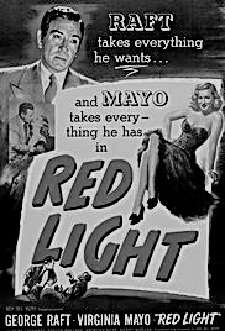 RED LIGHT (1949)
RED LIGHT (1949) (83 Min.) Genre: 1940 SUSPENSE, Transfer Quality: B
Infused with religious themes, this crime drama is considered a minor example of film noir. Set in Los Angeles, it tells the grim story of vengeful embezzler Nick Cherney, who plots murderous revenge after he is fired from Johnny Torno's freight company. He gets it by killing Johnny's brother Jess, a chaplain who has just returned from the war. Johnny arrives at the hotel room of his brother Jess and finds him dying. Just before Jess expires he tells Johnny that the identity of his killer can be found in his Bible. Though every hotel room has a Bible, the one belonging in his brother's is missing. Though his girl friend, the priest and the police warn against a private investigation, Johnny ignores their advice and goes looking for that Good Book. His girl friend goes along with him. Before they go, they leave Warni Hazard in charge of the freight company. Nick Cherney shows up and takes off after Hazard who flees until finding safety beneath the tires of an enormous trailer. Nick sees him cowering there and in the film's most shocking sequence, coolly kicks one of the jacks holding up the trailer and while Hazard is crushed, Nick calmly takes a drag on his cigarette. Meanwhile, Johnny and his gal finally find the Bible and see that Jess had underlined a couple of verses that seem to suggest that Johnny leave the matter of revenge in God's hands. Johnny pays no heed to the message until the story's grim climax.
Starring: George Raft, Virginia Mayo, Raymond Burr, Gene Lockhart | Directed by: Roy Del Ruth
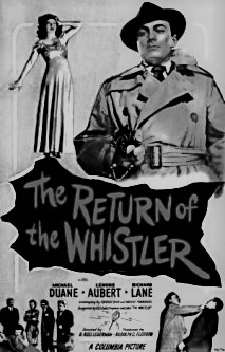 RETURN OF THE WHISTLER, THE (1948)
RETURN OF THE WHISTLER, THE (1948) (63 Min.) Genre: 1940 SUSPENSE, Transfer Quality: A
This final entry in Columbia's "Whistler" series is also the first to dispense with the services of star Richard Dix. This time around, hero Ted Nichols (Michael Duane) tries to ascertain the whereabouts of his wealthy fiancee Alice Barclay (Lenore Aubert). Finally locating the girl in a mental institution, Nichols discovers that she's been placed there at the behest of a man named John (James Cardwell), who claims to be her husband. Private eye Gaylord Travers (Richard Lane) suspects there's more to this than meets the eye-especially when all records pertaining to Alice's previous existence mysteriously vanish. Return of the Whistler was scripted by Cornell Woolrich, who was doing this sort of Alfred Hitchcock stuff long before he ever worked with Hitchcock himself.
Starring: Michael Duane, Ann Doran, Trevor Bardette, Richard Lane | Directed by: David Ross Lederman
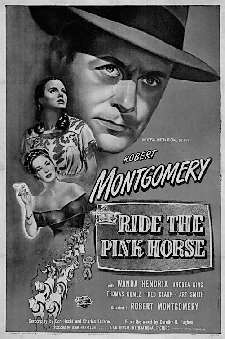 RIDE THE PINK HORSE (1947)
RIDE THE PINK HORSE (1947) (101 Min.) Genre: 1940 SUSPENSE, Transfer Quality: A
Robert Montgomery directed and starred in this exotic film noir set during a New Mexico fiesta. Montgomery plays a secretive ex-GI who plans to extort money from a prominent gangster (Fred Clark) as retribution for the death of Montgomery's best friend. An FBI man (Art Smith) would like the government to get the incriminating information on the gangster that Montgomery is carrying. Trailed by the FBI agent, Montgomery takes refuge at an old carousel, where he meets a Mexican gamin (Wanda Hendrix) who refuses to leave his side. The girl is on hand when the gangster catches up with Montgomery and has him beaten. She nurses Montgomery back to health, but the would-be blackmailer is determined to confront the gangster again. This time, however, the FBI agent comes to the rescue. Ride the Pink Horse is a properly moody melodrama, containing one of the few truly good performances from eternal ingenue Wanda Hendrix. The film was remade for TV in 1964 as The Hanged Man. — Hal Erickson
Starring: Robert Montgomery, Wanda Hendrix, Rita Conde, Thomas Gomez | Directed by: Robert Montgomery
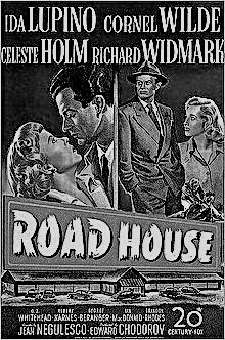 ROAD HOUSE (1948)
ROAD HOUSE (1948) (95 Min.) Genre: 1940 SUSPENSE, Transfer Quality: A
Richard Widmark plays the borderline-psycho owner of a combination road house and bowling alley. Widmark's singer, Ida Lupino, begins exhibiting an interest in his manager, Cornel Wilde. To get even with Wilde, Widmark frames him on a robbery charge, then has the unlucky fellow released in his custody. The sadistic Widmark takes every opportunity to flaunt his control over Conte, but this only serves to deepen the relationship between Wilde and Lupino. - Hal Erickson*** Ida Lupino commissioned the script for this Jean Negulesco noir, and she and Richard Widmark make this otherwise run-of-the-mill feature something of a cult item. Lupino is at her best as the tough, sexy torch singer who Widmark brings in to give some class to his bar/bowling alley stuck incongruously in the middle of deer country. The novel attempt to make the bowling alley an atmospheric environment sounds comic, but between Negulesco's mise-en-scéne and the camera work of Joseph LaShelle, it works better than one would think possible. Widmark is perfect as the psycho-in-the-making, and is so well-matched with Lupino that one wishes they had more scenes together. Wilde, who played a similar role in the noir classic Leave Her to Heaven, always seems to have walked into this genre by accident, and here, as the stolid stud, he's almost comically bored by the women who keep throwing themselves at him. For fans of bowling noir. - Michael Costello
Starring: Ida Lupino, Cornel Wilde, Celeste Holm, Richard Widmark | Directed by: Jean Negulesco
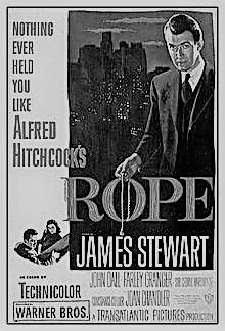 ROPE (1948)
ROPE (1948) (85 Min.) Genre: 1940 SUSPENSE, Transfer Quality: A
Rope, Alfred Hitchcock's first color film, was adapted from Patrick Hamilton's stage play Rope's End by no less than Hume Cronyn. Loosely inspired by the Leopold-Loeb case, the plot concerns two implicitly homosexual college chums, played by Farley Granger and John Dall. Their heads filled with Nietzschean philosophy by their kindly professor James Stewart, Granger and Dall kill a third friend just for the thrill of it. The boys hide the body in an antique chest in the middle of their posh apartment, then perversely arrange to hold a dinner party around the chest, inviting the victim's family, friends and fiancee (Joan Chandler), as well as their intellectual role-model Stewart. As the guests wander obliviously around the sealed chest, the killers make snippy, veiled comments about their deed--never going so far as to reveal the existence of the body nor their involvement in the murder. As all the guests file out, however, professor Stewart begins to suspect that something is amiss. In Rope, Hitchcock attempted the daunting technical challenge of filming the entire picture in one long, seemingly uninterrupted take. Actually, there are several edits in the movie: since a reel of film was divided into two ten-minute minireels back in 1948, the internal reel-breaks are "fudged" by having a dark object briefly obscure the camera lens, sustaining the illusion that no editing has taken place.
Starring: James Stewart, Farley Granger, Cedric Hardwicke, John Dall, Constance Collier | Directed by: Alfred Hitchcock
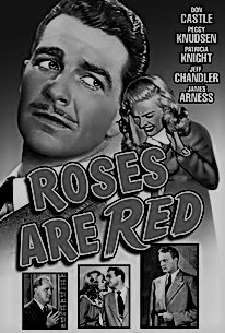 ROSES ARE RED (1947)
ROSES ARE RED (1947) (67 Min.) Genre: 1940 SUSPENSE, Transfer Quality: B
Second-echelon leading man Don Castle (later a TV producer) stars in yet another Sol M. Wurtzel production, Roses Are Red. Kidnapped by political boss Locke (Edward Keane), honest district attorney Throne (Castle) is replaced by his less-than-honest look-alike. Even the DA's intimates are fooled by the substitution, which is only one of the many hard-to-believe contrivances of Irving Elman's screenplay. Before the film's 65 minutes have expended themselves, the real DA escapes -- then pretends to be his look-alike so that he can catch Locke at his own game. Incredibly, the film's two leading ladies -- Peggy Knudsen and Patricia Knight -- more closely resemble one another than the two Don Castles!
Starring: Don Castle, Peggy Knudsen, Patricia Knight, Jeff Chandler, Charles McGraw, James Arness | Directed by: James Tinling
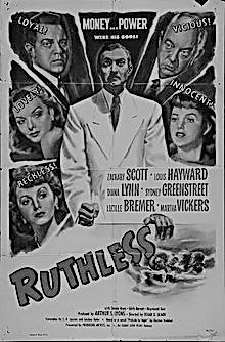 RUTHLESS (1948)
RUTHLESS (1948) (104 Min.) Genre: 1940 SUSPENSE, Transfer Quality: B
Sharkishly handsome Zachary Scott is right in his element in the Eagle-Lion melodrama Ruthless. Told in flashback, this is the story of the rise and fall of unscrupulous financier Horace Vendig (Scott). Hiding behind a veneer of respectability, Vendig steps on and rolls over anyone who stands in his way, including his lifelong friend Vic Lambdin (Louis Hayward), utilities executive Buck Mansfield (Sydney Greenstreet) and various and sundry women, among them Susan Duane (Martha Vickers) and Christine Mansfield (Lucille Bremer). Poor Diana Lynn is subjected to Vendig's cruelties twice, in the dual role of Martha Burnside and Mallory Flagg. It is a tribute to the acting skills of Zachary Scott that he makes his despicable character somehow likeable and, in the end, rather pathetic. Based on a novel by Dayton Stoddart, Ruthless, like many Eagle-Lion films of its period, was topheavy with loaned-out Warner Bros. contract players. It was also one of the few big-budgeted projects helmed by "cult" director Edgar G. Ulmer.
Starring: Zachary Scott, Joyce Arling, Louis Hayward, Sydney Greenstreet | Directed by: Edgar G. Ulmer
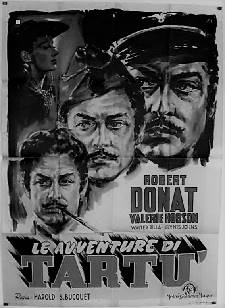 SABOTAGE AGENT (1943)
SABOTAGE AGENT (1943) (103 Min.) Genre: 1940 SUSPENSE, Transfer Quality: A
(aka: The Adventures of Tartu) Tartu--or more formally, The Adventures of Tartu--stars Robert Donat as a Rumanian-born British spy, dispatched to Czechoslovakia during World War II. Posing as an ineffectual milquetoast, Donat is hired as a chemist in a Nazi-controlled poison gas factory. Working in concert with the Underground, our hero spends his off-hours dismantling the Nazi operation. Then he has to figure a way to get out of Czechoslovakia as adroitly as he got in. Adventures of Tartu was filmed at MGM's British studios (it was Metro's first British production in two years), with an American director but with a full cadre of English acting talent: Donat, Valerie Hobson, Glynis Johns, etc. The Teutonic villain is played by Walter Rilla, whose son Wolf Rilla later became a prominent British director.
Starring: Robert Donat, Valerie Hobson, Glynis Johns, Walter Rilia | Directed by: Harold S. Bucquet
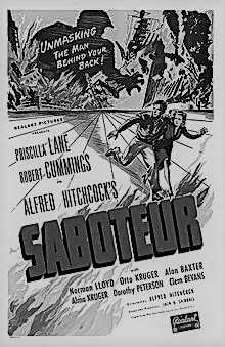 SABOTEUR (1942)
SABOTEUR (1942) (108 Min.) Genre: 1940 SUSPENSE, Transfer Quality: A
Aircraft plant worker Robert Cummings is accused of sabotaging his factory and causing the death of a co-worker. Actually, Cummings is the fall guy for a clever ring of Nazi spies, headed by above-suspicion American philanthropist Otto Kruger. Our hero goes on a cross-country chase after genuine saboteur Norman Lloyd, all the while pursued himself by the police. Along the way, he acquires a reluctant "travelling companion" in the form of Priscilla Lane, who at first despises Cummings and intends to turn him over to the authorities at the first opportunity, but who gradually comes to realize that the boy is innocent. Alfred Hitchcock intended Saboteur to be the American equivalent to his British The 39 Steps, employing such details as the solid-citizen villain, the handcuffed hero, the unwilling blonde heroine, and any number of stopovers with a variety of offbeat characters (a travelling "freak" show, a compassionate blind man, a grizzled old prospector who turns out to be one of the spies, etc.) — Hal Erickson
Starring: Priscilla Lane, Robert Cummings, Norman Lloyd, Otto Kruger | Directed by: Alfred Hitchcock
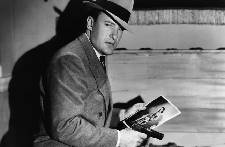 SAINT IN PALM SPRINGS, THE (1941)
SAINT IN PALM SPRINGS, THE (1941) (65 Min.) Genre: 1940 SUSPENSE, Transfer Quality: A
George Sanders makes his final appearance as crook-turned-detective Simon Templar, a.k.a. "The Saint," in The Saint in Palm Springs. The gimmick in this one is a set of rare stamps, smuggled from England. Wendy Barrie is the true heir to this treasure, and the Saint is engaged to protect her and the stamps. Our hero meets Barrie in a posh Palm Springs resort, where a gang of homicidal thieves have converged to relieve the girl of her inheritance. Three murders and one kidnapping attempt later, the villains are foiled by the Saint, with the aid of his onetime partner in crime Pearly Gates (Paul Guilfoyle). The Saint in Palm Springs is the sixth in RKO's series of films based on the character created by Leslie Charteris.
Starring: George Sanders, Wendy Barrie, Paul Guilfoyle, Jonathan Hale, Linda Hayes | Directed by: Jack Hively
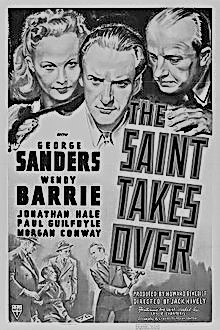 SAINT TAKES OVER, THE (1940)
SAINT TAKES OVER, THE (1940) (69 Min.) Genre: 1940 SUSPENSE, Transfer Quality: A
In this fourth film in RKO's series based on Leslie Charteris' modern Robin Hood "The Saint", George Sanders plays Simon Templar, alias the title character. The Saint's quarry is a ring of gamblers who have been fixing horse races. Inspector Fernack (Jonathan Hale), the Saint's friendly adversary, has been accused of accepting bribes to cover up the crooks' activities, prompting our hero to try to clear Fernack's reputation. Aided by his girlfriend (Wendy Barrie) and petty criminal Pearly Gates (Paul Guilfoyle), the Saint routs the gamblers, but not before nearly losing his own life. George Sanders would play the Saint twice more before leaving the series to become The Falcon, a Saint-like sleuth in another of RKO's B-picture series.
Starring: George Sanders, Wendy Barrie, Jonathan Hale, Paul Guilfoyle | Directed by: Jack Hively
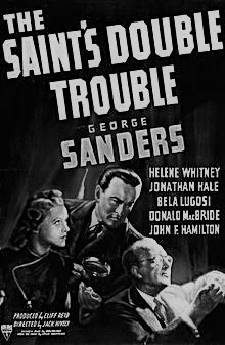 SAINT'S DOUBLE TROUBLE, THE (1940)
SAINT'S DOUBLE TROUBLE, THE (1940) (68 Min.) Genre: 1940 SUSPENSE, Transfer Quality: A
Responding to star George Sanders' complaint that his role of "modern Robin Hood" Simon Templar was becoming a bore, RKO Radio permitted Sanders to essay a duel role in The Saint's Double Trouble. This one finds Templar, aka the Saint, heading to Philadelphia to catch a gang of diamond smugglers. It so happens that the head of the criminals, Duke Plato, is an exact double for Templar (so guess who plays Plato?) Bela Lugosi is wasted in the role of a secondary hoodlum, though it is amusing to watch his double--take when he's confronted with two Sanders. Based on characters created by Leslie Charteris, The Saint's Double Trouble was the fourth entry in RKO's Saint series.
Starring: George Sanders, Helene Whitney, Jonathan Hale, Bela Lugosi, Donald MacBride | Directed by: Jack Hively
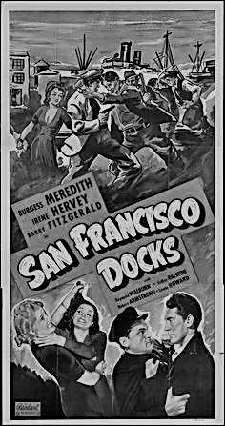 SAN FRANCISCO DOCKS (1941)
SAN FRANCISCO DOCKS (1941) (66 Min.) Genre: 1940 SUSPENSE, Transfer Quality: C
In this crime drama set on the seedy waterfront of San Francisco, a longshoreman studies in his spare time to become an aircraft mechanic. He is also in love with a barmaid who works at her father's saloon. One day at the bar, the longshoreman gets into a fight with a man who is later found dead. Naturally, the longshoreman becomes the prime suspect and is arrested. There are two men who can prove him innocent, but they are in league with the real killer, a fugitive from Alcatraz. Meanwhile, a priest, a drunk, and the girl's father try to prove that the longshoreman is innocent by finding the fugitive's wife. The barmaid and the trampy wife then get in a big fight. In the end, the priest and the fugitive wrestle it out and the thief gets his just desserts.
Starring: Burgess Meredith, Irene Hervey, Barry Fitzgerald, Raymond Walburn | Directed by: Arthur Lubin
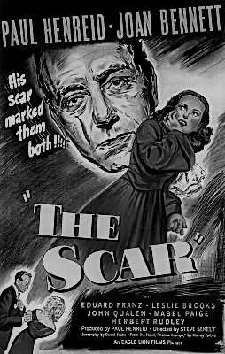 SCAR, THE (1948)
SCAR, THE (1948) (83 Min.) Genre: 1940 SUSPENSE, Transfer Quality: A
John Muller (Paul Henreid), an intelligent, arrogant criminal who has been a medical student and a phony psychoanalyst, believes that people are only interested in themselves and do not notice what is happening around them. Paroled from prison to a boring job, Muller is more interested in a big score, and along with his old cronies robs a crooked gambling joint owned by Rocky Stansyck (Thomas Brown Henry). Although he gets away with the money, some of his men are caught by Stansyck and identify John as the ringleader. On the run from Stansyck's gang, he is mistaken for Dr. Bartok, a psychiatrist also played by Henreid. Curious, Muller goes to the doctor's office, and meets Bartok's secretary and lover, Evelyn Nash (Joan Bennett). Needing to avoid capture, he assumes Bartok's identity, but first must scar his face like the doctor's. Working from a photograph printed from a reversed negative, he applies the scar to the wrong side. Though fooled at first, when Evelyn discovers the truth, she decides to leave, although she is in love with Muller/Bartok. Steve Sekely's Hollow Triumph (aka The Scar) is a film that requires an exceptionally hefty suspension of disbelief in its reliance on coincidence and the literal acceptance of Muller's cynical view of human blindness. — Steve Press
Starring: Paul Henreid, Joan Bennett, Eduard Franz, Leslie Brooks | Directed by: Steve Sekely
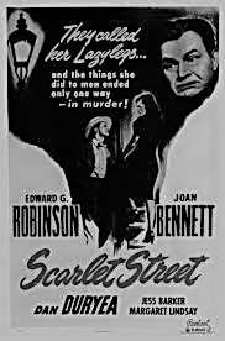 SCARLET STREET (1945)
SCARLET STREET (1945) (95 Min.) Genre: 1940 SUSPENSE, Transfer Quality: B
Masterfully directed by Fritz Lang, Scarlet Street is a bleak film in which an ordinary man succumbs first to vice and then to murder. Christopher Cross (Edward G. Robinson) is a lonely man married to a nagging wife. Painting is the only thing that brings him joy. Cross meets Kitty (Joan Bennett) who, believing him to be a famous painter, begins an affair with him. Encouraged by her lover, con man Johnny Prince (Dan Duryea) Kitty persuades Cross to embezzle money from his employer in order to pay for her lavish apartment. In that apartment, happy for the first time in his life, Cross paints Kitty's picture. Johnny then pretends that Kitty painted to portrait, which has won great critical acclaim. Finally realizing he has been manipulated, Cross kills Kitty, loses his job, and because his name has been stolen by Kitty, is unable to paint. He suffers a mental breakdown as the film ends, haunted by guilt. Kitty and Johnny are two of the most amoral and casual villains in the history of film noir, both like predatory animals completely without conscience. Milton Krasner's photography is excellent in its use of stark black-and-white to convey psychological states. Fritz Lang is unparalleled in his ability to convey the desperation of hapless, naïve victims in a cruelly realistic world.
Starring: Edward G. Robinson, Joan Bennett, Dan Duryea, Margaret Lindsay | Directed by: Fritz Lang
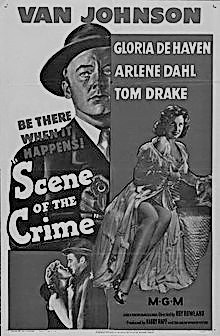 SCENE OF THE CRIME (1949)
SCENE OF THE CRIME (1949) (94 Min.) Genre: 1940 SUSPENSE, Transfer Quality: A
The Dore Schary regime at MGM brought a much-needed dose of stark realism to the venerable studio. Van Johnson sheds his boy-next-door image to play L.A. plainclothes lieutenant Mike Conovan. Determined to bring a cop killer to justice, Conovan will let no man stand in his way — not even his level-headed superiors. The detective's single-purposed pursuit causes a rift in his marriage to wife Gloria (Arlene Dahl). The film comes very close to the Dragnet school of unadorned, unglamorized police procedure: it adheres to standard MGM formula only in the final reconciliation scene. Officially a Harry Rapf production, Scene of the Crime was completed by another producer when Rapf died during filming.
Starring: Van Johnson, Arlene Dahl, Gloria DeHaven, Tom Drake, Leon Ames | Directed by: Roy Rowland
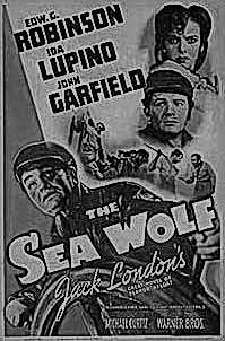 SEA WOLF, THE (1941)
SEA WOLF, THE (1941) (90 Min.) Genre: 1940 SUSPENSE, Transfer Quality: A
The fifth film version of Jack London's The Sea Wolf stars Edward G. Robinson as "premature fascist" Wolf Larsen. The captain of the scavenger ship Ghost, Larsen is a heartless tyrant who can tolerate no sign of weakness in anyone. "Better to reign in Hell than serve in Heaven" is Larsen's philosophy (borrowed from the character of Satan in Milton's Paradise Lost), and accordingly he reigns over his hellish vessel in true satanic fashion. Idealistic writer Humphrey Van Weyden (Alexander Knox) and fugitive from justice Ruth Webster (Ida Lupino) are picked up by the Ghost when their ferryboat capsizes. Realizing that their chances of getting off the boat alive are nil, Van Weyden and Ruth conspire with embittered cabin boy Leach (John Garfield) to escape. They drift in a small open boat for days, only to return to the Ghost, which has apparently been scuttled by the mutinous crew. Larsen has gone blind, but refuses to allow his crew to learn this fact, forcing Van Weyden at gunpoint to perpetuate the illusion that Larsen can still see. Ultimately, the Ghost sinks beneath the waves, carrying Larsen and Van Weyden to their doom ("This is the end of Superman!" cries Van Weyden as the ocean envelops him); Ruth and Leach manage to save themselves, rowing towards the safety of a nearby island—and hopefully escaping to a new life. The 1941 Sea Wolf would not be the last cinematic adaptation of London's novel; as recently as 1993, Charles Bronson starred as Wolf Larsen in a TV remake. — Hal Erickson
Starring: Edward G. Robinson, John Garfield, Ida Lupino, Alexander Knox , Gene Lockhart | Directed by: Michael Curtiz
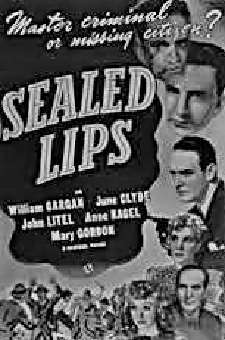 SEALED LIPS (1941)
SEALED LIPS (1941) (62 Min.) Genre: 1940 SUSPENSE, Transfer Quality: A
There's something very odd about Romano (John Litel), a notorious gangster serving time in the federal pen. For one thing, Romano doesn't sound much like himself. For another, he always seems to be hiding something. Detective Lee (William Gargan) suspects that something's amiss, and he's right: the man calling himself Romano is actually a hired double, placed behind bars so that the real Romano can go about his business undetected. A pedestrian effort, Sealed Lips is distinguished by the excellent cinematography of Stanley Cortez (still one year away from Orson Welles' The Magnificent Ambersons) and the spirited peformance of musical-comedy favorite June Clyde as an inquiring girl reporter. — Hal Erickson
Starring: William Gargan, June Clyde, John Litel, Anne Nagel | Directed by: George Waggner
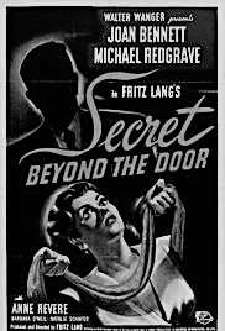 SECRET BEYOND THE DOOR (1948)
SECRET BEYOND THE DOOR (1948) (99 Min.) Genre: 1940 SUSPENSE, Transfer Quality: B
Even star Joan Bennett and director Fritz Lang regarded The Secret Beyond the Door as the weakest of their collaborative efforts. Bennett plays spoiled socialite Celia, who falls recklessly in love with the handsome but emotionally complex Mark Lamphere (Michael Redgrave, in his first American film). After their wedding, Celia becomes uncomfortably aware that Mark's mild distrust of women is actually a deep-set, and potentially dangerous, hatred. Even when facing the possibility that she'll be murdered in her sleep, Celia remains loyal to her unbalanced husband. The slowly mounting tension is enhanced by the mood-drenched cinematography of Stanley Cortez and the feverish musical score by Miklos Rozsa. But when it's all over, The Secret Beyond the Door fails to linger in the memory in the manner of such earlier Lang-Bennett efforts as The Woman in the Window and Scarlet Street.
Starring: Joan Bennett, Michael Redgrave, Anne Revere, Barbara O'Neil, Anabel Shaw | Directed by: Fritz Lang
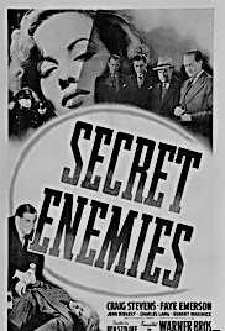 SECRET ENEMIES (1942)
SECRET ENEMIES (1942) (57 Min.) Genre: 1940 SUSPENSE, Transfer Quality: A
Made in 1942 but released early in 1943, Secret Enemies is a Warner Bros. espionage quickie, putting the studio's second-echelon contractees to good use. Craig Stevens, Faye Emerson and John Ridgely are the leads in this hour-long meller about a Nazi spy ring operating covertly in America. The FBI sniffs out the "secret enemies," striking another blow against Uncle Adolf. Secret Enemies enabled Faye Emerson to step up into "A" pictures and secured a contract extension for reliable utility player John Ridgely. But Craig Stevens was drafted almost immediately after the film's release; unable to regain his lost footing after the war, it would take Stevens until 1958 to establish himself as a full-fledged star on the TV series Peter Gunn.
Starring: Craig Stevens, Faye Emerson, John Ridgely, Charles Lang, George Meeker, Ruth Ford, William Hopper | Directed by: Benjamin Stoloff
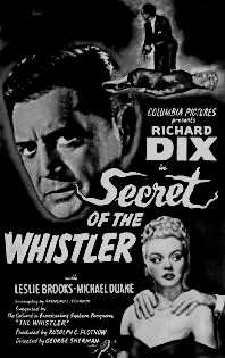 SECRET OF THE WHISTLER, THE (1946)
SECRET OF THE WHISTLER, THE (1946) (65 Min.) Genre: 1940 SUSPENSE, Transfer Quality: B
The Whistler, mysterious narrator of the radio series of the same name, "knows many things" for he "walks by night." This time the unseen whistler knows all about mentally disturbed artist Richard Dix, whose first wife died under mysterious circumstances. Wife Number Two (Leslie Brooks) begins to suspect that Dix's earlier spouse may have been murdered, and that the artist was the killer. In a tense finale, the second wife uses psychological warfare to turn the tables on the homicidal Dix. This was the sixth in the film in the "Whistler" series produced by Columbia in the mid-1940s.
Starring: Richard Dix, Charles Trowbridge, Ray Walker, Leslie Brooks | Directed by: George Sherman
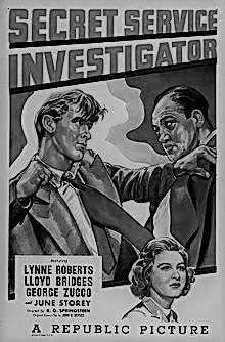 SECRET SERVICE INVESTIGATOR (1948)
SECRET SERVICE INVESTIGATOR (1948) (60 Min.) Genre: 1940 SUSPENSE, Transfer Quality: B
An especially good casts helps lift Republic's Secret Service Investigator well above the norm. Lloyd Bridges plays disillusioned ex-GI Steve Mallory, who falls in with a gang of wily crooks. Convincing Mallory that they're U.S. secret service agents, the villains persuade our hero to help them in a phony rare-coin scheme. When he realizes he's being flim-flammed, Mallory risks his neck by agreeing to work as a double agent for the real Feds. The film is effortlessly stolen by George Zucco as Otto Dagoff, the erudite but slimy head of the fake-coin racket. In case there's any question that Secret Service Investigator is a Republic film, the presence of Roy Barcroft as one of the heavies should remove all doubt.
Starring: Lynne Roberts, Lloyd Bridges, George Zucco, June Storey, John Kellogg, James Flavin | Directed by: R. G. Springsteen
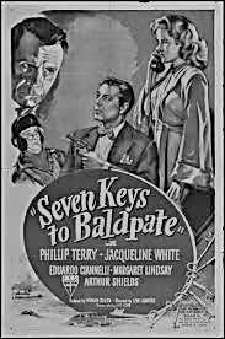 SEVEN KEYS TO BALDPATE (1947)
SEVEN KEYS TO BALDPATE (1947) (68 Min.) Genre: 1940 SUSPENSE, Transfer Quality: B
In this fifth film version of the play by George M. Cohan and Earl Derr Biggers, Phillip Terry portrays a mystery novelist who wagers that he can write a complete story in one night. To this end, he arranges to sequester himself in a remote rustic inn, assuming that he has the only key to the place. As the evening wears on, the inn becomes the rendezvous for several mysterious characters—all of whom have keys of their own—and the site of a startling murder. Terry tries to figure out the goings-on, but just when he's put the clues together, the lock in the door clicks. The seventh key! We'll withhold the climactic dual plot twist for the benefit of those who've never seen any of the filmizations of Seven Keys to Baldpate, including the misbegotten 1983 version House of the Long Shadows (which starred Desi Arnaz Jr.!) — Hal Erickson
Starring: Phillip Terry, Jacqueline White, Eduardo Ciannelli, Margaret Lindsay | Directed by: Lew Landers
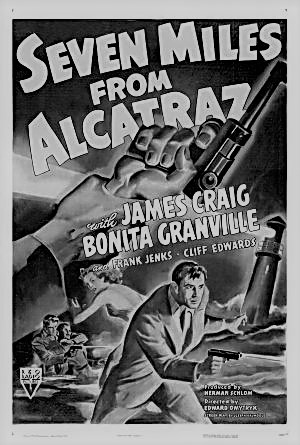 SEVEN MILES FROM ALCATRAZ (1942)
SEVEN MILES FROM ALCATRAZ (1942) (102 Min.) Genre: 1940 SUSPENSE, Transfer Quality: B
For his first directorial assignment at RKO Radio, Edward Dmytryk was handed the mile-a-minute topical meller Seven Miles From Alcatraz. James Craig and Frank Jenks star as cynical Alcatraz inmates Champ and Jimbo, who manage to escape from the "rock" and then take refuge in the lighthouse maintained by Captain Porter (George Cleveland) and his pretty daughter Anne (Bonita Granville). Though concerned only about their own plight at first, Champ and Jimbo alter their getaway plans to foil a nest of Nazi spies who are using the lighthouse as their rendezvous. As Jimbo explains it, "We may be rats, but we're American rats!", which may be why he and Champ are granted a happier denoument than most Alcatraz escapees. Among the Nazis is a slim and youthful John Banner, two decades removed from his duties as cuddly Sergeant Schultz in TV's Hogan's Heroes.
Starring: James Craig, Bonita Granville, Frank Jenks, Cliff Edwards | Directed by: Edward Dmytryk
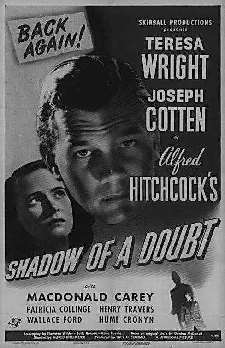 SHADOW OF A DOUBT (1943)
SHADOW OF A DOUBT (1943) (108 Min.) Genre: 1940 SUSPENSE, Transfer Quality: A
Teresa Wright plays Charlie, a small-town high-schooler who enjoys a symbiotic relationship with her favorite uncle, also named Charlie (Joseph Cotten). When young Charlie "wills" that old Charlie pay a visit to her family, her wish comes true. Uncle Charlie is his usual charming self, but he seems a bit secretive and reserved at times. Too, his manner of speaking is curiously unsettling, especially when he brings up the subject of rich widows, whom he characterizes as "swine." When a pair of detectives (MacDonald Carey and Wallace Ford), posing as magazine writers, arrive in town and begin asking questions about Uncle Charlie, young Charlie's curiosity is aroused. Why, for example, has Uncle Charlie torn an article out of the evening newspaper? Rushing to the library, Young Charlie locates the missing item: the headline screams WHO IS THE MERRY WIDOW MURDERER? As the horrified Charlie reads on, the conclusion is inescapable: her beloved Uncle Charlie is a mass murderer, preying upon wealthy old women. And what happens next? Thornton Wilder, Sally Benson, and Alma Reville (Mrs. Hitchcock) based their screenplay on a story by Gordon McDowell, who in turn was inspired by real-life "Merry Widow Murderer" Earle Leonard Nelson. The casting, from stars to bit players, is impeccable; the best of the batch is Hume Cronyn, making his film debut as a wimpy murder-mystery aficionado. Lensed on location in Santa Rosa, California, The Shadow of a Doubt wasAlfred Hitchcock's favorite film. — Hal Erickson
Starring: Teressa Wright, Joseph Cotton, MacDonald Carey, Henry Travers | Directed by: Alfred Hichcock
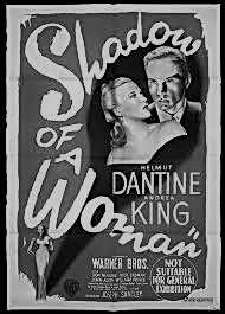 SHADOW OF A WOMAN (1946)
SHADOW OF A WOMAN (1946) (78 Min.) Genre: 1940 SUSPENSE, Transfer Quality: A
This little-known Warner Bros. melodrama reteams Hotel Berlin co-stars Helmut Dantine and Andrea King. He is cast as Dr. Eric Ryder, a seemingly respectable medico, while she plays Ryder's impressionable young bride Brook. Despite significant evidence that Ryder isn't all that he seems to be, his wife continues to believe in and worship him. Only when it's nearly too late does she realize that Ryder is not only a phony, but a murderer to boot. The tension is heightened by the fact that Ryder's young son (Larry Geiger) from an earlier marriage is being methodically starved to death by his deranged father. Shadow of a Woman was based on a novel by Virginia Perdue.
Starring: Helmut Dantine, Andrea King, Don McGuire, John Alvin, William Prince | Directed by: Joseph Santley
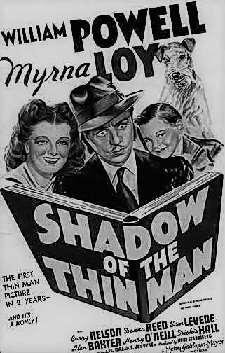 SHADOW OF THE THIN MAN (1941)
SHADOW OF THE THIN MAN (1941) (97 Min.) Genre: 1940 SUSPENSE, Transfer Quality: A
This fourth entry in MGM's Thin Man series could just as well have been titled "Nick and Nora Charles Go to the Races". Officially retired from sleuthing, Nick Charles (William Powell) does his best to be a dutiful husband to his lovely wife Nora (Myrna Loy) and a good father to his young son Nick Jr. (Dickie Hall). But when murder rears its ugly head at the local race track, Nick is called in by Major Jason I. Sculley (Henry O'Neill), head of the New York athletic commission, to help solve the case. As usual, there is no shortage of suspects: This time the "rogue's gallery" includes high-rolling gamblers Link Stevens (Loring Smith) and Fred Macy (Joseph Anthony); Link's hoity-toity girlfriend Claire Porter (played by legendary acting teacher Stella Adler); two-bit tout "Rainbow" Benny Loomis (Lou Lubin); reporters Whitey Barrow (Paul Kelly) and Paul Clarke (Barry Nelson); and Clarke's sweetheart Molly Ford (Donna Reed). Highlights include a zany episode on a department-store merry-go-round, an outsized brawl at a fancy sea-food restaurant, and the inevitable gathering together of suspects in the offices of police lieutenant Abrams (Sam Levene). The flippant nature of Shadow of the Thin Man can be attributed to screenwriters Irving Brecher and Harry Kurnitz, both longtime friends and associates of comedian Groucho Marx. — Hal Erickson
Starring: William Powell, Myrna Loy, Barry Nelson, Donna Reed | Directed by: W.S. Van Dyke
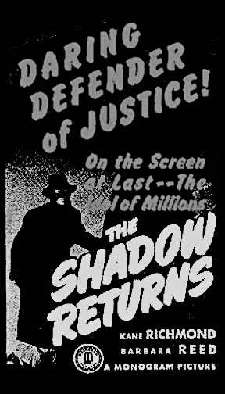 SHADOW RETURNS, THE (1946)
SHADOW RETURNS, THE (1946) (61 Min.) Genre: 1940 SUSPENSE, Transfer Quality: B
The Shadow Returns was the first of three above-average Monogram features based on the popular radio melodrama The Shadow. Kane Richmond stars as wealthy man-about-town Lamont Cranston, who years ago in the Orient had learned the hypnotic power to "cloud men's minds," thereby transforming himself into the crime-fighting Shadow. When Inspector Cardona (Joseph Crehan) is unable to solve a high-profile jewel theft, Cranston goes into his mind-clouding act to investigate. He is "helped" by his lady friend Margo Lane, who though an intelligent and resourceful character on the radio series is herein portrayed as a blithering idiot by Barbara Reed. In fact, Margo comes off far stupider than the film's official comedy relief, Cranston's chauffeur Shrevvie (Tom Dugan). Outside of the irksome Margo Lane, The Shadow Returns is an entertaining mystery, with the "disappearing" gimmick handled with subtlety and inventiveness by director Phil Rosen.
Starring: Kane Richmond, Tom Dugan, Joseph Crehan, Pierre Watkin | Directed by: Phil Rosen
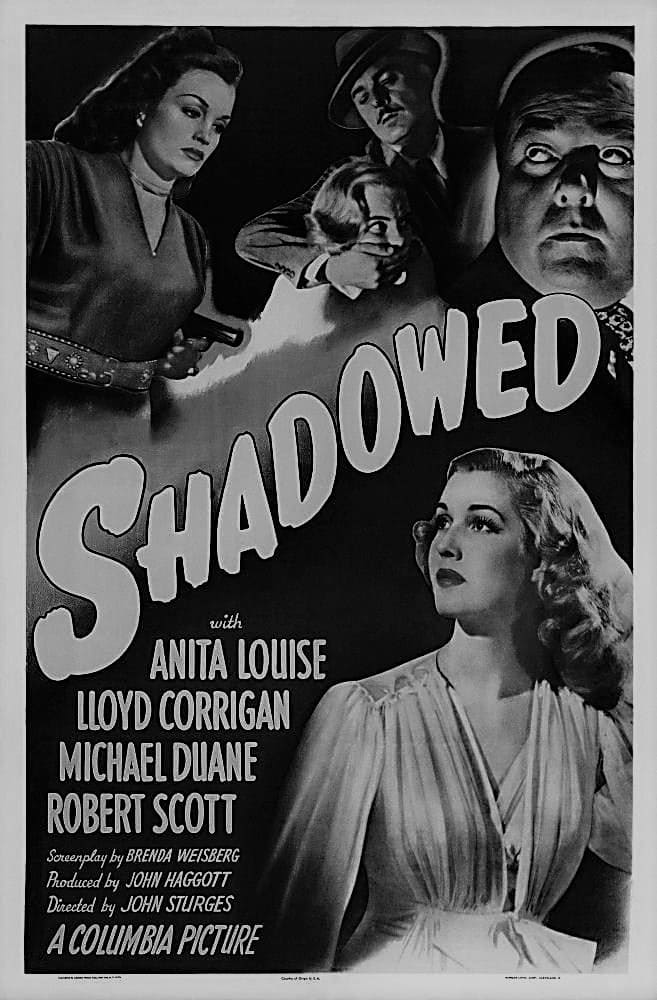 SHADOWED (1946)
SHADOWED (1946) (70 Min.) Genre: 1940 SUSPENSE, Transfer Quality: A
Fred J. Johnson (Lloyd Corrigan) scores a hole-in-one but his next drive, using the lucky, initialed golf ball, soars out of bounds and lands near a spot where some counterfeiters are burying a murder victim. Then begins a series of events in which he is hounded and threatened by the killers. The consequences of his not reporting what he saw to the police lead to a climax in which is daughter is held hostage by the crooks.
Starring: Paul E. Burns, Lloyd Corrigan, Jack Davis, Michael Duane, Anita Louise | Directed by: John Sturges
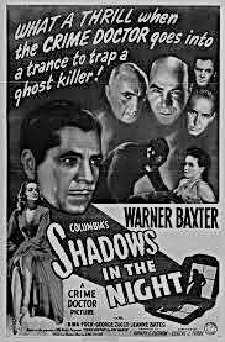 SHADOWS IN THE NIGHT (1944)
SHADOWS IN THE NIGHT (1944) (67 Min.) Genre: 1940 SUSPENSE, Transfer Quality: A
Shadows in the Night was the third entry in Columbia's Crime Doctor series, starring Warner Baxter as crook-turned-criminologist Dr. Robert Ordway. Nina Foch delivers a superb performance as Lois Garland, a beautiful young heiress being driven to insanity and possible suicide. Poor Lois resides in a house seemingly festooned with malevolent ghosts; Ordway suspects that her tormentors are of the human variety. With George Zucco on hand as the sinister Frank Swift, can there be any doubt as to the identity of the perpetrator? Well, actually, there can, but it's best to see the film to find out for sure. — Hal Erickson
Starring: Warner Baxter, Nina Foch, George Zucco, Minor Watson | Directed by: Eugene J. Forde
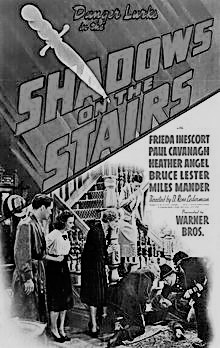 SHADOWS ON THE STAIRS (1941)
SHADOWS ON THE STAIRS (1941) (64 Min.) Genre: 1940 SUSPENSE, Transfer Quality: A
Shadows on the Stairs is a slimmed-down adaptation of Frank Vosper's stage play Murder on the 2nd Floor. There's dirty work afoot at the London boarding house managed by Mr. and Mrs. Armitage (Miles Mander, Frieda Inescourt): several mysterious murders have occured, and everyone is under suspicion. One of the tenants is Mr. Bromilow (Bruce Lester), who weaves in and out of the proceedings with the all-knowing air of one who's already figured out the solution to the murders. Indeed, Bromilow has done just that, as demonstrated by a twist ending that would have done Alfred Hitchcock or Rod Serling proud. Otherwise, Shadows on the Stairs is standard stuff, standardly produced. — Hal Erickson
Starring: Frieda Inescort, Paul Cavanagh, Heather Angel, Miles Mander | Directed by: Lumsden Hare, David Ross Lederman
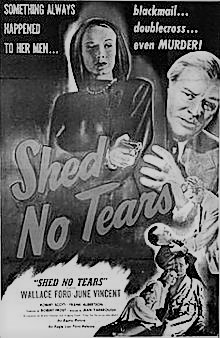 SHED NO TEARS (1948)
SHED NO TEARS (1948) (70 Min.) Genre: 1940 SUSPENSE, Transfer Quality: B
In this crime drama, a loving husband listens to his wife and fakes his own death so that she can get her hands on his insurance policy. The whole situation rouses the suspicions of the man's son (by a different marriage) who ends up hiring an investigator to look into it. Unfortunately the PI is crooked and the wife pays him to stay silent. In the end the husband discovers that his wife has been using the money on her secret lover. The hapless spouse is so distraught that he leaps to his death.
Starring: Wallace Ford, June Vincent, Robert Scott, Dick Hogan, Frank Albertson | Directed by: Jean Yarbrough
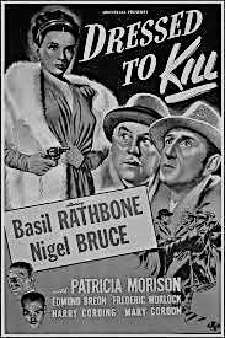 SHERLOCK HOLMES / DRESSED TO KILL (1945)
SHERLOCK HOLMES / DRESSED TO KILL (1945) (67 Min.) Genre: 1940 SUSPENSE, Transfer Quality: A
Based on the prolific Sir Arthur Conan Doyle mysteries, Sherlock Holmes is on the job again. This time the inmate of a British prison has incorporated stolen Bank of England engraving plates into a series of music boxes he has made and multiple criminals are out to find them. Holmes must be first. It's a weak, thin plot for the final of the Holmes/Watson series but it is still a joy to see Basil Rathbone and Nigel Bruce working off one another. — Tana Hobart
Starring: Basil Rathbone, Nigel Bruce, Edmund Breon, Patricia Morison | Directed by: Roy William Neill
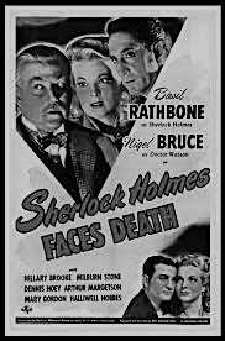 SHERLOCK HOLMES / FACES DEATH (1943)
SHERLOCK HOLMES / FACES DEATH (1943) (68 Min.) Genre: 1940 SUSPENSE, Transfer Quality: A
There are those who consider Sherlock Holmes Faces Death to be the best of Universal's Holmes series, though others hold out for 1944's The Scarlet Claw. Based loosely on Conan Doyle's The Musgrave Ritual, the plot finds Holmes (Basil Rathbone) and Watson (Nigel Bruce) being summoned to the Musgrave estate when several mysterious murders occur. By the time the mystery is solved, Sally Musgrave (Hillary Brooke), young mistress of the estate, has decided to donate her property to "the people" as part of the war effort, cuing another of Holmes' patriotic curtain speeches. The best moment occurs when Holmes suddenly realizes that the floor of Musgrave castle resembles a huge chess board — a clue vital to the ultimate solution of the case. Peter Lawford shows up unbilled as an inebriated sailor. — Hal Erickson
Starring: Basil Rathbone, Nigel Bruce, Hillary Brooke, Milburn Stone, Evelyn Ankers | Directed by: Roy William Neill
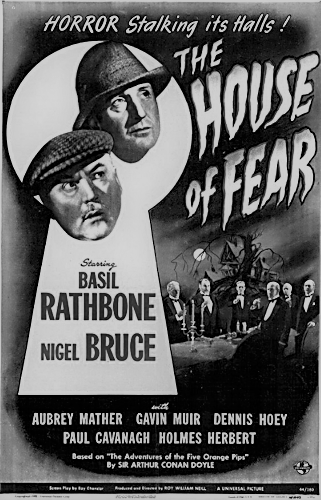 SHERLOCK HOLMES / HOUSE OF FEAR (1945)
SHERLOCK HOLMES / HOUSE OF FEAR (1945) (69 Min.) Genre: 1940 SUSPENSE, Transfer Quality: A
This excellent Sherlock Holmes adventure is based on Conan Doyle's The Five Orange Pips. Most of the action takes place in a remote Scottish mansion, home of "The Good Companions," a group of elderly eccentrics. After taking out insurance policies on one another, the club members begin dropping like flies, each death preceded by a mailed envelope containing an orange pip. Enter Sherlock Holmes (Basil Rathbone) and Dr. Watson (Nigel Bruce), who hope to not only solve the killings but also find out why the corpses mysteriously disappear after each death. For once, the usually ineffectual Watson takes an active part in the deductive process, uncovering the vital evidence that helps Holmes emerge triumphant once more. — Hal Erickson
Starring: Basil Rathbone, Nigel Bruce, Aubrey Mather, Dennis Hoey | Directed by: Roy William Neill
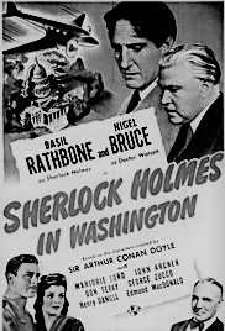 SHERLOCK HOLMES / IN WASHINGTON (1943)
SHERLOCK HOLMES / IN WASHINGTON (1943) (71 Min.) Genre: 1940 SUSPENSE, Transfer Quality: A
One of the silliest and most unbelievable of the Universal Sherlock Holmes series, Sherlock Holmes in Washington is also undeniably one of the most enjoyable. The story gets under way when an Allied spy (an unbilled Gerald Hamer, one of this series' "regulars") smuggles a valuable piece of microfilm into the U.S. The film is hidden in a matchbook cover that passes through several hands, ultimately ending up in the possession of Washington, D.C., socialite Nancy Partridge (Marjorie Lord). Brought to Washington from London to help locate the missing film, Sherlock Holmes (Basil Rathbone) and Dr. Watson (Nigel Bruce) do their best to rescue Nancy from the clutches of the Axis villains — nearly losing their own lives in the process. And when the case is finally solved, Holmes reveals that there's still another twist to the proceedings — a few minutes before he delivers his obligatory patriotic quote from Winston Churchill. One of the delights of Sherlock Holmes in Washington is the casting of George Zucco and Henry Daniell as the bad guys; both actors also played Holmes' archenemy Moriarty in other series entries. It's also fun to see poor old Watson tangle with American slang and a wad of bubble gum, and to watch as Holmes and Watson driven past a series of famous D.C. monuments — covering several miles in a matter of seconds! — Hal Erickson
Starring: Basil Rathbone, Nigel Bruce, Marjorie Lord, George Zucco | Directed by: Roy William Neill
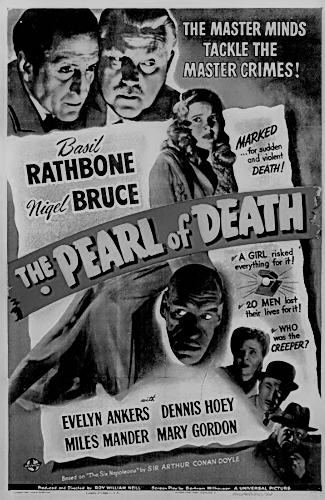 SHERLOCK HOLMES / PEARL OF DEATH (1944)
SHERLOCK HOLMES / PEARL OF DEATH (1944) (69 Min.) Genre: 1940 SUSPENSE, Transfer Quality: A
This above-average entry in Universal's Sherlock Holmes series is loosely based on the Conan Doyle story The Six Napoleons. On this occasion, Holmes (Basil Rathbone) and Watson (Nigel Bruce) are assigned to guard the priceless Borgia Pearl, a "cursed" gem that has inspired scores of murders over the years. Their principal antagonist is master criminal Giles Conover (Miles Mander), who, though he is constantly thwarted in his efforts to pilfer the pearl, manages to discredit Holmes in the eyes of the public. Conover's chief assistant is the beautiful Naomi Drake (Evelyn Ankers), who adopts several clever disguises in the course of the action. Complicating matters is a series of seemingly unrelated murders, in which the victims are found with their backs broken, lying amidst piles of shattered China. Holmes deduces the connection between the murders and the Borgia Pearl, and in so doing nearly becomes the latest victim of The Creeper (Rondo Hatton), a horribly disfigured homicidal maniac. In addition to providing Basil Rathbone and Evelyn Keyes endless opportunities for bravura disguise scenes, The Pearl of Death launched the short starring career of the tragic Rondo Hatton, a real-life victim of the disfiguring disease known as acromegaly. — Hal Erickson
Starring: Basil Rathbone, Nigel Bruce, Dennis Hoey, Evelyn Ankers | Directed by: Roy William Neill
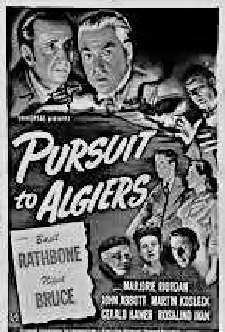 SHERLOCK HOLMES / PURSUIT TO ALGIERS (1945)
SHERLOCK HOLMES / PURSUIT TO ALGIERS (1945) (85 Min.) Genre: 1940 SUSPENSE, Transfer Quality: A
Taking place almost exclusively on a transatlantic ocean liner, this easygoing "Sherlock Holmes" entry finds Holmes (Basil Rathbone) and Watson (Nigel Bruce) escorting far-eastern regent Nikolas (Leslie Vincent) on a diplomatic mission. A group of assassins have targetted Nikolas for extermination, and they're not averse to knocking off Holmes and Watson to achieve their goals. In the end, it seems as though the villains have gained the upper hand-but that's before the cagey Holmes reveals the film's biggest surprise (which, for a change, really is a surprise). Throughout Pursuit to Algiers, it's fun to watch bad guys Martin Kosleck and Rex Evans making like a road-company version of Peter Lorre and Sidney Greenstreet. The film's only disappointment is Watson's recital of the case of the Giant Rat of Sumatra, which we never get to hear in its entirety! — Hal Erickson
Starring: Basil Rathbone, Nigel Bruce, Morton Lowry, Rosalind Ivan | Directed by: Roy William Neill
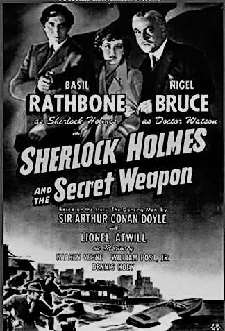 SHERLOCK HOLMES / SECRET WEAPON (1942)
SHERLOCK HOLMES / SECRET WEAPON (1942) (68 Min.) Genre: 1940 SUSPENSE, Transfer Quality: A
The second of Universal's "modernized" Sherlock Holmes films pits the Great Detective (Basil Rathbone, of course) against that "Napoleon of Crime," Professor Moriarty (Lionel Atwill). Surpassing his previous skullduggery, Moriarty has now aligned himself with the Nazis and has dedicated himself to stealing a top-secret bombsight developed by expatriate European scientist Dr. Franz Tobel (William Post Jr.) Before being kidnapped by Moriarty's minions, Tobel was enterprising enough to disassemble his invention and distribute its components among several other patriotic scientists. Racing against the clock, Holmes and Dr. Watson (Nigel Bruce) try to stem the murders of Tobel's colleagues and prevent Moriarty from getting his mitts on the precious secret weapon. The now-famous climax finds Holmes playing for time by allowing Moriarty to drain all the blood from his body, drop by drop ("The needle to the last, eh Holmes?" gloats the villain). Dennis Hoey makes his first appearance as the dull-witted, conclusion-jumping Inspector Lestrade. Constructed more like a serial than a feature film, Sherlock Holmes and the Secret Weapon (based loosely on Conan Doyle's The Dancing Men) is one of the fastest-moving entries in the series; it is also one of the most readily accessible, having lapsed into public domain in 1969. — Hal Erickson
Starring: Basil Rathbone, Nigel Bruce, Kaaren Verne, Lionel Atwill | Directed by: Roy William Neill
(62 Min.) Genre: 1940 SUSPENSE, Transfer Quality: A
Someone in London has driven several prominent men to madness and suicide. Normally, Scotland Yard would call in Sherlock Holmes (Basil Rathbone) to help solve the case, but Holmes has recently perished in an accident. Or has he? Officially declared dead, Holmes is able to move about undetected as he tries to find out who's behind the rash of suicides — and why. The culprit turns out to be the bewitching, deadly Andrea Spedding (Gale Sondergaard), and for once, Holmes seems to have met his match. The now-famous climax finds a bound-and-gagged Holmes hidden behind a shooting-gallery target, while his faithful assistant, Dr. Watson (Nigel Bruce), unwittingly prepares to blast away at the target with live ammunition (in wartime, yet). Filled to overflowing with amusing dialogue and devilishly clever plot twists (one of them involving an autistic pygmy!), Sherlock Holmes and the Spider Woman is among the best of the Universal Holmes series. Best bit: told to "act inconspicuous," Inspector Lestrade (Dennis Hoey) ceremoniously rolls his eyes upward and begins whistling loudly — whereupon Dr. Watson chides him with "Inconspicuous, Lestrade, not half-witted." — Hal Erickson
Starring: Basil Rathbone, Nigel Bruce, Gale Sondergaard, Dennis Hoey | Directed by: Roy William Neill
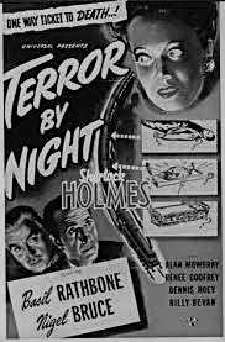 SHERLOCK HOLMES / TERROR BY NIGHT (1946)
SHERLOCK HOLMES / TERROR BY NIGHT (1946) (60 Min.) Genre: 1940 SUSPENSE, Transfer Quality: A
The penultimate entry in Universal's "Sherlock Holmes" series, Terror by Night takes place almost exclusively on a speeding train, en route from London to Edinburgh. Holmes (Basil Rathbone) is on board to protect a valuable diamond from the clutches of master criminal Colonel Sebastian Moran. The trouble is, Moran is a master of disguise, and could be just about any one of the other passengers. Murder and mayhem plague the train excursion before Holmes can successfully complete his mention. Poor old Dr. Watson (Nigel Bruce) is a bit denser than usual here, though his ingenuousness is cleverly woven into the script. Alan Mowbray, who played Inspector Lestrade in the 1932 Clive Brook adaptation of Sherlock Holmes, is seen in a pivotal supporting role. One of three "Holmes" entries currently in the Public Domain, Terror by Night is also available in a computer-colorized version (but stick with the original black and white). — Hal Erickson
Starring: Basil Rathbone, Nigel Bruce, Alan Mowbray, Dennis Hoey | Directed by: Roy William Neill
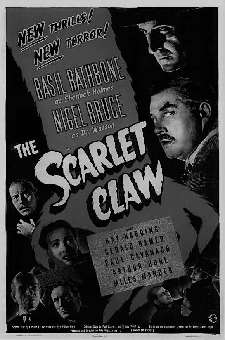 SHERLOCK HOLMES / THE SCARLET CLAW (1944)
SHERLOCK HOLMES / THE SCARLET CLAW (1944) (74 Min.) Genre: 1940 SUSPENSE, Transfer Quality: A
Though it is not based on any Conan Doyle story, The Scarlet Claw is regarded by Baker Street aficionados as the best of Universal's Sherlock Holmes series. Holmes (Basil Rathbone) and Watson (Nigel Bruce) journey to Canada to investigate a series of mysterious murders. All the victims have been found with their throats ripped out (yecch!). Halfway through the film, Holmes deduces that the culprit is a demented actor, wreaking vengeance on those who've wronged him in some way or other. The actor is a master of disguise, and could be anyone in the village — from the constable to the postman to the reclusive, violence-prone innkeeper (Arthur Hohl). Alas, the publicity photos sent out with The Scarlet Claw gave away the identity of the killer — something we have no intention of doing here. — Hal Erickson
Starring: Basil Rathbone, Nigel Bruce, Gerald Hamer, Paul Cavanagh | Directed by: Roy William Neill
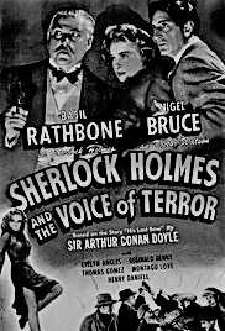 SHERLOCK HOLMES / VOICE OF TERROR (1942)
SHERLOCK HOLMES / VOICE OF TERROR (1942) (65 Min.) Genre: 1940 SUSPENSE, Transfer Quality: A
From the first frame of its opening credits, Sherlock Holmes and the Voice of Terror promises (and subsequently delivers) mystery and thrills several layers deep — following a short prologue intended to introduce Holmes to contemporary England (circa 1942), there is a series of terror broadcasts from Germany, announcing destruction throughout the British isles, and a montage of explosions and other disasters causing havoc. Sherlock Holmes (Basil Rathbone) and Dr. Watson (Nigel Bruce) are called in by Sir Evan Barham (Reginald Denny) of British intelligence's Inner Council to investigate the Voice of Terror and the accompanying sabotage. The other members of the council are disdainful of Holmes' presence, and express heightening doubts as his investigation seems to take him up several blind alleys. The case starts to break when a dying informant gives Holmes a tip that takes him and Watson to London's seedy Limehouse district, where they get a hostile reception until Kitty (Evelyn Ankers), the widow of the murdered informant, makes a patriotic speech reminding her friends that regardless of their class or their feelings about British society, this is a war for the survival of England. With Kitty leading them, the men and women of Limehouse form an invisible army and go out in search of the saboteurs. Holmes determines that the Voice of Terror is recorded on phonograph records in England and flown to Germany for broadcast; with Kitty's help, he traces the saboteurs to a deserted dockside location where he and Watson, along with intelligence chief Mr. Lloyd (Henry Daniell), are nearly killed by Meade (Thomas Gomez), the leader of the saboteurs. Holmes and company are rescued at the last moment by Kitty's army, but Meade escapes. He crosses paths with Kitty, who pretends to be a thief on the run and joins him. Working her way into his trust, she finds evidence that Meade plans to kill Sir Evan Barham; Holmes arrives just minutes behind Meade and heads off an attempt by a German plane to land on Barham's remote estate. All of these incidents of sabotage and attempted assassination are serious enough, but Holmes suspects they're part of a larger, more sinister plot that could lead to the destruction of England. The film ends with a chase to the South Coast and a bombed-out church, where Meade and his men are preparing to take over the country. Holmes captures Meade and unmasks the man behind him, and reveals just how far ahead of the Germans he has been, turning their certain victory into defeat, but he loses a good friend and ally in the process. — Bruce Eder
Starring: Basil Rathbone, Nigel Bruce, Evelyn Ankers, Reginald Denny | Directed by: John Rawlins
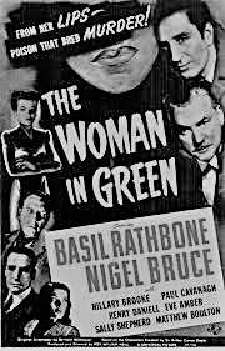 SHERLOCK HOLMES / WOMAN IN GREEN (1946)
SHERLOCK HOLMES / WOMAN IN GREEN (1946) (92 Min.) Genre: 1940 SUSPENSE, Transfer Quality: A
Based on Conan Doyle's The Adventure of the Empty House, this "Sherlock Holmes" entry finds Holmes (Basil Rathbone) and Dr. Watson (Nigel Bruce) trying to solve the case of the "Finger Murders". Several beautiful women have been found slain, all with their right forefingers severed from their hands. The police are prepared to write off the killings as the work of a madman, but Holmes deduces that there's a sane motive behind it all. Sure enough, the trail of evidence leads to Holmes' perennial nemesis Professor Moriarity (Henry Daniell), who is in league with lissome female criminal Lydia (Hillary Brooke). Though it isn't sporting to reveal Moriarity's nefarious scheme here, it can be noted that The Woman in Green comes to a nailbiting conclusion as a hypnotized Holmes wanders precariously along the ledge of a penthouse! — Hal Erickson
Starring: Basil Rathbone, Nigel Bruce, Hillary Brooke, Henry Daniell | Directed by: Roy William Neill
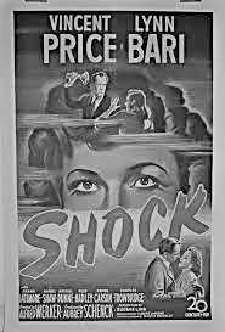 SHOCK (1946)
SHOCK (1946) (70 Min.) Genre: 1940 SUSPENSE, Transfer Quality: A
In this thriller, psychiatrist Dr. Cross (Vincent Price) kills his wife and expects to get away with murder, until he discovers that the slaying was observed by a next-door neighbor, Janet Stewart (Anabel Shaw). As Janet attempts to convince her husband (Frank Latimore) of the doctor's dastardly deed, Cross shows up to advise him that Janet is in dire need of some in-depth counseling. — Iotis Erlewine
Starring: Vincent Price, Lynn Bari, Anabel Shaw, Michael Dunne | Directed by: Alfred L. Werker
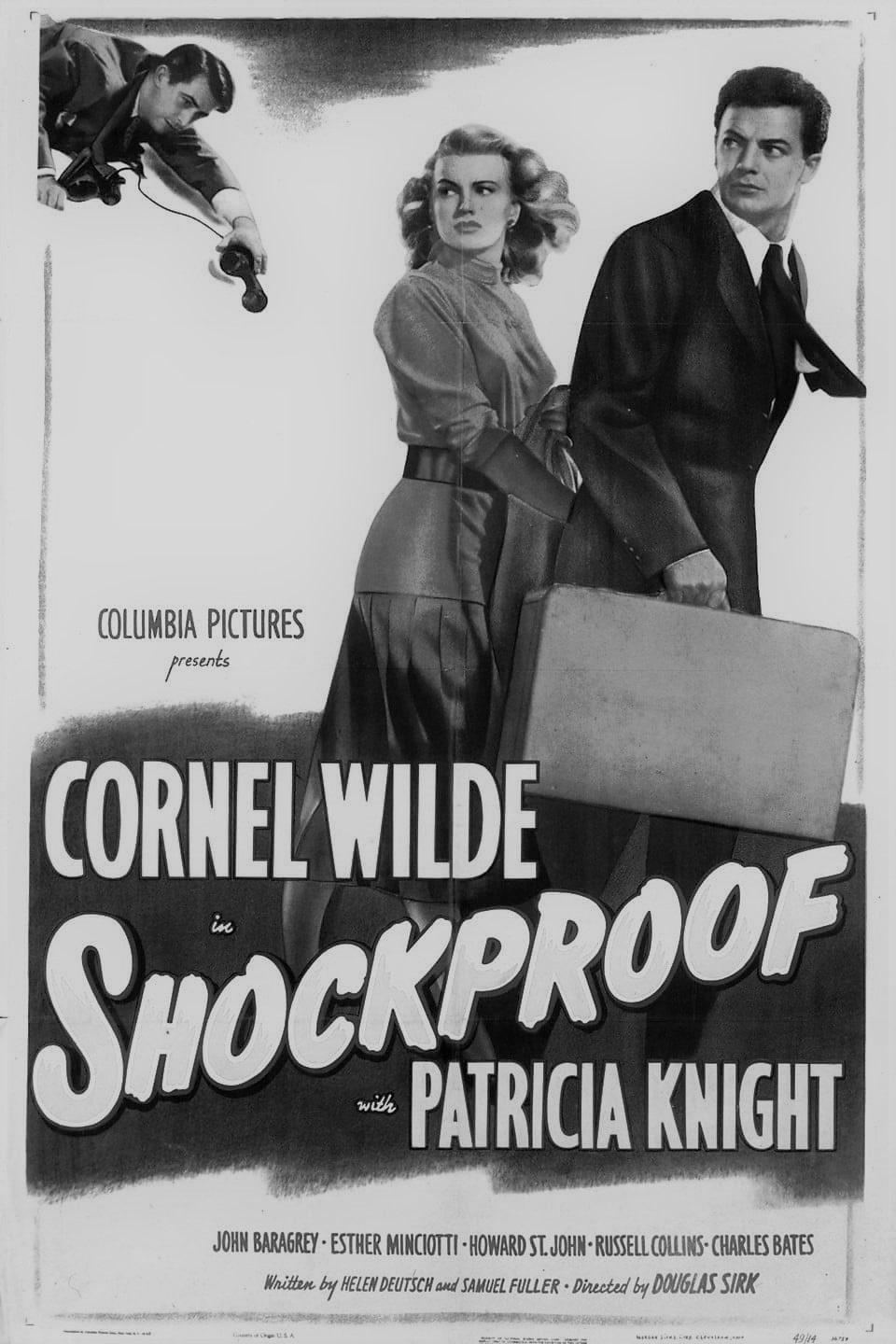 SHOCKPROOF (1949)
SHOCKPROOF (1949) (79 Min.) Genre: 1940 SUSPENSE, Transfer Quality: B
Beauty contest winner Patricia Knight's one bid for screen stardom was Columbia's Shockproof. Knight plays Jenny Wright, a convicted murderess paroled in the care of probation officer Griff Marat (Cornel Wilde). What begins as an aloof professional relationship eventually blossoms into romance. The fly in the ointment is shady Harry Wesson (John Baragrey), the gambler who inveigled Jenny into committing murder. The girl is torn between creature comforts offered her by Wesson and the promise of a clean life offered by Griff. This early Douglas Sirk effort contains a smattering of the stylistic touches which distinguished his later work.The screenplay was written by famed director Samuel Fuller, known for his gritty realism and hard-boiled style.
Starring: Cornel Wilde, Patricia Knight, John Baragrey, Howard St. John | Directed by: Douglas Sirk
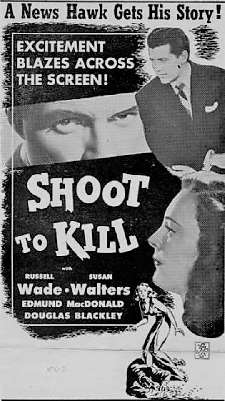 SHOOT TO KILL (1947)
SHOOT TO KILL (1947) (64 Min.) Genre: 1940 SUSPENSE, Transfer Quality: B
The stars of Shoot to Kill are Douglas Blackley and Susan Walters, both of whom later changed their professional names to, respectively, Robert Kent and Luana Walters. Blackley is a gangster who is framed by crooked DA Edmund MacDonald. Walters, Blackley's wife, secures a job as MacDonald's assistant, the better to find the proof of the DA's dishonesty. Reporter Russell Wade helps Walters expose MacDonald, falling in love with her along the way. The film is related in flashback by Walters, who lies hovering between life and death in a hospital bed.
Starring: Russell Wade, Susan Walters, Edmund MacDonald, Douglas Blackley | Directed by: William A. Berke
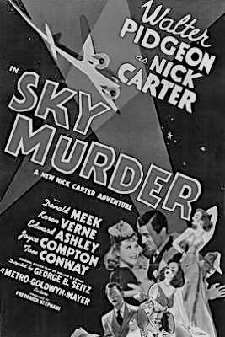 SKY MURDER (1940)
SKY MURDER (1940) (72 Min.) Genre: 1940 SUSPENSE, Transfer Quality: A
The last of MGM's "Nick Carter" trilogy, Sky Murder is a tad too cute and clever for its own good, but its mystery angle holds up pretty well. Returning from a weekend party, amateur sleuth Nick Carter (Walter Pidgeon) boards a private plane, where urbane Fifth Columnist Andrew Hendon (Tom Conway) is murdered in a locked compartment. Suspicion immediately falls upon refugee Pat Evans (Kaaren Verne), who was being blackmailed into helping Hendon smuggle secrets to the Nazis. Dividing his time between the land and the air, Carter is eventually able to expose the real murderer, and to smash the Nazi spy ring for good and all (or at least until the next spy movie). The film is hampered by the excessive comedy relief of Carter's self-appointed assistant Bartholomew the Bee Man (Donald Meek), who once upon a time was an amusing character. Far better attuned to the film's framework is perennial dumb blonde Joyce Compton, here cast as deceptively scatterbrained female detective Chris Cross. — Hal Erickson
Starring: Walter Pidgeon, Donald Meek, Kaaren Verne, Edward Ashley | Directed by: George B. Seitz
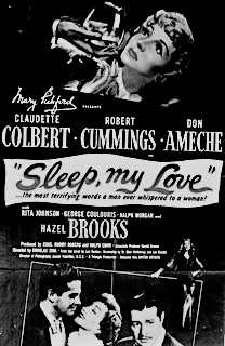 SLEEP, MY LOVE (1948)
SLEEP, MY LOVE (1948) (97 Min.) Genre: 1940 SUSPENSE, Transfer Quality: B
This noir mystery thriller was produced by Mary Pickford and her husband Buddy Rogers, and directed by Douglas Sirk. Claudette Colbert stars as Alison Courtland, a wealthy New York socialite who awakens on a Boston-bound train with no memory of how she got there. A kindly older woman, Mrs. Tomlinson (Queenie Smith) helps Alison call her husband Richard (Don Ameche), who informs her that she disappeared after threatening his life. While traveling back to New York, Alison meets Bruce Elcott (Robert Cummings), who is immediately smitten with her. Upon her return, Richard urges Alison to consult a psychiatrist, Charles Vernay (George Coulouris), but the man's bizarre, abusive manner nearly drives Alison mad. Alison's condition, Vernay, and even the helpful Mrs. Tomlinson are all part of an elaborate scheme on the part of Richard and his mistress, Daphne (Hazel Brooks) to get drive Alison to suicide and collect her fortune. A concerned Bruce visits Vernay, who is really a photographer, and begins piecing the scheme together.
Starring: Claudette Colbert, Don Ameche, Hazel Brooks, Rita Johnson, George Coulouris, Raymond Burr, Queenie Smith, Keye Luke | Directed by: Douglas Sirk
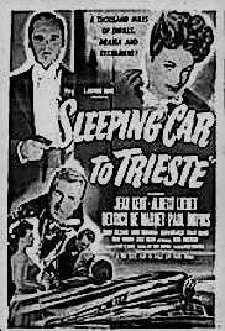 SLEEPING CAR TO TRIESTE (1945)
SLEEPING CAR TO TRIESTE (1945) (95 Min.) Genre: 1940 SUSPENSE, Transfer Quality: B
Sleeping Car to Trieste is a remake of one of the best railroad melodramas of the 1930s, Rome Express. The film's "maguffin" is a diary containing important political information. Stolen from a diplomat in Paris, the diary finds its way on board the Orient Express. Already, the two thieves have double-crossed each other, and among the passengers there are plenty of interested parties-heroes and villains alike-who hope to claim the diary for their own purposes. When one of these parties is murdered, police chief Jolif (Paul Dupuis) takes charge of the case, but there's still many a plot twist to come before the guilty are punished and the innocent rewarded. An inordinate amount of footage is devoted to the wisecrackery of Bonar Colleano, cast as yet another stereotyped American. The climax of Sleeping Car to Trieste is a classic, endlessly imitated by future-and lesser-Orient Express espionagers.
Starring: Jean Kent, Albert Lieven, Derrick de Marney, Paul Dupuis | Directed by: John Paddy Carstairs
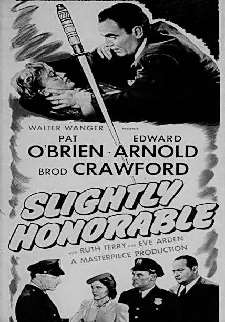 SLIGHTLY HONORABLE (1940)
SLIGHTLY HONORABLE (1940) (75 Min.) Genre: 1940 SUSPENSE, Transfer Quality: B
The successful producer-director combination of Walter Wanger and Tay Garnett served up another winner with Slightly Honorable. Adapted from F. G. Presnell's novel Send Another Coffin, the story concerns the efforts made by corrupt politician Cushing (Edward Arnold) to frame honest attorney John Webb (Pat O'Brien) for the murder of Alma Brehmer (Claire Dodd). In concert with his diligent and apparently slow-witted assistant Rus Sampson (Broderick Crawford), Webb hopes to squelch Cushing's plan by locating the real murderer-who turns out to be a lot closer to Webb than he'd ever imagined. Ruth Terry has one of her best screen roles as a birdbrained nightclub hoofer who helps Webb clear himself. Like many Walter Wanger productions of the period, Slightly Honorable is currently available on the public-domain video market.
Starring: Pat O'Brien, Edward Arnold, Broderick Crawford, Ruth Terry, Claire Dodd, Eve Arden, Evelyn Keyes | Directed by: Tay Garnett
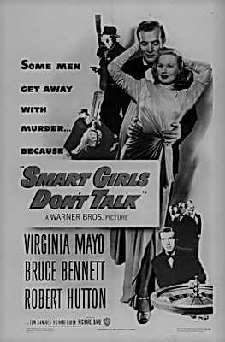 SMART GIRLS DON'T TALK (1948)
SMART GIRLS DON'T TALK (1948) (81 Min.) Genre: 1940 SUSPENSE, Transfer Quality: A
Despite the film's title, socialite Linda Vickers (Virginia Mayo) isn't smart enough to steer clear of the gambling den operated by gangster Marty Fain (Bruce Bennett). Forced to join Fain's operation, Linda gets mixed up with duplicity and murder-not to mention a torrid romance with the gangster chief. Interestingly enough, Fain is the more sympathetic of the two leading characters. He seems like a basically nice guy stuck with not-so-nice associates, while Linda comes off as surfacey and selfish. In the end, however, it must be proven to the satisfaction of the censors that crime doesn't pay, especially when the life of Linda's brother "Doc" (Robert Hutton) is at stake. — Hal Erickson
Starring: Virginia Mayo, Bruce Bennett, Tom D'Andrea, Richard Rober | Directed by: Richard L. Bare
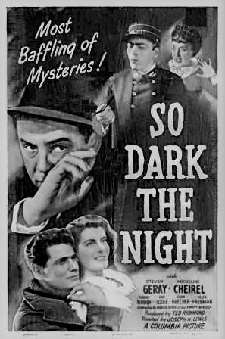 SO DARK THE NIGHT (1946)
SO DARK THE NIGHT (1946) (71 Min.) Genre: 1940 SUSPENSE, Transfer Quality: B
This well-plotted and executed film noir suffered from its lack of star power, but has become something of a cult classic. Steven Geray stars as Henri Cassin, a French detective from the Paris Surete, who takes his first vacation in many years to St. Margot and the country inn of the Michaud family. There, he falls in love with the innkeeper's daughter Nanette (Micheline Cheirel), who is already engaged to a local farmer, Leon Archard (Paul Marion). Urged to pursue a romance with Cassin by her social-climbing mother, Nanette agrees to wed the lawman. Leon pledges that he will never stop pursuing Nanette, and when she runs off, Cassin realizes that his betrothed loves another. When Nanette is found strangled to death, Cassin believes that the obvious suspect is Leon, but soon he is also found murdered. His only clues are some handwriting and a footprint, so Cassin returns to Paris, where his investigative techniques put him on the trail of the killer.
Starring: Steven Geray, Micheline Cheirel, Eugene Borden, Ann Codee, Egon Brecher | Directed by: Joseph H. Lewis
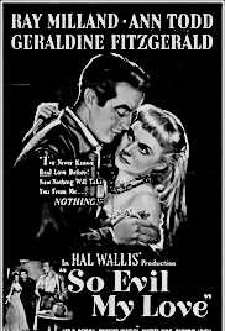 SO EVIL MY LOVE (1948)
SO EVIL MY LOVE (1948) (109 Min.) Genre: 1940 SUSPENSE, Transfer Quality: A
Taking advantage of Paramount's "frozen funds" in Britain, producer Hal Wallis was able to film much of So Evil My Love in London. Based on a novel by Joseph Shearing, whose previous Gothic romances included Moss Rose and Blanche Fury, the film stars Ray Milland in his first (but hardly his last) all-out villainous characterization. Milland is cast as charming scoundrel Mark Bellis, or at least that's what he's calling himself at the moment. Escaping his latest criminal escapade by boat, Bellis falls victim to a malaria epidemic. Nursed back to health by young widow Olivia Harwood (Ann Todd), Bellis repays the favor by pretending to fall in love with her, all the while intending to deplete her of her estate and bank account. Eventually Bellis' evil nature corrupts Olivia as well, prompting her to indulge in blackmail, with her old school friend Susan Courtney (Geraldine Fitzgerald) as the victim. Eventually, Olivia is driven to commit murder, carefully arranging the evidence to convict poor Susan. But when Bellis double-crosses her one time too many, Olivia belatedly does the "right thing," clearing her conscience if not her good name. — Hal Erickson
Starring: Ann Todd, Ray Milland, Geraldine Fitzgerald, Moira Lister | Directed by: Lewis Allen
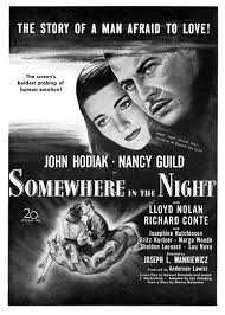 SOMEWHERE IN THE NIGHT (1946)
SOMEWHERE IN THE NIGHT (1946) (108 Min.) Genre: 1940 SUSPENSE, Transfer Quality: A
George Taylor (John Hodiak) is a war veteran suffering from amnesia with only two clues to his past: the bitter letter from a woman who hates him and another mysterious letter signed "Larry Cravat." Taylor goes to Los Angeles to meet Cravat. It turns out that Cravat is wanted for murder and the robbery of $2 million. George becomes involved with a singer, Christy (Nancy Guild) and is chased by mobsters while on a search for the stolen money. There ensue a series of chases, an interesting plot twist and a surprise ending as John learns the true identity of Cravat.Somewhere in the Night is the quintessential "amnesia victim" as protagonist film, somewhat slow, but nevertheless, engrossing and suspenseful. — Linda Rasmussen
Starring: John Hodiak, Nancy Guild, Lloyd Nolan, Richard Conte | Directed by: Joseph L. Mankiewicz
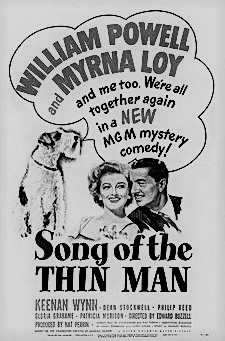 SONG OF THE THIN MAN (1947)
SONG OF THE THIN MAN (1947) (86 Min.) Genre: 1940 SUSPENSE, Transfer Quality: A
In the sixth and final Thin Man whodunit, Nick (William Powell) and Nora Charles (Myrna Loy) look into the mysterious killing of bandleader Tommy Drake (Phillip Reed). The police quickly hone in on the owner of a gambling ship, Phil Brant (Bruce Cowling), who was about to lose Drake's band to a competitor. Also among the many and varied suspects are: Phil's new wife, socialite Janet Thayar (Jayne Meadows); the band's voluptuous vocalist, Fran Page (Gloria Grahame); and the troubled clarinetist, Buddy Hollis (Don Taylor). With the assistance of jive-talking "Clinker" Krause (Keenan Wynn) and the clever terrier Asta, Nick and Nora are soon able to gather all the suspects at the reopening of the floating gaming establishment. In between the skullduggery and the usual wisecracks, Gloria Grahame performs a sultry version of Herb Magidson and Ben Oakland's "You're Not So Easy to Forget." — Hans J. Wollstein
Starring: William Powell, Myrna Loy, Keenan Wynn, Gloria Grahame | Directed by: Edward Buzzell
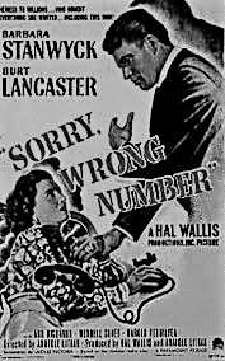 SORRY, WRONG NUMBER (1948)
SORRY, WRONG NUMBER (1948) (88 Min.) Genre: 1940 SUSPENSE, Transfer Quality: A
When Lucille Fletcher took on the challenge of expanding her classic 30-minute radio suspenser Sorry, Wrong Number into an 89-minute feature film, she opted on the Citizen Kane approach, filling the plotline to the brim with revelatory flashbacks. Barbara Stanwyck stars as bedridden hypochondriac Leona Stevenson, who while trying to make a call from her bedroom telephone gets her wires crossed and inadvertently overhears two men plotting a murder. Anxiously, Leona wades through telephone-company bureaucracy to trace the call, never catching on — until it's too late — that the murder being planned is hers. A series of flashbacks details the disintegrating marriage between the wealthy Leona and her weakling husband Henry (Burt Lancaster), and Henry's subsequent disastrous get-rich-quick schemes involving chemist Waldo Evans (Harold Vermilyea) and a surly gangster (William Conrad). It would have been a near-sacrilege to alter the radio play's ironic ending, which fortunately remains intact on film. Sorry Wrong Number was first heard on radio's Suspense series in 1943, with Agnes Moorehead as the harried Mrs. Stevenson (a role she'd repeat several times on radio and on stage). Though disappointed that she wasn't chosen to star in the film version, Moorehead took some satisfaction in the fact that a recording of the original radio program was played constantly on the set to help keep Barbara Stanwyck "in the mood". — Hal Erickson
Starring: Barbara Stanwyck, Burt Lancaster, Ann Richards, Wendell Corey | Directed by: Anatole Litvak
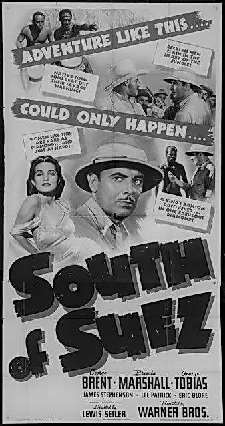 SOUTH OF SUEZ (1940)
SOUTH OF SUEZ (1940) (86 Min.) Genre: 1940 SUSPENSE, Transfer Quality: A
South of Suez is where diamond-mine foreman John Gamble (George Brent) plies his trade. When his boss is murdered, Gamble is held for murder, forcing him to take it on the lam. With the reluctant aid of heroine Katherine Sheffield (Brenda Marshall), Gamble endeavors to prove his innocence. He is finally cleared not because of any exceptional detective work, but through the bungling of the actual killer (no, his name will not be revealed here). Strictly B-grade material, South of Suez is a virtual compendium of stock shots from earlier Warner Bros. films. — Hal Erickson
Starring: George Brent, Brenda Marshall, George Tobias, James Stephenson | Directed by: Lewis Seiler
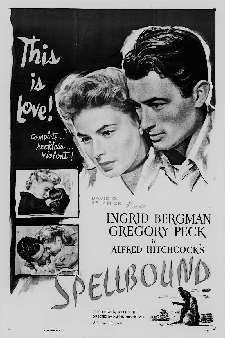 SPELLBOUND (1945)
SPELLBOUND (1945) (111 Min.) Genre: 1940 SUSPENSE, Transfer Quality: A
The staff of a posh mental asylum eagerly awaits the arrival of the new director. When the man in question shows up, it turns out to be handsome psychiatrist Gregory Peck. But something's wrong, here: Peck seems much too young for so important a position; his answers to the staff's questions are vague and detached; and he seems unusually distressed by the parallel marks, left by a fork, on a white tablecloth. Doctor Peterson Ingrid Bergman comes to the correct conclusion that Peck is not the new director, but a profoundly disturbed amnesiac—and, possibly, the murderer of the real director. Gradually falling in love with Peck, Bergman begins fearing for his well-being; she and Peck leave the asylum, hiding out in the home of her mentor, psychoanalyst Michael Chekhov. Though Chekhov warns that she might be protecting a killer, Bergman believes in Peck's innocence, and attempts throughout the remaining reels to get to the root of his emotional problems. — Hal Erickson
Starring: Ingrid Bergman, Gregory Peck, Jean Acker, Rhonda Fleming | Directed by: Alfred Hitchcock
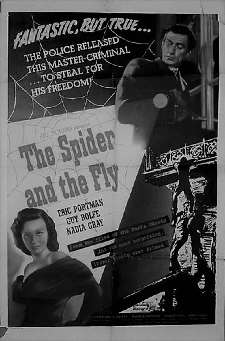 SPIDER AND THE FLY, THE (1949)
SPIDER AND THE FLY, THE (1949) (87 Min.) Genre: 1940 SUSPENSE, Transfer Quality: B
The Spider and the Fly is set in Paris during the cloud-cuckoo days before WW I. The storyline intertwines the destinies of three people. Guy Rolfe plays Phillipe de Ledocq, a resourceful safecracker who always manages to elude arrest. Eric Portman is cast as police-chief Maubert, who will not rest until Ledocq is behind bars. And Nadia Gray is Madeleine, the woman beloved by both Ledocq and Maubert. Just as Maubert has managed to capture his man, Ledocq is released at the behest of the government, who wants him to steal secrets from the German embassy revealing the whereabouts of the Kaiser's secret agents. And just how does Madeleine figure into all of this? Spider and the Fly is a diverting precursor to the 1960s TV series It Takes a Thief.
Starring: Eric Portman, Guy Rolfe, Nadia Gray, Edward Chapman | Directed by: Robert Hamer
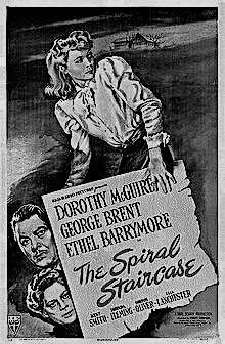 SPIRAL STAIRCASE (1946)
SPIRAL STAIRCASE (1946) (83 Min.) Genre: 1940 SUSPENSE, Transfer Quality: A
The wonderfully suspenseful psychological drama Spiral Staircase is the prototype of the "old dark house, lady in distress" thriller, full of dark corners, flickering candles and featuring a mysterious, menacing killer whose true identity remains hidden until the end. Helen Capel (Dorothy McGuire), mute because of a childhood trauma, cares for the owner of the house, the wealthy Mrs. Warren (Ethel Barrymore), a demanding, widowed invalid. Helen has quietly fallen in love with one of Mrs. Warren's sons, Dr. Parry (Kent Smith), who she believes to be a gentle and understanding man. Helen's peaceful life is changed forever when three local women, all with physical handicaps, are found murdered. The movie builds to a suspenseful conclusion as Helen finds herself in the midst of a life-and-death battle in the house, as the true identity of the murderer is revealed. Dorothy McGuire is exquisite as the innocent, sweet Helen and gives a totally convincing performance in the difficult role. She uses her expressive face to perfectly convey Helen's emotions, fear and ultimate bravery. Ethel Barrymore won an Academy Award nomination for her performance as Mrs. Warren and plays the difficult "Grande Dame" with great relish. Director Robert Siodmak, noted for his stylish direction of atmospheric suspense films, uses all his plot devices with great skill and craftsmanship, increasing the suspense and sense of foreboding as Helen is observed through the eyes of her stalker, who the audience sees only as a pair of menacing eyes. — Linda Rasmussen
Starring: Dorothy McGuire, George Brent, Ethel Barrymore, Kent Smith, Rhonda Fleming | Directed by: Robert Siodmak
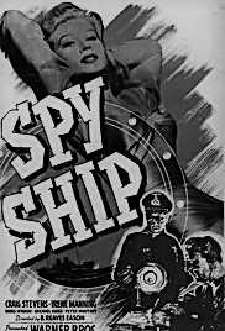 SPY SHIP (1942)
SPY SHIP (1942) (62 Min.) Genre: 1940 SUSPENSE, Transfer Quality: B
It takes a while for the viewer to catch on, but the 1942 quickie Spy Ship is a remake of the 1934 crime melodrama Fog Over Frisco. The main difference is that the film's principal murder victim, the sister of the heroine, is transformed from a dizzy socialite to an out-and-out villainess. The story is re-set during the months before America's entry into WW2. Famed aviatrix Pamela Mitchell (Irene Manning), a devout and outspoken isolationist, is secretly in the employ of the German government. Her younger sister Sue (Maris Wrixon) worries about the company Pamela keeps, and expresses these concerns to hotshot reporter Ward Prescott (Craig Stevens). When Pamela is killed by her Nazi confreres to keep her from revealing all to the world, Sue finds herself among the suspects. It all comes to an end on the spy ship of the title, where a kidnapped Sue is rescued in the nick of time by Ward and practically every cop in New York.
Starring: Craig Stevens, Irene Manning, Maris Wrixon, Peter Whitney | Directed by: B. Reeves "Breezy" Eason
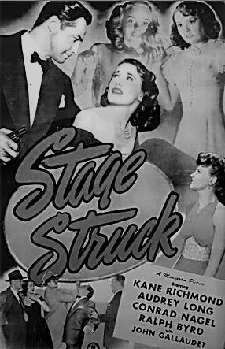 STAGE STRUCK (1948)
STAGE STRUCK (1948) (71 Min.) Genre: 1940 SUSPENSE, Transfer Quality: A
Though it is not so frankly identified in the film, an insidious white-slavery racket motivates the plotline of Monogram's Stage Struck. Double-dyed villain Nick Mantee (Kane Richmond) manages to make a good living by preying on young girls who've come to the Big City in hopes of becoming actresses. Mantee has built up a stable of disillusioned females who are forced to accommodate libidinous customers at a seedy nightclub. When one of the girls is murdered, the police, represented by Lt. Williams (Conrad Nagel), swing into action. Williams is aided in his racket-busting efforts by Nancy Howard (Audrey Long), sister of the murder victim. Onetime silent star Evelyn Brent is wasted in a tiny supporting role.
Starring: Audrey Long, Conrad Nagel, Kane Richmond, Ralph Byrd, Charles Trowbridge | Directed by: William Nigh
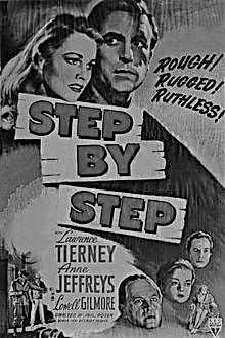 STEP BY STEP (1946)
STEP BY STEP (1946) (62 Min.) Genre: 1940 SUSPENSE, Transfer Quality: A
In this espionage drama, a WW II veteran teams up with a government secretary and begins hunting a gang of Nazi agents who are seeking the secret documents carried by the G-man they killed. The two heroes are hindered on their hunt by fellow government agents who believe the two are responsible for the FBI agent's death. Mayhem ensues until the two prove their innocence, capture the culprits, and save the US from fascism. — Sandra Brennan
Starring: Lawrence Tierney, Anne Jeffreys, Lowell Gillmore, George Cleveland | Directed by: Phil Rosen
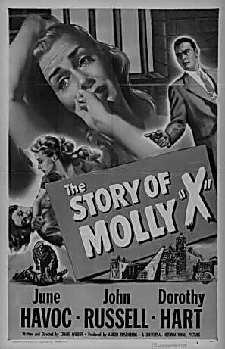 STORY OF MOLLY X, THE (1949)
STORY OF MOLLY X, THE (1949) (82 Min.) Genre: 1940 SUSPENSE, Transfer Quality: C
Crane Wilbur, whose film career stretched all the way back to The Perils of Pauline, brings the benefit of his accumulated directorial expertise to The Story of Molly X. The title character, played with verve by June Havoc, is a hard-bitten gun moll who takes over management of a criminal gang when her husband is bumped off. One of her first official acts as leader is to track down and personally kill the man responsible for her husband's death. The rest of the story deals with Molly X's efforts to evade detection by the law, and her ultimate hoisting on her own petard. Though the supporting-cast performances are wildly variable, June Havoc carries the dramatic and emotional weight of the film with sure-handed professionalism.
Starring: June Havoc, John Russell, Dorothy Hart, Connie Gilchrist | Directed by: Crane Wilbur
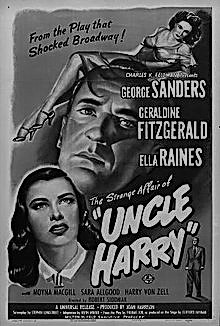 STRANGE AFFAIRS OF UNCLE HARRY, THE (1945)
STRANGE AFFAIRS OF UNCLE HARRY, THE (1945) (80 Min.) Genre: 1940 SUSPENSE, Transfer Quality: B
Fabric designer George Sanders has the unhappy task of caring for his tiresome unmarried sisters Geraldine Fitzgerald and Moyna McGill. When Sanders falls in love with Ella Raines, McGill is delighted, but Fitzgerald smolders with jealousy. Upset at Fitzgerald's opposition, Sanders would like nothing better than to do her in. Does he? And what has really happened here? When originally presented on Broadway, Thomas Job's play Uncle Harry utilized a complex flashback technique in unfolding its story, which was capped by a grimly ironic ending. Stephen Longstreet's screenplay not only takes a more linear approach, but also radically alters the ending to conform with the censorship strictures then in effect. The Strange Affair of Uncle Harry was one of several Universal film noirs of the 1940s produced by longtime Alfred Hitchcock associate Joan Harrison. — Hal Erickson
Starring: George Sanders, Ella Raines, Geraldine Fitzgerald, Sara Allgood | Directed by: Robert Siodmak
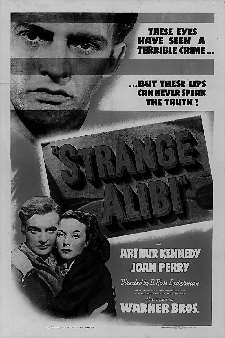 STRANGE ALIBI (1941)
STRANGE ALIBI (1941) (63 Min.) Genre: 1940 SUSPENSE, Transfer Quality: A
Strange Alibi offered young Warner Bros. contractee Arthur Kennedy to carry a picture all by himself. The star is cast as detective Joe Geary, who is suddenly and unexpectedly fired from the police force. Appararently embittered, Geary joins a criminal gang. Actually, it's all part of a scheme cooked up between Geary and police chief Sprague (Jonathan Hale) to infiltrate the mob. But the crooks get wise, bump off Sprague, and frame Geary for murder. It takes a jail break and a wild chase before Geary is able to clear himself. Critics in 1941 noted that a Warner Bros. B picture would have seemed incomplete without at least one prison scene. And isn't that a young Jackie Gleason as one of the bad guys? — Hal Erickson
Starring: Arthur Kennedy, Joan Perry, Jonathan Hale, Howard Da Silva | Directed by: David Ross Lederman
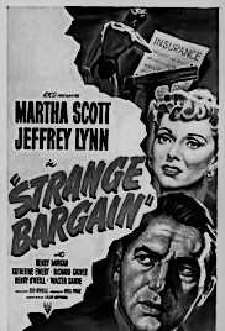 STRANGE BARGAIN (1949)
STRANGE BARGAIN (1949) (68 Min.) Genre: 1940 SUSPENSE, Transfer Quality: A
Jeffrey Lynn plays a bookkeeper who fails in his attempt to get a raise from his employer (Richard Gaines). The boss explains that the company is on the verge of bankruptcy, and that he is planning to kill himself. He offers Lynn $10,000 if Lynn will make the suicide look like murder so that the boss' family will collect on his insurance policy. Lynn agrees—and finds himself the fall guy in a complicated fraud scheme. Much of the footage of Strange Bargain showed up as flashbacks in a 1989 episode of TV's Murder, She Wrote. By removing the original happy ending, the TV installment allowed Jessica Fletcher (Angela Lansbury) solve the mystery of the boss' murder—and to exonerate the long-imprisoned bookkeeper, played again by Jeffrey Lynn! Also appearing on this remarkable Murder She Wrote were Lynn's surviving Strange Bargain costars Martha Scott and Harry Morgan. — Hal Erickson
Starring: Martha Scott, Jeffrey Lynn, Katherine Emery, Richard Gaines | Directed by: Will Price
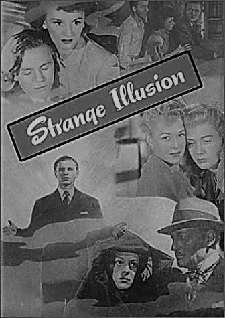 STRANGE ILLUSION (1945)
STRANGE ILLUSION (1945) (85 Min.) Genre: 1940 SUSPENSE, Transfer Quality: A
Strange Illusion is really several movies in one, part dark psychological chiller, part unsettling murder mystery, and part breezy B-movie thriller, although most of its plot is derived from Shakespeare's Hamlet. Jimmy Lydon, best-known to audiences for his screen portrayal of Henry Aldrich during the early '40s, plays Paul Cartwright, the son of a respected judge who died under mysterious circumstances two years earlier. Paul is haunted by nightmares in which his father warns him of danger to his mother, and in which a mysterious stranger seems to threaten him and his family. He dismisses these dreams until his mother (Sally Eilers) introduces him to a wealthy man back east, Brett Curtis (Warren William), who says some of the very same things that Paul heard from the mystery man in his dream. There's a lot to dislike about Curtis despite his smooth, genial ways — he seems too eager to please, and also offers an oily solicitousness to Paul's teenaged sister that's downright disturbing. Paul openly distrusts Curtis and opposes his mother's impending marriage to him. Most of those around him think Paul is overreacting and he is maneuvered into checking himself into a sanitarium run by a psychiatrist friend (Charles Arnt) of Curtis'. Trapped there and kept under constant surveillance, Paul is in danger, but he manages to find a clue that proves not only that his father's death was no accident, but that Curtis was involved in it. His discovery may be too late, however — not only is his life in jeopardy, but it turns out that Curtis is really a career criminal that Paul's father had pursued from the bench for years, and that his real goal, having killed the judge, is to destroy the judge's family, including Paul's mother and sister. The plot of Strange Illusion works on many levels, as mystery and a dark psychological study, and it is told so smoothly and well by director Edgar G. Ulmer and his cast, that it may require multiple viewings to fully appreciate, though it is enjoyable on any level. — Bruce Eder
Starring: Warren William, George H. Reed, Victor Potel, Regis Toomey | Directed by: Edgar G. Ulmer
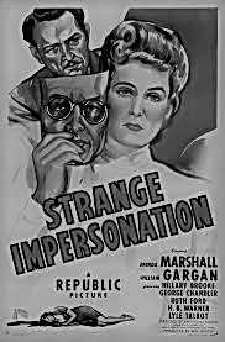 STRANGE IMPERSONATION (1946)
STRANGE IMPERSONATION (1946) (68 Min.) Genre: 1940 SUSPENSE, Transfer Quality: A
Nora Goodrich (Brenda Marshall) is a dedicated research scientist who is very close to a breakthrough in her field of anesthetics. She allows herself to be used as the subject of an experiment, and becomes the victim of sabotage by her jealous assistant (Hillary Brooke), who is her rival for the affections of the same man (William Gargan). Nora is scarred by the accident, but fate takes a hand when a vicious blackmailer (Ruth Ford), part of an extortion scam that was being worked on her, breaks in to her apartment. In the ensuing struggle, the lady grifter is killed and then mistaken for Nora, while the real Nora goes into hiding. Taking the identity of the dead woman, she realizes how she has been betrayed and maimed and plots an elaborate revenge, undergoing reconstructive surgery that changes her whole appearance. She then reintroduces herself into the lives of her former associates, in her new guise, and begins her revenge. Before her plans can be concluded, however, her masquerade backfires on her, when she finds herself accused by the police — of the murder of Nora Goodrich. — Bruce Eder
Starring: Richard Scott, Brenda Marshall, Lyle Talbot, Mary Treen | Directed by: Anthony Mann
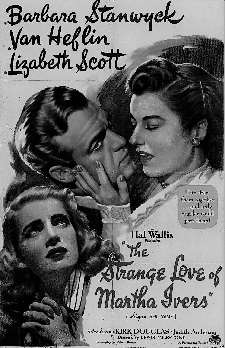 STRANGE LOVE OF MARTHA IVERS, THE (1946)
STRANGE LOVE OF MARTHA IVERS, THE (1946) (117 Min.) Genre: 1940 SUSPENSE, Transfer Quality: A
In The Strange Love of Martha Ivers, relationships formed in childhood lead to murder and obsessive love. The wealthy Martha Ivers (Barbara Stanwyck) is the prime mover of the small Pennsylvania town of Iverston. Martha lives in a huge mansion with her DA husband Walter O'Neill (Kirk Douglas), an alcoholic weakling. No one knows just why Martha and Walter tolerate one another....but Sam Masterson (Van Heflin), an Iverstown boy who returns to town, may just have a clue. At least that's what Martha thinks when Sam asks Walter to intervene in the case of Toni Marachek (Lizabeth Scott), who has been unjustly imprisoned. It seems that, as a young boy, Sam was in the vicinity when Martha's rich aunt (Judith Anderson) met with her untimely demise. What does Sam know? And what dark, horrible secret binds Martha and Walter together? Directed by Lewis Milestone, and based on John Patrick's Oscar-nominated original story, Love Lies Bleeding, The Strange Love of Martha Ivers creates in Martha a unique and interesting, driven, obsessed and spoiled character, but one not without sympathy. Barbara Stanwyck is outstanding as Martha, with her predatory smile and sharp, manicured nails. Kirk Douglas is surprisingly convincing as a lost, sad, weak man, who loves his wife, but is unable to gain her respect. The Strange Love of Martha Ivers eventually lapsed into public domain and became a ubiquitous presence on cable television. — Hal Erickson
Starring: Barbara Stanwyck, Van Heflin, Kirk Douglas, Lizabeth Scott | Directed by: Lewis Milestone
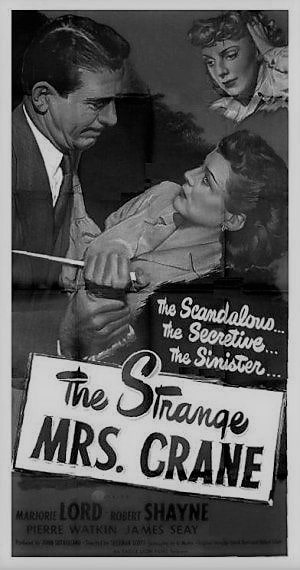 STRANGE MRS.CRANE, THE (1948)
STRANGE MRS.CRANE, THE (1948) (60 Min.) Genre: 1940 SUSPENSE, Transfer Quality: B
Strange Mrs. Crane stars Marjorie Lord, later famous as the TV wife of Danny Thomas (and the real-life mother of actress Anne Archer) in the atypical role of female crook Gina Crane. Hoping to bury her criminal past, Gina settles into a comfortable existence as the wife of politician Clinton Crane (Pierre Watkin). When her former associate Floyd Durant (Robert Shayne) shows up to blackmail Gina, she has no choice but to murder the man. Things take a bizarre turn when Barbara Arnold (Ruthe Brady) is charged with Durant's murder-and Gina Crane is selected to serve on the jury! Director Sherman Scott was actually the prolific Sam Newfield, taking a brief respite from his multitude of B-western series.
Starring: Marjorie Lord, Robert Shayne, Ruthe Brady, Pierre Watkin | Directed by: Sam Newfield
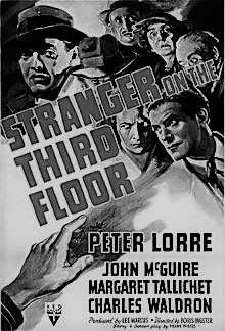 STRANGER ON THE THIRD FLOOR (1940)
STRANGER ON THE THIRD FLOOR (1940) (64 Min.) Genre: 1940 SUSPENSE, Transfer Quality: A
Though he doesn't speak his first line of dialogue until the film's final ten minutes, Peter Lorre spiritually dominates the fascinating RKO melodrama Stranger on the Third Floor. The plotline is carried by John McGuire, playing Ward, a newspaper reporter whose courtroom testimony sends the hapless Briggs (Elisha Cook Jr). to the death house. Ward is certain that he saw Briggs leaving the scene of a murder, but as the days pass, he is tortured by guilt and doubt — especially during the film's surrealistic knockout of a nightmare sequence. When another murder is committed, Ward finds himself as much a victim of circumstantial evidence as the unfortunate Briggs. The reporter's girlfriend (Margaret Tallichet) tries to clear Ward....and that's when she first makes the acquaintance of Lorre, who is heard ordering a pound of raw meat! Stranger on the Third Floor was a "film noir" before the genre was even officially invented. Long ignored or trivialized by film historians, this 7-reel quickie has in recent years graduated to classic status. — Hal Erickson
Starring: Peter Lorre, John McGuire, Margaret Tallichet, Elisha Cook, Jr. | Directed by: Boris Ingster
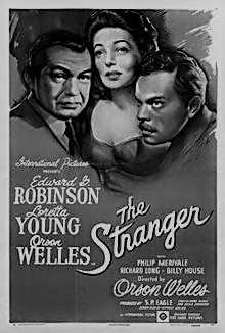 STRANGER, THE (1946)
STRANGER, THE (1946) (95 Min.) Genre: 1940 SUSPENSE, Transfer Quality: A
The Stranger is often considered Orson Welles' most "traditional" Hollywood-style directorial effort. Welles plays a college professor named Charles Rankin, who lives in a pastoral Connecticut town with his lovely wife Mary (Loretta Young). One afternoon, an extremely nervous German gentleman named Meineke (Konstantin Shayne) arrives in town. Professor Rankin seems disturbed—but not unduly so—by Meineke's presence. He invites the stranger for a walk in the woods, and as they journey farther and farther away from the center of town, we learn that kindly professor Rankin is actually notorious Nazi war criminal Franz Kindler. Conscience-stricken by his own genocidal wartime activities, Meineke has come to town to beg his ex-superior Kindler to give himself up. The professor responds by brutally murdering his old associate. If Kindler believes himself safe—and he has every reason to do so, since no one in town, especially Mary, has any inkling of his previous life—he will change his mind in a hurry when mild-mannered war crimes commissioner Wilson (Edward G. Robinson) pays a visit, posing as an antiques dealer. — Hal Erickson
Starring: Edward G. Robinson, Orson Welles, Loretta Young, Philip Merivale | Directed by: Orson Welles
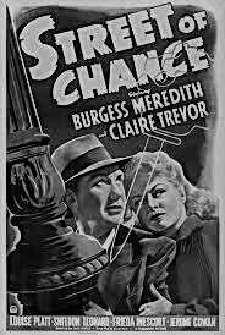 STREET OF CHANCE (1942)
STREET OF CHANCE (1942) (74 Min.) Genre: 1940 SUSPENSE, Transfer Quality: B
Based on Cornell Woolrich's novel The Black Curtain (later dramatized several times on the radio series Suspense), Street of Chance top-bills Burgess Meredith as an amnesia victim. He awakens in the middle of the street, with nary a clue of who he is or what he's done. Meredith comes to learn that his past year of darkness has been a crowded one--and that he might be a murderer! Louise Platt plays Meredith's wife, but it's total stranger Claire Trevor who seems most interested in probing Meredith's past. Street of Chance is worth spending 74 minutes with, even though the true identity of the killer becomes obvious halfway through.
Starring: Burgess Meredith, Claire Trevor, Sheldon Leonard, Ann Doran, Jerome Cowan | Directed by: Jack Hively
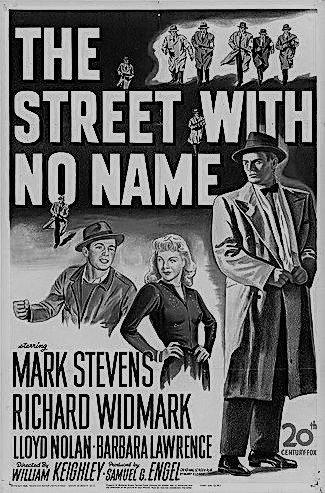 STREET WITH NO NAME, THE (1948)
STREET WITH NO NAME, THE (1948) (91 Min.) Genre: 1940 SUSPENSE, Transfer Quality: A
FBI operative Mark Stevens is dispatched by his boss Lloyd Nolan to infiltrate a criminal gang. Stevens ingratiates himself with Richard Widmark, the gang's leader, then helps concoct a robbery that will deliver the criminals into the hands of the authorities. But there's an informant in the police department, who gets word back to Widmark. Aware that there's a stoolie in his gang, Widmark automatically assumes that his wife Barbara Lawrence is the guilty party, and beats her senseless. Eventually determining that Stevens is the "mole," Widmark methodically plans to kill Stevens during a holdup; by this time, however, the FBI is a step or so ahead of him. Remade in 1955 by Samuel Fuller as House of Bamboo. — Hal Erickson
Starring: Mark Stevens, Richard Widmark, Lloyd Nolan, John McIntire | Directed by: William Keighley
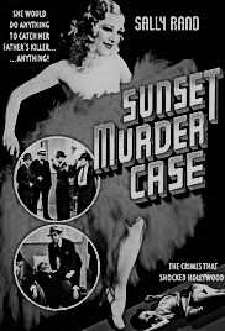 SUNSET MURDER CASE (1941)
SUNSET MURDER CASE (1941) (59 Min.) Genre: 1940 SUSPENSE, Transfer Quality: B
Celebrity fan-dancer Sally Rand, the undraped sensation of the 1933 Chicago World's Fair, was the star of the 1938 Grand National production The Sunset Murder Case. Borrowing a page from the Bob Steele westerns, La Rand is cast as a nightclub dancer who hopes to avenge her father's murderer. She gets a job in the establishment run by the man she holds responsible for the killing, maintaining a harmless front by performing a nightly exotic dance (which by 1990s standards is about as erotic as a plastic shower curtain). In his first leading role, Reed Hadley plays the hero who rescues Sally in the nick of time, while Henry King's orchestra provides the music. In perpetual reissue well into the 1940s and 1950s (this synopsis is based on its 1941 re-release), Sunset Murder Case was sometimes retitled The Sunset Strip Case on the grind-house circuit.
Starring: Sally Rand, Reed Hadley, Dennis Moore, Paul Sutton | Directed by: Louis J. Gasnier
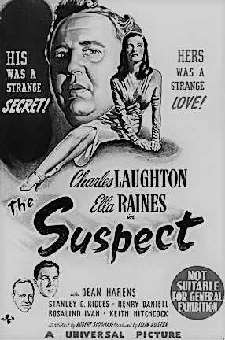 SUSPECT, THE (1944)
SUSPECT, THE (1944) (85 Min.) Genre: 1940 SUSPENSE, Transfer Quality: B
The Suspect is a well turned out period melodrama, with an excellent leading performance by Charles Laughton. He plays an amiable, hopelessly henpecked shopkeeper who yearns for the affections of pretty stenographer Ella Raines. When he is pushed to brink by wife Rosalind Ivan, Laughton kills her, making the death look like the result of a fall down the stairs. Detective Stanley Ridges, not altogether unsympathetic to Laughton, suspects foul play, but decides to bide his time and allow the suspect to trip himself up. Laughton is on the verge of getting off scot free when he makes the error of trying to stifle his blackmailing neighbor Henry Daniell. Based on the novel This Way Out by James Ronald, this is one of the most thoroughly satisfying American films of mercurial German director Robert Siodmak. — Hal Erickson
Starring: Charles Laughton, Ella Raines, Dean Harens, Rosalind Ivan | Directed by: Robert Siodmak
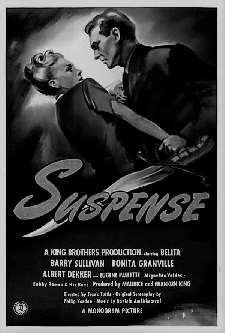 SUSPENSE (1946)
SUSPENSE (1946) (101 Min.) Genre: 1940 SUSPENSE, Transfer Quality: A
If Republic's skating star Vera Hruba Ralston could go "dramatic", so too could Monogram's skating star Belita. Produced by the enterprising King Brothers, Suspense takes place in an ice-skating emporium owned by Frank Leonard (Albert Dekker). No-good heel Joe Morgan (Barry Sullivan) not only strongarms Leonard into sharing the establishment's profits, but also tries to move in on Leonard's wife Roberta (Belita). The plot thickens when Leonard is apparently killed by Morgan, only to return from the dead! But what really does Morgan in is his own checkered past, as personified by his vengeful ex-sweetheart Ronnie (Bonita Granville, in a truly offbeat characterization). Belita's ice-skating solos (staged by Nick Castle) and Philip Yordan's overly complicated script tend to weigh down the proceedings; still, Suspense deserves to be seen, if for no other reason than its dazzling opening sequence.
Starring: Belita, Barry Sullivan, Bonita Granville, Albert Dekker, George E. Stone, Eugene Pallette | Directed by: Frank Tuttle
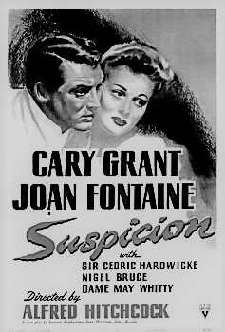 SUSPICION (1941)
SUSPICION (1941) (99 Min.) Genre: 1940 SUSPENSE, Transfer Quality: A
Wealthy, sheltered Joan Fontaine is swept off her feet by charming ne'er-do-well Cary Grant. Though warned that Grant is little more than a fortune-hunter, Fontaine marries him anyway. She remains loyal to her irresponsible husband as he plows his way from one disreputable business scheme to another. Gradually, Fontaine comes to the conclusion that Grant intends to do away with her in order to collect her inheritance...a suspicion confirmed when Grant's likeable business partner Nigel Bruce dies under mysterious circumstances. To his dying day, Hitchcock insisted that he wanted to retain the novelist Francis Iles' original ending, but that the RKO executives intervened. Fontaine won an Academy Award for her work. — Hal Erickson
Starring: Cary Grant, Joan Fontaine, Cedric Hardwicke, Nigel Bruce | Directed by: Alfred Hitchcock
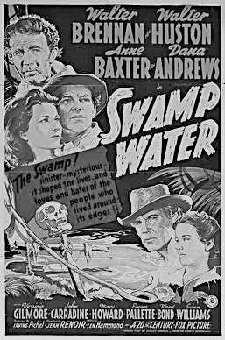 SWAMP WATER (1941)
SWAMP WATER (1941) (90 Min.) Genre: 1940 SUSPENSE, Transfer Quality: B
Noted French director Jean Renoir made his American debut with this 1941 film. Walter Brennan plays Tom Keefer, a man who is falsely convicted of a murder and sentenced to death by hanging. He has escaped from prison and is hiding out in Georgia's Okefenokee Swamp. Keefer is dedicated to finding the real killer and clearing his name. A trapper, Ben Ragan (Dana Andrews), is out searching for his dog when he finds Keefer hiding in the swamp. Ben believes the man's tale of being falsely railroaded. The two men trap animals, and Ben sells the furs, while his father (Walter Huston) eats the meat. Keefer tells Ben to give his share of the money from their pelt sales to his daughter, Julie (Anne Baxter). Ben eventually falls in love with Julie, arousing the wrath of Ben's girlfriend Mabel (Virginia McKenzie), who tells authorities about Keefer's secret. Ben, however, refuses to cooperate with officials' efforts to locate the escaped convict. Swamp Water was released in Great Britain under the title The Man Who Came Back. It was remade in 1952 as Lure of the Wilderness, with Brennan playing the same role.
Starring: Walter Brennan, Walter Huston, Anne Baxter, Dana Andrews | Directed by: Jean Renoir
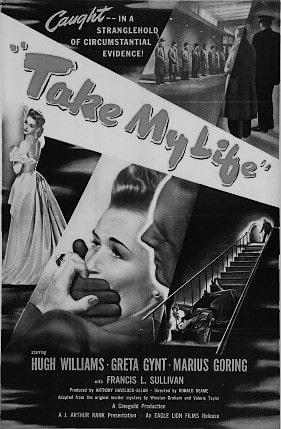 TAKE MY LIFE (1947)
TAKE MY LIFE (1947) (79 Min.) Genre: 1940 SUSPENSE, Transfer Quality: B
Cinematographer Ronald Neame made his directorial debut with the 1947 murder melodrama Take My Life. When a Covent Garden violinist is found murdered, her ex-lover, show business manager Nicholas Talbot (Hugh Williams) finds himself under suspicion. The only person who believes that Talbot is innocent is his wife, opera diva Phillipa Shelley (Greta Gynt). Unable to convince the authorities, Phillipa plays detective herself, utilizing a snatch of a newly written song as her main clue to the true killer's identity. If the mysterious murderer isn't all that mysterious to the audience, it is only because the actor in question had played too many similar roles in the past.
Starring: Hugh Williams, Greta Gynt, Marius Goring, | Directed by: Ronald Neame
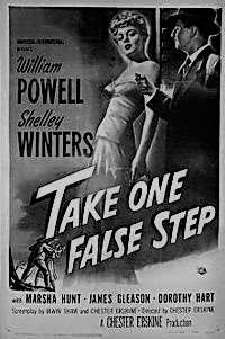 TAKE ONE FALSE STEP (1949)
TAKE ONE FALSE STEP (1949) (94 Min.) Genre: 1940 SUSPENSE, Transfer Quality: B
William Powell stars in Take One False Step as a happily married college professor who foolishly agrees to a reunion supper with old flame Shelley Winters. Winters later disappears, and the evidence points to murder. To allay suspicion—and to avoid losing an important financial grant to his university—Powell starts his own investigation. The trail leads him to San Francisco, where poor Powell becomes mired in a confusing crime plot. Fortunately, Winters is still alive; unfortunately, Powell may not be for long. Adapted from the Irwin Shaw novel Night Call, Take One False Step is saved from tawdriness by the innate dignity of William Powell. Also, the film is leavened by unexpected moments of humor, notably the relaxed banter between Powell and Shelley Winters.
Starring: William Powell, Shelley Winters, Marsha Hunt, Dorothy Hart | Directed by: Chester Erskine
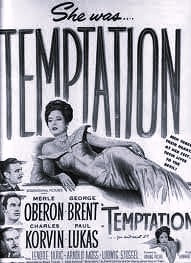 TEMPTATION (1946)
TEMPTATION (1946) (92 Min.) Genre: 1940 SUSPENSE, Transfer Quality: B
Temptation is an appropriately moody romantic melodrama, providing a golden opportunity for some memorable histrionics by star Merle Oberon. Set in Egypt (courtesy of the Universal backlot), the film casts Oberon as Ruby, the new wife of wealthy archaeologist Nigel (George Brent). Unbeknownst to her husband, Ruby has had quite a checkered past, involving several divorces and gosh only knows how many extramarital affairs. While Nigel is out digging up an ancient mummy, Ruby takes up with Baroudi (Charles Korvin), a slick but impoverished Egyptian opportunist. When Baroudi threatens to leave Ruby unless she puts her husband out of the way, she methodically begins to poison the unwitting Nigel. Only in the last few minutes does Ruby realize that she's throwing her life away -- not to mention her husband's -- for a no-good heel, setting the stage for a spectacular revenge-and-retribution finale. Temptation was International Pictures' final production before its merger with Universal.
Starring: Merle Oberon, George Brent, Charles Korvin, Paul Lukas, Lenore Ulric | Directed by: Irving Pichel
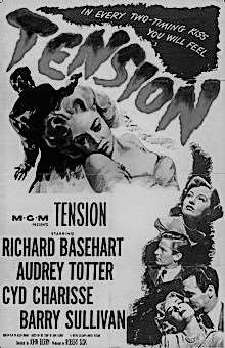 TENSION (1949)
TENSION (1949) (91 Min.) Genre: 1940 SUSPENSE, Transfer Quality: A
Warren Quimby (Richard Basehart), a quiet, mild-mannered druggist, upon learning that his wife Claire (Audrey Totter) intends to leave him, begins to create a second identity to serve as an alibi when he kills his wife and her lover. Using this new identity, he meets and falls in love with Mary (Cyd Charisse) who gives him reason for not going through with his plans. However, when he visits the beach house where his wife and her lover Barney (Lloyd Gough) were staying, he finds that Barney has been murdered. Warren is now the chief suspect in the case and must prove his innocence. Tension is a taut thriller developed with noir motifs and style. Audrey Totter playing Claire, is the classic femme-fatale, cynical and cold, leading men to their doom. Warren is the weak man trapped in a pointless world. Director John Berry has filled the film with low-key images and well-developed characters: Warren's desperation leaves him no room for salvation, and his obsession with his wife's infidelity pushes him over the edge of reason. — Linda Rasmussen
Starring: Richard Basehart, Audrey Totter, Cyd Charisse, Barry Sullivan | Directed by: Johm Berry
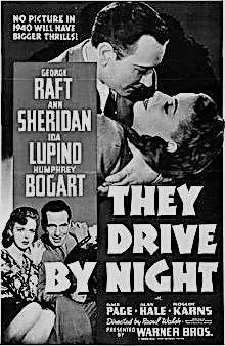 THEY DRIVE BY NIGHT (1940)
THEY DRIVE BY NIGHT (1940) (96 Min.) Genre: 1940 SUSPENSE, Transfer Quality: A
They just don't make 'em like They Drive By Night anymore. This slam-bang Warner Bros. attraction stars George Raft and Humphrey Bogart as Joe and Paul Fabrini, owners of a small but scrappy trucking firm. The film deftly combines comedy with thrills for the first half-hour or so, as the Fabrini boys battle crooked distributors and unscrupulous rivals while establishing their transport company. Things take a potentially tragic turn when the overworked Paul Fabrini falls asleep at the wheel and cracks up, losing an arm in the accident. He's pretty bitter for a while, but, with the help of his loving wife, Pearl (Gale Page), Paul eventually snaps out of his self-pity and goes to work as a dispatcher for the Fabrinis' company. Meanwhile, Joe's on-and-off romance with wisecracking waitress Cassie Hartley (Ann Sheridan) is threatened by the presence of seductive Lana Carlsen (Ida Lupino), the wife of glad-handing trucking executive Ed Carlsen (Alan Hale). At this point, the film metamorphoses into a remake of the 1935 Paul Muni-Bette Davis vehicle Bordertown. Desperately in love with Joe, Lana murders her husband, making it look like an accident, then offers Joe half-interest in Carlsen's organization. Joe accepts the offer, but spurns Lana's romantic overtures, whereupon the scheming vixen accuses Joe of plotting Carlsen's murder. Thus, the stage is set for a spectacular courtroom finale, completely dominated by a demented Lana, whose "mad scene" rivals those of Ophelia and Lucia di Lammermoor. In addition to the full-blooded performances by the stars and the virile direction by Raoul Walsh, They Drive By Night benefits immeasurably from the nonstop brilliant dialogue by Jerry Wald and Richard Macaulay — especially in an early lunch-counter scene between Ann Sheridan and George Raft, generously seasoned with hilarious double- and single-entendres. — Hal Erickson
Starring: George Raft, Humphrey Bogart, Ann Sheridan, Ida Lupino, Gale Page | Directed by: Raoul Walsh
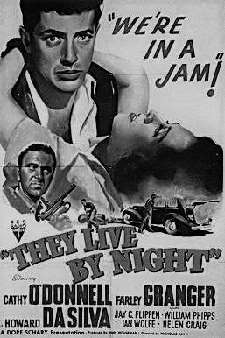 THEY LIVE BY NIGHT (1948)
THEY LIVE BY NIGHT (1948) (95 Min.) Genre: 1940 SUSPENSE, Transfer Quality: A
This boy...and this girl...were never properly introduced to the world we live in. With this superimposed opening title, director Nicholas Ray inaugurates his first feature, They Live by Night. Farley Granger and Cathy O'Donnell play a "Bonnie and Clyde"-type fugitive couple, who in trying to escape their past are hell-bent down the road to Doom. Despite their criminal activities, Bowie (Granger) and Keechie (O'Donnell) are hopelessly naïve, fabricating their own idyllic dream world as the authorities close in. The entrapment — both actual and symbolic — of the young misfit couple can now be seen as a precursor to the dilemma facing James Dean in Ray's 1955 film Rebel Without a Cause. A box-office disappointment upon its first release, They Live by Night has since gained stature as one of the most sensitive and least-predictable entries in the film noir genre. The film was based on a novel by Edward Anderson, and in 1974 was filmed by Robert Altman under its original title, Thieves Like Us. — Hal Erickson
Starring: Farley Granger, Cathy O'Donnell, Howard Da Silva, Jay C. Flippen | Directed by: Nicholas Ray
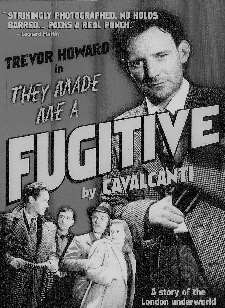 THEY MADE ME A FUGITIVE (1947)
THEY MADE ME A FUGITIVE (1947) (103 Min.) Genre: 1940 SUSPENSE, Transfer Quality: B
Clem Morgan (Trevor Howard), an embittered ex-RAF pilot, mistakenly believes the life of crime is for him in this exceptionally dark British film noir, directed by Alberto Cavalcanti. He joins a gang of black marketeers led by the aptly named Narcey (short for Narcissus) (Griffith Jones), an egotistical and sadistic thug. The two develop an almost immediate mutual dislike, leading Narcey to frame Morgan for killing a policeman. While serving the resulting 15-year sentence, Morgan is visited by Narcey's sometime girlfriend Sally (Sally Gray), who tells him that the thug has taken up with the prisoner's fiancée, and that a witness to the frame might come forward. This triggers an even more bitter Morgan to escape and return to London to try to clear and avenge himself. Many postwar American films noirs dealt with alienated but law-abiding veterans, some of them framed for crimes they did not commit, e.g. Alan Ladd's Johnny Morrison in The Blue Dahlia. This British effort goes a noteworthy step further by placing the protagonist in the criminal underworld. Its downbeat ending is consistent with its unrelenting cynicism.
Starring: Sally Gray, Trevor Howard, Renee Ray, Sebastian Cabot, Vida Hope | Directed by: Alberto Cavalcanti
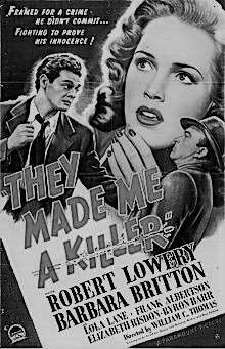 THEY MADE ME A KILLER (1946)
THEY MADE ME A KILLER (1946) (64 Min.) Genre: 1940 SUSPENSE, Transfer Quality: B
This Pine-Thomas Production was scripted by Geoffrey Homes (aka Daniel Mainwaring), best known as the author of the novel upon which the "film noir" classic Out of the Past was based. Robert Lowery plays victim-of-circumstance Tom Durling, in the wrong place at the wrong time when a bank robbery occurs. As the only witness to the crime, Durling is sought after by June Reynolds (Barbara Britton), who wants to prove that her brother, killed in the holdup, was innocent of complicity. Trouble is, the police have fingered Durling as their primary suspect, so he naturally wants to remain scarce. By film's end, however, Durling and June have taken it upon themselves to track down the villains. Unusual for its time was the film's depiction of its policeman characters, who are shown to be reasonable and intelligent rather than conclusion-jumping and dull-witted.
Starring: Robert Lowery, Barbara Britton, Frank Albertson, Lola Lane, Gig Young | Directed by: William C. Thomas
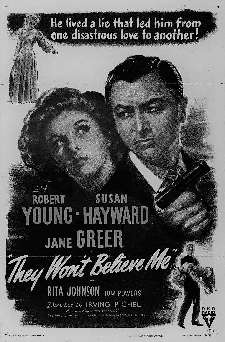 THEY WON'T BELIEVE ME (1947)
THEY WON'T BELIEVE ME (1947) (95 Min.) Genre: 1940 SUSPENSE, Transfer Quality: A
Irving Pichel's They Won't Believe Me is the flashback unfolding of Larry Ballentine's (Robert Young) witness-stand testimony in his trial for the murder of girlfriend Verna Carlson (Susan Hayward). Larry is the first to admit he's a parasitic heel, cheating on his rich wife Gretta (Rita Johnson) first with magazine writer Janice Bell (Jane Greer) and then with Verna. Though aware of Larry's affairs, Gretta cannot manage to leave him; rather, she uses her money to keep him in tow. She foils his attempt to run off with Janice by buying him a partnership in a brokerage firm. When she discovers his plan to flee with Verna, she sells her interest, leaving Larry unemployed and penniless. The lovers run off nonetheless, but Verna is killed when a truck crashes into their car. When the authorities assume the charred victim is his wife, Larry gets a sinister idea. He returns home to kill Gretta, but she is already dead, so all he has to do is hide the body. Unfortunately for him, the police come looking for the missing Verna, who they suspect was blackmailing him. They find Gretta's unrecognizable corpse, think it's Verna's, and arrest Larry. The flashback structure of this suspenseful film noir effectively creates a foreboding tension that mounts to a powerful final scene. — Steve Press
Starring: Robert Young, Susan Hayward, Rita Johnson, Tom Powers | Directed by: Irving Pichel
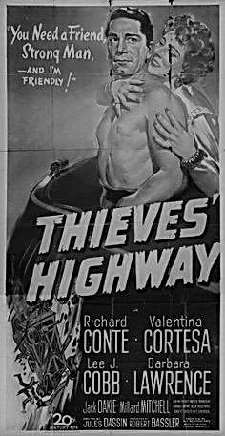 THIEVES' HIGHWAY (1949)
THIEVES' HIGHWAY (1949) (94 Min.) Genre: 1940 SUSPENSE, Transfer Quality: A
Thieves' Highway is set in San Francisco and the surrounding countryside. Richard Conte plays Nick Garcos, an American GI who returns from WWII to find that his father Yanko (Morris Carnovsky), a produce trucker, has lost the use of both legs because of a fight with crooked truck driver Mike Figlia (Lee J. Cobb). Nick is a clean-cut guy who was set on marrying his sweetheart Polly Faber (Barbara Lawrence). Instead, Nick gets embroiled in his father's feud with Mike, buying a truck and falling deeper into racketeering. He delivers a truckload of apples to Mike as part of a scheme to expose his cheating. A prostitute, Rica (Valentina Cortesa), tells Nick that Mike has his own plot to trap him. Nick and Rica help Mike's henchmen learn that Mike has also been cheating them, and Nick eventually gets his revenge. But Nick has permanently lost Polly because of his involvement with the gangsters and his change in personality from a good guy to a more sinister businessman. Director Jules Dassin was blacklisted from Hollywood for supposed communist sympathies after making this 1949 picture, but he went on to have success with more caper movies while in exile in France. — Michael Betzold
Starring: Richard Conte, Valentina Cortese, Lee J. Cobb, Jack Oakie, Barbara Lawrence | Directed by: Jules Dassin
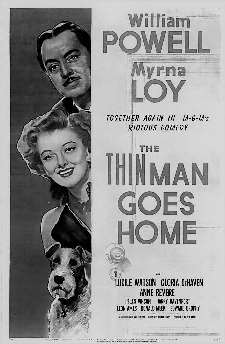 THIN MAN GOES HOME, THE (1944)
THIN MAN GOES HOME, THE (1944) (100 Min.) Genre: 1940 SUSPENSE, Transfer Quality: A
This fifth entry in MGM's off-and-on "Thin Man" series maintains the high production and story values of the first four. Per the title, retired private detective Nick Charles (William Powell) pays a visit to his home town of Sycamore Springs, with wife Nora (Myrna Loy) in tow. Poor Nick is amusingly browbeaten by his parents (Harry Davenport and Lucile Watson), who wanted their boy to study medicine, is frustrated by the fact that there isn't a good stiff drink to be had in town, and is hilariously defeated by a recalcitrant hammock. In a more serious vein, Nick and Nora become involved in international intrigue while investigating the murder of a local house painter. If the identity of the murderer seems obvious today, it is only because the actor in question has played so many "surprise killers" in other films of this genre. A refreshing change of pace for the usually urbanized "Thin Man" series, The Thin Man Goes Home features such colorful suspects as Gloria DeHaven, Edward Brophy, Lloyd Corrigan, Leon Ames, and, best of all, Ann Revere as a local eccentric named "Crazy Mary". — Hal Erickson
Starring: William Powell, Myrna Loy, Lucile Watson, Gloria de Haven | Directed by: Richard Thorpe
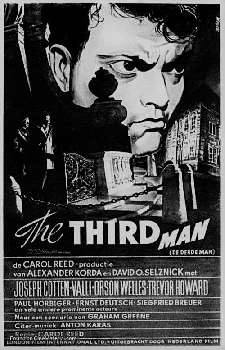 THIRD MAN, THE (1949)
THIRD MAN, THE (1949) (100 Min.) Genre: 1940 SUSPENSE, Transfer Quality: A
In this Cold War spy classic, Holly Martins (Joseph Cotten), a third-rate American pulp novelist, arrives in postwar Vienna, where he has been promised a job by his old friend Harry Lime (Orson Welles). Upon his arrival, Martins discovers that Lime has been killed in a traffic accident, and that his funeral is taking place immediately. At the graveside, Martins meets outwardly affable Major Calloway (Trevor Howard) and actress Anna Schmidt (Alida Valli), who is weeping copiously. When Calloway tells Martins that the late Harry Lime was a thief and murderer, the loyal Martins is at first outraged. Gradually, he discovers not only that Calloway was right but also that the man lying in the coffin in the film's early scenes was not Harry Lime at all—and that Lime is still very much alive (he was the mysterious "third man" at the scene of the fatal accident). Thus the stage is set for the movie's famous climactic confrontation in the sewers of Vienna—and the even more famous final shot, in which Martins pays emotionally for doing "the right thing." Written by Graham Greene, The Third Man is an essential classic, made even more so by the insistent zither music of Anton Karas. The film is currently available in both an American and British release version; the American print, with an introduction by Joseph Cotten, is slightly shorter than the British version, which is narrated by director Carol Reed. Nominated for several Academy Awards, The Third Man won Best Cinematography for Robert Krasker. — Hal Erickson
Starring: Joseph Cotton, Orson Welles, Alida Valli, Trevor Howard | Directed by: Carol Reed
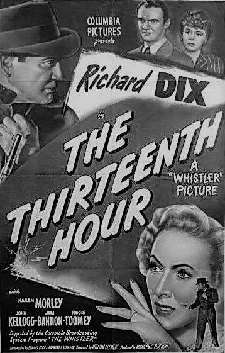 THIRTEENTH HOUR, THE (1947)
THIRTEENTH HOUR, THE (1947) (65 Min.) Genre: 1940 SUSPENSE, Transfer Quality: B
The last of the Richard "The Jaw" Dix films. Dix, the trucking company owner, is pitted against time to discover who murdered a police officer rival of his. He must do so to clear his own name, as the murder was pinned on him.
Starring: Richard Dix, Ernie S. Adams, Jim Bannon, Jack Carrington | Directed by: William B. Clemens
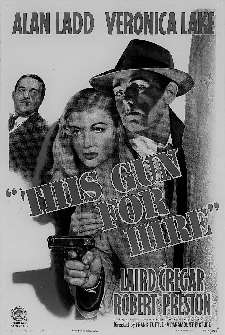 THIS GUN FOR HIRE (1942)
THIS GUN FOR HIRE (1942) (80 Min.) Genre: 1940 SUSPENSE, Transfer Quality: A
Though billed fourth in This Gun For Hire, Alan Ladd was catapulted to stardom in the role of Phillip Raven, a ruthless professional killer with a long-suppressed streak of decency. After successfully pulling off his latest murder, Raven reports to his boss, effeminate fifth columnist Willard Gates (Laird Cregar). He collects his $1000 fee, only to discover later that Gates has double-crossed him with marked bills. This was done at the behest of Gates' boss, crooked business executive Alvin Bewster (Tully Marshall), who wants no loose ends left around to connect him with a plot to sell poison gas to the Axis. As Raven ducks and dodges the police, detective Michael Crane (Robert Preston) is hot on the trail of Bewster and Gates. Crane talks his girlfriend, nightclub singer-musician Ellen Graham (Veronica Lake), into taking a job at Gates' nightclub. While on the train to the club, Ellen makes the acquaintance of the escaping Raven. Gates boards the train, spots Ellen innocently sitting next to Raven, and assumes that the two are in cahoots. Later, Gates kidnaps Ellen and spirits her away to his mansion, intending to do away with her the first chance he gets. Instead, Raven, still seeking revenge for being set up, bursts into the mansion in search of Gates. Having previously been impressed by Ellen's kindness, he rescues her, though he intends using her as hostage should the police catch up with him. As they hide out together in the rail yards, Ellen and Raven get to know each other. Learning of Raven's miserable, abusive childhood, Ellen tries to chip away his murderous veneer, hoping to reform him. But when the cops arrive, Raven reverts to his instincts, shooting his way out of his hiding place. As Crane escorts Ellen out of harm's way, Raven rushes towards a bloody showdown with Bewster and Gates. Based on Graham Greene's A Gun For Sale, This Gun For Hire was remade in 1958 as Short Cut to Hell, then again under the original title as a 1990 made-for-TV film. — Hal Erickson
Starring: Veronica Lake, Robert Preston, Laird Cregar, Alan Ladd, | Directed by: Frank Tuttle
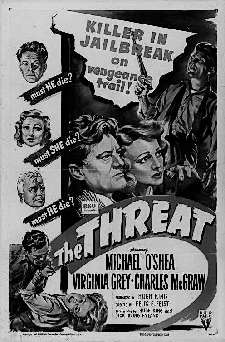 THREAT, THE (1949)
THREAT, THE (1949) (66 Min.) Genre: 1940 SUSPENSE, Transfer Quality: A
Homicidal criminal Charles McGraw busts out of jail, kidnapping the three people responsible for his incarceration. The hapless hostages include detective Michael O'Shea, district attorney Frank Conroy, and nightclub singer Virginia Grey. McGraw makes no secret of his plans to kill O'Shea and Conroy once he has successfully made a getaway; he has other plans for Grey, however, and for a while it seems as though she'll willingly play along with him. The cat-and-mouse game reaches its peak of tension some sixty minutes into this 65-minute thriller. Sparse and unpretentious, The Threat contained far more excitement than many a more expensive, star-studded film noir. — Hal Erickson
Starring: Michael O'Shea, Virginia Grey, Charles McGraw, Julie Bishop | Directed by: Felix E. Feist
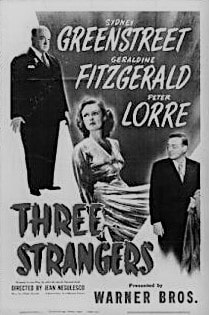 THREE STRANGERS (1946)
THREE STRANGERS (1946) (92 Min.) Genre: 1940 SUSPENSE, Transfer Quality: A
On the eve of the Chinese New Year, three strangers make a pact before a small statue of the Chinese goddess of Destiny. The strangers are Geraldine Fitzgerald, married to a wealthy philanderer; Sidney Greenstreet, an outwardly respectable judge; and Peter Lorre, a seedy sneak thief. The threesome agree to purchase a sweepstakes ticket and share whatever winnings might accrue. Alas, the pact brings little more than misfortune for all concerned. Greenstreet steals funds from a client, then kills Fitzgerald (with the goddess statue!) when she refuses to hand over her sweepstakes winnings. Lorre's fate is less bleak—he and his girlfriend (Joan Lorring) decide to abandon their life of crime—but even he ends up penniless when he inadvertently sets fire to the winning ticket. If it seems strange that Peter Lorre ends up the romantic lead in Three Strangers, remember that the film's director, Jean Negulesco, thought Lorre was the finest actor who ever lived—and as a result, he fought tooth and nail with Warner Bros. to cast Lorre in this film. — Hal Erickson
Starring: Sydney Greenstreet, Peter Lorre, Geraldine Fitzgerald, Joan Lorring | Directed by: Jean Negulesco
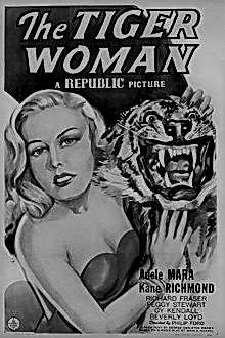 TIGER WOMAN, THE (1945)
TIGER WOMAN, THE (1945) (57 Min.) Genre: 1940 SUSPENSE, Transfer Quality: B
Though released by Republic Pictures, The Tiger Woman is not a serial, as might be assumed from the title. Adele Mara stars as nightclub singer Sharon Winslow, billed for no discernible reason as "The Tiger Woman." Not exactly the sort of girl one takes home to mother, Sharon kills her husband for his insurance money then knocks off the lover who helped her commit the murder. When detective Jerry Devery (Kane Richmond) investigates, Sharon turns on the charm, intending to spin a web around Jerry and eliminate him as well. At this point, the film turns into a bush-league Double Indemnity, with a most surprising denouement. Director Philip Ford was the nephew of John Ford, who'd long since outgrown such silliness as The Tiger Woman.
Starring: Adele Mara, Kane Richmond, Richard Fraser, Peggy Stewart | Directed by: Philip Ford
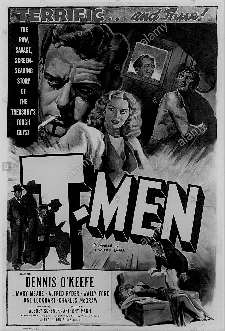 T-MEN (1947)
T-MEN (1947) (96 Min.) Genre: 1940 SUSPENSE, Transfer Quality: A
The moodily evocative docudrama T-Men stars Dennis O'Keefe as Dennis O'Brien, a treasury agent determined to bring a counterfeiting ring to justice. O'Brien and his partner Tony Genaro (Alfred Ryder) go undercover to gain the confidence of the ruthless Detroit mob responsible for the phony money. The plot, compelling though it is, takes second place to the film's stylish set pieces, superbly directed by Anthony Mann and brilliantly photographed by John Alton. Among the film's most famous moments is the scene in which two-bit hood Wallace Ford is bumped off in a steam bath by sadistic hood Charles McGraw, not to mention the harrowing vignette wherein O'Keefe, posing as a crook, must stand by silently as his partner Ryder is murdered. One of the finest examples of the film noir form, T-Men proved beyond a shadow of a doubt that a film didn't need to have a lush budget, brilliant Technicolor and Clark Gable to score a hit with postwar moviegoers. — Hal Erickson
Starring: Dennis O'Keefe, Mary Meade, Charles McGraw, Alfred Ryder | Directed by: Anthony Mann
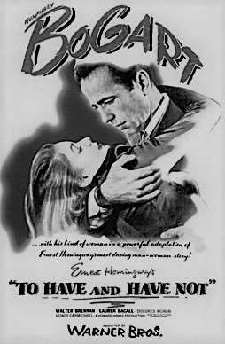 TO HAVE AND HAVE NOT (1944)
TO HAVE AND HAVE NOT (1944) (100 Min.) Genre: 1940 SUSPENSE, Transfer Quality: A
Humphrey Bogart plays Harry Morgan, owner-operator of charter boat in wartime Martinique. Morgan's right-hand man is Eddie (Walter Brennan), a garrulous alky whose pet question to anyone and everyone is "Ever get stung by a dead bee?" While in port, Harry is approached by Free French activist Gerard (Marcel Dalio), who wants to charter Harry's boat to smuggle in an important underground leader. Adopting his usual I-stick-my-neck-out-for-no-one stance, Morgan refuses. Later on, he starts up a dalliance with Marie Browning (screen newcomer Lauren Bacall), an attractive pickpocket. In order to help Marie return to America, Harry agrees to Gerard's smuggling terms. He uses his boat to bring resistance fighter De Bursac (Walter Molnar) and De Bursac's wife Helene (Dolores Moran) into Martinique. The Vichy police, suspecting that something's amiss, hold Morgan's pal Eddie hostage, tormenting the poor rummy by denying him liquor. Predictably, Morgan comes to Eddie's rescue and manages to escape Martinique, with the delectable Marie as cozy company. In the hands of director Howard Hawks and screenwriters Jules Furthman and William Faulkner, the end result bore only a passing relation to the original story by Ernest Hemingway: instead, it was a virtual rehash (but a good one!) of the recently released Casablanca, replete with several of that film's cast members. The film's enduring popularity is primarily — if not solely — due to the sexy chemistry between Bogart and Bacall, especially in the legendary "You know how to whistle, don't you?" scene. The most salutary result of To Have & Have Not was the subsequent Bogart-Bacall marriage, which endured until his death in 1957. It's widely believed that Lauren Bacall's singing voice was dubbed in by a pre-puberty Andy Williams; this is not true. For the record, a more faithful-to-the-source cinemadaptation of the Hemingway original was filmed in 1950 as The Breaking Point. — Hal Erickson
Starring: Humphrey Bogart, Lauren Bacall, Walter Brennan, Dolores Moran | Directed by: Howard Hawks
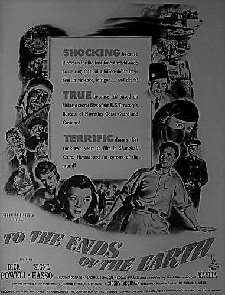 TO THE ENDS OF THE EARTH (1948)
TO THE ENDS OF THE EARTH (1948) (109 Min.) Genre: 1940 SUSPENSE, Transfer Quality: B
The relatively relaxed movie censorship in the postwar years enabled Columbia to produce To the Ends of the Earth, a film which dealt with the previously taboo subject of drug smuggling. T-man Dick Powell is sent to several foreign locales to track down an Opium ring. The villains are subversives (Red? Fascist?) who plan to take over the world by hooking everyone on the "hard stuff." The film is chock full of mysterious European and Oriental types like Vladimir Sokoloff, Ludwig Donath and Fritz Leiber; even leading lady Signe Hasso speaks with an accent, which in 1948 was enough to immediately put her under suspicion. Lending credence to this sprawling adventure yarn is the presence of several actual treasury agents in bit parts, including commissioner Harry J. Anslinger.
Starring: Dick Powell, Signe Hasso, Ludwig Donath, Vladimir Sokoloff | Directed by: Robert Stevenson
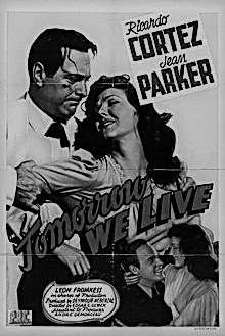 TOMORROW WE LIVE (1942)
TOMORROW WE LIVE (1942) (63 Min.) Genre: 1940 SUSPENSE, Transfer Quality: A
A crime lord with the ability to mesmerize and manipulate others forces an old ex-convict to do his evil bidding. When the reformed crook's daughter finds out, she starts working to save him. — Sandra Brennan
Starring: William Marshall, Emmett Lynn, Ray Miller, Jean Parker | Directed by: Edgar G. Ulmer
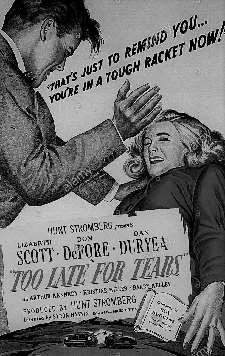 TOO LATE FOR TEARS (1949)
TOO LATE FOR TEARS (1949) (99 Min.) Genre: 1940 SUSPENSE, Transfer Quality: B
When Lizabeth Scott's Jane Greer husband Arthur Kennedy accidentally gets his mitts on $60,000 in stolen money, she insists that he keep the dough rather than turn it over to the authorities. Two-bit private eye Dan Duryea catches on to Scott's subterfuge, and demands that she turn the cash over to him. Scott persuades Duryea to split the money with her—then, determining that Kennedy might be too honest for everyone's own good, she murders her husband. To cover her tracks, Scott reports her husband as missing. This brings in yet another fly in the ointment: Don DeFore, the brother of Scott's first husband, who died under mysterious circumstances. The already knotted webs of intrigue become even more tangled before Scott's ironic comeuppance. Too Late for Tears was scripted by Roy Huggins, who later produced such TV detective series as The Rockford Files. — Hal Erickson
Starring: Lizabeth Scott, Don DeFore, Dan Duryea, Arthur Kennedy | Directed by: Byron Haskin
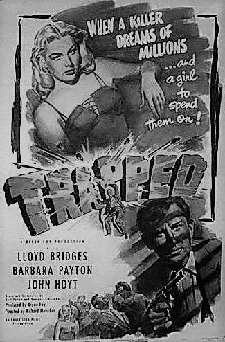 TRAPPED (1949)
TRAPPED (1949) (78 Min.) Genre: 1940 SUSPENSE, Transfer Quality: B
When nearly perfect counterfeit 20-dollar bills start turning up, the Treasury Department recognizes them as the work of Tris Stewart (Lloyd Bridges), a man already doing a long prison stretch. They offer Stewart a break on his sentence if he'll help them find out who got hold of his old plates, but he initially refuses. Some weeks later, while being transferred to another prison, Stewart escapes from custody -- it turns out that this is a set-up to free Stewart to search for the plates with a treasury agent keeping tabs on him; then he turns on the T-man as well, escaping for real. What Stewart doesn't know is that the agents expected and desired this move, believing that he would only go for the plates if he thought he could make some money from the bills and get out of the country with his girlfriend Laurie (Barbara Payton). They've got her apartment bugged, and one of their own men, Downey (John Hoyt), has been put in place as a customer at the nightclub where she works, quietly establishing himself as a man with some angles of his own and a yen to know her better. Stewart follows the trail to one of his ex-distributors, now in business for himself with the plates. But the man needs money, and Stewart thinks he can get it with help from Downey -- he doesn't like him trying to impress her, but does like it that he is a grifter with some money. They become partners, putting up Downey's cash to get the 250,000 dollars in counterfeit twenties, which Stewart will spend at face value where he and Laurie are going, in countries where they need U.S. currency and there are no treasury agents around to help identify counterfeit bills. Before the deal can be closed (and the arrest made), a new round of possible double-crosses starts between the hoods, and Downey's cover is suddenly blown by accident -- Stewart tries to kill him but is captured instead. Downey's superiors want to pull him out, but the agent thinks he can still salvage the operation if he can get to the plates before Laurie can talk to anyone. That leads to the denouement, an extended series of split-second plot developments with several lives at risk.
Starring: Lloyd Bridges, Barbara Payton, John Hoyt, James Todd, Russ Conway | Directed by: Richard Fleischer
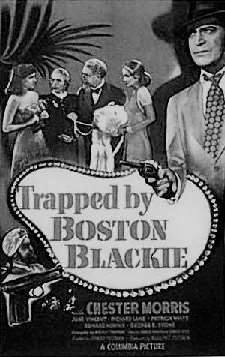 TRAPPED BY BOSTON BLACKIE (1948)
TRAPPED BY BOSTON BLACKIE (1948) (67 Min.) Genre: 1940 SUSPENSE, Transfer Quality: B
Who better to guard a priceless pearl necklace than an ex-thief? That's the logic behind Trapped by Boston Blackie, starring Chester Morris in the title role. Blackie finds himself posing as a guard at a society party, where the hostess (Sarah Selby) intends to display her new necklace. The private eye officially assigned to guard the pearls is mysteriously killed (or so it seems), whereupon the necklace vanishes. Blackie must locate the real crook before the cops arrest him on suspicion. Trapped by Boston Blackie was the twelfth in Columbia's "Boston Blackie" B series. — Hal Erickson
Starring: Chester Morris, June Vincent, Richard Lane, Patricia White | Directed by: Seymour Friedman
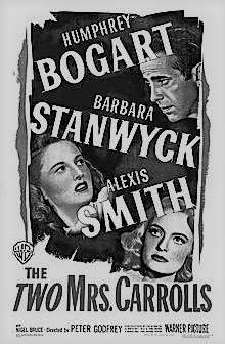 TWO MRS. CARROLS, THE (1947)
TWO MRS. CARROLS, THE (1947) (94 Min.) Genre: 1940 SUSPENSE, Transfer Quality: A
Humphrey Bogart plays a psychotic killer who disposes of his wives through slow ingestion of poison in The Two Mrs. Carrolls, made in 1945 but shelved for two years because of its similarity to Gaslight. Bogart is Geoffrey Carroll, an artist who paints a portrait of his wife as "The Angel of Death" and then meets Sally Morton (Barbara Stanwyck), with whom he quickly falls in love. In order to get rid of his wife and take up with Sally, Geoffrey slowly poisons his spouse by lacing her nightly glass of warm milk with liberal doses of toxic chemicals. He sends his daughter Beatrice (Ann Carter) away to school and, while the daughter is away, his wife dies. He immediately marries Sally and they appear to be happily together. But a few years pass and Geoffrey begins to work on another "Angel of Death" portrait of Sally, this time after he falls in love with his attractive neighbor Cecily (Alexis Smith). As before, Sally begins to grow weak from the daily nightcap of tainted milk. But complications set in when Cecily demands that she and Geoffrey run away together and the local druggist, Mr. Biagdon (Barry Bernard), presents Geoffrey with a blackmail demand. But Geoffrey overplays his hand when he once again tries to send Beatrice away to school. Sally now begins to suspect her husband is a serial killer. Borrowing a gun from a friend, Sally must defend herself against her deranged and murderous husband. — Paul Brenner
Starring: Humphrey Bogart, Barbara Stanwyck, Alexis Smith, Nigel Bruce | Directed by: Peter Godfrey
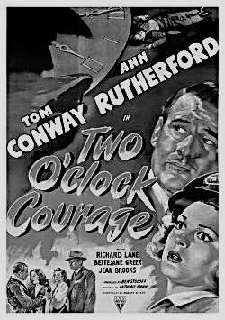 TWO O'CLOCK COURAGE (1945)
TWO O'CLOCK COURAGE (1945) (66 Min.) Genre: 1940 SUSPENSE, Transfer Quality: A
In this drama, an amnesiac awakens and finds himself accused of murder. Fortunately, a female cabbie helps prove his innocence. Things look bleak until a bullet wound helps him regain his memory and he can prove he didn't kill anyone. — Sandra Brennan
Starring: Tom Conway, Anne Rutherford, Richard Lane, Lester Matthews | Directed by: Anthony Mann
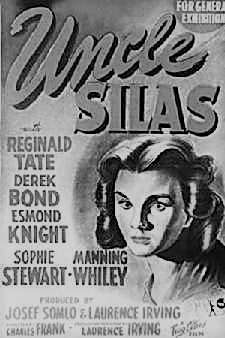 UNCLE SILAS (1947)
UNCLE SILAS (1947) (103 Min.) Genre: 1940 SUSPENSE, Transfer Quality: B
An evil guardian plots the murder of his young heiress niece in this Victorian melodrama, also known as The Inheritance.
Starring: Derek Bond, Frederick Burtwell, O.B. Clarence, George Curzon | Directed by: Charles Frank
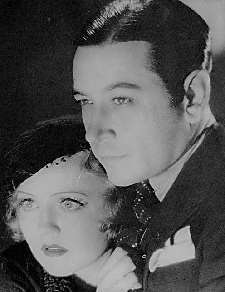 UNDERCOVER MAN, THE (1949)
UNDERCOVER MAN, THE (1949) (85 Min.) Genre: 1940 SUSPENSE, Transfer Quality: B
Eliot Ness may have gotten lots of publicity (especially long after the fact) for breaking the Capone mob, but as Joseph H. Lewis' The Undercover Man reminds us, it was the accountants and the numbers-crunchers that brought down Capone and his mob. Frank Warren (Glenn Ford) started out as an accountant, but now serves as an investigator for the Treasury Department. His job has frequently required him to go undercover, masquerading as a criminal to get the goods on the top-level tax-law violators that his unit targets. But now his assignment is to gather evidence on the operations of the nation's number-one crime boss and get proof of the income that he and his lieutenants are not declaring, and this proves not only frustrating but dangerous. Potential stoolies are murdered and witnesses intimidated, and when one otherwise "respectable" lawyer (Barry Kelley) starts mentioning Warren's wife (Nina Foch) in casual conversation, he takes the hint. He's ready to quit until the mother (Esther Minciotti) of a witness-turned-victim tells him about what life was like in Italy under the Black Hand, and why she came to America to raise her sons. Warren and his men (James Whitmore, David Wolfe) make one last attempt to get the proof they need, tracing signatures and handwriting to get evidence implicating a small man in the operation, using it to turn him and going for bigger fish. Finally, even the shyster lawyer who has been dogging Warren every step of the way ends up in the sights of the feds, and the mob turns its attention to getting rid of this new "liability" and taking care of Warren as well.
Starring: Glenn Ford, Nina Foch, James Whitmore, Barry Kelley | Directed by: Joseph H. Lewis
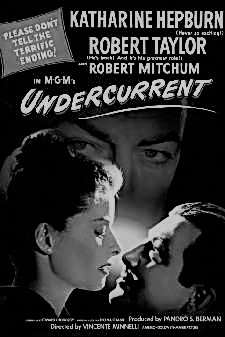 UNDERCURRENT (1946)
UNDERCURRENT (1946) (116 Min.) Genre: 1940 SUSPENSE, Transfer Quality: A
A change of pace for both director Vincente Minnelli and star Katharine Hepburn, this taut drama features the latter as Ann Hamilton, the daughter of a scientist (Edmund Gwenn), who after a whirlwind romance marries handsome but slightly mysterious inventor turned businessman Alan Garroway (Robert Taylor). But wedded bliss proves short-lived when Garroway refuses to discuss his brother Michael, whose presence is felt constantly despite the mystery surrounding his whereabouts. The missing Michael becomes an obsession for Ann, whose curiosity is piqued even more after a chance encounter with Sylvia Burton (Jayne Meadows), a young woman who figures in the lives of both brothers and who displays a strange resemblance to Ann herself. Despite Alan's dire misgivings, Ann feels compelled to solve the mystery of Michael, until, that is, she discovers that Alan may very well have murdered his own brother. Undercurrent marked the screen debut of Jayne Meadows and a breakthrough of sorts for Robert Mitchum, whom M-G-M borrowed from David O. Selznick for a reputed $25,000. — Hans J. Wollstein
Starring: Katharine Hepburn, Robert Taylor, Robert Mitchum, Edmund Gwenn | Directed by: Vincente Minnelli
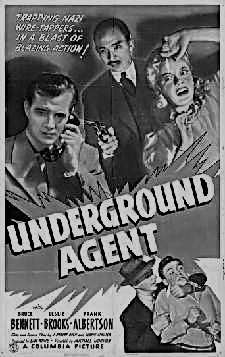 UNDERGROUND AGENT (1942)
UNDERGROUND AGENT (1942) (70 Min.) Genre: 1940 SUSPENSE, Transfer Quality: A
In this espionage caper, a government spy must keep enemy agents from spying upon a defense plant. His work is made easier by his newest invention, a word scrambler which makes it difficult for the enemy agent. The good guy spy then hires a crack team to assist him; among them is the pretty young plant worker he inadvertently got fired. — Sandra Brennan
Starring: Hans Schumm, John Shay, Leonard Strong, Addison Richards | Directed by: Michael Gordon
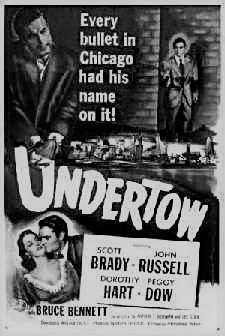 UNDERTOW (1949)
UNDERTOW (1949) (71 Min.) Genre: 1940 SUSPENSE, Transfer Quality: B
Undertow stars Scott Brady as a gambler just out of wartime military service. No longer interested in wagers and speculations, Brady wants only to open up a mountain vacation lodge. Before this can take place, Brady is framed for murder, and forced to hide out in the home of Peggy Dow. With the help of Dow and a policeman friend, Brady searches for the real murderer--who turns out to be an old friend who is in cahoots with Brady's fiancee. Watch carefully in Undertow and you'll spot new Universal contractee "Roc" Hudson as a plainclothes detective.
Starring: Scott Brady, John Russell, Dorothy Hart, Peggy Dow, Rock Hudson | Directed by: William Castle
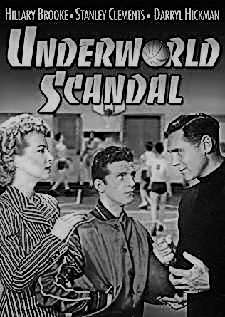 UNDERWORLD SCANDAL (1947)
UNDERWORLD SCANDAL (1947) (67 Min.) Genre: 1940 SUSPENSE, Transfer Quality: B
In this crime drama, a high-minded editor and his best reporter try to help ghetto kids and break up the racketeering ring which has been rigging basketball games.
Starring: Phillip Reed, Hillary Brooke, Stanley Clements, Darryl Hickman | Directed by: William C. Thomas
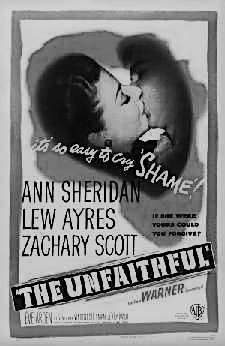 UNFAITHFUL, THE (1947)
UNFAITHFUL, THE (1947) (109 Min.) Genre: 1940 SUSPENSE, Transfer Quality: A
Though not readily apparent at first, The Unfaithful is a remake of the 1940 Bette Davis vehicle The Letter, which in turn was adapted from the play by W. Somerset Maugham. The locale of the Maugham original has been shifted from the jungles of Malaya to the cozy confines of a middle-sized American town. Ann Sheridan stars as Chris Hunter, who late one night shoots and kills a man who tries to attack her in her own home. At least that's her story: it turns out that the dead man had once had an affair with Chris while her serviceman husband Bob (Zachary Scott) was overseas. When it appears as though Chris might have internationally murdered her assailant, faithful family friend and attorney Larry Hammaford (Lew Ayres) puts his career and reputation on the line by suppressing a valuable piece of evidence. Shorn of the class and race consciousness — not to mention the eroticism and bitter irony — of the Maugham original, The Unfaithful is able to move more logically to a happy (or at least satisfying) denouement. — Hal Erickson
Starring: Ann Sheridan, Lew Ayres, Zachary Scott, Eve Arden | Directed by: Vincent Sherman
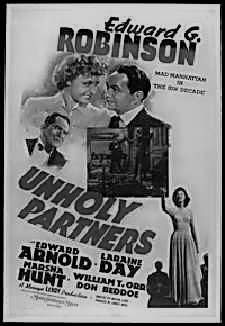 UNHOLY PARTNERS (1941)
UNHOLY PARTNERS (1941) (94 Min.) Genre: 1940 SUSPENSE, Transfer Quality: A
If Edward G. Robinson thought he'd get away from tough-guy roles by moving from Warners to MGM, he was sorely mistaken. Robinson plays the editor of a 1920s tabloid newspaper, compelled to accept financial aid from a gangster (Edward Arnold). Defying his "unholy partner," Robinson adopts an editorial stance in direct opposition to the gangster's activities. The crook is less upset by this than by the fact that Robinson's star reporter (William T. Orr) is romantically interested in the crook's girlfriend (Marsha Hunt). When Robinson tries to expose the gangster's insurance racket, the young reporter is kidnapped. Robinson kills the crook, then covers his tracks in noble fashion by participating in a suicidal airplane test flight. Unholy Partners manages to keep its multitude of plot threads in order, resulting in one of Edward G. Robinson's most solid vehicles. — Hal Erickson
Starring: Edward G. Robinson, Edward Arnold, Laraine Day, Marsha Hunt | Directed by: Mervyn LeRoy
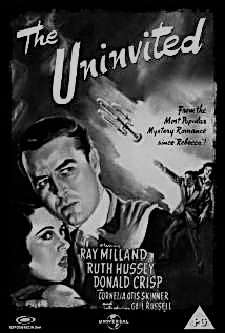 UNINVITED, THE (1944)
UNINVITED, THE (1944) (99 Min.) Genre: 1940 SUSPENSE, Transfer Quality: A
The Uninvited is one of the rare Hollywood ghost stories that does not cop out with a "logical" ending. In fact, the film has more in common with British ghost tales of the period, in that the characters calmly accept spectral visitations as though they were everyday occurrences. Roderick Fitzgerald (Ray Milland) and his sister, Pamela (Ruth Hussey), buy a house on the Cornish seacoast, never suspecting that it is a "bad" house, subject to haunting. Before long, Roderick and Pamela are visited by Stella Meredith (Gail Russell), whose late mother, it is said, is the house ghost. It is further supposed that the ghost means to do Stella harm. Stella's grandfather Commander Beech (Donald Crisp) is close-mouthed on the issue, but it is clear he knows something that he isn't telling. Sure enough, there is a secret to the manor: it is inhabited by not one but two ghosts, one of whom is merely trying to shield Stella from harm. Once the film's deep dark secret is revealed (courtesy of a virtuoso "mad speech" by supporting actress Cornelia Otis Skinner), Roderick is able to single-handedly exorcise the estate and claim Stella as his bride. Based on the novel by Dorothy Macardle (with a few uncredited "lifts" from Daphne du Maurier's Rebecca), The Uninvited remains one of the spookiest "old dark house" films ever made, even after years of inundation by computer-generated special effects. Less effective was the 1945 sequel, The Unseen, which starts well but degenerates into a substandard murder mystery. — Hal Erickson
Starring: Ray Milland, Ruth Hussey, Donald Crisp, Cornelia Otis Skinner | Directed by: Lewis Allen
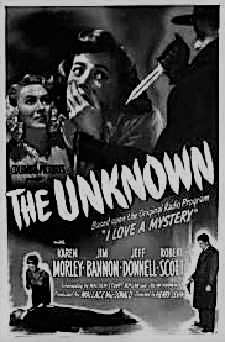 UNKNOWN, THE (1946)
UNKNOWN, THE (1946) (70 Min.) Genre: 1940 SUSPENSE, Transfer Quality: B
The Unknown was the last of three Columbia programmers based on the legendary radio series I Love a Mystery. Carried over from the radio version are Jim Bannon and Barton Yarborough as Jack Packard and Barton Yarborough, adventurers for hire. The plot concerns the efforts of amnesiac Nina Arnold (Jeff Donnell) to claim her rightful share of her domineering grandmother's legacy. Someone is trying to murder Nina, and that someone may very well be her emotionally unstable mother Rachel Martin (Karen Morley). But with Jack and Doc on the case, Nina has nothing to worry about-or does she? Like the other entries in the I Love a Mystery film series, The Unknown is based on a radio serial by Carleton E. Morse, creator of the original property.
Starring: Karen Morley, Jim Bannon, Jeff Donnell, Robert Scott | Directed by: Henry Levin
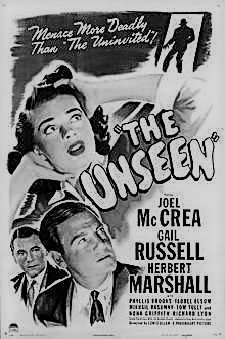 UNSEEN, THE (1945)
UNSEEN, THE (1945) (81 Min.) Genre: 1940 SUSPENSE, Transfer Quality: B
This follow-up to the classic Hollywood ghost story The Uninvited doesn't quite measure up to its predecessor. Joel McCrea stars as widower Davie Fielding, who has long been suspected of bringing about his wife's death. It helps not at all when a series of murders coincides with Fielding's move into a new neighborhood. Elizabeth Howard (Gail Russell), governess to Fielding's children, takes it upon herself to either clear her boss' name or prove him a murderer-and this requires her to delve into the supernatural (or so it seems!) The Unseen was cowritten by Raymond Chandler; one of Joel McCrea's children is played by Richard Lyon, son of actors Ben Lyon and Bebe Daniels.
Starring: Joel McCrea, Gail Russell, Herbert Marshall, Phyllis Brooks | Directed by: Lewis Allen
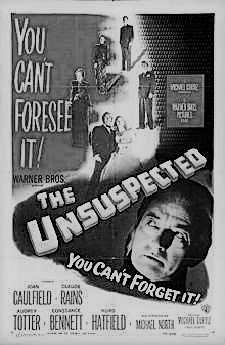 UNSUSPECTED, THE (1947)
UNSUSPECTED, THE (1947) (103 Min.) Genre: 1940 SUSPENSE, Transfer Quality: A
Director Michael Curtiz masterfully tells the fictional story of radio host Alexander Grandison (Claude Rains) as derived from a novel by Charlotte Armstrong. Grandison spookily recites murder mysteries on his radio show, with intimate and excruciating details. The reason he's so good and popular is that some of the murders he presents really are his own. He kills one of his female workers, but her fiancée, Steven Francis Howard (Michael North), threatens to take revenge for her death. Howard tries to convince Grandison's niece, Matilda Frazier (Joan Caulfield), that he is her long-lost husband. Much mystery and intrigue follows. — Michael Betzold
Starring: Claude Rains, Joan Caulfield, Audrey Totter, Constance Bennett | Directed by: Michael Curtiz
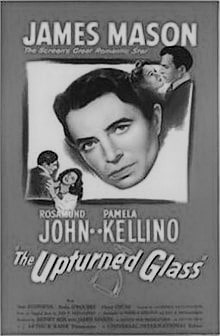 UPTURNED GLASS, THE (1947)
UPTURNED GLASS, THE (1947) (87 Min.) Genre: 1940 SUSPENSE, Transfer Quality: B
James Mason stars in The Upturned Glass as a prosperous British brain surgeon. Mason saves Rosamund John's daughter from blindness, whereupon the married John falls in love with the doctor. The illicit lovers conduct a passionate affair while John's husband is out of the country. When John dies mysteriously, Mason suspects that the culprit is his own jealous sister-in-law Pamela Kellino (Mason's real-life wife at the time). Acting on his suspicions, Mason murders Kellino, stuffs her body in the trunk of his car, and drives to parts unknown to dispose of the corpse. Before he is able to do this, Mason is called to the home of a dying child. Despite the risk of being exposed as a murderer, Mason leaves his car unattended to rush to the side of the stricken child. The film doesn't end very happily for Mason, but he is mildly comforted by the fact that he has remained loyal to the Hippocratic oath. Upturned Glass is a virtual compendium of late-1940s British melodramatic devices: tortured hero, well-planned crime, moonlight-drenched photography, lengthy flashbacks, quasi-classical music score, and the rest of the repertoire. The film was coproduced by James Mason, and cowritten by Mason's wife and costar Pamela Kellino.
Starring: James Mason, Rosamund John, Ann Stephens, Pamela Kellino | Directed by: Lawrence Huntington
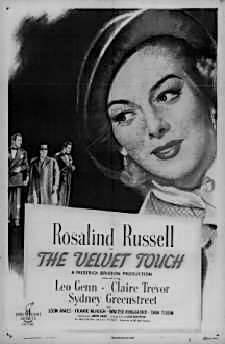 VELVET TOUCH, THE (1948)
VELVET TOUCH, THE (1948) (98 Min.) Genre: 1940 SUSPENSE, Transfer Quality: B
Based upon a story by William Mercer, The Velvet Touch stars Rosalind Russell as Valerie Stanton, a celebrated Broadway actress whose latest smash comedy is coming to the end of its successful run. The play's producer, Gordon Dunning, has produced all of Stanton's hits for the last decade, and takes credit for making her the star she is today. He is therefore upset when she informs him that she wishes to make a break with him by both marrying Michael Morrell, a renowned architect, and by taking a stab at one of the classic roles — namely Hedda Gabler — under the auspices of another producer. Dunning has no intention of letting her move forward with her plans, and he tells her that if she refuses to continue working with him in light, profitable comedies, he will reveal unflattering information about her to Morrell. Frightened that this will destroy her relationship, Stanton picks up a statue from Dunning's desk and delivers a fatal blow. Fortunately, because she is wearing her trademark long black gloves, there are no fingerprints, and Stanton creates a plausible alibi. Suspicion therefore shifts to Marian Webster, a rival of Stanton's who finds the body and was once romantically involved with Dunning. Stanton seems to have gotten away with murder — but can she avoid making any mistakes as police captain Danbury proceeds with the investigation? — Craig Butler
Starring: Rosalind Russell, Claire Trevor, Sidney Greenstreet, Leo Genn, Frank McHugh | Directed by: John Gage
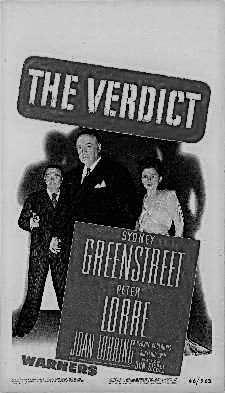 VERDICT, THE (1946)
VERDICT, THE (1946) (86 Min.) Genre: 1940 SUSPENSE, Transfer Quality: A
The novel The Big Bow Mystery by Israel Zangwill had been filmed in 1928 as The Perfect Crime and again in 1934 as The Crime Doctor. This 1946 version was the best and marked the directorial debut of Don Siegel. It also paired the popular duo of Peter Lorre and Sydney Greenstreet for the last time. Greenstreet plays George Grodman, a veteran Scotland Yard chief who is forced out after a murderer that he helped convict is found innocent after his execution. His successor is the pompous Buckley (George Coulouris), who vows to do much better. Lorre plays Victor Emmric, an artist illustrating a crime book that Grodman is writing. A tenant in a building near Grodman's apartment is found dead by a landlady who summons Grodman to the scene. The victim's door appears to have been locked from the inside. Chief Buckley fingers Clive Russell (Paul Cavanagh), a friend of Grodman. With only circumstantial evidence, the superintendent railroads Russell into a conviction that carries the death sentence. Grodman tries to prove his friend innocent, but the only woman who can provide Russell an alibi is dead. — Michael Betzold
Starring: Sydney Greenstreet, Peter Lorre, George Coulouris, Joan Lorring | Directed by: Don Siegel
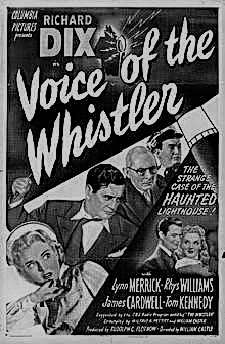 VOICE OF THE WHISTLER, THE (1945)
VOICE OF THE WHISTLER, THE (1945) (60 Min.) Genre: 1940 SUSPENSE, Transfer Quality: B
In this drama based on a popular radio series, a millionaire believes he has six months left to live and so marries his nurse. She doesn't love him, but he has promised to make her the sole heir to his fortune. She leaves her real fiancé for the ailing magnate with the promise that she will return a rich woman. After the wedding, they move to a lonely lighthouse where the woman finds herself falling in love with her husband after he miraculously recovers. Things are fine until the jealous, jilted fiancé comes to try and kill the millionaire. He ends up being killed by the husband who is sentenced to die in the electric chair. The woman is left to live alone in the lighthouse.
Starring: Richard Dix, Lynn Merrick, Rhys Williams, James B. Cardwell | Directed by: William Castle
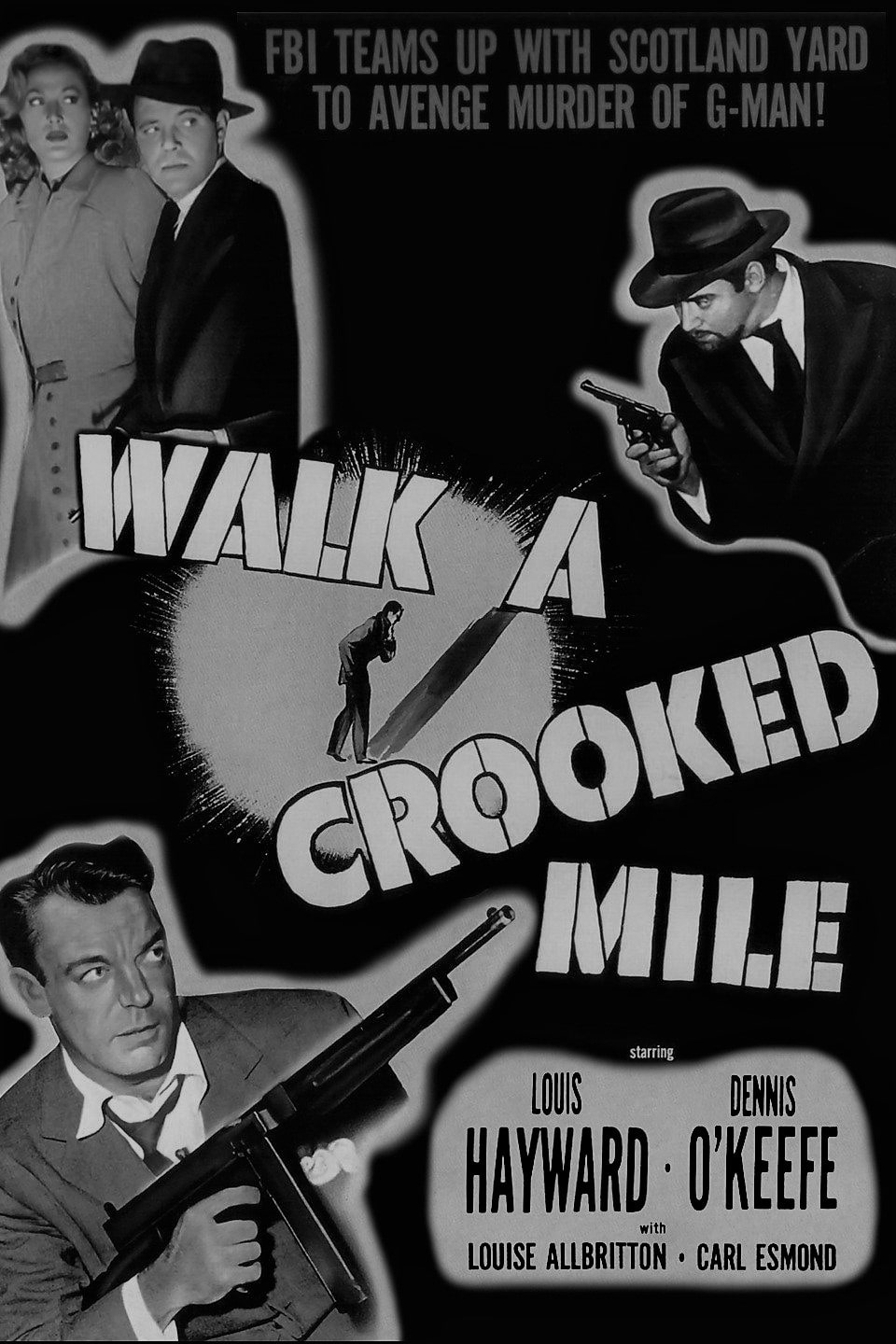 WALK A CROOKED MILE (1948)
WALK A CROOKED MILE (1948) (91 Min.) Genre: 1940 SUSPENSE, Transfer Quality: B
Filmed almost entirely on location, Walk a Crooked Mile was Columbia Pictures' "answer" to 20th Century-Fox's late-1940s cycle of documentary-style crime dramas. FBI agent Dan O'Hara (Dennis O'Keefe) and Scotland Yard operative Philip Grayson (Louis Hayward) team up to investigate a security leak at a Southern California atomic plant. Their investigation takes them to San Francisco, where a communist spy ring flourishes under the auspices of Igor Braun (Onslow Stevens). With such actors as Raymond Burr and Philip Van Zandt playing the commie agents, it's a wonder that the whole lot of them weren't arrested on sight before the story even began! Louise Allbritton plays the nominal female lead, a suspicious atomic scientist named Toni Neva.
Starring: Louis Hayward, Dennis O'Keefe, Louise Allbritton, Raymond Burr, Onslow Stevens | Directed by: Gordon Douglas
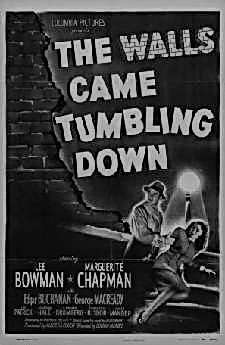 WALLS CAME TUMBLING DOWN, THE (1946)
WALLS CAME TUMBLING DOWN, THE (1946) (82 Min.) Genre: 1940 SUSPENSE, Transfer Quality: B
The Columbia mystery melodrama The Walls Came Tumbling Down is regarded in many circles as star Lee Bowman's finest hour-and-a-half. Bowman is cast as Winchellesque Broadway columnist Gilbert Archer, who insists upon investigating the death of an old friend, a priest. The police insist that the priest hanged himself, but Archer believes otherwise, and together with Boston socialite Patricia Foster (Marguerite Chapman) he begins to play detective — though "play" is hardly the word. Key ingredients to the mystery are two rare Bibles and a painting of the fall of Jericho. The principal villainy comes at the grubby hands of Columbia contractees George Macready and Edgar Buchanan, while J. Edward Bromberg has a few amusing moments as a kooky art dealer.
Starring: Lee Bowman, J. Edward Bromberg, Edgar Buchanan, Marguerite Chapman | Directed by: Lothar Mendes
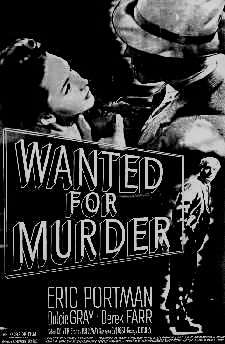 WANTED FOR MURDER (1946)
WANTED FOR MURDER (1946) (91 Min.) Genre: 1940 SUSPENSE, Transfer Quality: A
Anne Fielding (Dulcie Gray), a shop clerk, meets Jack Williams (Derek Farr), a bus conductor, on the London Underground. She's delayed by the train for a meeting with her friend Victor Colebrooke (Eric Portman) at Hampstead Heath; the two of them take a liking to each other while she's trying to find Victor. She finally locates him and they leave at virtually the same moment that a young woman is found strangled — the latest in a series of six stranglings in London. The police investigate anyone who might have been with the victim — that includes Jack, who was seen leaving in a fury late in the evening, and Victor, whose handkerchief was found in the vicinity of the body by a derelict. In a neatly Hitchcockian twist, however, the police soon get on to the right man, but between the ineptitude of one officer and sheer bad luck, Scotland Yard is unable to make an arrest or even secure a search warrant. A bizarre cat-and-mouse game ensues as Inspector Conway (Roland Culver) tries to pressure the killer into tipping his hand, which puts Anne in deadly danger. It all comes down to a race against time through London as all of the threads draw together, but around whose neck? — Bruce Eder
Starring: Eric Portman, Dulcie Gray, Derek Farr, Roland Culver | Directed by: Lawrence Huntington
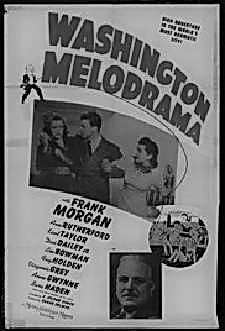 WASHINGTON MELODRAMA (1941)
WASHINGTON MELODRAMA (1941) (80 Min.) Genre: 1940 SUSPENSE, Transfer Quality: A
With a little extra effort, Washington Melodrama might have passed muster as an A picture. Frank Morgan stars as millionaire philanthropist Calvin Claymore, who comes to Washington in hopes of promoting a Senate bill on behalf of European war relief. Away from his wife (Fay Holden) and daughter Laurie (Ann Rutherford) for the first time in years, Claymore succumbs to tempation and spends a night on the town with chorus girl Mary Morgan (Anne Gwynne). Though nothing of a sexual nature transpires, Claymore finds himself in a compromising-and possibly fatal-position when Mary later turns up murdered. Blackmailed by slimy nightclub emcee Whitney King (Dan Dailey), Claymore is unable to turn to the police, and must stand by helplessly as the trail of clues leads inexorably to himself. Making matters worse, reporter Walt Thorne (Kent Taylor), the principal investigator on the case, has fallen in love with Claymore's daughter Laurie. It's a melodrama, all right, done up in style by MGM and a topnotch cast. — Hal Erickson
Starring: Frank Morgan, Anne Rutherford, Kent Taylor, Dan Dailey | Directed by: S. Sylvan Simon
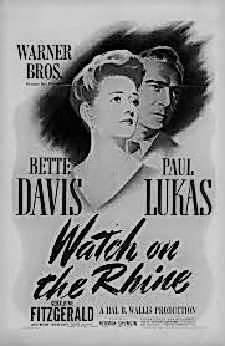 WATCH ON THE RHINE (1943)
WATCH ON THE RHINE (1943) (114 Min.) Genre: 1940 SUSPENSE, Transfer Quality: A
An expansion of, and improvement upon, Lillian Hellman's stage play of the same name, Watch on the Rhine stars Paul Lukas, recreating his Broadway role of tireless anti-fascist crusader Kurt Muller. As the clouds of war gather in Europe in the late 1930s, Muller arrives in Washington DC, accompanied by his American wife Sara (top-billed Bette Davis) and their children Joshua (Donald Buka), Bodo (Eric Roberts) and Babette (Janis Wilson). The Mullers stay at the home of Sarah's wealthy mother Fanny Fannelly (Lucille Watson), who lives in her own world of society get-togethers and can't be bothered with politics. Also staying with Fanny is Rumanian aristocrat Teck de Branovis (George Coulouris) and his American wife Marthe (Geraldine Fitzgerald). To protect his family, Muller keeps his "underground" activities a secret from Fanny and her guests, but de Branovis is suspicious of the mild-mannered visitor. It turns out that de Branovis is actually a Nazi sympathizer, willing to betray Muller for a price. Using blackmail as one of his weapons, de Branovis threatens to destroy all that Muller has been fighting for. To prevent this, Muller kills de Branovis in cold blood. Now technically a murderer, Muller bids his family a reluctant goodbye, heading back to Europe to continue his vital work. If ever there was a justifiable homicide in a motion picture, it was the killing of the odious de Branovis in Watch on the Rhine. Still, the Hollywood production code dictated that a murderer must always pay for his crimes, thus a coda is added, alluding to Muller's death-providing a golden opportunity for a nifty smiling-through-the-tears curtain speech by Bette Davis. Scripted by Lillian Hellman's lover Dashiel Hammett, Watch on the Rhine earned several Academy Award nominations, as well as a "best actor" Oscar for Paul Lukas. — Hal Erickson
Starring: Paul Lukas, Bette Davis, Donald Woods, Geraldine Fitzgerald, George Coulouris | Directed by: Herman Shumlin
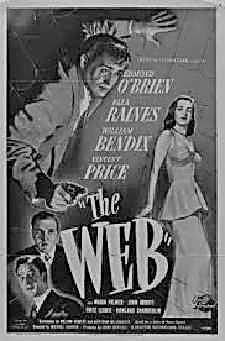 WEB, THE (1947)
WEB, THE (1947) (87 Min.) Genre: 1940 SUSPENSE, Transfer Quality: A
The Web is the definitive film noir title; the film itself is not quite as definitive, but is one of the better second-echelon examples of its genre. Attorney Edmond O'Brien and police lieutenant William Bendix join forces to trap a suspected murderer. The culprit is above-suspicion industrialist Vincent Price, who is behind two murders and a million-dollar robbery. O'Brien gets himself hired as Price's bodyguard, falling in love with the suspect's secretary Ella Raines. As the story progresses, Price contrives to use O'Brien as a fall guy for another murder—and it looks like he'll get away with it. The Web was the first directorial job for Michael Gordon, who spent the rest of the 1940s turning out above-average mellers for Universal. — Hal Erickson
Starring: Edmond O'Brien, Ella Raines, William Bendix, Vincent Price | Directed by: Michael Gordon
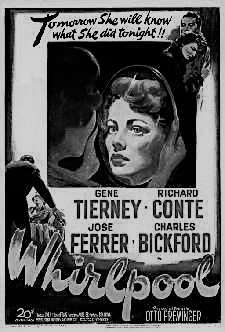 WHIRLPOOL (1949)
WHIRLPOOL (1949) (73 Min.) Genre: 1940 SUSPENSE, Transfer Quality: A
In this compelling and unusual psychological melodrama Ann Sutton (Gene Tierney), a woman tormented by her secret kleptomania seeks help from a unscrupulous hypnotist David Korvo (Jose Ferrer). Although she is married to a successful psychiatrist Richard (Robert Conte), and has no need to steal the items which she could easily purchase, she finds herself powerless to control her urge. She is finally caught when she attempts to steal a brooch from a department store but she is saved by Korvo who persuades the store not to prosecute. Grateful and desperate for help, Ann allows Korvo to treat her. Korvo, taking advantage of Ann's vulnerability, hypnotizes her and sends her to the home of a former mistress whom he has stolen money from and subsequently murdered when she threatened to turn him in to the police. Ann is charged with the murder. Convinced of his wife's innocence, Richard must crack Korvo's seeming airtight alibi. Richard tricks Korvo into returning to the scene of the crime to find some evidence in the exciting conclusion. This unusual tale of murder and mental illness was written by a blacklisted Ben Hecht under the pseudonym "Lester Barstow" and bears a striking resemblance to another Hecht thriller, Alfred Hitchcock's Spellbound. — Linda Rasmussen
Starring: Gene Tierney, Richard Conte, Jose Ferrer, Charles Bickford | Directed by: Otto Preminger
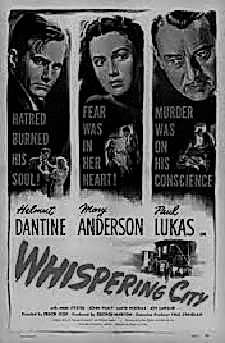 WHISPERING CITY (1947)
WHISPERING CITY (1947) (89 Min.) Genre: 1940 SUSPENSE, Transfer Quality: B
In an on-the-run investigation, a female reporter is in a race against time to capture a prominent attorney who has been implicated in a murder committed years before when she receives an inside tip. As she collects evidence, she must stay one step ahead of him so that she doesn't become his latest victim. Good scripting and direction makes this a suspense-filled movie.
Starring: Helmut Dantine, Mary Anderson, Paul Lukas, John Pratt, George Alexander | Directed by: Fedor Ozep
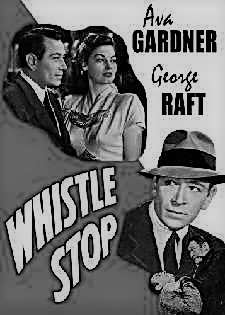 WHISTLE STOP (1946)
WHISTLE STOP (1946) (85 Min.) Genre: 1940 SUSPENSE, Transfer Quality: B
In this drama, Mary (Ava Gardner) returns to her small town after she becomes a success in the city. Meeting up with her old love, Kenny (George Raft), she discovers that he is still the unambitious, lazy man he was when she left, and she begins an affair with nightclub owner Lew Lentz (Tom Conway). When a jealous rivalry arises between Lew and Kenny, the results could be deadly.
Starring: George Raft, Ava Gardner, Victor McLaglen, Tom Conway, Jane Nigh | Directed by: Léonide Moguy
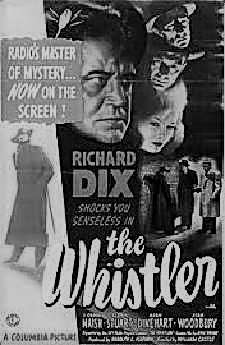 WHISTLER, THE (1944)
WHISTLER, THE (1944) (59 Min.) Genre: 1940 SUSPENSE, Transfer Quality: A
The Whistler was the first of eight Columbia "B" thrillers based on the popular radio series of the same name. The Whistler, a shadowy (and unbilled) figure, introduced each film as he'd done on radio: "I am the Whistler...and I know many things, for I walk by night." This time the Whistler tells the strange story of despondent Richard Dix, who, believing his wife dead, hires professional killer J. Carroll Naish to put him out of his misery. Then the wife suddenly shows up...and Dix can't locate his would-be assassin. An old story with plenty of fresh new twists (for example, Naish talks of his profession as though it were a fine art like painting and sculpture), The Whistler bode well for the seven films that followed. Richard Dix starred in all but one film in the series, alternating between hero and heavy.
Starring: Richard Dix, J. Carrol Naish, Gloria Stuart, Alan Dinehart | Directed by: William Castle
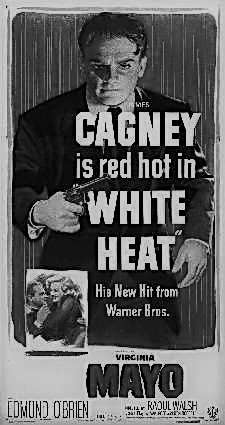 WHITE HEAT (1949)
WHITE HEAT (1949) (114 Min.) Genre: 1940 SUSPENSE, Transfer Quality: A
In later years, James Cagney regarded White Heat with a combination of pride and regret; while satisfied with his own performance, he tended to dismiss the picture as a "cheap melodrama." Seen today, White Heat stands as one of the classic crime films of the 1940s, containing perhaps Cagney's best bad-guy portrayal. The star plays criminal mastermind Cody Jarrett, a mother-dominated psychotic who dreams of being on "top of the world." Inadvertently leaving clues behind after a railroad heist, Jarrett becomes the target of the feds, who send an undercover agent (played by Edmond O'Brien) to infiltrate the Jarrett gang. While Jarrett sits in prison on a deliberately trumped-up charge (he confesses to one crime to provide himself an alibi for the railroad robbery), he befriends O'Brien, who poses as a hero-worshipping hood who's always wanted to work with Jarrett. Busting out of prison with O'Brien, Jarrett regroups his gang to mastermind a "Trojan horse" armored-car robbery. — Hal Erickson
Starring: James Cagney, Virginia Mayo, Edmond O'Brien, Steve Cochran | Directed by: Raoul Walsh
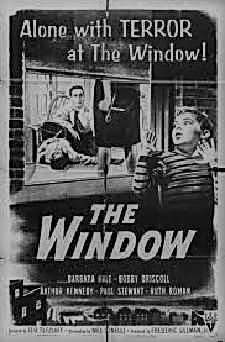 WINDOW, THE (1949)
WINDOW, THE (1949) (74 Min.) Genre: 1940 SUSPENSE, Transfer Quality: A
Widely regarded as a "model" B-movie thriller, The Window stars Bobby Driscoll as a young boy prone to fibs. Thus, no one believes him when he claims to have seen a murder in a neighboring apartment. No one, that is, except the killers (Paul Stewart and Ruth Roman). Realizing he won't get any help from his parents (Barbara Hale and Arthur Kennedy) or the law, the boy must figure out a way to save himself from being shut up permanently by the murderers. The film's hair-rising and oft-imitated climax, which takes place in a rotting abandoned tenement, has lost none of its edge over the past five decades. A much-needed hit for financially strapped RKO Radio Pictures, The Window was remade in 1960 as The Boy Cried Murder. — Hal Erickson
Starring: Barbara Hale, Bobby Driscoll, Arthur Kennedy, Paul Stewart | Directed by: Ted Tetzlaff
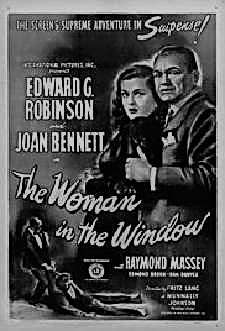 WOMAN IN THE WINDOW, THE (1944)
WOMAN IN THE WINDOW, THE (1944) (99 Min.) Genre: 1940 SUSPENSE, Transfer Quality: A
Directed by Fritz Lang, The Woman in the Window, a sadly tragic film noir, is the story of the doomed love of married psychology-professor Wanley (Edward G. Robinson), who, with murderous results, meets and falls in love with another woman. Wanley first sees the portrait of a beautiful woman, Alice (Joan Bennett), and then meets the woman herself. After committing murder in self-defense, he finds himself blackmailed by Heidt (Dan Duryea). The script, written by Nunnally Johnson, is carefully structured with crisp dialogue and a convincing ending. Lang is at his best, getting excellent performances from Robinson, as the doomed, naive professor, and Bennett both. The Woman in the Window shows that good and evil are present in all, and that circumstances frequently dictate moral choices. Based on J.H. Wallis' novel Once Off Guard, the film gives viewers their money's worth with not one but two logical and satisfying surprise twists at the end. — Linda Rasmussen
Starring: Edward G. Robinson, Joan Bennett, Raymond Massey, Dan Duryea | Directed by: Fritz Lang
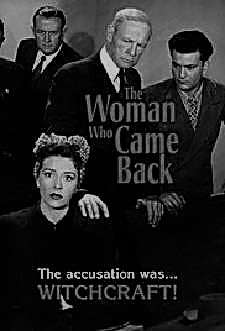 WOMAN WHO CAME BACK, THE (1945)
WOMAN WHO CAME BACK, THE (1945) (69 Min.) Genre: 1940 SUSPENSE, Transfer Quality: A
For at least 63 of its 68 minutes, Republic's The Woman Who Came Back is an exciting and compelling journey into the realm of the supernatural. Returning to her ancestral New England village, Lorna Webster (Nancy Kelly) slowly but surely becomes convinced that she's the reincarnation of a centuries-old witch. A chance encounter on a bus with a weird old woman, combined with a series of bizarre "coincidences", further confirms Lorna's suspicions. Set upon and stoned by the terrified villagers, Lorna is rescued by her physician fiance Matt Adams (John Loder) and local minister Stevens (Otto Kruger), who attempt to separate fact from fancy. The disappointingly "logical" explanation to the events in The Woman Who Came Back doesn't quite gloss over such phenomena as a bouquet of flowers wilting at Lorna's touch! — Hal Erickson
Starring: John Loder, Nancy Kelly, Otto Kruger, Ruth Ford | Directed by: Walter Colmes
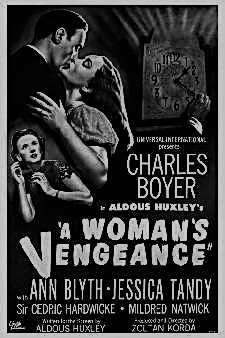 WOMAN'S VENGEANCE, A (1947)
WOMAN'S VENGEANCE, A (1947) (96 Min.) Genre: 1940 SUSPENSE, Transfer Quality: C
A Woman's Vengeance concerns a "likely" murderer, played by Charles Boyer. It is no secret that Boyer is enamored with young Ann Blyth, but is his love for the girl motive enough for Boyer to murder his invalid wife? Only family friend Sir Cedric Hardwicke believes in Boyer, and it is Hardwycke who eventually extracts a confession from the real killer—just seconds before Boyer is to be executed. Without giving the game away, we'll note that the supporting cast includes Jessica Tandy, Mildred Natwick and John Williams (Rachel Kempson couldn't have played the murderer, inasmuch as she's the victim). A Woman's Vengeance was adapted by Aldous Huxley (the same) from his own story The Gioconda Smile. — Hal Erickson
Starring: Charles Boyer, Ann Blyth, Jessica Tandy, Cedric Hardwicke | Directed by: Zoltan Korda
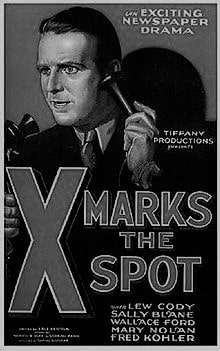 X MARKS THE SPOT (1942)
X MARKS THE SPOT (1942) (55 Min.) Genre: 1940 SUSPENSE, Transfer Quality: B
X Marks the Spot was the first of eight brisk wartime-oriented melodramas, each running slightly under an hour, produced and directed in rapid succession by George Sherman. Private detective Eddie Delaney (Damian O'Flynn) swings into action when his father (Robert E. Homans), a police sergeant, is gunned down by rubber racketeers (please recall that rubber was a valuable commodity during WW2). With the help of heroine Linda Ward (Helen Parrish) and police lieutenant Decker (Dick Purcell), Delaney chases after the villains, experiencing all sorts of serial-like dangers along the way. Numbered among the bad guys are the typecast Jack LaRue and the cast-against-type Neil Hamilton (later Batman's Commissioner Gordon). Though the script covers familiar ground, X Marks the Spot is exhilarating entertainment in the true Republic Pictures tradition.
Starring: Damian O'Flynn, Helen Parrish, Dick Purcell, Neil Hamilton, Jack La Rue | Directed by: George Sherman
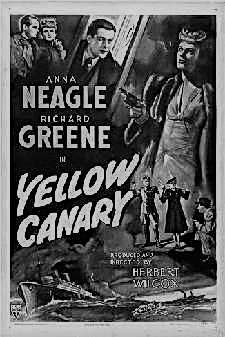 YELLOW CANARY, THE (1943)
YELLOW CANARY, THE (1943) (84 Min.) Genre: 1940 SUSPENSE, Transfer Quality: A
The Yellow Canary was one of several wartime collaborations between British producer-director Herbert Wilcox and Hollywood's RKO Radio Pictures. The film stars Wilcox's wife Anna Neagle as pretty aristocrat Sally Maitland. Having alienated many of her friends with her prewar Nazi sympathies, Sally continues hobnobbing with the Third Reich once war has been declared. Actually, her pro-German activities are a sham; she's actually working hand and glove with the British government to smash an Axis spy ring in Canada. Along for the ride is British intelligence officer Jim Garrick (Richard Greene), who ultimately falls in love with Sally. There's a "mystery" angle to the plotline of The Yellow Canary, but it is largely ignored when the story takes a melodramatic turn in the last few reels. — Hal Erickson
Starring: Anna Neagle, Richard Greene, Nova Pilbeam, Margaret Rutherford | Directed by: Herbert Wilcox
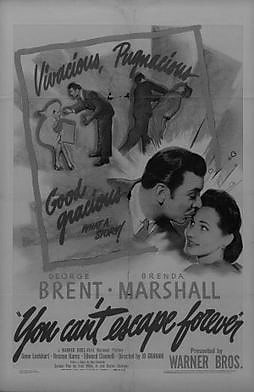 YOU CAN'T ESCAPE FOREVER (1942)
YOU CAN'T ESCAPE FOREVER (1942) (78 Min.) Genre: 1940 SUSPENSE, Transfer Quality: A
When Laurie goes to the execution of Varney and faints, she does not know that Varney gets a full pardon minutes before he fries. She calls in a story about his death and gets transferred to the Bewildered Heart Column of Prudence Maddox. When Mitch writes a story about Greer murdering Crowder that he cannot prove, he gets transferred from editor to Prudence Maddox. He makes Prudence very profitable for the paper, but the only way he can get the job of editor back, is to prove that Greer is a crook.
Starring: George Brent, Brenda Marshall, Gene Lockhart, Roscoe Karns | Directed by: Jo Graham

